
#SustainabilityInTheBoardroom
Andreas Rasche is researching and teaching on corporate sustainability with a focus on ESG, governance and sustainable finance. He currently serves as the Associate Dean for the Full-Time MBA program at Copenhagen Business School. Andreas has published over 60 peer reviewed articles in international journals and authored/edited seven books. He has worked for and collaborated with the UN Global Compact on a number of projects. From 2012-2024, Andreas served as Associate Editor of Business Ethics Quarterly and was a Visiting Professor at Stockholm School of Economics (2017-2020). More at: http://www.arasche.com
16-01-2026

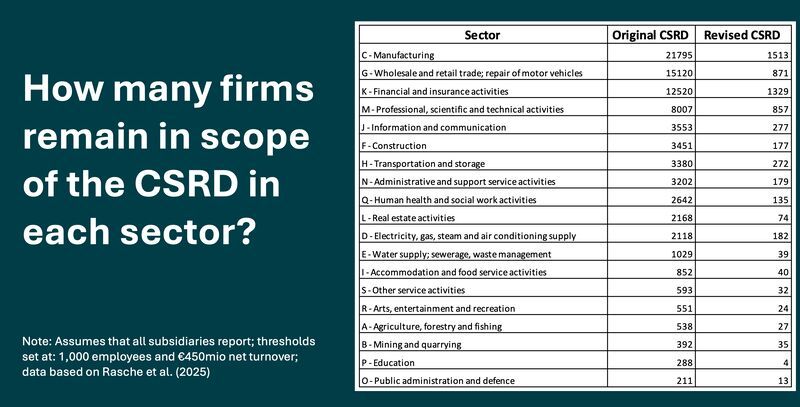


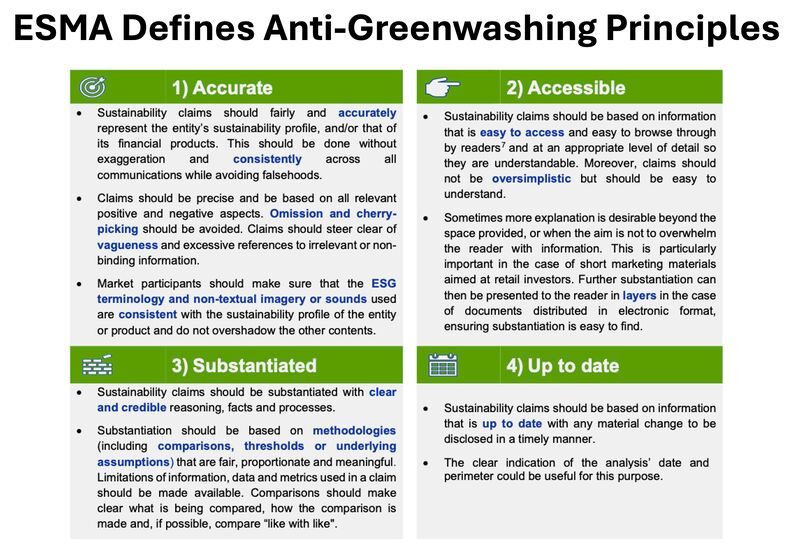

16-01-2026
This is where the #Omnibus I missed a critical opportunity. Rather than differentiating more intelligently between sectors, simplification was applied with a 'broad brush'. High-impact sectors could have been exposed to different threshold to ensure a better sustainability information architecture.
This outcome was not inevitable. The tools already exist. The EU’s own Economic Activity Classification (Regulation (EC) No 1893/2006), also used in the Paris-aligned Benchmarks framework, could have supported sector-specific thresholds and a far more targeted approach.
👉 Simplifying with precision remains a challenge for the EU - and it is something to consider for pending (and future) EU Omnibus packages...
16-01-2026



This is where the #Omnibus I missed a critical opportunity. Rather than differentiating more intelligently between sectors, simplification was applied with a 'broad brush'. High-impact sectors could have been exposed to different threshold to ensure a better sustainability information architecture.
This outcome was not inevitable. The tools already exist. The EU’s own Economic Activity Classification (Regulation (EC) No 1893/2006), also used in the Paris-aligned Benchmarks framework, could have supported sector-specific thresholds and a far more targeted approach.
👉 Simplifying with precision remains a challenge for the EU - and it is something to consider for pending (and future) EU Omnibus packages...
15-01-2026

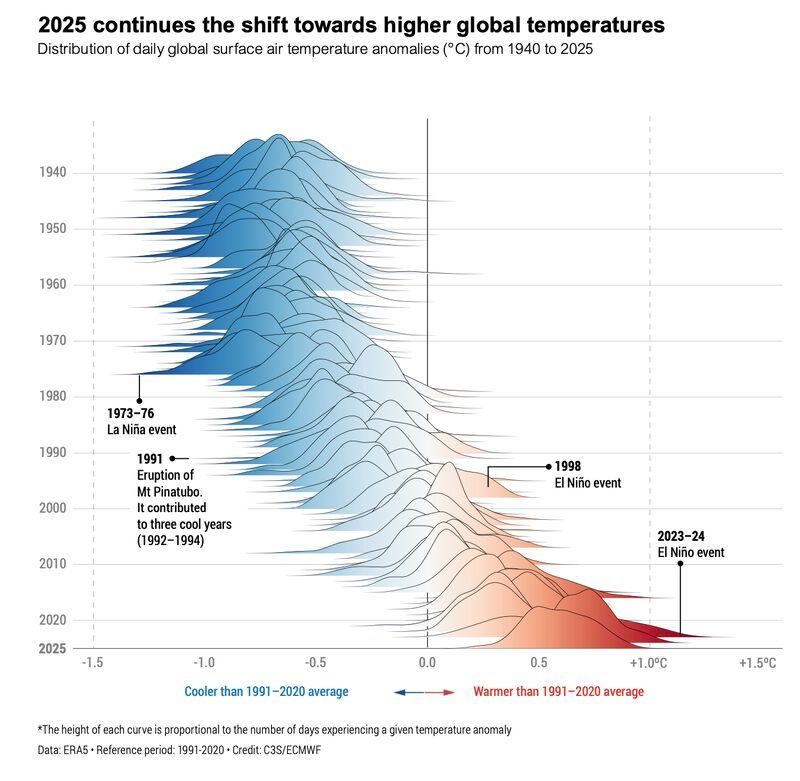

The new data shows that the globe has warmed 1.4°C (above pre-industrial). We will bulldoze through the Paris Agreement goal by May 2029, if warming continues at the same rate.
And yet EU policymakers believe it is a good idea to exempt 90% of companies from reporting on their Scope 1, 2 and 3 emissions under the #CSRD. This is difficult to reconcile with the scale and urgency of the challenge.
Data collection does not reduce emissions on its own. But without it, companies are flying blind when it comes to understanding and reducing their carbon footprint.
15-01-2026

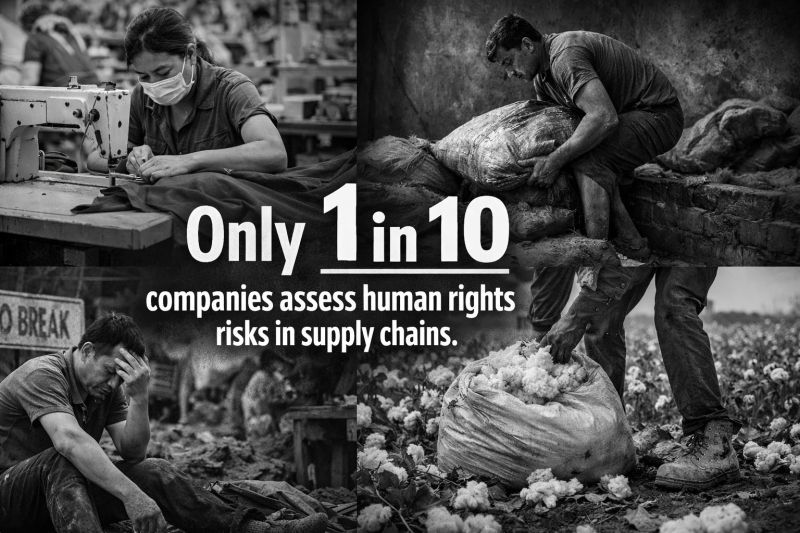

Importantly, such legislation needs to reach beyond just a few very big companies because it is supposed to level the playing field and provide scalable solutions. Reducing the scope of the #CSDDD by 70% is a move in exactly the opposite direction.
The study by the World Benchmarking Alliance also finds that the 20 best performing companies on the 2026 Social Benchmark are all headquartered in Europe. An encouraging insight and certainly something worth defending.
👉 The problem is not regulatory simplification, but simplifying the simplification debate...
12-01-2026

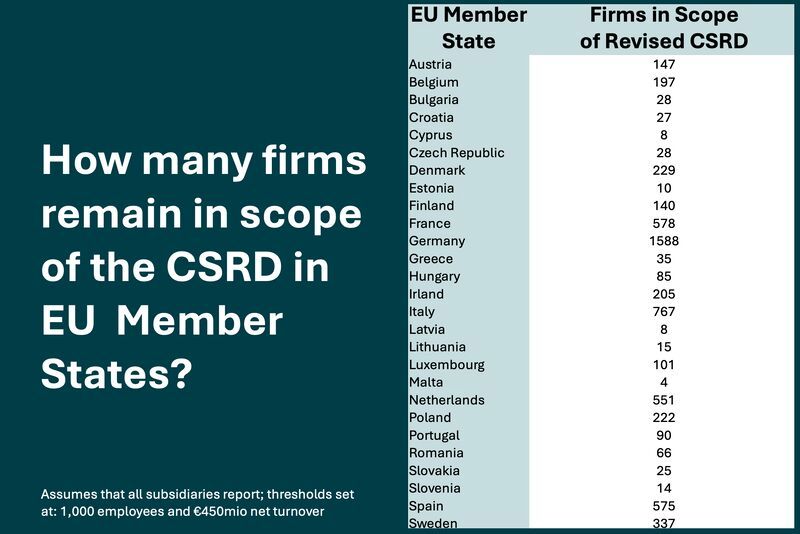

This level of scope reduction undermines proportionality. The Draghi report, which is often cited in support of these changes, did not argue for deregulation. It called for regulatory standards to be better calibrated to company size. That objective has not been met here, in my opinion.
For Member States, reduced transparency will make it harder to distinguish leaders from laggards. This can undermine evidence-based policymaking, e.g. when deploying policy instruments such as subsidies in a targeted manner.
👉 The #Omnibus exempts around 42,000 European firms from the CSRD. While policymakers have many tools at hand to ensure proportionality (e.g. defining tiers with differentiated requirements), what was delivered is a broad-brush approach that simply swept companies out of scope…
09-01-2026

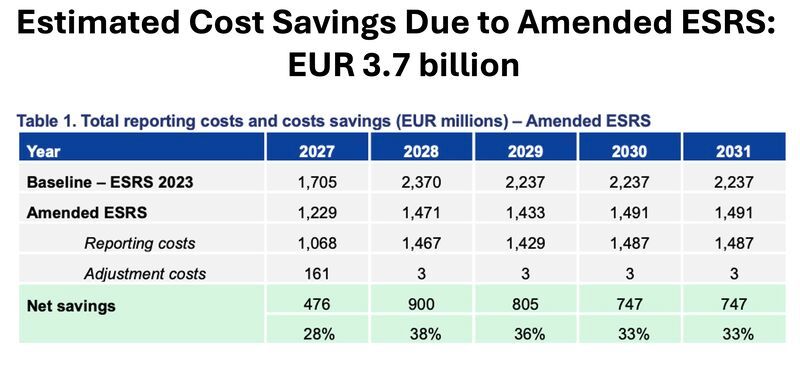

1️⃣ If such substantial cost savings can be achieved by amending implementing acts (i.e.: the ESRS - level 2), it raises an obvious question: why was it deemed necessary to immediately reopen the #CSRD directive itself (level 1) and exempt around 90% of companies?
There is a clear lesson here for future #Omnibus packages: start simplification by adjusting delegated/implementing acts, collect evidence, and only reopen directives if unavoidable. This also improves regulatory predictability...
2️⃣ The study also finds that firms do not expect significant positive or negative effects of the amended ESRS on their competitiveness. This calls into question how much the Omnibus can realistically deliver on its core promise of “boosting competitiveness”.
08-01-2026

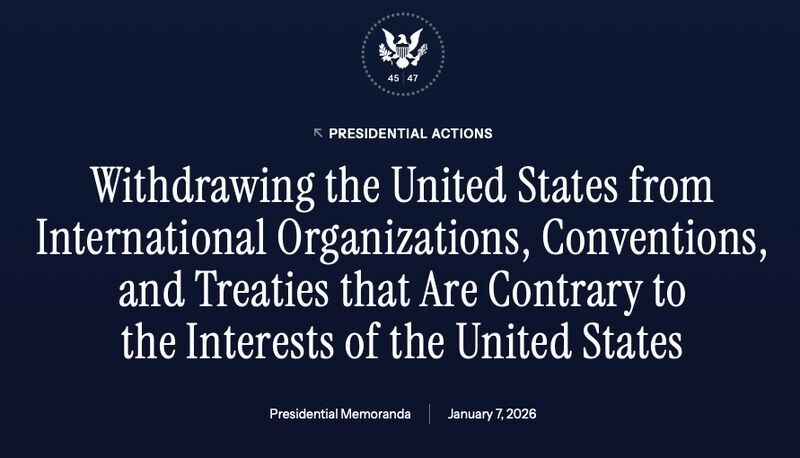

The stated justification: “Many of these bodies promote radical climate policies, global governance, and ideological programs that conflict with U.S. sovereignty and economic strength.”
In total, the U.S. will leave 31 UN entities (incl. UN Water and the UN Population Fund) and 35 non-UN organisations (such as the International Energy Forum).
👉 This is deeply embarrassing, short-sighted, and marks a new low - even by Trump Administration standards. The decision further isolates the U.S. - it will be the only country out of 198 not party to the UNFCCC. Alone. By choice.
And it is ultimately self-defeating. Climate action, energy transition, and global coordination will continue, without U.S. leadership, influence, or credibility at the table.
The rest of the world will move on...
06-01-2026

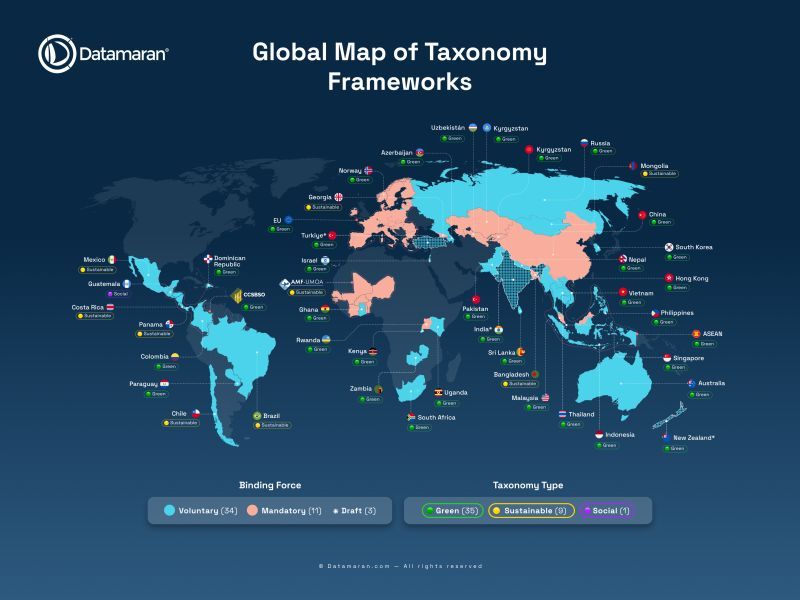

This overview by Datamaran shows how taxonomy frameworks are rapidly evolving globally.
While only 11 taxonomies are currently mandatory, the direction of travel is clear: many non-EU countries are moving to close the gap in sustainability regulation.
We see a similar trend in sustainability reporting where major jurisdictions have released standards (e.g. China just very recently) and the ISSB's standards are gaining traction in many countries.
👉 In a global regulatory environment, it is vital to move early and keep pace. First movers shape standards, influence market practice, and create reference points that others build upon.
Otherwise, the sustainability rules for EU companies will be written elsewhere...
06-01-2026

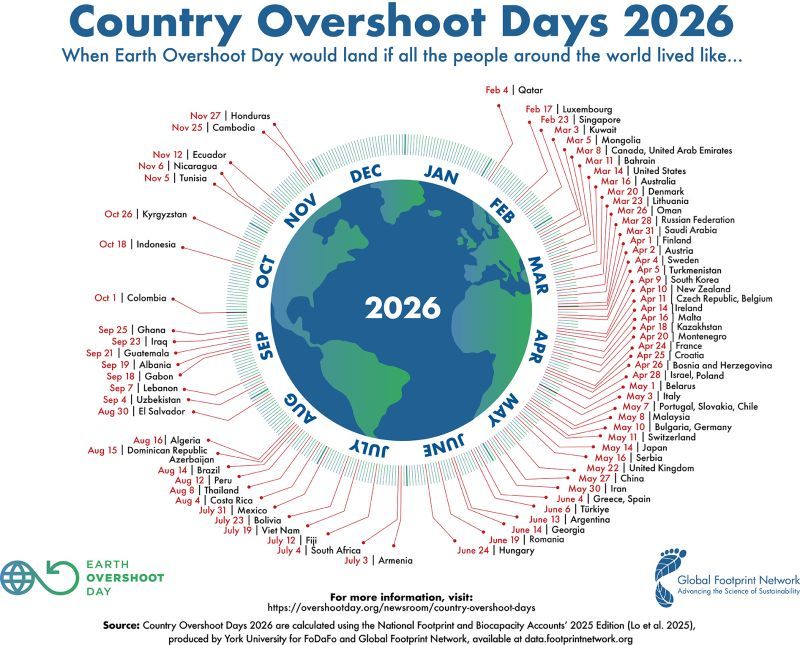

A country's overshoot day marks the date when Earth’s annual biocapacity would be exhausted if everyone lived like the average resident of that country.
Denmark has one of the earliest overshoot days (20 March 2026) - despite ranking 3rd globally on SDG progress. This is not a contradiction; it is a measurement problem.
Overshoot calculations shift the conversation towards the resources consumed per person and hence highlight inequalities in resource use much better.
The uncomfortable takeaway is this: global overshoot is not an abstract failure. It is the cumulative result of lifestyles that are not globally replicable...
29-12-2025

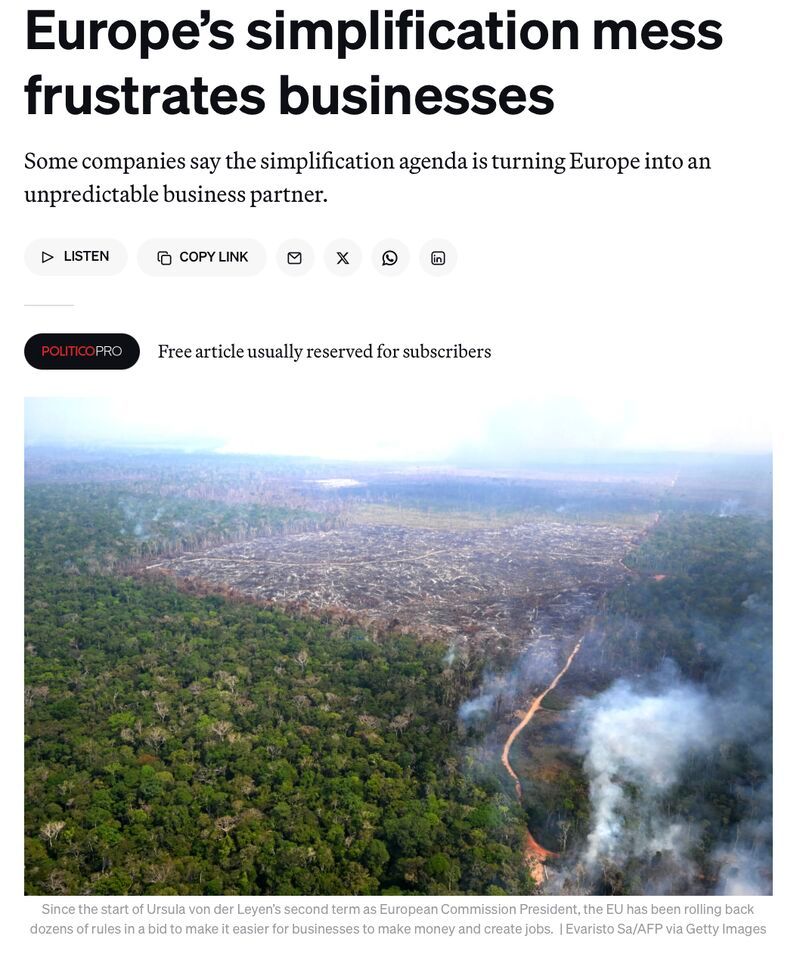

Bart Vandewaetere (Nestlé) puts it bluntly in this POLITICO article: “The European Union unfortunately has lost some trust in the boardrooms by making simplifications that are maybe undermining predictability.”
While most businesses support simplification in principle, many are frustrated by the constant back-and-forth - and by reforms that often complicate things. The result? Greater uncertainty and delayed decisions...
The bottom line: "The risk is that the EU will shoot itself in the foot by making it harder for companies to invest in the region, which is essential for competitiveness."
Competitiveness ultimately rests on trust - and trust depends on predictability. If the EU wants to remain an attractive place to invest, it must be a stable and reliable partner for business...
27-12-2025

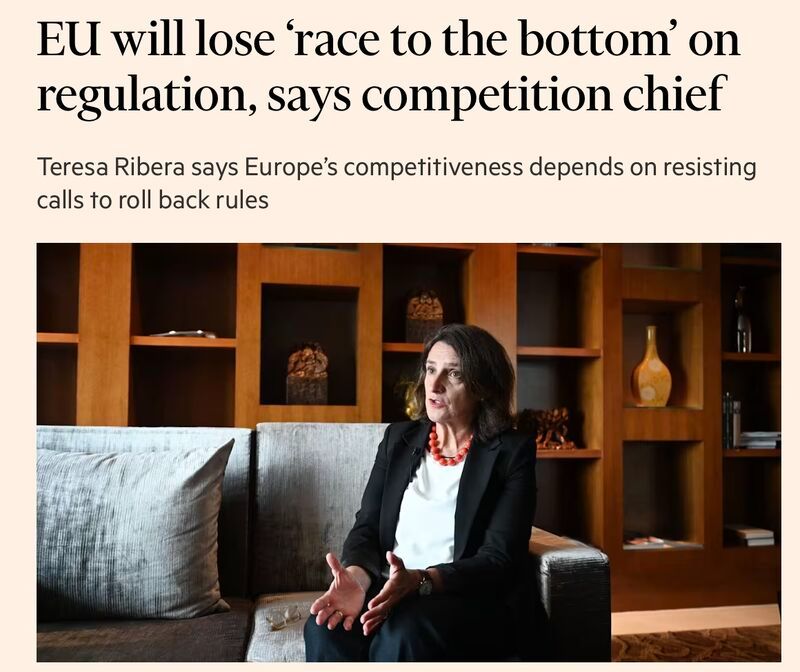

“If we lose our identity, our values, the confidence of our people, we will not be in a position to negotiate anything or to bridge anything.”
This is the core risk. When simplification starts to undermine Europe’s identity, its foundational values, and our trust in institutions, simplification itself turns into a liability. The endless back-and-forth on sustainability regulations is a case in point: companies increasingly lose trust in regulatory predictability.
Ribera is explicit: “As Europeans, we cannot bet on a race to the bottom." Yet some of the regulatory rollbacks, delays, and shortcuts point precisely there. We may temporarily appease Washington and others, but at the cost of public confidence.
👉 The challenge for the EU is not less regulation, but better regulation. Not just rolling back and delaying, but smarter design, stronger enforcement, and credible implementation of the rules we already have.
24-12-2025
However, the upcoming "Simplification Review", which is due on 30 April 2026, introduces new uncertainties. The review will analyse the "administrative burden and impact of the Regulation, in particular for micro and small operators." (see p. 3, para 14)
While there is legal certainty, many companies have already made substantial, good-faith investments to comply. These stranded investments have barely featured in the policy debate.
This delay rewards the laggards...
19-12-2025

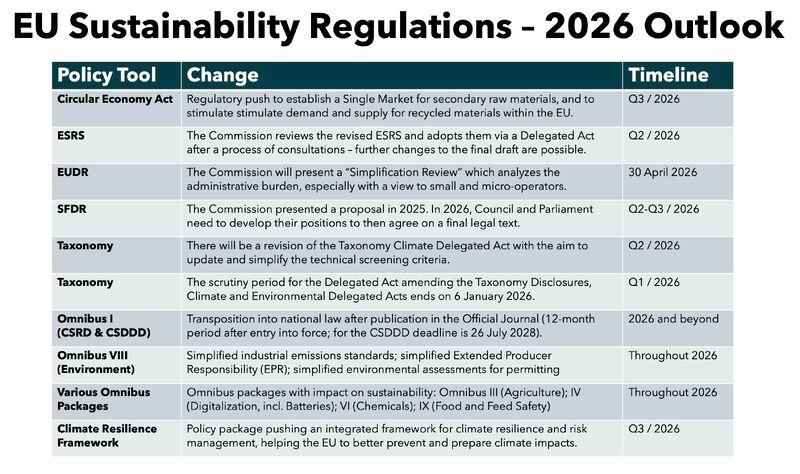

On the simplification side, we will see the adoption of the revised ESRS following a consultation period. There will also be the "Simplification Review" of the EUDR by the end of April, and the Taxonomy will see amendments to their Delegated Acts.
Omnibus I (CSRD & CSDDD) will move into national transposition, and it will be interesting to watch how Member States put the revised Directives into national law. The "Environmental Omnibus" will keep us busy in 2026, as it contains changes to key environmental laws (e.g. industrial emissions standards).
👉 Beyond simplification, the EU is expected to present its long-awaited Circular Economy Act, aiming to create a genuine Single Market for secondary raw materials. The Climate Resilience Framework will also be unveiled and is expected to constitute a comprehensive policy package.
In short: plenty to watch, plenty to shape - and it is not all about simplification...
===
Note: This overview is not exhaustive and timelines are tentative. For example, it does not include the Green Claims Directive, whose future remains uncertain.
17-12-2025

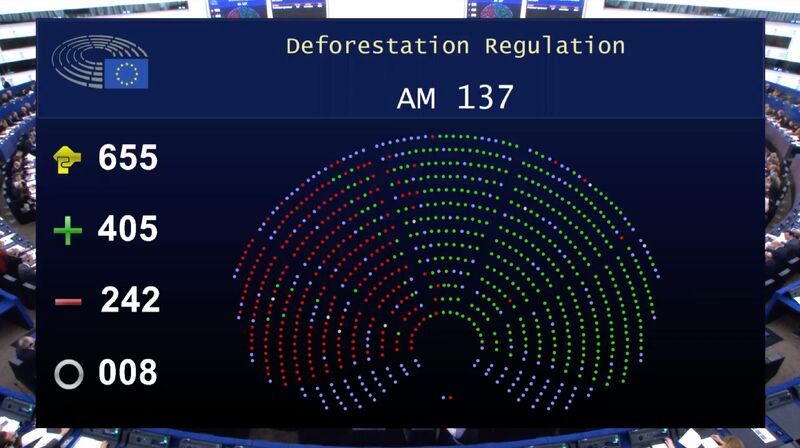

The EPP continues to deny any formal cooperation with far right groups. But it is crystal clear that there is strong alignment - also because the EPP depends on far-right votes to roll back sustainability regulations.
Concerning is the newly introduced “simplification review”. The European Commission must conduct such a review in early 2026 and propose potential changes to the EUDR. This extends regulatory uncertainty well into 2026.
👉 Delays create uncertainty. Uncertainty undermines investment, preparedness, and credibility. And yet some politicians want to make us believe that all of this boosts competitiveness...
16-12-2025

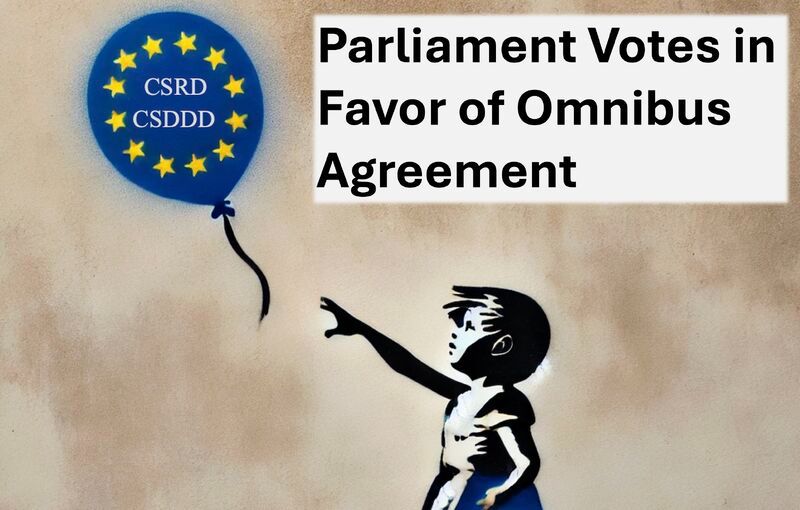

1️⃣ The core problem: wrong assumptions (sustainability undermines competitiveness) and lack of balance (focusing on costs, sidelining benefits).
2️⃣ People lost jobs and many firms supporting CSRD/CSDDD struggled. This was never much discussed/acknowledged - and yet it is also an outcome!
3️⃣ Simplification was needed – e.g. reducing ESRS data points made sense. But simplification turned into a simplified debate that produced deregulation.
4️⃣ The EU has lost trust along the way. I talked to many companies that will navigate EU regulations in a less proactive way in the future.
5️⃣ Policymakers reduced scope by 90% (CSRD), deleted transition plans, and scraped civil liability. And yet they sell this as a "balanced outcome".
6️⃣ Something positive? Firms can no longer just play the compliance card – reflections on the purpose of voluntary action are needed now.
7️⃣ The EPP’s reckless “take-it-or-leave-it” negotiation tactic opened the door widely for far-right political groups to influence European politics.
8️⃣ While swift political action is appreciated, here it came at the expense of rigour. The EU Ombudswoman called it “maladministration”.
9️⃣ I am looking forward to “boosted EU competitiveness” and increased investments. I - and others - will monitor what the Omnibus ultimately delivers.
🔟 ❗ I am deeply grateful for the many excellent discussions here on LinkedIn. I learned a lot from your stories and perspectives - and this is what matters…
15-12-2025
The complaint concerns Mr Warborn’s failure to declare a potential conflict of interest between his role as President of SME Europe, a registered lobbying organisation, and his position as Rapporteur for the Omnibus I package. The complaint argues that this possible conflict was not disclosed in the mandatory transparency form upon appointment as Rapporteur on 20 March 2025.
Specifically, the complaint notes: “As President of SME Europe, Mr Warborn could be expected to represent the organisation’s interests, which may call into question his impartiality and objectivity in the performance of his duties as rapporteur and lead negotiator for Parliament on the report on certain corporate sustainability reporting and due diligence requirements (2025/0045(COD)).”
While no conflict of interest has been formally established at this stage, the seriousness of the allegation warrants careful scrutiny.
The timing is particularly troubling. These developments come on the eve of the final Omnibus I vote in Parliament, raising legitimate concerns about governance, accountability, and trust in the legislative process...
13-12-2025

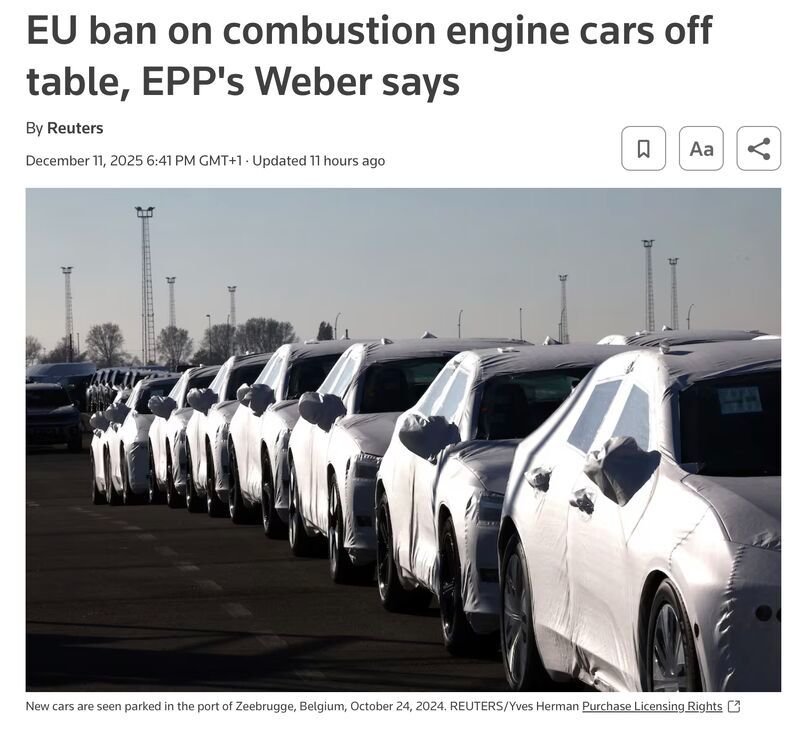

Manfred Weber (EPP) stated: “From 2035 onwards, a 90% CO₂ reduction will now be mandatory for car manufacturers’ fleet targets, instead of 100%.” There will also be no 100% target for 2040.
The arguments? We must remain “technologically open” and “let consumers decide”. But, in reality, the European automotive industry is seeking to shield legacy business models because they are outpaced by global competition.
Right now, this deal is not backed by pro-European forces. Hence: the EPP will need to rely on their new far-right partners to vote this through.
👉 Regulatory predictability is so badly missing in EU politics! How should businesses work towards the green transition if regulations turn into moving goalposts?
11-12-2025
➡️ Exemptions for livestock and aquaculture operators from reporting on material and energy use, thereby reducing transparency in sectors with significant environmental footprints.
➡️ Scaling-back of Environmental Management Systems (EMS) - the tools that set environmental objectives, track performance and drive continuous improvement at industrial sites.
➡️ The proposed changes on Extended Producer Responsibility (ERP) seem like a good idea and might indeed make things more efficient and streamlined. On the other hand, the possible changes to the Water Framework Directive are problematic.
👉 Once again, the Omnibus arrives without an impact assessment, despite severe criticism from the EU Ombudswoman about this practice.
👉 Once again, simplification is framed solely in terms of compliance costs, with little consideration of the economic toll of pollution, degraded ecosystems and delayed transition efforts.
👉 Once again, it reopens legislation that was only recently revised, including the 2024 update of the Industrial Emissions Directive.
11-12-2025
The compromise text provides clarity on several outstanding issues. Notably, Paragraph 19aa further elaborates the review clause for the #CSRD scope, and the text also clarifies the “transition exemption” for Wave 1 companies that will fall out of scope for FY2025 and FY2026.
The file will next move to the Parliament's plenary on 16 December. Approval there is likely but not a "given" - it will depend on evolving political dynamics and how political groups assess the negotiated outcome.
If approved by Parliament, the #Omnibus I package is formally adopted and hence becomes law (after publication in the "Official Journal").
10-12-2025

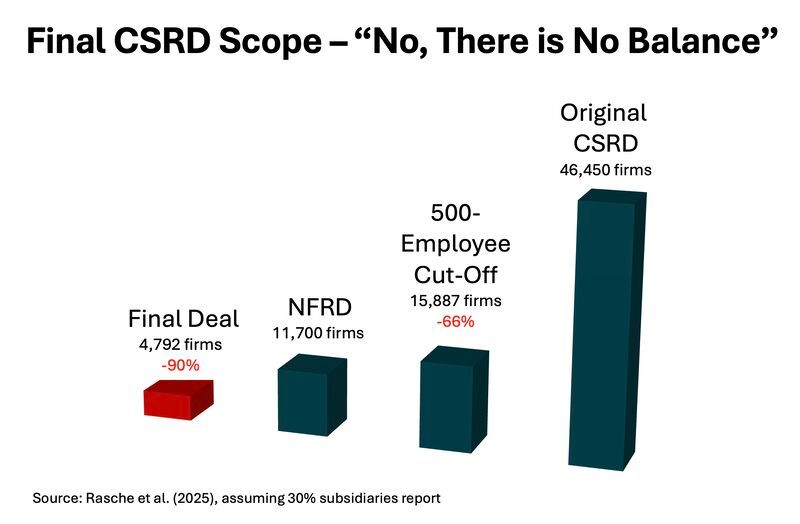

The new CSRD will have around 4,800 firms in scope throughout the EU, while the revised CSDDD will apply to a bit more than 1,000 companies. This neither reflects "balance" nor does it make anything "simpler".
For the CSRD we even go below the NFRD threshold. With this we destroy regulatory consistency, something that many investors and businesses have explicitly criticized.
👉 It would be good if political leaders were at least honest and use the word that they have tried to avoid over the last ten months: deregulation...
The accompanying statement by Morten Bødskov (Danish Minister for Industry, Business and Financial Affairs) captures the core problem: the #CSRD and #CSDDD are wrongly portrayed by some politicians as distractions from the real ("core") business of companies.
The implicit message is clear: now that we have freed most businesses from these rules, growth, competitiveness and investment will return. But there is no evidence for this claim.
Europe’s growth challenges stem from structural factors, ranging from high energy prices to gaps in technology scaling. Rolling back 90 percent of the CSRD and 70 percent of the CSDDD will not fix these problems. What it will do is undermine transparency, weaken risk management, and reduce the EU’s ability to compete on standards and trust.
This rollback is "easy politics". Building a competitive Europe looks differently...
09-12-2025

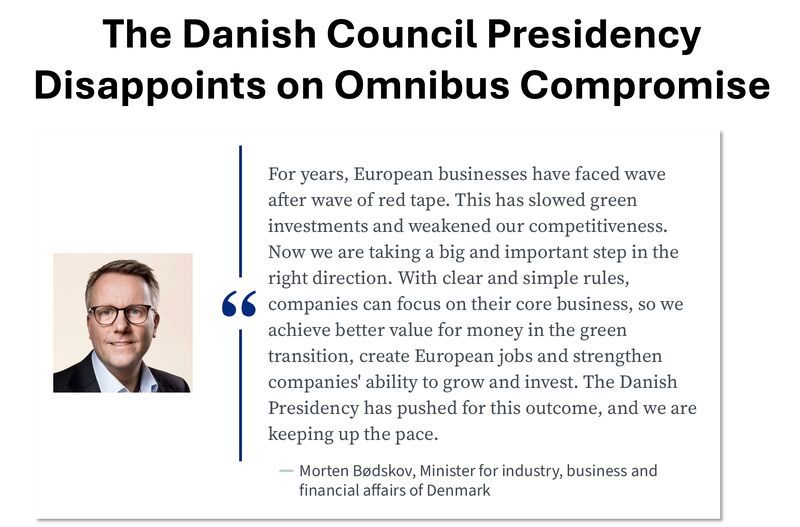

The accompanying statement by Morten Bødskov (Danish Minister for Industry, Business and Financial Affairs) captures the core problem: the #CSRD and #CSDDD are wrongly portrayed by some politicians as distractions from the real ("core") business of companies.
The implicit message is clear: now that we have freed most businesses from these rules, growth, competitiveness and investment will return. But there is no evidence for this claim.
Europe’s growth challenges stem from structural factors, ranging from high energy prices to gaps in technology scaling. Rolling back 90 percent of the CSRD and 70 percent of the CSDDD will not fix these problems. What it will do is undermine transparency, weaken risk management, and reduce the EU’s ability to compete on standards and trust.
This rollback is "easy politics". Building a competitive Europe looks differently...
09-12-2025

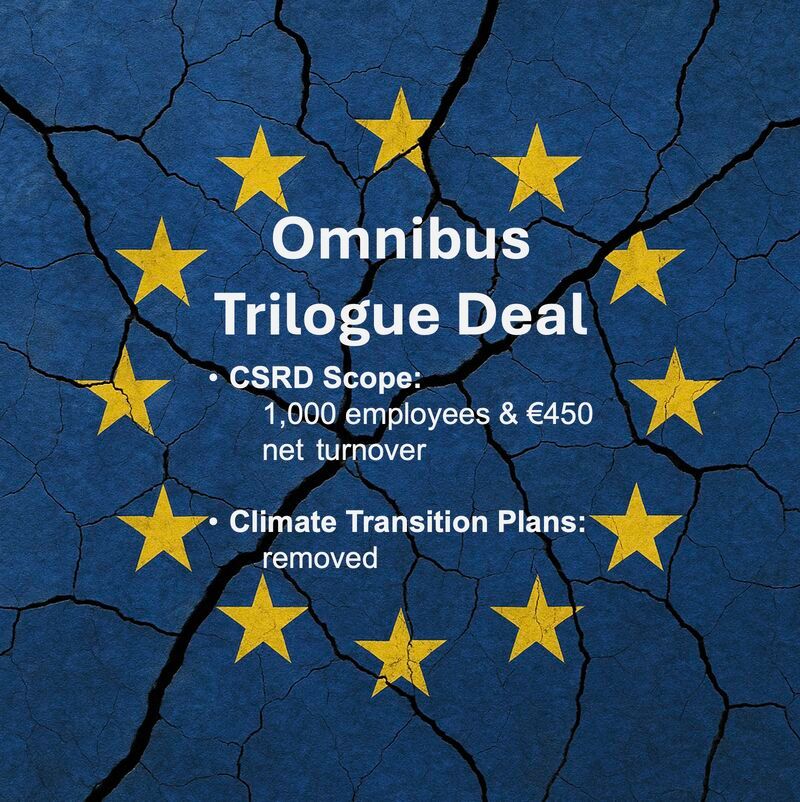

1️⃣ CSRD Scope: 1,000 FTE and €450mio net turnover - this is a dramatic 90% scope reduction.
2️⃣ Review Clause: Importantly, the agreement "introduces a review clause concerning a possible extension of the scope for both CSRD and CSDDD." This shows that policymakers have doubts about the severe scope reductions.
3️⃣ Climate Transition Plans: removed from CSDDD.
4️⃣ Due Diligence Approach I: The exclusive focus on tier-1 companies is removed. Firms should "focus on the areas of their chains of activities where actual and potential adverse impacts are most likely to occur." No comprehensive mapping is needed any longer, only a scoping exercise.
5️⃣ Due Diligence Approach II: The agreement introduces lots of flexibility. When "adverse impacts [are] equally likely or equally severe in several areas, [firms] are given the ability to prioritise assessing adverse impacts which involve direct business partners." This is an indirect invitation to not address severe impacts - if an impact is severe, it must be addressed. This is the whole point...
6️⃣ CSDDD Transposition is pushed back by yet another year. Companies now have to comply by July 2029. Delay, delay, delay...
📅 This deal needs to be confirmed: 10 Dec (vote in Coreper II, Council); 11 Dec (vote in JURI, Parliament), 16 Dec (vote in plenary, Parliament).
👉 With this deal it seems likely that the EPP will get the support of far-right political groups (which they formed an alliance with on this file).
This deal confirms the disproportional, non-evidence based rollback of the #CSRD & #CSDDD. Seeing both regulations only as cost drivers and framing them as a competitive disadvantage may appease populist sentiments, but it is not a winning strategy for the future of Europe...
08-12-2025

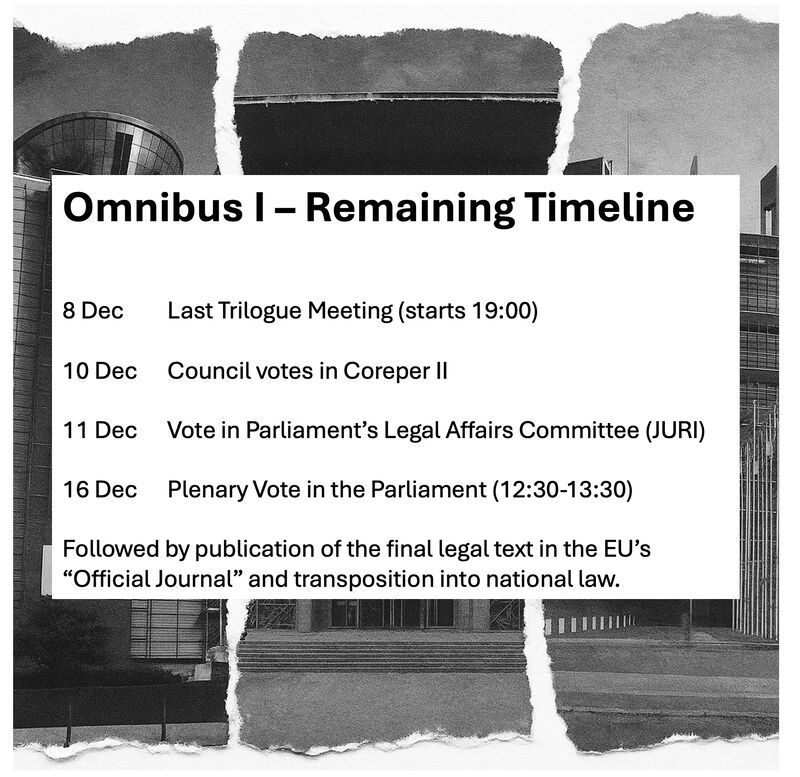

Today's trilogue meeting kicks off at 19:00, which means we can expect clarity either late tonight or early tomorrow. Usually, it is the Council that communicates trilogue results.
Later this week, both institutions move quickly to validate the deal: 10 December: Council confirmation in Coreper II and 11 December: Vote in the Parliament’s Legal Affairs Committee (JURI). The final adoption in the Parliament's plenary is planned for 16 December.
👉 One key question hanging over the process: Will far-right groups continue to back the agreement, especially if changes may not align with their political interests (e.g. if climate transition plan requirements remain in the CSDDD)?
08-12-2025

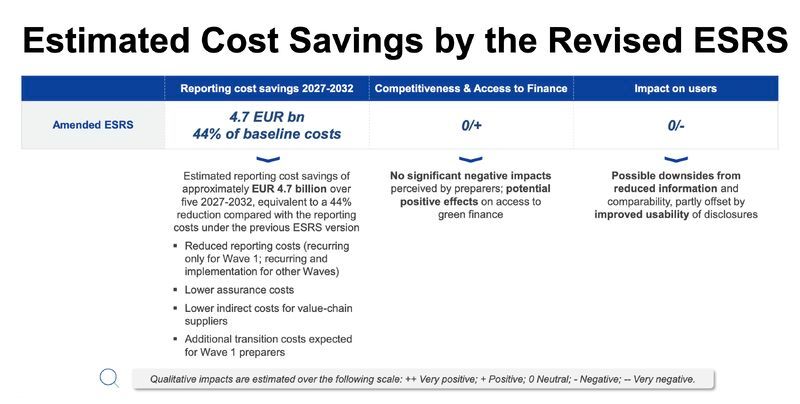

These findings are based on input from 200+ companies, investors, and NGOs, providing a broad view across the market.
👉 Competitiveness effects are assessed as neutral. Companies themselves do not seem to think that significant competitiveness effects are created through ESRS simplification. A welcome reality check for all those politicians who are selling simplification as the way to boost competitiveness.
The study also acknowledges “possible downsides from reduced information,” though it argues these may be “partly offset by improved usability.” With the revised ESRS cutting 70% of data points, this feels like a rather optimistic conclusion...
05-12-2025

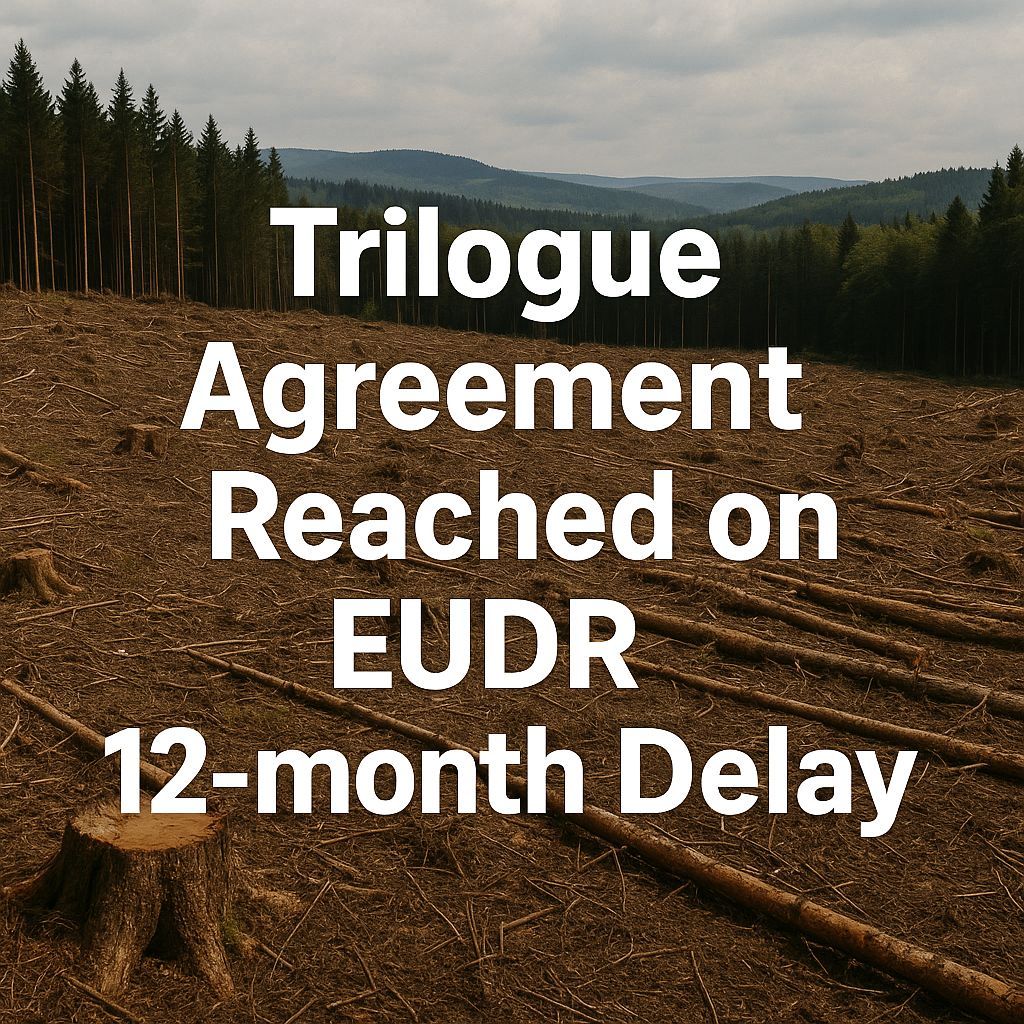

➡️ The Commission is tasked with a simplification review (by 30 April 2026). Objective: assess the EUDR’s impact and administrative burden. If needed, the review is accompanied by a new legislative proposal. This introduces additional uncertainty as no one knows how much the rules may change.
➡️ Only the operator who first places the product on the market will be responsible for submitting the due-diligence statement.
➡️ Simplified one-time declaration for micro and small primary operators. They will submit such a simplified declaration and receive an identifier for traceability.
👉 Once again, policymakers delay without compelling evidence that a delay is necessary. Many companies have taken the opposite position, asking the EU to stick to the application date for the sake of certainty and investment stability.
👉 The Commission now faces an awkward task: conducting a simplification review of a regulation that has not yet been implemented. As we saw with the #CSDDD, this "simplification-before-implementation" approach lacks the data to make sound judgements.
📅 Council and Parliament now need to formally adopt this deal before it enters into force by the end of the year. The Parliament vote is on 16 Dec.
04-12-2025

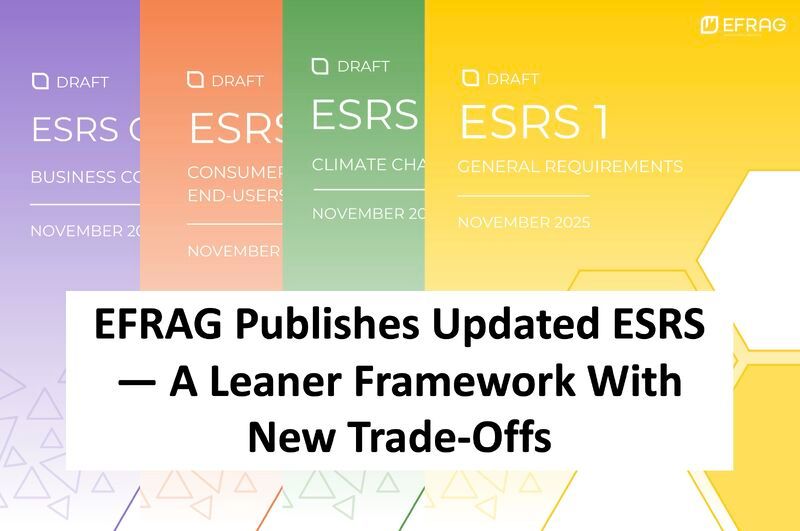

➡️ The reduction in data points was overdue, yet whether 70% is the right balance is far from clear. Yes, redundant and low-value data points are gone, but so are several data points that mattered.
➡️ The revised Double Materiality Assessment promises "clearer guidance, less documentation, and better alignment with audit expectations." Given the friction around the original DMA, this feels like progress on proportionality.
➡️ Many exceptions and reliefs - such as the possibility to omit information when there is "undue cost or effort" - introduce a lot of flexibility. Without tighter guardrails, these reliefs risk creating loopholes for greenwashing. Reliefs should be the rare exception, not the norm.
👉 EFRAG’s mandate was tough: deliver major simplification without diluting the standards, and do it under time pressure. Not exactly a recipe for a quick win. The final package reflects those tensions: a step forward in some respects, a compromise in others.
The revised ESRS are now with the Commission, which will consult internally and externally and engage with Parliament & Council. This is expected to take six to nine months, after which the standards will be adopted through a Delegated Act.
The objective is for the revised standards to apply from FY 2027, with a possibility for earlier application for FY 2026 (still to be confirmed).
03-12-2025

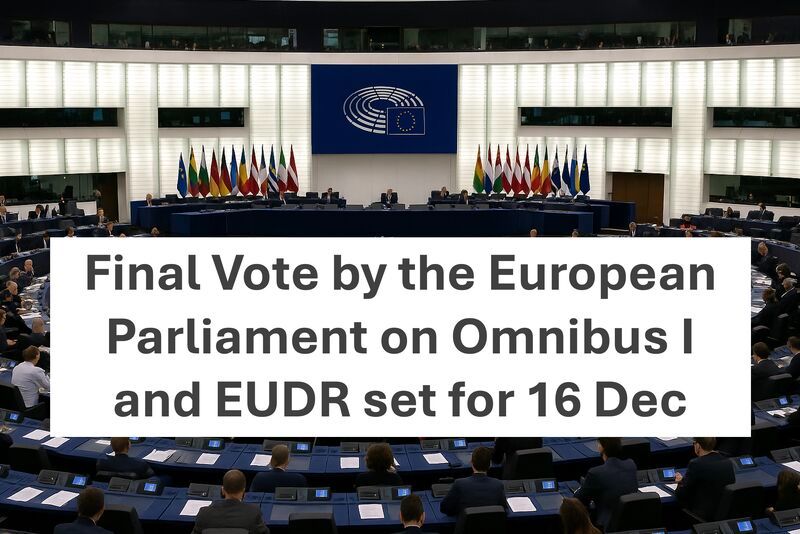

This vote is to confirm the outcomes of the trilogue negotiations, a crucial step toward regulatory certainty. The EUDR trilogue will be on 4 December, while the last date of the Omnibus trilogue is set for 8 December (per the original schedule).
It will be interesting to watch whether far-right groups continue to back the Omnibus if the trilogue outcome deviates from the Parliament’s compromise - for example, if climate transition plans are not fully removed from the CSDDD.
01-12-2025



In my own research (drawing on ongoing interviews), I have so far encountered five interconnected motivations for "voluntary action post-omnibus":
1️⃣ EXPECTATIONS: Many firms realize that while CSRD/CSDDD change, stakeholder expectations do not change - particularly from business partners, investors, and banks. These expectations act as "pressure points"...
2️⃣ FORESIGHT: Some firms do not yet face these expectations, but they anticipate them based on their observation of the broader market environment and the behaviour of their competitors.
3️⃣ VALUE CREATION: Some firms recognise the business value related to voluntary action: stronger risk management, clearer governance, and better decision-making through improved data and processes.
4️⃣ COMMUNICATION: Others see voluntary action as a way to develop and sustain a shared language on sustainability in the organization which allows for better collaboration and coordination.
5️⃣ VALUES: Some companies push for voluntary action as a natural expression of their organisational values, especially in family-owned firms where values are often strongly lived.
How firms view voluntary action depends on their prior experiences (e.g. with NFRD/CSRD) and past investments in relevant systems. For instance, value is more difficult to see without any implementation experience.
👉 All of this has significant implications for business education. We still teach too much compliance... I started to do my share. We revised our "Sustainable Business Transformation" program at CBS Executive (delivered with IMD). We do not discuss regulations as legal demands, but as frameworks for managing expectations, business value, and corporate values...
===
Link to our Program: https://lnkd.in/dD27978k
28-11-2025

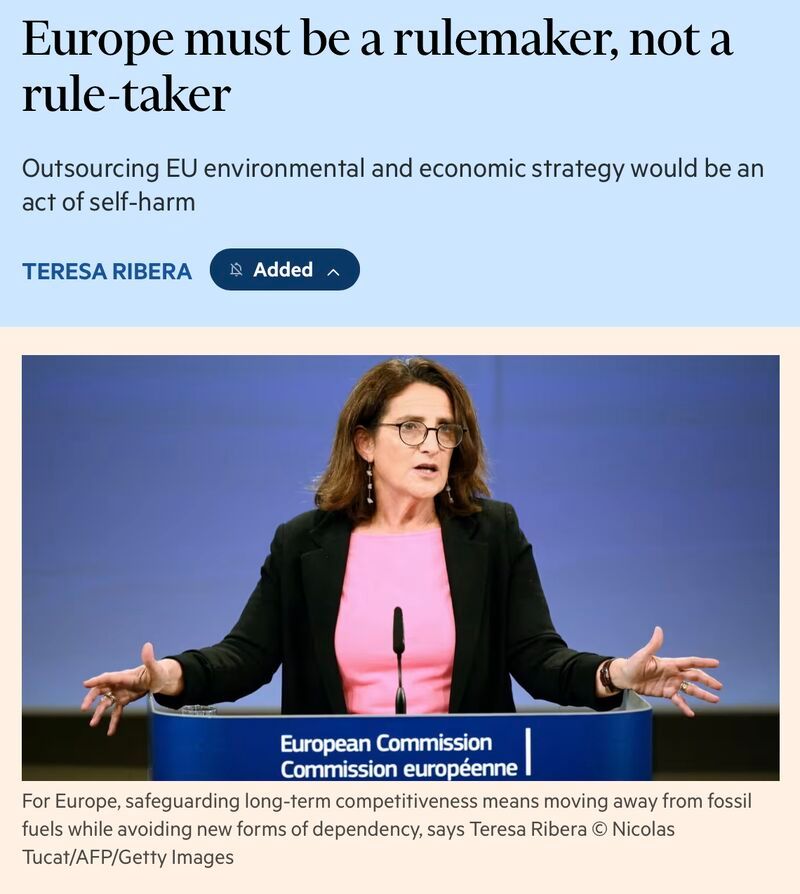

She argues that the upcoming trilogue will determine whether the EU “remains a rulemaker or becomes a rule taker in a system shaped elsewhere.” While much of the package may leave little room for renegotiation (given Council and Parliament alignment), she is right to point out that there is still space for a meaningful course correction in some areas, especially climate transition plans.
Highlights of her arguments:
➡️ "Several major economies are now following in Europe’s footsteps, mandating transition plans and introducing demanding climate disclosure rules. [...] But we cannot defend this approach if we stop measuring it, weaken traceability, or discard the tools that allow us to verify compliance."
➡️ "Reliable, high-quality and easily comparable information is the foundation on which companies design credible strategies, investors assess risks and financial supervisors fulfil their mandates. Without it, banks and asset managers would slide back to the era before sustainable finance, when they had to approach companies individually for data."
➡️ "Europe can and must simplify rules where necessary, reduce unnecessary burdens and improve consistency. But giving up on transparency, reliability and diligence [...] is not simplification. It is self-harm. Europe has always competed through high standards, innovation and quality of life."
👉 Ribera’s intervention sends an important signal: Europe can still make (some) choices, e.g., on climate transition plans. It is vital that the European Commission pushes for progressive positions during the trilogue...
27-11-2025

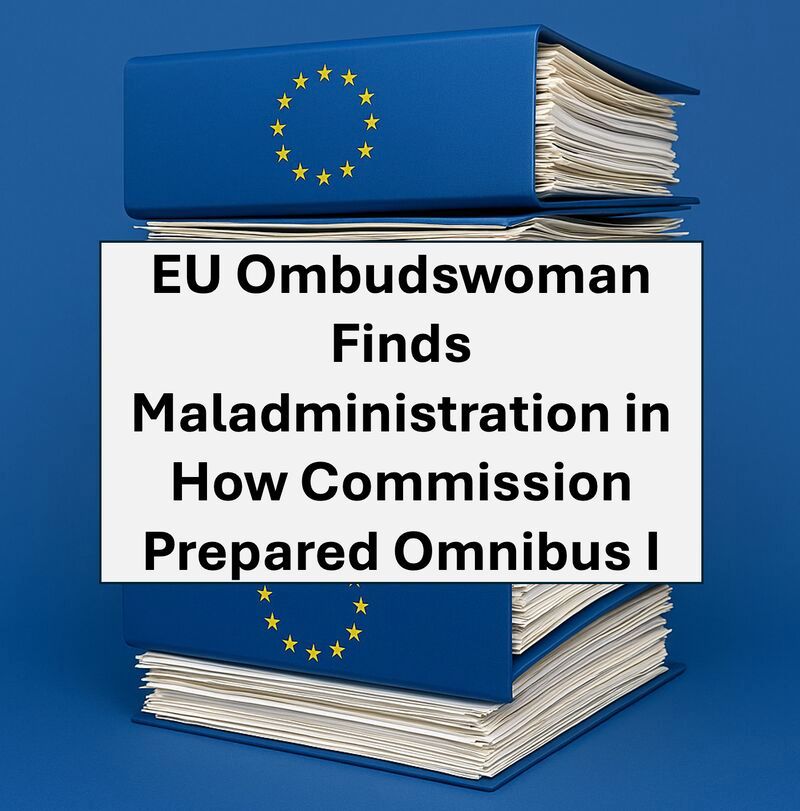

The inquiry confirmed several problems, including: (1) the insufficient justification for the urgency of the Omnibus (and two other proposals) and (2) inadequate documentation of why internal law-making rules were bypassed.
The press release stresses: “The Commission must be able to respond urgently to different situations […] However, it needs to ensure that accountability and transparency continue to be part of its legislative processes and that its actions are clearly explained to citizens. […] Certain principles of good law-making cannot be compromised even for the sake of urgency.”
Background: Earlier this year, the Ombudswoman – an independent oversight body in the EU system – received a complaint alleging that the Commission had not followed its own guidelines while preparing the Omnibus I proposal. These guidelines are meant to safeguard evidence-based, transparent, and inclusive legislative proposals.
❗While the Ombudswoman has no formal legal powers, her assessments carry significant weight. She issued several recommendations, above all that the Commission must in the future "ensure a predictable, consistent, and non-arbitrary application of Better Regulation rules."
👉 Today's outcome confirms what many have highlighted since February 2025: the Omnibus I process faces major procedural shortcomings, including the absence of a proper impact assessment and stakeholder consultation.
===
Press Release: https://lnkd.in/d2K7k-JZ
27-11-2025
While the #Omnibus debate continues to fixate on compliance costs, this study highlights the multidimensional benefits that reporting can unlock. At its core, the research identifies a value pathway:
1️⃣ TRANSFORMATION PROCESSES that reporting can trigger - including building more robust governance structures, professionalising and systematising processes that would otherwise remain ad hoc, and fostering deeper internal collaboration and stakeholder engagement.
2️⃣ TANGIBLE OUTCOMES enabled by these processes - such as improved access to capital, stronger risk management, better customer and client acquisition, and increased employer attractiveness.
Of course, whether these processes and outcomes materialise depends on firm-specific conditions (e.g., resources) and external factors (e.g., competitive pressure). There is no automatic value creation.
The study draws on a review of extensive empirical academic literature and new qualitative insights from interviews.
👉 In short: this should be mandatory reading for anyone who sees only bureaucracy and cost, while overlooking short- and long-term benefits.
It is exactly this cost-benefit balance that the simplification debate needs...
===
Kudos to the author team: Dr. Manuel Reppmann, Judith Stroehle, Laura Marie Edinger-Schons (financed by Bertelsmann Stiftung).
26-11-2025

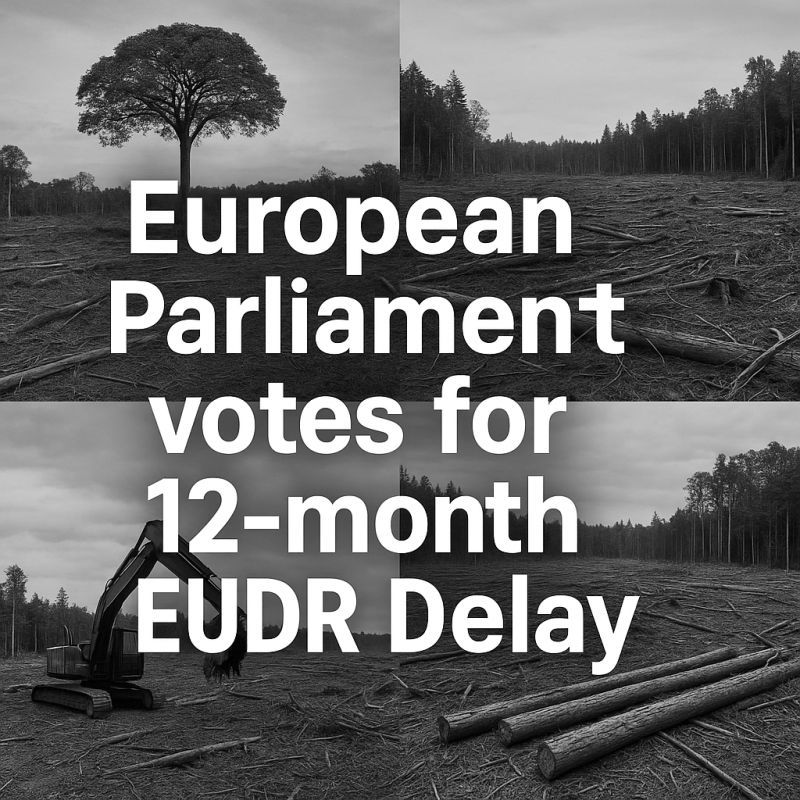

With today’s vote, the Parliament and Council positions now largely converge, making both the delay and a EUDR review in 2026 highly likely.
What today’s decision means:
➡️ New application dates: 30 December 2026 for medium and large operators; 30 June 2027 for micro and small operators
➡️ A Commission review assessing the EUDR’s “administrative burden” by April 2026, to be followed by a legislative proposal, if deemed necessary.
👉 This outcome is out of step with business reality. Companies have already invested heavily in systems, expertise, and supply-chain transparency. Yet politicians delay based on ideology rather than evidence. The message to companies is clear: invest at your own risk, because regulatory stability can no longer be taken for granted.
Let’s be clear: What we are witnessing is the emergence of an informal structural cooperation between the EPP and far-right groups. We saw it during the #Omnibus vote. We saw it today. And we will see it again.
📅 Trilogue negotiations will happen in the next weeks to agree on a final legal text before the end of the year.
24-11-2025

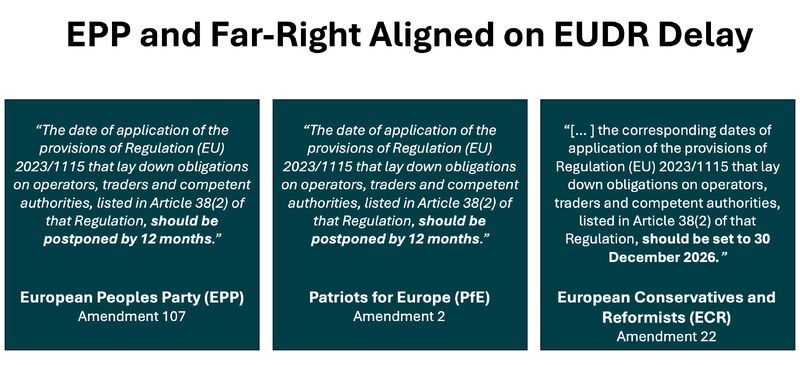

The justification for the delay remains remarkably thin. The EPP's amendment states: "This is necessary in order to allow third countries, Member States, operators and traders to be fully prepared." Interestingly, no evidence was given on the lack of preparedness, so it is more an assumption than a fact.
👉 The EPP insists it is not directly negotiating with far-right groups, but the real issue is the EPP’s refusal to compromise for a centrist majority - effectively ensuring that only a right-wing majority is possible. Once again, we see a “take it or leave it” approach rather than genuine coalition-building.
The far-right tasted power with the #Omnibus vote. On Wednesday, we may see history repeating itself...
22-11-2025

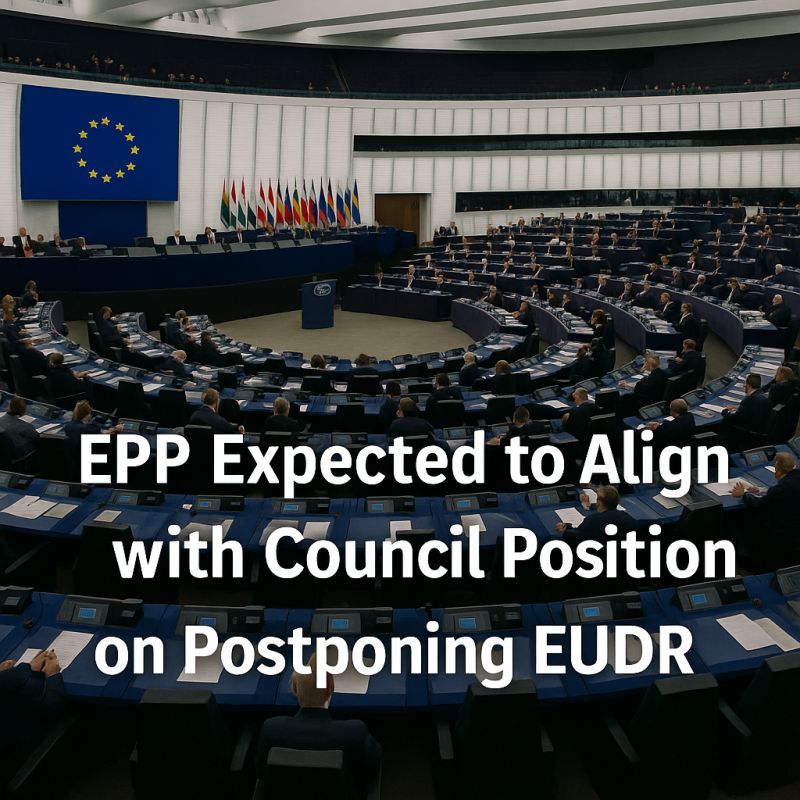

If the EPP manages to secure support from far-right groups, a majority for both the delay and a review clause becomes almost certain. Such a clause could reopen the regulation as early as April 2026.
Talks on Friday between the EPP, S&D and Renew failed. Unless the pro-European groups still find common ground, we are heading toward another vote where conservatives and far-right groups move together. It is the same dynamic we saw during the #Omnibus vote on 13 November.
👉The economic costs and uncertainty resulting from this approach, marketed as ‘simplification’, are considerable. Unsurprisingly, companies have little choice but to adopt a “wait-and-see position” amid the ongoing instability...
20-11-2025
1️⃣ Entity-level PAI disclosures: Most financial market participants will no longer need to report entity-level PAIs.
2️⃣ Product-level disclosures: Disclosures will focus on data that is "available, comparable, and meaningful", aligned with the three new product categories and easier for retail investors to interpret.
3️⃣ A three-tier product categorisation system: (1) Sustainable: products contributing to sustainability goals and meeting high sustainability standards, (2) Transition: investments backing credible environmental or social improvements.(3) ESG Basics: broader ESG approaches without meeting the first two categories.
All categories must channel 70% of the portfolio into the stated sustainability strategy and exclude harmful activities (e.g., tobacco, prohibited weapons).
And importantly: “ESG” claims in product names and marketing will be reserved for categorised products, a step to restore trust and curb greenwashing.
👉 Let’s hope Parliament and Council now move it forward constructively, without watering it down under vague notions of “competitiveness.”
20-11-2025
▶️ New application dates: 30 December 2026 for medium and large operators; 30 June 2027 for micro and small operators
▶️ Only the operators who first place a product on the EU market would be required to submit due-diligence statements.
▶️ Downstream operators and traders would no longer need to file separate due-diligence statements.
▶️ Micro and small primary operators would only need to provide a one-off simplified declaration
👉 On top of this, the Council asks the Commission to conduct a “simplification review” by 30 April 2026 to evaluate the EUDR's impact and administrative burden. Where appropriate, the review should be accompanied by a new legislative proposal.
But: How can policymakers meaningfully assess the impact and ‘burden’ of a regulation that hasn’t even entered into force? The review, again, creates uncertainty and unpredictability as the outcome is unclear...
📅 The Parliament will vote on 26 Nov (12:00-13:00), but it seems pretty clear that changes will go beyond the Commission’s original proposal...
19-11-2025



But Member States remain split. Germany, Sweden, Hungary, Austria and the Baltic States want deeper simplification (not just a delay). France, Spain, Belgium and the Netherlands are pulling firmly in the opposite direction.
The EUDR is on the Coreper I agenda (Council) today. We will see whether a review clause becomes the acceptable middle ground (qualified majority is needed).
Meanwhile, companies are increasingly vocal, and frustrated. In a letter published Monday, Nestlé, Danone, Mars and others warn that another delay would penalise early movers, writing that it would create “substantial sunk costs … and reward the laggards.” Hard to disagree.
Adding to the pressure, a new ClientEarth legal opinion argues that a further delay could breach “legal obligations under the EU treaties, general principles of EU law, and international law on State climate obligations.”
In short: a regulatory mess with barely a month left to solve it.
17-11-2025

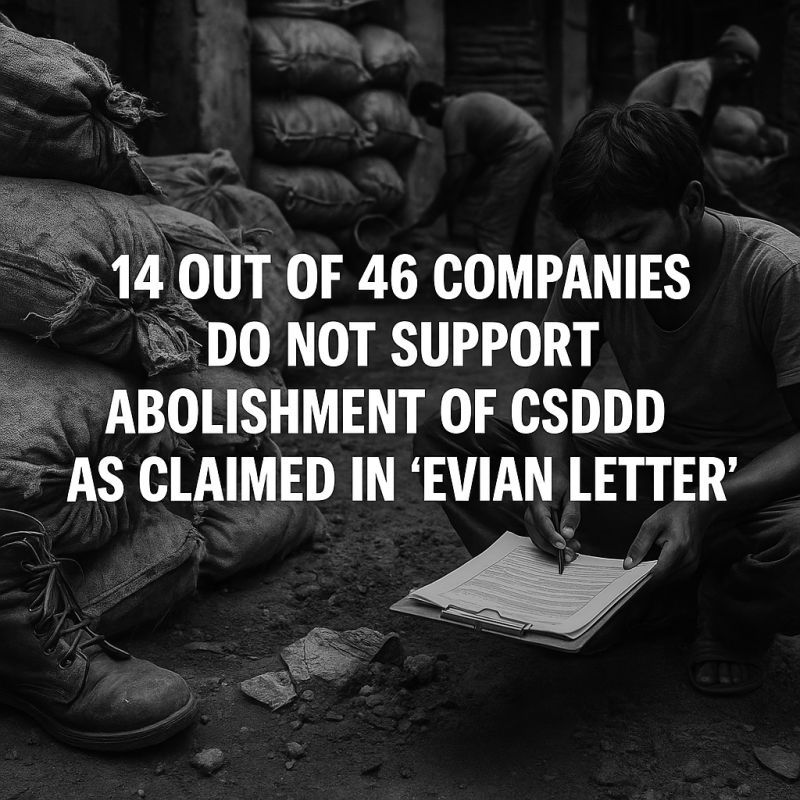

A bit of context: In October, a letter was sent to Merz and Macron calling for the complete removal of the CSDDD. It was signed by the CEOs of Siemens and TotalEnergies, who asserted they were speaking “in the name of” all 46 CEOs attending the German-French Evian Summit.
The subsequent reactions from companies tell a very different story, and highlight how easily lobbying efforts can overreach or misrepresent.
➡️ SAP said the letter “was not aligned” with their position.
➡️ Bpifrance’s CEO stated he “did not see it before it was published.”
➡️ Amundi stressed they “neither participated nor signed the letter.”
Most of the remaining firms (e.g. BMW Group, Danone, BASF) clarify that while they support simplification, they are not in favour of fully abolishing the CSDDD, as the letter suggested.
👉 Bottom line: The gap between what was claimed and what companies actually stand for is significant. Lobbying cannot be based on "wishful thinking".
Transparency in advocacy matters, and we have too little of this, especially in the context of the ongoing #Omnibus discussions...
14-11-2025

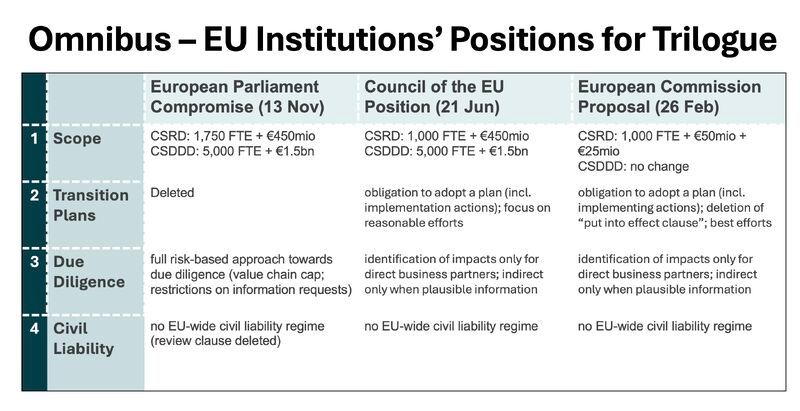

1️⃣ #CSRD scope: The gap is still pretty significant: 4,792 firms in scope under the Council vs 3,914 under Parliament, assuming a 30% subsidiary reporting rate. This amounts to choosing between 90% or 92% scope reduction.
2️⃣ Climate transition plans – key sticking point. How will the institutions bridge the data gap? Both investors and the ECB have flagged serious concerns about data availability. But Member States have an appetite for simplification these days (see the discussions around the further delay of #EUDR).
3️⃣ Civil liability – aligned (but not in a good way). The alignment will make the #CSDDD even more toothless. With the revised scope (5,000 employees / €1.5bn turnover), only around 1,300 companies across the EU would be in scope.
During trilogues, the EU’s informal yet crucial negotiation phase, there are two co-legislators: the Parliament (representing citizens) and the Council (representing Member States). The Commission acts as a facilitator, supporting the co-legislators in their work, with a view to reconciling their positions.
👉 The #Omnibus is taking shape, but the resulting negotiation position shows clearly: the EPP’s decision to side with the far-right is a serious warning sign for anyone invested in a credible sustainable transition...
13-11-2025

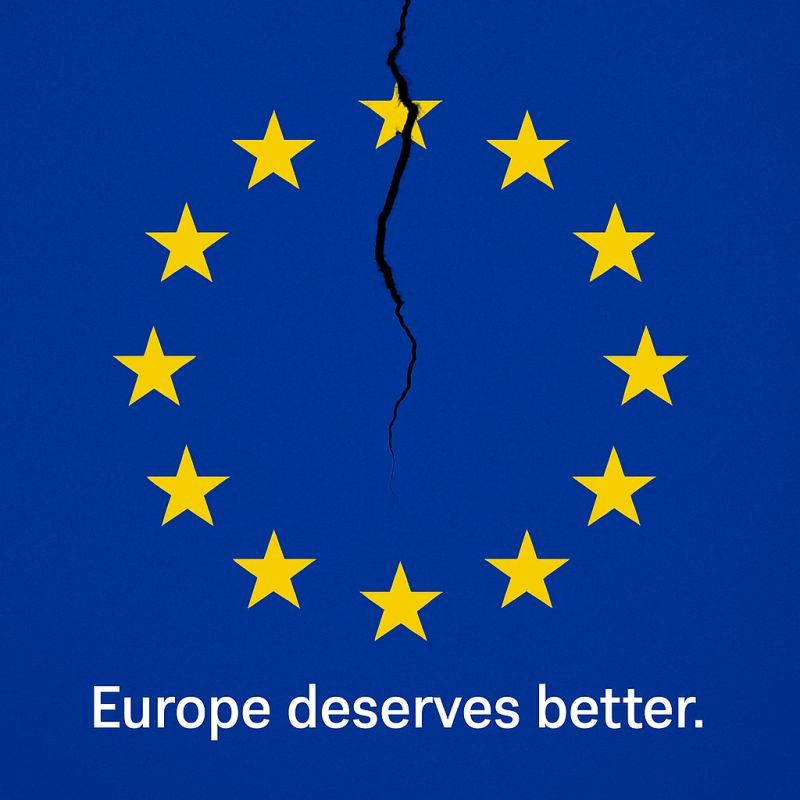

This means: (1) #CSRD threshold at 1,750FTE / 450 mio turnover (-92% of firms); (2) complete deletion of climate transition plans; and (3) no EU-wide #CSDDD civil liability (and also no review clause).
Just seven months ago, Manfred Weber (EPP Chair) said: "As a leader, I defined a clear red line to the extremists, we will never work together with those who are not respecting my three pro's: pro Ukraine, pro rule of law and pro Europe, these are fundamental things for us."
Mr Weber's red lines seem to fade very quickly.
For the first time, a major legislative file goes to trilogue on the back of an EPP and far-right alliance. This sets a dangerous precedent. The Omnibus is only the first of several packages ahead - and we may be witnessing the start of a systematic rollback of key European legislation based on this alliance.
A sad day for sustainability - but, above all, a sad day for Europe. 🇪🇺
13-11-2025

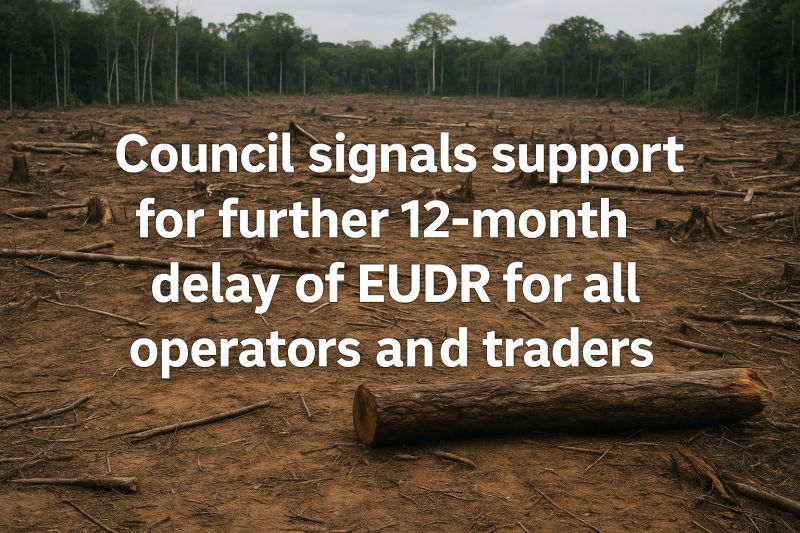

Originally, the Commission had proposed a one-year delay only for micro and small operators. The Council now wants to go further: large firms would have until end-2026, while SMEs would get until June 2027.
Despite broad backing for the delay, Member States remain divided on how far simplifications should go. As a result, no official negotiation mandate was agreed. The Danish Presidency will now have to broker a compromise in the coming days.
📅 What’s Next? Later today, the European Parliament will vote on whether to trigger the urgent procedure for the EUDR amendments — effectively fast-tracking the process. The vote on the substance will follow in an upcoming plenary session.
👉 What a mess. While businesses invest to prepare, political indecision keeps moving the goalposts. The result? More uncertainty, less credibility - and growing frustration across the board.
11-11-2025

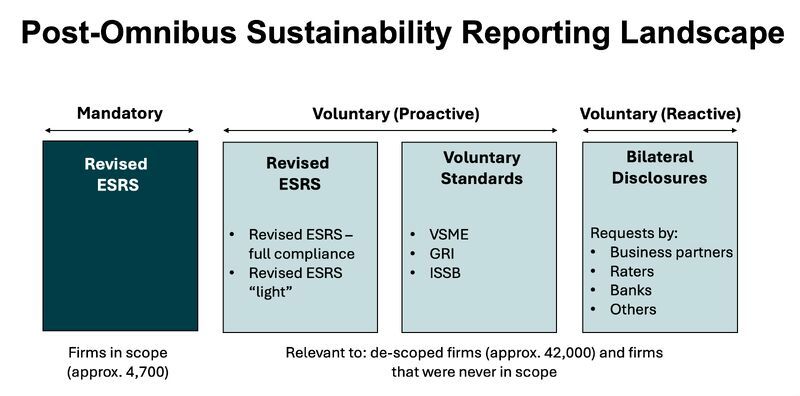

Broadly speaking, firms will fall along a spectrum from proactive to reactive (see image): (1) Some will take initiative and align proactively with existing frameworks. (2) Others will report only when asked, ticking boxes rather than setting benchmarks. Here’s a quick breakdown:
1️⃣ Revised ESRS – Some companies may voluntarily apply the revised ESRS, especially those with mature reporting systems and clear information needs. For many of them, the VSME is too limited.
2️⃣ Voluntary Standards – Others will turn to recognized voluntary standards, most likely the VSME (given the EU’s recommendation). However, GRI or ISSB could appeal to firms with global operations or investor-focused disclosures.
3️⃣ Bilateral Disclosure – Some firms won’t engage in full-fledged reporting at all, but will disclose information only upon request from business partners, banks, or rating agencies.
Of course, reality is rarely this neat. Many hybrids will emerge and a lot will depend on corporate context. Also, the proactive-reactive spectrum is tricky, e.g., because voluntary standards can be used in reactive ways.
Wherever we land with the final #CSRD scope, one thing is clear: voluntary reporting post-Omnibus will look different from the pre-Omnibus era, as market and stakeholder expectations continue to evolve...
===
Thanks to Christian Sparrevohn, Simon Taylor, and Sven Beyersdorff for discussing with me.
10-11-2025
The letter urges the European Parliament’s Legal Affairs Committee (JURI) to first seek an internal legal opinionbefore taking any further legislative steps.
A central concern? Proportionality. Under EU law, legislative measures must be “proportionate stricto sensu”, meaning the benefits must outweigh the negative effects on protected interests. Yet, no impact assessment has been carried out for the Omnibus. Without one, assessing proportionality lacks "sufficient information." And frankly, a 90% reduction in #CSRD scope hardly feels proportionate.
The signatories write: “The proposal to raise CSRD thresholds and exclude listed SMEs lacks a comparative analysis of whether ongoing ESRS reforms could deliver equivalent relief without reducing reporting scope.”
In short, the legal uncertainty around the Omnibus may not disappear even after a final text is agreed...
06-11-2025

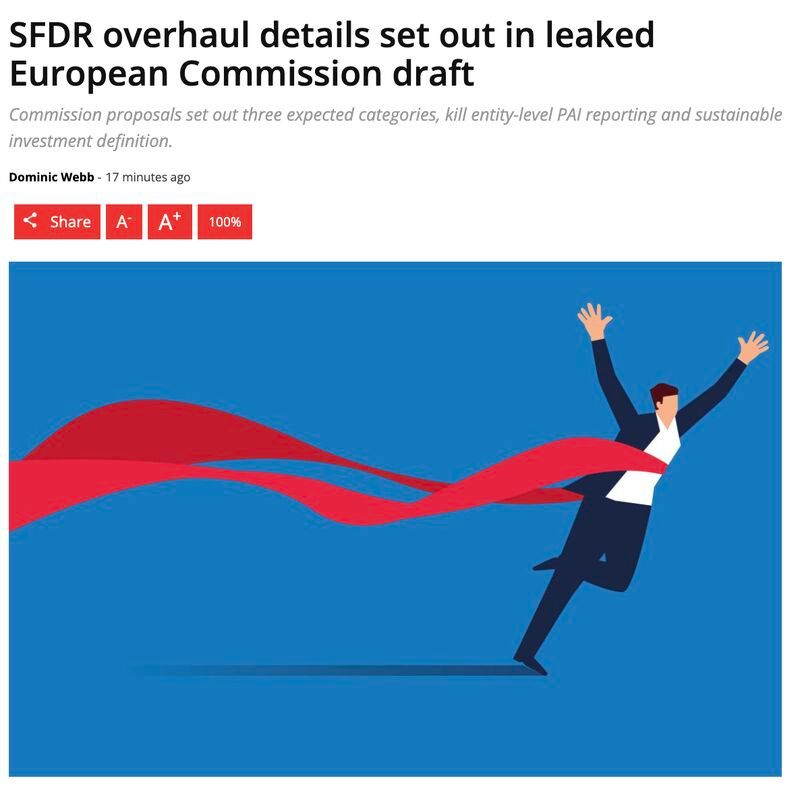

1️⃣ New Product Categories
Article 7 – Transition: Funds with ≥70% of assets linked to transition objectives.
Article 8 – Integration: Investments that outperform on sustainability or have a proven track record.
Article 9 – Sustainability Objective: At least 70% of assets in “sustainable economic activities” (e.g. taxonomy-aligned); no investments in expansive fossil fuel companies
Indicators for assessing the three categories will be anchored in the PAIs. The Commission will specify these through a Delegated Act, ensuring consistency with #CSRD disclosure requirements.
2️⃣ Simplified PAI Reporting
Entity-level disclosures scrapped, saving an estimated €56 million.
Product-level PAIs narrowed to fewer key indicators for leaner, clearer reporting.
🗓️ The formal adoption of the #SFDR simplification is expected to be discussed by the College of Commissioners on 19 November.
05-11-2025

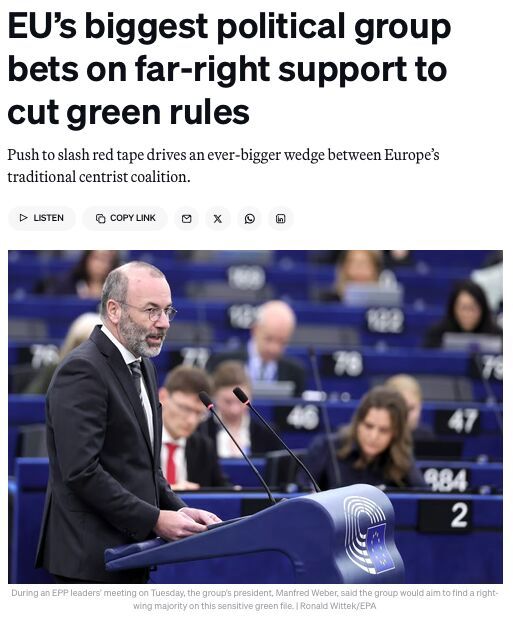

This would imply: (1) 1,750 employee / €450 mio turnover threshold for CSRD (-92%), (2) deletion of climate transition plans, (3) no EU-wide civil liability.
POLITICO writes: "During an EPP leaders’ meeting on Tuesday, the group’s president, Manfred Weber, said the group would aim to find a right-wing majority on this sensitive green file given the Socialists & Democrats had failed to support the first compromise, according to three officials with knowledge of the discussions."
It is deeply disappointing to see the EPP turn its back on Europe’s pro-European alliance just to push through short-term political gains.
The EPP’s choice is not just a tactical shift - it is a moral one, and it risks normalizing the far right as legitimate partners in shaping Europe’s future.
04-11-2025
The letter states: “We urge you to immediately comply with America’s laws and the Trump Administration’s policies and disavow the DEI and ESG directives imposed by the CSRD and CSDDD.”
CSRD and CSDDD are labelled “corrosive reporting and compliance directives” crafted by “European elites.” Meta is urged to “not allow bureaucrats in Brussels to direct your company’s policies and operations here in America.”
Let me be clear: this letter demonstrates a disregard for Europe, its institutions, and our legislative system. It amounts to bullying by several U.S. State Attorneys General.
If anything, this letter makes me proud to be European. 🇪🇺
03-11-2025

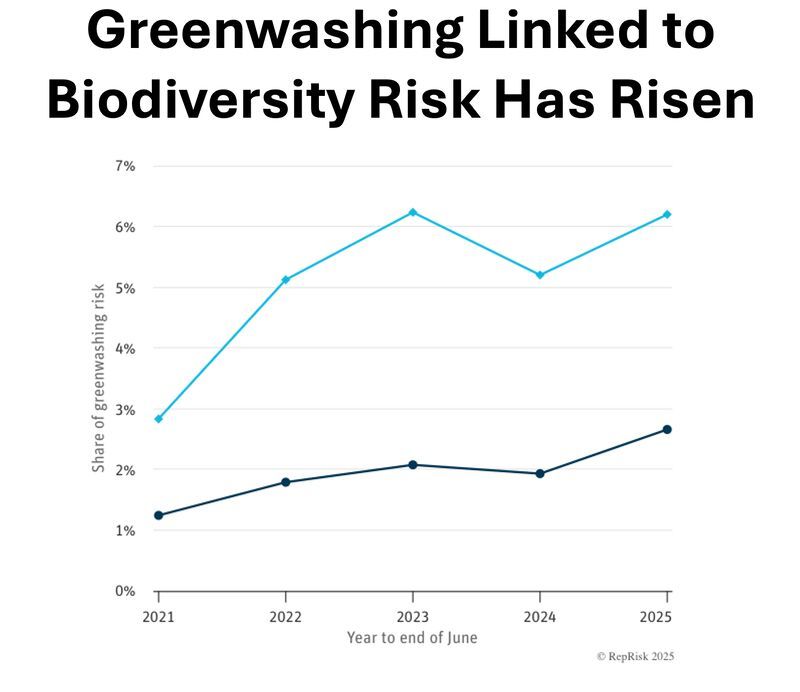

This is exactly why we need a common legal standard for disclosing biodiversity information. Transparency is not red tape - it’s the foundation for credible, comparable sustainability claims.
Yet with the #Omnibus, the EU is rolling back this common framework for 90% of companies that used to be in scope of #CSRD.
The rise in greenwashing risk is also the result of mounting pressure to appear “nature-positive”, pushing some firms toward vague, exaggerated, or misleading claims.
===
Data and report by RepRisk: https://lnkd.in/dxPmgd7K
Note: The light blue line reflects companies linked to both biodiversity and greenwashing risk, the dark blue line records incidents.
31-10-2025

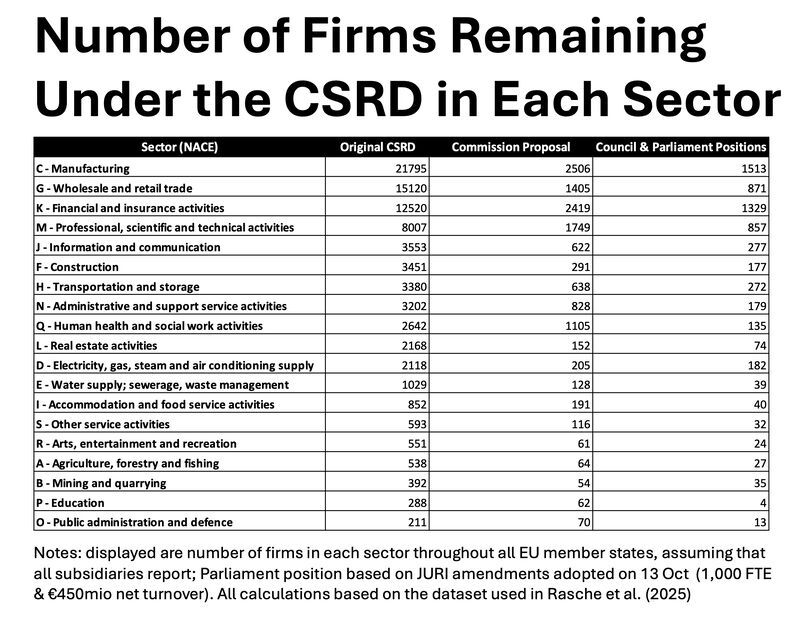

That is a striking shift, and a worrying one. The #Omnibus proposal takes a "broad-brush" approach, cutting across the economy without distinguishing between sectors that are key to the green transition.
Take construction and real estate: both would see major reductions in reporting obligations, even though high-quality sustainability data from these sectors is essential for investors assessing climate risks and for steering capital towards transition efforts.
👉 A more nuanced, sector-sensitive approach to defining the revised CSRD scope would have been far more effective. So far, “simplification” has been achieved through a simplified debate, one that overlooks where sustainability information really matters most...
===
Thanks Theodor Cojoianu, Andreas Hoepner, and Fabiola Schneider for the collaboration.
29-10-2025

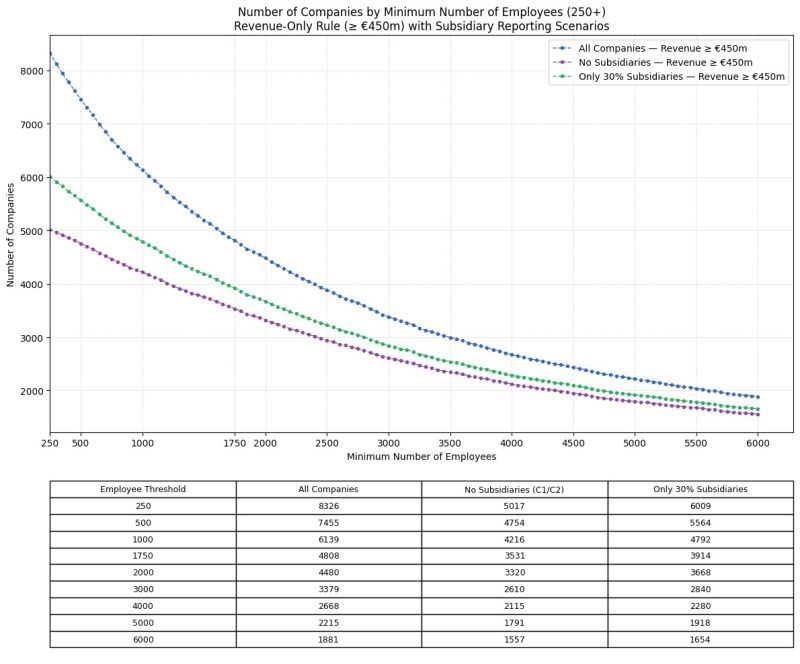

That change might sound technical, but it is not. It would exempt roughly 900 more companies, leaving only about 3,900 firms in scope across the EU (assuming a 30% subsidiary reporting rate).
This is why it is vital that centrist political groups find a genuine compromise, one that reflects better the needs of everyone who works with and depends on sustainability information.
👉 Watering down the scope of the #CSRD and #CSDDD to the point where only the very largest companies are covered turns back the clock. In 2025, it is no longer credible to pretend that sustainability and due diligence obligations are the preserve of a few giant firms.
U.S. Senator Henry Clay once said, “A good compromise is when both parties are equally dissatisfied.” We’re not there yet - but we need to be...
===
Thanks to Andreas Hoepner, Theodor Cojoianu and Fabiola Schneider for the collaboration around CSRD scope calculations.
28-10-2025

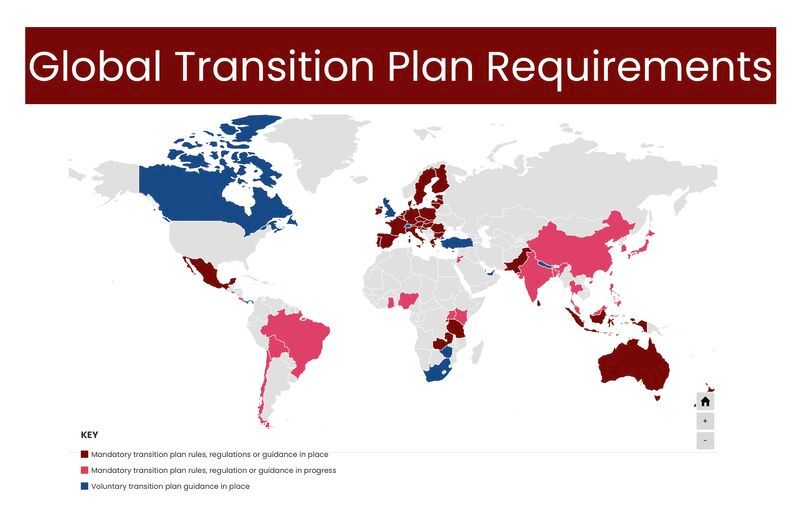

1️⃣ Mandatory adoption of transition plans is becoming the norm: from Australia and Indonesia to Mexico, New Zealand, Pakistan, Sri Lanka, Tanzania, and Zambia.
2️⃣ Momentum is building: by 2025 – 2027, several major economies (Bangladesh, Brazil, China, Ghana, India, South Korea, Thailand) are expected to make transition plans mandatory.
3️⃣ Global convergence: Most new frameworks align with ISSB standards,
though TCFD still features in some.
👉 EU policymakers should take note: Rolling back mandatory transition plans from the #CSDDD (as proposed in the compromise between the EPP and far-right parties) risks letting European companies fall behind in the global race toward credible transition planning.
===
Access the overview: https://lnkd.in/d8inpV4W (by the International Transition Plan Network (ITPN))
27-10-2025

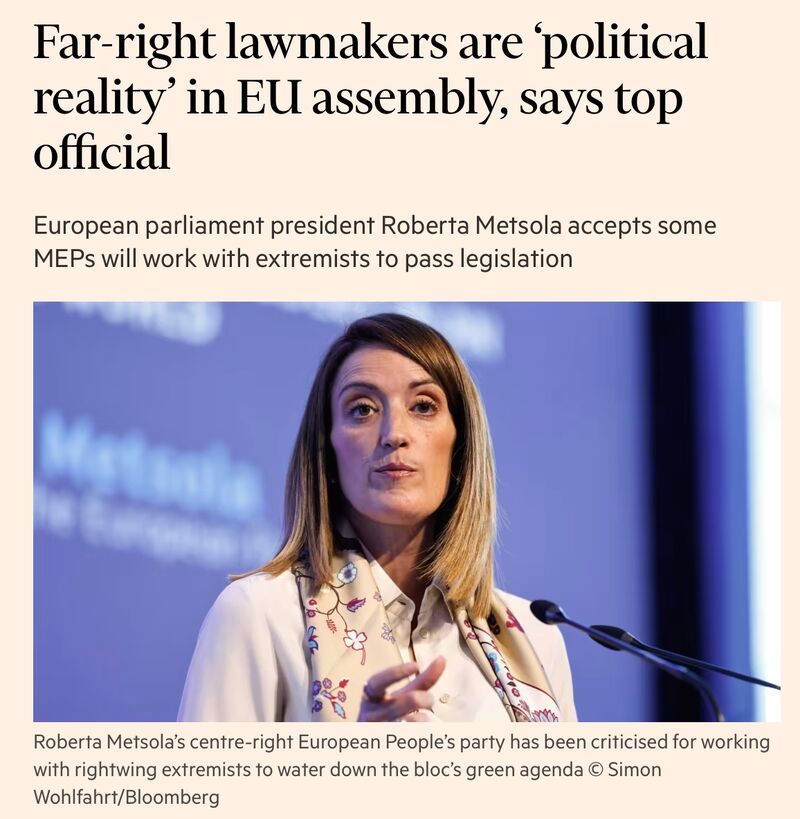

1️⃣ Chancellor Merz called last week’s Omnibus vote “unacceptable” and “a fatal mistake that must be corrected.” Let’s be clear: parliamentary votes are not subject to correction simply because a head of state dislikes the outcome.
Merz also co-signed a letter with several heads of state demanding from Council and Parliament the “swift adoption of CSRD and CSDDD simplification.”
2️⃣ European Parliament President Roberta Metsola recently said: “I’m ready to work with everyone,” hinting at possible cooperation with far-right groups due to changing "political realities".
However, as President, Metsola’s role is not to organise majorities, but to oversee the work of the Parliament and to independently represent it. But the pressure from Member States is very high. In an interview with the Financial Times, she admitted: “We have a letter that was signed by 22 heads of state saying, ‘move, move’. How am I going to translate that into moving?”
👉 Member state pressure is shaping parliamentary behaviour in ways that challenge the balance of power within the EU.
MEPs should focus on delivering a real compromise - one that earns the name - not a deal crafted to please a few heads of state. The next vote is scheduled for 13 November (at 11:00), so still some time...
24-10-2025

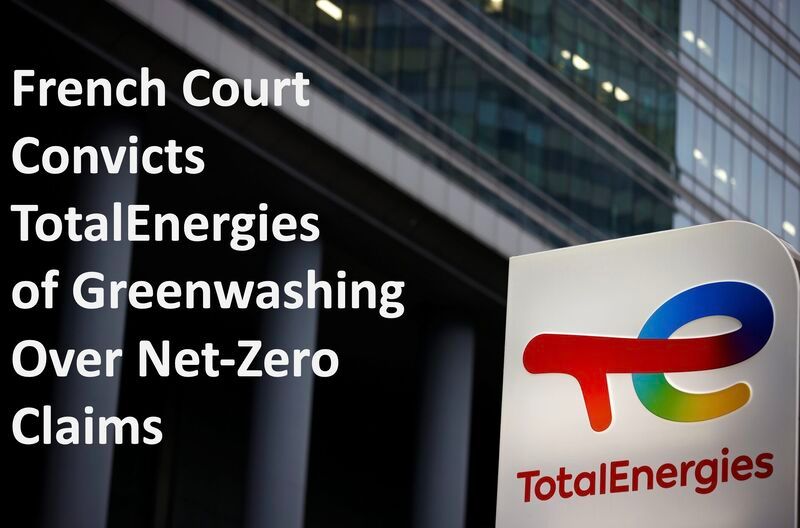

It’s been a challenging month for the company. First, the CEO signed a letter to policymakers calling for the repeal of the #CSDDD (including climate transition plans). Now comes a clear conviction for greenwashing over its net-zero claims.
The court found that TotalEnergies misled consumers into believing that it could achieve carbon neutrality by 2050 while increasing oil and gas production. The lawsuit targeted around 40 "false advertisements".
TotalEnergies now has one month to remove misleading references to carbon neutrality and the energy transition, including lines like: “Our ambition is to be a major player in the energy transition while continuing to meet the public’s energy needs.”
👉A landmark ruling and a clear reminder that climate credibility must be earned, not advertised. TotalEnergies wanted a cleaner image, instead it got a clean-up order...
22-10-2025

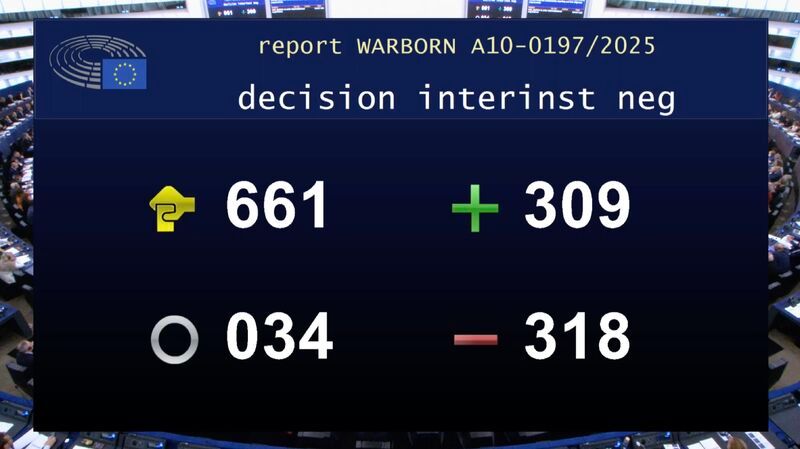

The Omnibus will now return to the next plenary session (11–13 November) for a full vote. A new deadline for amendments will be set, which could reopen parts of the compromise.
At this stage, the key question is: where will a majority for the amendments come from? Today’s vote suggests that the current centre alliance may lack the numbers to push the current compromise through in plenary.
One thing is clear: an alignment between the EPP and far-right groups would set a dangerous precedent and should be avoided at all costs!
22-10-2025

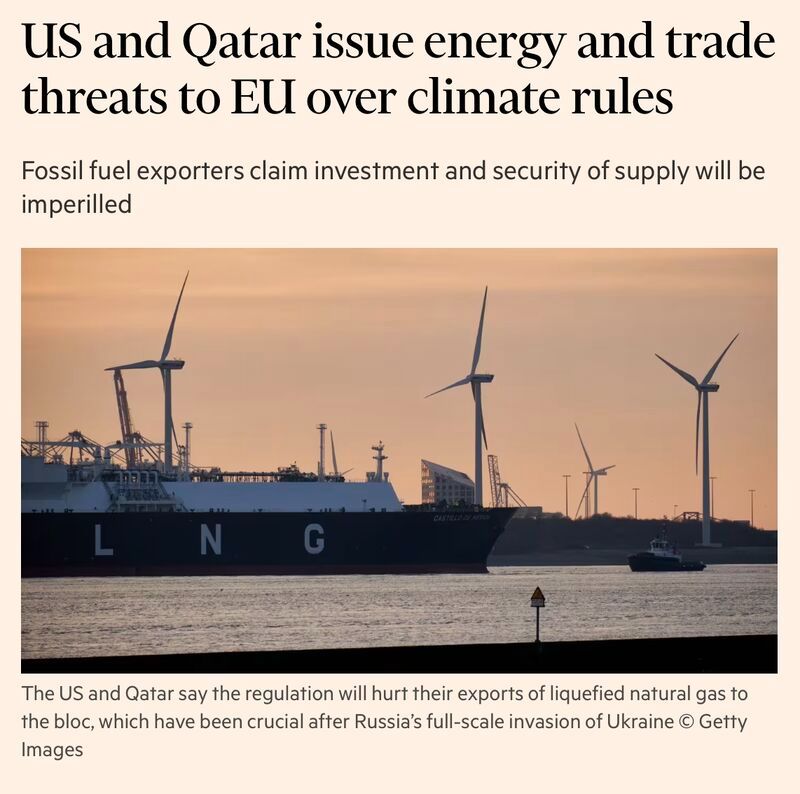

The letter bluntly states: “Beyond the direct energy security risks, the CSDDD also threatens to disrupt trade and investments across nearly all the EU’s partner economies. Its implementation could jeopardise existing and future investments, employment and compliance with recent trade agreements.”
The CSDDD has been watered down significantly but Qatar’s energy minister, Saad al-Kaabi, told Reuters that further changes are needed, claiming that the current amendments did not address their concerns (mostly penalties and climate transition plans).
👉 It’s frankly disgraceful to see the U.S. and Qatar trying to bully Europe into rewriting its own laws. Europe must stand firm, our sovereignty and regulatory independence are not bargaining chips.
Ursula von der Leyen summarised it well in her State of the Union: “I want to be crystal clear on one point: whether on environmental or digital regulation, we set our own standards, we set our own regulations.”
22-10-2025

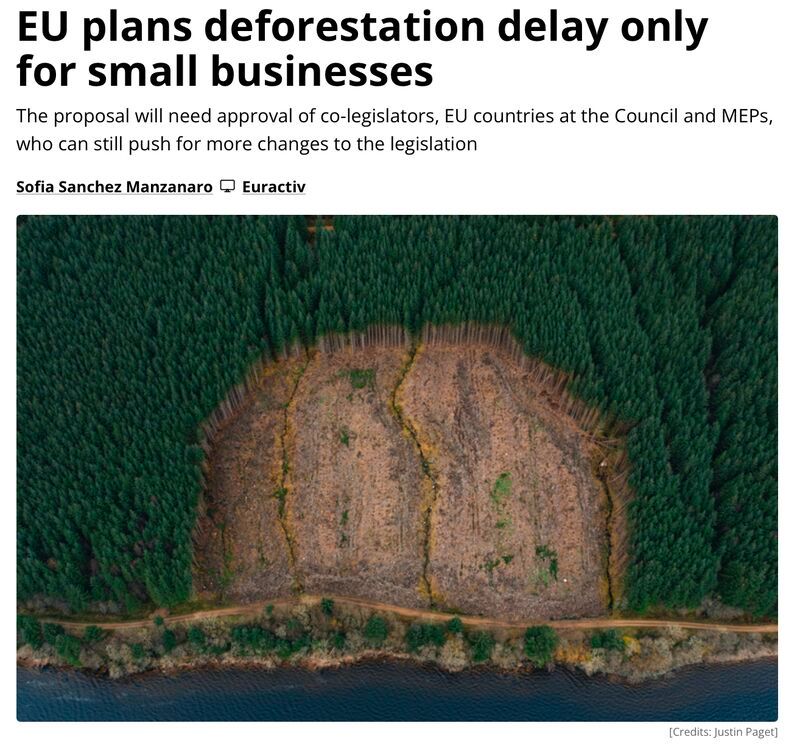

For these smaller operators, a postponement until December 2026 - along with a simplified due diligence process - is being discussed. For everyone else, the EUDR is still set to enter into force on 30 December 2025.
EURACTIV reports that this decision was reached during a Commissioners’ meeting earlier today. The Parliament and Council still need to sign off, potentially opening the door for further adjustments.
Interestingly, the IT system issues cited as the reason for the delay do not seem to be so significant after all...
===
Official Commission Statement: https://lnkd.in/dTfvN3cT
EURACTIV story: https://lnkd.in/ddawKcb2
21-10-2025

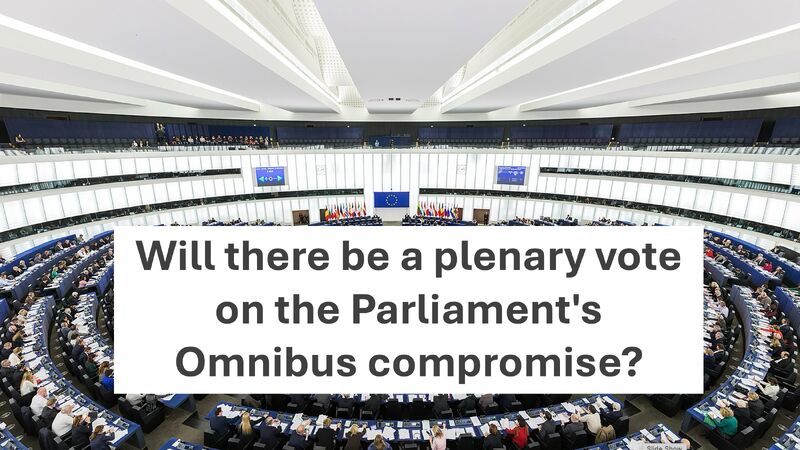

Background: On 13 October, the JURI Committee not only voted on the Omnibus compromise, but it also voted in favour of entering trilogue negotiations directly without(!) a prior plenary vote.
But this decision is now being challenged by some MEPs who believe that the whole plenary should vote on the compromise (and not just a Committee). It appears likely that the threshold required to contest JURI's decision (10% of MEPs) will be reached.
As a result, it is very well possible that on Wednesday the plenary will vote on whether to confirm or reject the mandate to go directly to the trilogue.
1️⃣ If the plenary confirms the mandate, trilogue negotiations will begin on 24 October.
2️⃣ If the plenary rejects it, the Omnibus will return to the next plenary session (11–13 November) for a full vote. In that case, a new deadline for amendments will be set, meaning parts of the compromise could once again be reopened.
👉 Given the far-reaching nature of the proposed changes, I believe it is both right and fair that the full plenary should decide whether to give this mandate for trilogue negotiations.
20-10-2025

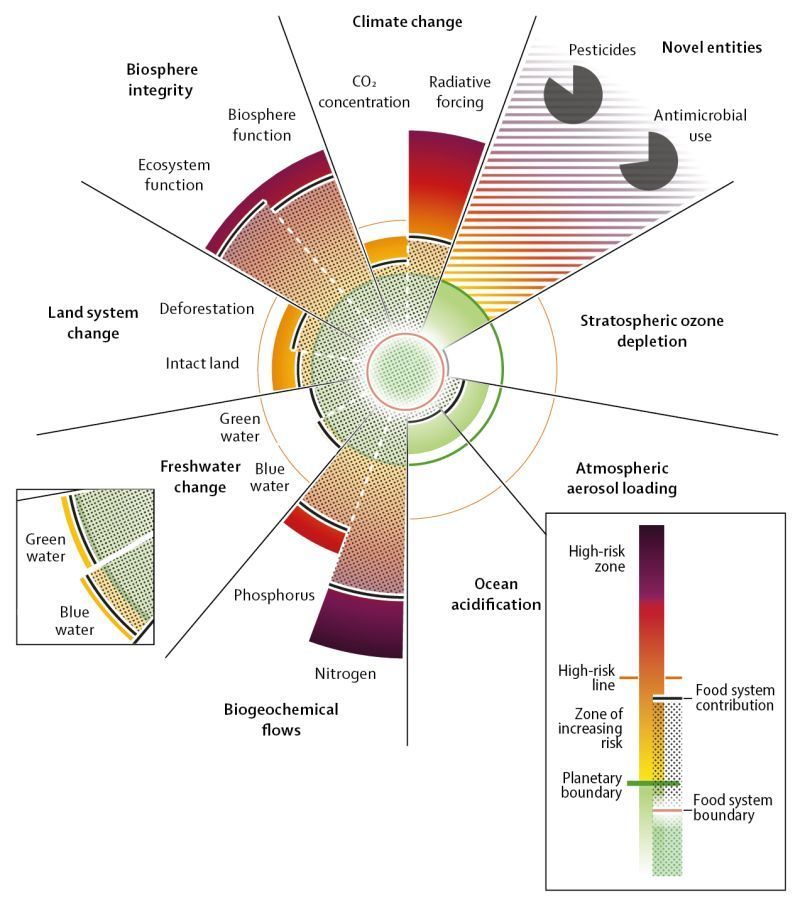

Food drives five of the six breached planetary boundaries, from climate and biodiversity loss to nitrogen, phosphorus, and freshwater use. Food production contributes to nearly one-third of global GHG emissions, e.g. from cattle methane and fertiliser use to deforestation for animal feed.
The report emphasises that this is not just about agriculture, it’s about rethinking an entire system: what we eat, grow, use land, and deal with waste.
👉 But political will to tackle this systemic issue is lacking, the EU is a good example. In 2020, the EU published its "Farm to Fork" strategy as a central pillar of the Green Deal.
But this grand vision has faded into political fatigue, with many flagship measures being delayed or not moving forward (e.g., the legislative framework for sustainable food systems that was planned for 2023).
The message is clear: food systems are both a major part of the problem, but can also be a major part of the solution (given that politicians and consumers are ready to change behaviour).
===
EAT-Lancet Report: https://lnkd.in/dfFHKWZ3
18-10-2025

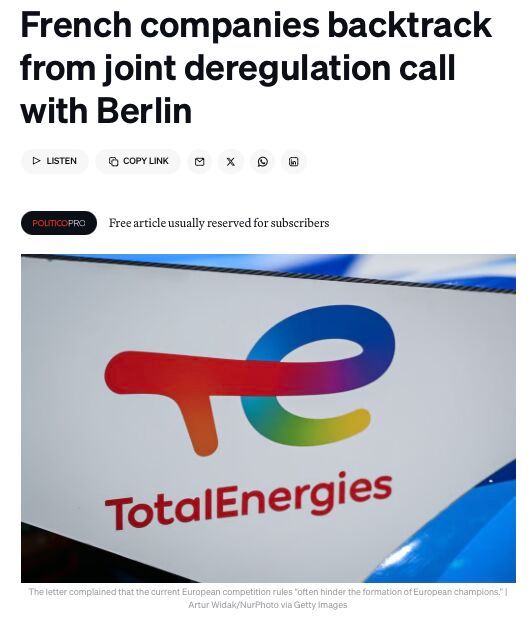

According to POLITICO, some signatories now claim they were “encouraged to write it" by their national governments. That is quite remarkable, because with this the CEOs shift the blame for their demands onto Berlin and Paris.
Meanwhile, the CEO of Bpifrance has made it clear he does not consider himself bound by the letter, also because he did not even see the letter before it was published. Yet, the CEOs of Siemens and TotalEnergies wrote the letter "in the name of" all 46 participants at the Evian Summit.
Deutsche Börse still stands by the letter - their spokesperson said the company “supports the contents.” Bosch, too, has not distanced itself from the demands in a comment.
👉 The lack of transparency surrounding this letter is astonishing, almost as astonishing as companies' lack of courage to stand by their own views.
===
I put the full list of signatories into a comment.
16-10-2025

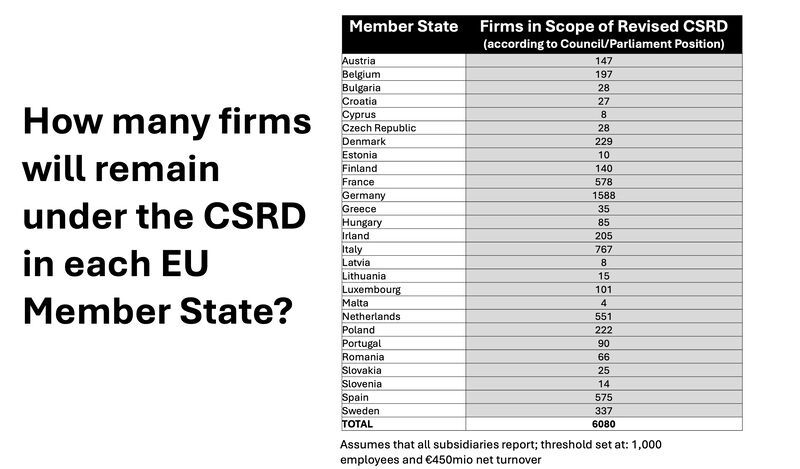

In several smaller Member States, only a handful of companies would still be required to report. Germany will still have the largest CSRD population, covering roughly 1,600 companies.
Across the EU as a whole, approximately 6,000 companies would fall under the revised CSRD if all subsidiaries would report (i.e. the subsidiary exemption is not used at all). However, in practice, the numbers will be even lower as, of course, the exemption will be used.
If we assume that 30% of subsidiaries report, the number drops to around 4,700 companies - and if no subsidiaries report, just over 4,200 companies throughout the EU would remain in scope.
👉 Bottom line: The CSRD landscape across Member States is about to change significantly. As fewer companies remain in scope, the debate on the business value of voluntary reporting becomes increasingly crucial.



15-10-2025

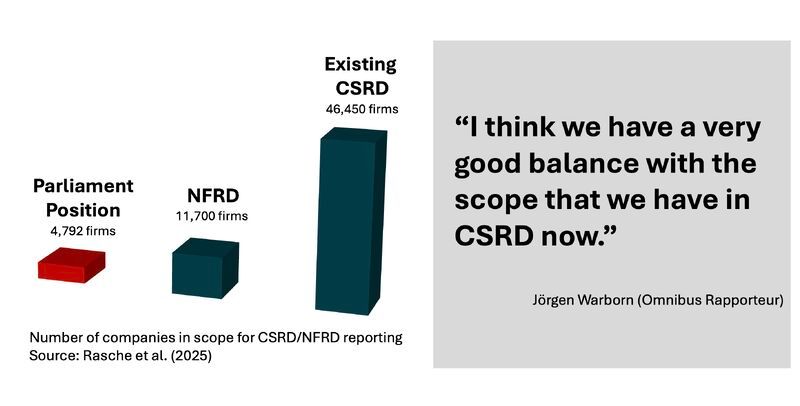

🔹 “The scope is well-balanced.”
Mr Warborn said: “I think we have a very good balance with the scope that we have in CSRD now.” The assumption: exempting 90% of companies strikes the right equilibrium between simplification and information needs. The reality: investors, businesses, academics, and the ECB have warned that such a narrow scope (even much below the NFRD) undermines the availability of sustainability information.
🔹 “Voluntary action will fill the void.”
When asked about the lack of data available to investors, Mr Warborn replied: “There is always a voluntary possibility for companies, that would like to have the capital, to provide information.” But voluntary sustainability reporting cannot fill systemic information gaps. You cannot regulate by wishful thinking...
🔹 “Plans without actions work.”
On climate transition plans, he said: “You have to show that you have them, but not what you actually need to do.” In other words, companies must adopt a plan, but not include implementation measures. That turns transition plans into box-ticking exercises, not tools for real change. Having a transition plan without actions is a bit like cooking with a recipe but without ingredients.
🔹 “Corporate complaints weigh more than accountability.”
Mr Warborn argued that one reason to drop EU-wide civil liability was because “you had complaints by companies and a lot of resistance for investing in Europe.” Apparently, corporate discomfort outweighs citizens’ right to a harmonised and strong EU-wide civil liability regime.
👉 These four assumptions are deeply problematic. They show why the current “simplification” debate risks misleading both businesses and citizens. Again: simplification itself isn’t the issue. It’s the kind of simplification being pursued, and the assumptions behind it.
14-10-2025

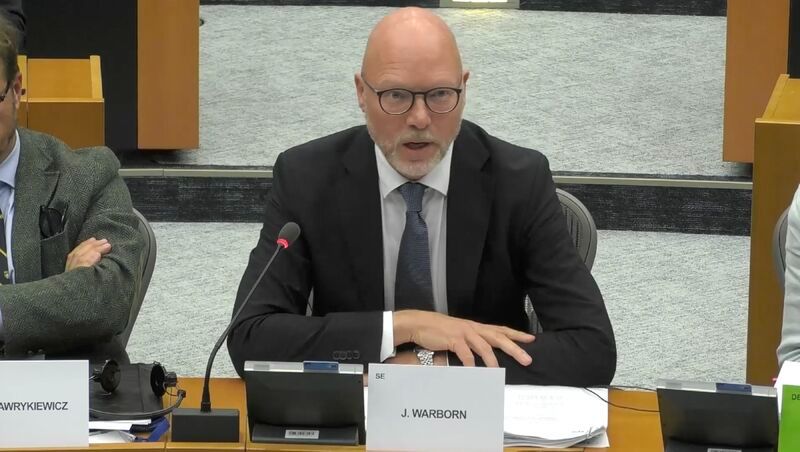

Good that there is finally more clarity. For many businesses the lack of certainty and predictability was/is a significant problem that holds back action and investments.
👉 But let’s be clear: this “compromise” didn’t emerge from consensus, but from the EPP’s threat to partner with the far right That kind of political brinkmanship undermines trust and poisons cooperation in the Parliament.
Flirting with the far right to pressure democratic partners is not responsible leadership. It is short-term power politics that risks eroding the democratic values the European Parliament is meant to uphold.
===
❗ I discuss the details of the Parliament's comprise with Richard Howitt and Julia Otten (Responsible Companies, Frank Bold) - thanks to both for the great conversation: https://lnkd.in/djgRc7bU
13-10-2025

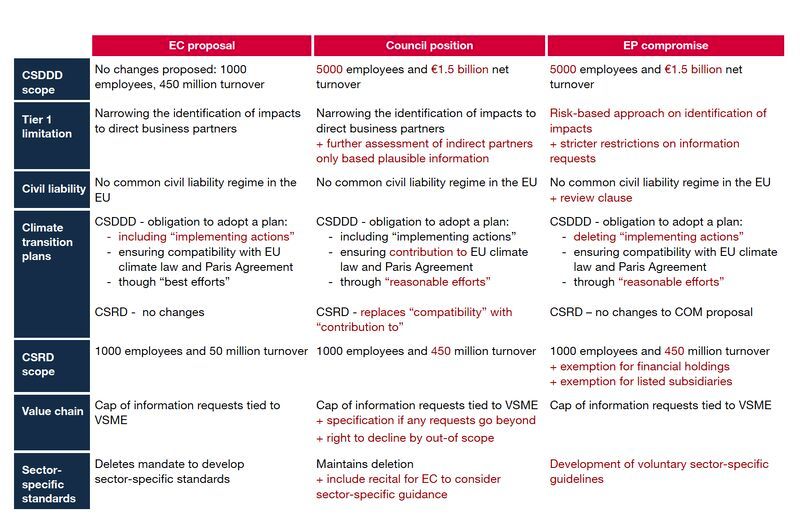

🔍CONTENT:
The comparison below (prepared by Responsible Companies, Frank Bold) summarises the three existing institutional positions: Commission, Council, and Parliament. Key takeaways:
1️⃣ Scope: Both co-legislators (Parliament and Council) largely align on the scope of the #CSRD and #CSDDD. The Commission’s proposal differs, but given its limited role in the trilogue, major changes on this point appear unlikely.
2️⃣ Approach to Due Diligence: The Parliament shifts further towards a fully risk-based approach and adds stricter limits on information requests. The trilogue will need to fine-tune scoping and assessment obligations.
3️⃣ Climate Transition Plans: All institutions agree that companies should adopt plans, the previous requirement to “put them into effect” has been deleted. The Parliament also proposes to delete the obligation to detail “implementing actions” within the plans, while the Council retains it.
4️⃣ Civil Liability: All institutions agree to remove the EU-wide civil liability regime - a significant retreat for corporate accountability.
🏛️PROCESS:
The Legal Affairs Committee (JURI) votes today, followed by a plenary vote next week. If both votes endorse the compromise text (which is likely), trilogue negotiations will begin.
Trilogues are informal negotiations between the Parliament, Council, and Commission aimed at reaching a provisional political agreement. The Commission acts primarily as facilitator and advisor, while the co-legislators take the lead. For the Omnibus package, the final trilogue session is currently scheduled for 8 December (subject to change).
10-10-2025



This reads a bit like: “We acknowledge that deregulation is underway, but it’s not enough. If you 'really' want to deliver, scrap it entirely.”
The letter - signed by the CEOs of TotalEnergies and Siemens on behalf of all 46 CEOs - stands in striking contrast to both companies’ commitments under the United Nations Global Compact. Calling for the repeal of mandatory due diligence rules is fundamentally incompatible with the Compact’s ten principles.
Dated 6 October, the letter emerged from the annual Franco-German business leaders’ meeting in Évian. It shows that even after the CSDDD was heavily watered down (now likely to cover only around 1,000 group companies post-Omnibus), some of the few remaining in scope are still pushing for more.
===
Reuters: https://lnkd.in/dgDCeixN
09-10-2025

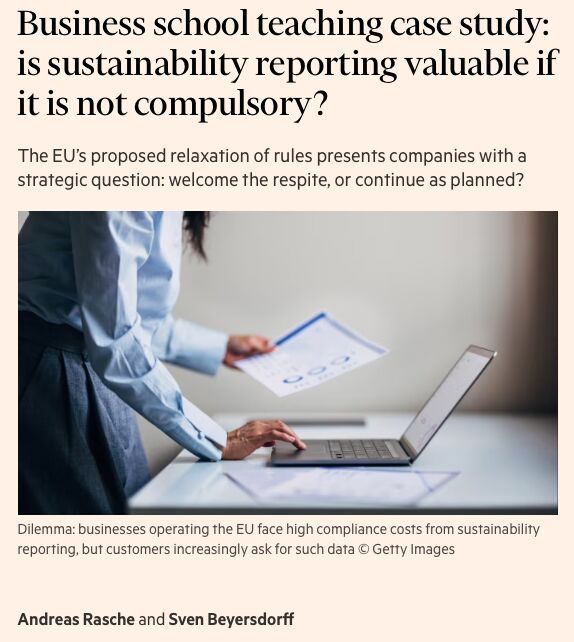

The case examines the immediate implications of the Omnibus for #CSRD reporting. It tells the story of DEIF, a Danish mid-sized company that chose to keep reporting, not because it had to, but because it saw strategic value in transparency.
The case can be used in teaching settings (e.g., business schools), but it can (and should!) also be used by companies seeking to reflect on the broader implications of scaling back reporting regulation.
👉 Understanding why and how companies choose to act in the context of the Omnibus is a learning opportunity, and we should treat it as such - despite all the disappointment about the regulatory rollback.
Many thanks to my brilliant co-author Sven Beyersdorff as well as to DEIF for collaborating with us on this project.
===
🔍 Read it now: https://lnkd.in/diSRN-B8
09-10-2025

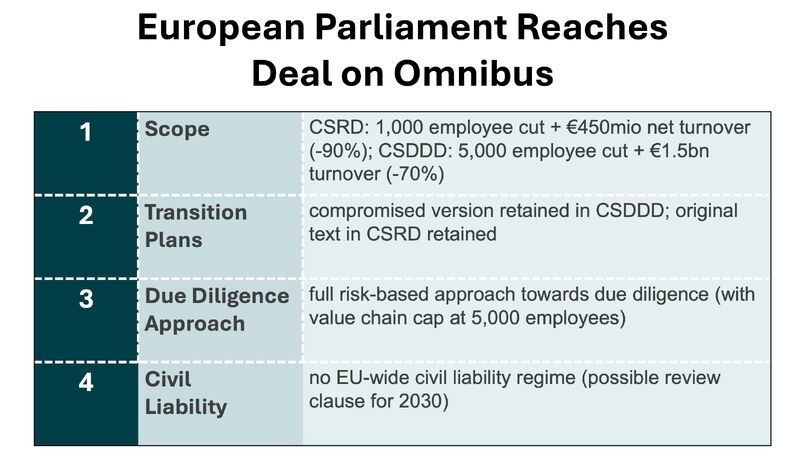

It is good to have a deal as this reduces uncertainty (see image for details). But the message is very troubling: threats now seem to be the regular way of handling things within the "von der Leyen majority".
The final outcome feels less like consensus and more like capitulation. Lara Wolters, S&D’s lead on the omnibus file, resigned as negotiator in protest.
👉 Companies with fewer than 1,000 employees can now be confident that they will be exempted from #CSRD, as the Commission, Council, and Parliament align on this threshold. Open question: will €450 million really hold as the final cut-off, as the Commission proposes €50 million?
The 5,000 employee and €1.5bn cut on #CSDDD is unacceptable - this makes due diligence only relevant to a few very large companies, and even these very few will face no common civil liability regime (all three institutions agree on this).
❗ This deal may bring closure - but at a very high cost for sustainability and for the credibility of the "von der Leyen majority" in the Parliament.
===
📅 Next steps: vote in the Legal Affairs committee (JURI) on 13 Oct; then a plenary vote in the Parliament the week after. This is followed by the trilogue negotiations in November and December to negotiate a final legal text.
08-10-2025



Today, the plan to potentially side with the far right has surfaced as a voting list which built upon the EPP’s compromise proposal with the far right. This proposal between the EPP and far right political groups reflects these points, but very important to note that the word has not been spoken yet and the negotiations are ongoing, so we still might see a different compromise:
1️⃣ Scope: CSRD: 1,750 employee cut + EUR 450 mio net turnover (-92%); CSDDD: 5,000 employee cut + EUR 1.5 bn turnover (-70%)
2️⃣ Climate Transition Plans: deletion in CSDDD; original text in CSRD retained
3️⃣ CSDDD Due Diligence Approach: fully risk based approach (with value chain cap at 5,000 employees)
4️⃣ Civil Liability: no EU-wide civil liability regime
Of course, technically speaking, these points can still be changed and negotiations are still ongoing. But, for this to happen we would need to see a real change of direction and a real willingness to compromise...
By siding with far-right groups, the EPP would take the easy way out – a move that reveals both internal pressure and a lack of willingness to work towards suitable compromises. It would imply to chose short-term political expediency over long-term responsibility.
👉 Europe’s citizens deserve leadership that safeguards their future, not bargains it away. By threatening to side with the far-right, the EPP shows that it is unable to deliver such leadership. The political parties in the centre should now really get their act together and work on a compromise that reflects the centre.
Fingers crossed that such a turn of events can be avoided. It would neither be good for democracy nor for sustainability...
===
News story: https://lnkd.in/dbhjBCp4
08-10-2025

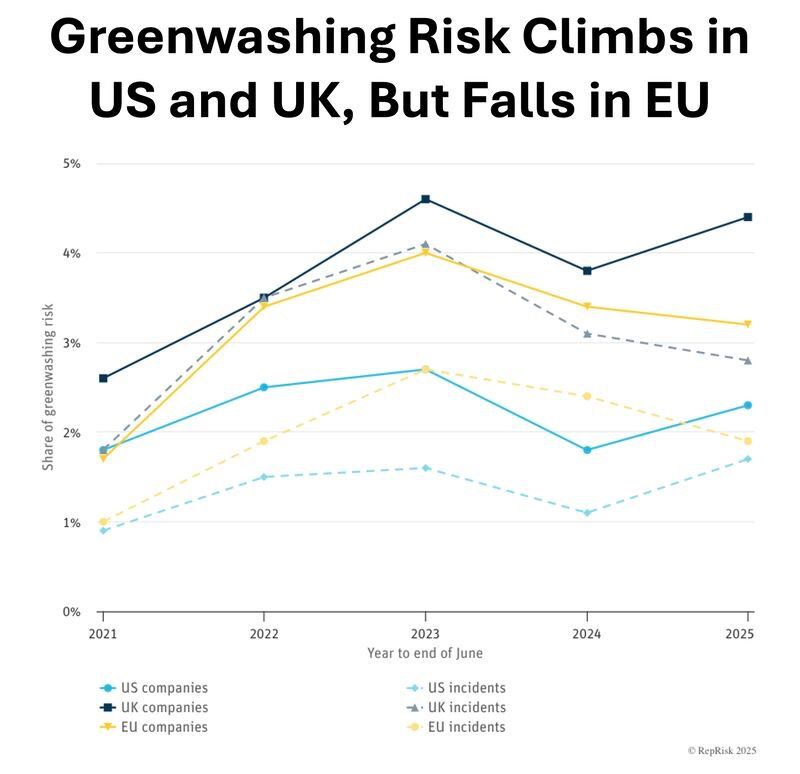

1️⃣ ISSUES: Greenwashing tied to biodiversity has tripled. As pressure mounts to appear “nature-positive,” too many companies are responding with vague promises instead of verifiable plans.
2️⃣ SECTORS: Banking & Financial Services is the sector with the most companies linked to greenwashing risk (followed by Retail and Food & Beverage).
3️⃣ PERSISTENCE: Greenwashing is becoming a recurring feature of business conduct in some sectors: nearly 7 in 10 airlines flagged in 2024 were flagged again in 2025. The automotive sector shows similar patterns.
👉 Greenwashing isn’t fading — it’s evolving. EU Regulators must stay the course. Now is not the time to water down or scrap the EU Green Claims Directive...
===
Access the Report: https://lnkd.in/dpJZitMF
07-10-2025
Instead, they propose a practical solution: if firms are unable to use the IT system or face specific technical difficulties, such cases should be recognised as force majeure for both compliance and enforcement purposes.
Signatories include Nestlé, Ferrero, Mars, Tony's Chocolonely as well as several other companies and organizations.
👉 The Commission should listen: There are workable solutions to the technical issues (if these are really the main problem). We do not always need to delay a regulation whenever we encounter a challenge. Delay should be a last resort.
The companies themselves are urging the Commission to “not penalise the long-standing investments” they have already made
06-10-2025

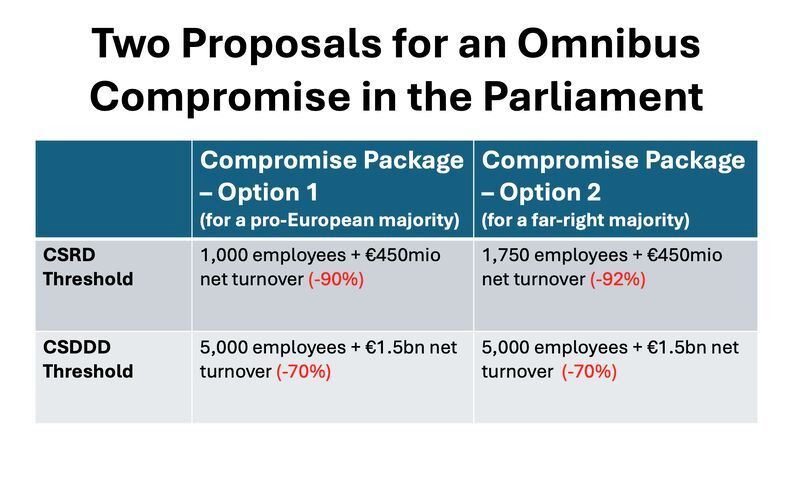

Let’s be clear about two things 👇
1️⃣ Such significant scope reductions have really nothing to do with regulatory simplification. This takes us back to a time when sustainability was seen as something only big corporations could afford. The idea that voluntary action will fill the gap is wishful thinking, and research doesn’t support it.
2️⃣ Playing the far-right card is reckless. Flirting with a majority that undermines shared European values only fuels polarisation. It makes the EPP look like it wants a "simplified debate" instead of a "debate about simplifications".
The role of politics is to bridge differences, not deepen divides. Negotiators still have until Wednesday to do exactly that...
04-10-2025

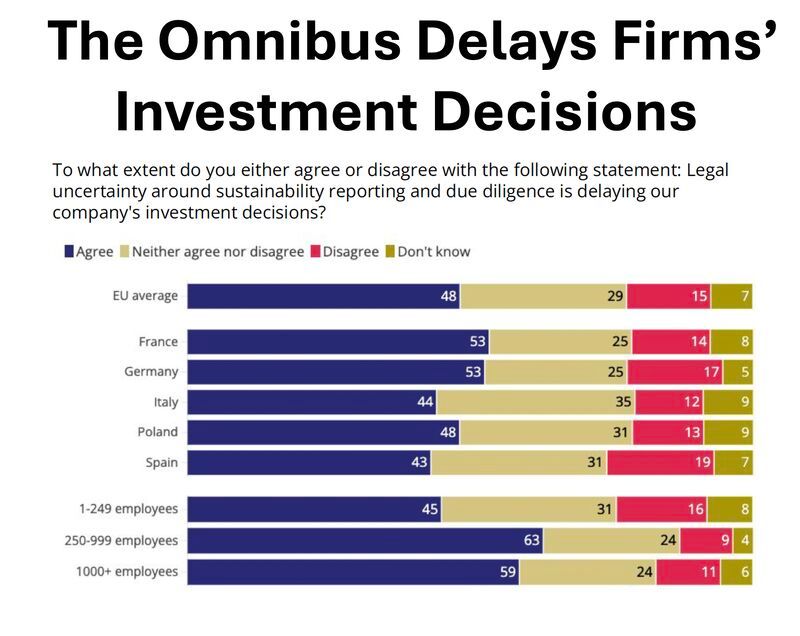

The constant back-and-forth around sustainability regulation has created a "wait-and-see" mentality. This is bad news both for competitiveness and for sustainability. In particular, larger firms are holding back on investments.
The survey also shows a clear disconnect between policymakers and businesses: while some policymakers argue that cutting red tape will drive competitiveness, companies themselves point instead to lower energy prices and investment in research and infrastructure as the real drivers of growth.
👉 In short: expecting the Omnibus to magically boost economic growth is misguided. According to this data, it does the exact opposite: it delays needed investments and creates uncertainty.
📅 Join and me and Heidi Hautala (former Vice President of the European Parliament and strategic adviser on sustainability) for a webinar on 20 October, 9:00-9:45 CET to discuss the current status of the Omnibus package. Sign up here: https://lnkd.in/dDSa68WH
===
The survey was conducted by YouGov on behalf of E3G. It can be accessed here: https://lnkd.in/dKmJejn6
03-10-2025

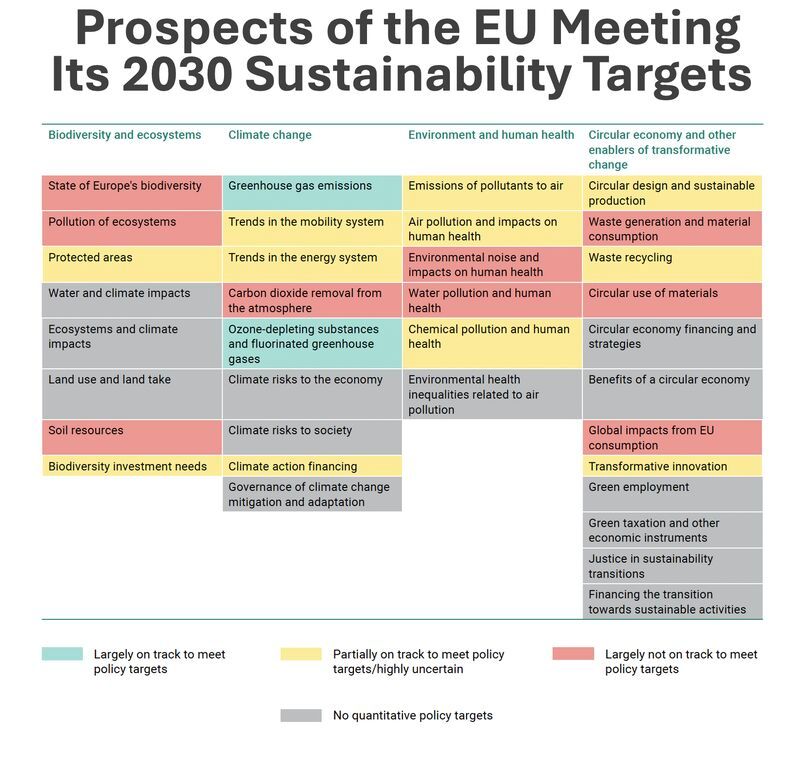

1️⃣ Of the 35 thematic areas, only two are on track to meet 2030 policy targets. The overall environmental outlook is alarming. Nature - forests, soils, biodiversity - continues to degrade.
2️⃣ Climate change is not a distant risk in Europe. Its cumulative effects are already stressing systems that underpin the European economy: water, food, ecosystem services.
3️⃣ Europe has a policy implementation gap. The foundation of knowledge is solid, but translating it into consistent, enforced action remains weak. The report calls for stepping up implementation of policies under the Green Deal.
👉 This report stresses urgency, resilience, and systemic integration. The current #Omnibus debate, instead, reduces it to an administrative burden story - a simplified debate about simplifications...
===
Access the Report: https://lnkd.in/dnMiGDmP
03-10-2025

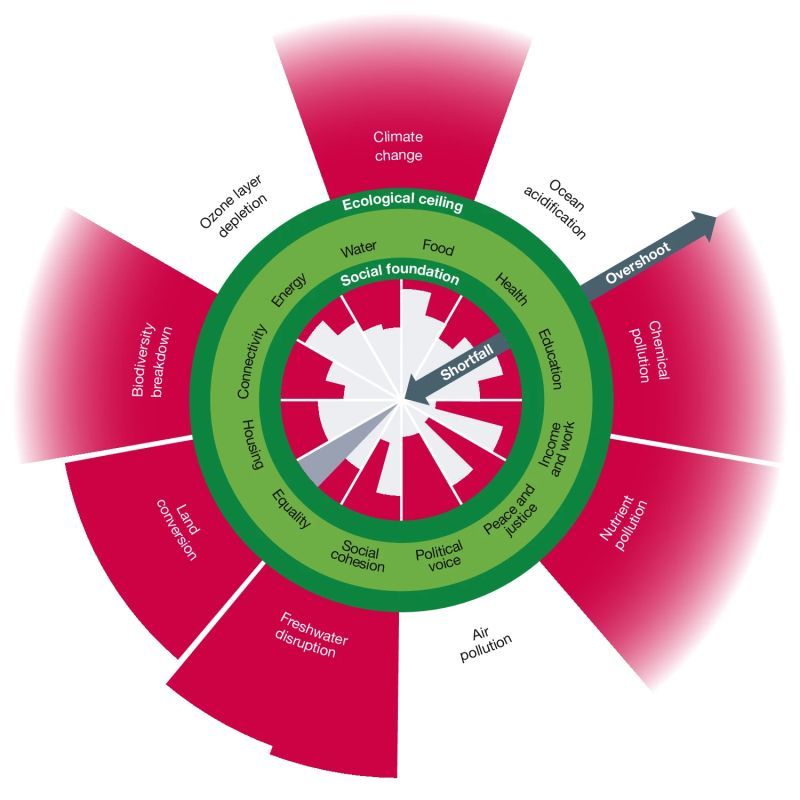

1️⃣ Economic growth ≠ human progress. While global GDP more than doubled since 2000, progress in reducing human deprivation has been modest. To meet basic needs for all by 2030, improvements would need to accelerate fivefold.
2️⃣ Disaggregating the global findings shows that the richest 20% of nations (15% of the global population) contribute over 40% of annual ecological overshoot, while the poorest 40% (42% of the global population) suffer over 60% of social shortfall.
3️⃣ Even the best-performing social indicators (like health coverage) would need to accelerate improvement by 25–80% to meet 2030 goals. Meanwhile, reversing ecological damage by 2050 would require regenerative action nearly twice as fast as historic degradation rates.
👉 Our dependence on perpetual GDP growth is pushing us further from a “safe and just space” for humanity.
===
Access article by Fanning & Raworth in 'Nature' (Open Access): https://lnkd.in/diX-K9BH
02-10-2025

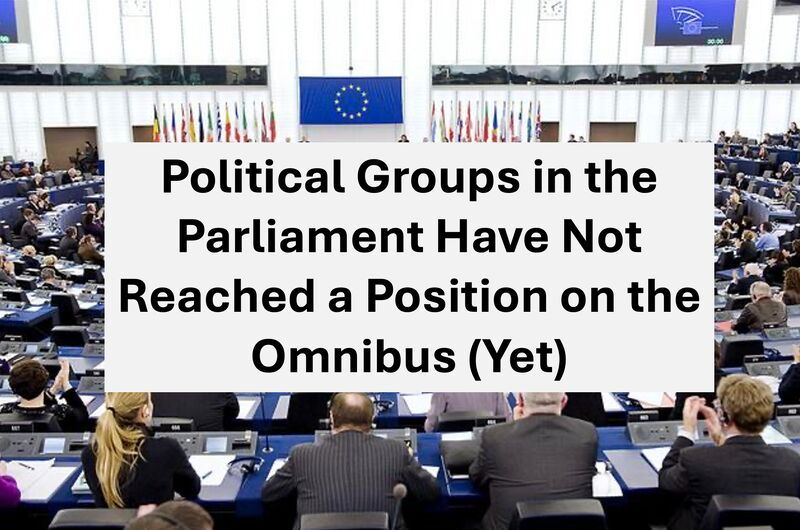

Key disagreement is still around scoping. The EPP's latest "offer" is to exempt firms with less than 1,750 employees and with less than €450 million net turnover from the CSRD. The EPP also still wants to scrap mandatory climate transition plans.
Renew and the S&D want to align with the Commission's CSRD scope (1,000 employees) and to retain transition plans. Overall, the disagreements on core issues still seem substantial.
📅 What’s next? The political groups indicated that they remain open to continue discussions until 13 Oct (when a vote is planned in the Legal Affairs committee). There is high pressure to find a common position as the simplification agenda is treated with "urgency" by the Commission and also the Danish Presidency...
===
https://lnkd.in/dRQ62aMh
01-10-2025

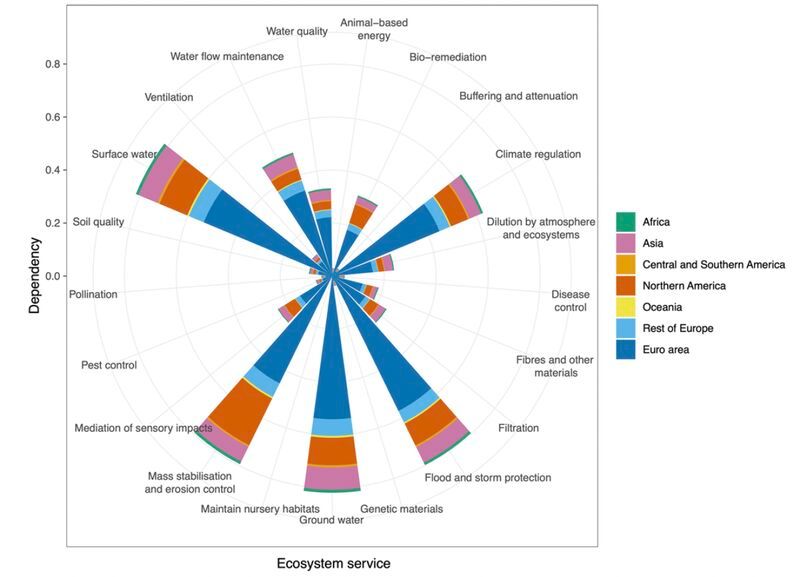

72% of euro area companies depend heavily on at least one ecosystem service, from water provision to flood protection. Banks, through their lending, inherit these risks. Out of 2,500 banks analysed in this study, just 100 account for 87% of the euro area’s total biodiversity footprint.
These risks are financial. Ecosystem degradation, compounded by climate change, threatens companies’ ability to operate, and to repay their loans. Right now, nearly 60% of loans are tied to firms facing unmet flood protection needs, underscoring the scale of systemic exposure.
👉 Yet some European policymakers still believe it’s a good idea to cut climate and biodiversity reporting by 80–90% of companies. Today, Parliament negotiators hold their final meeting on the #omnibus...
===
Article (Open Access): https://lnkd.in/dv-a2FcX
30-09-2025

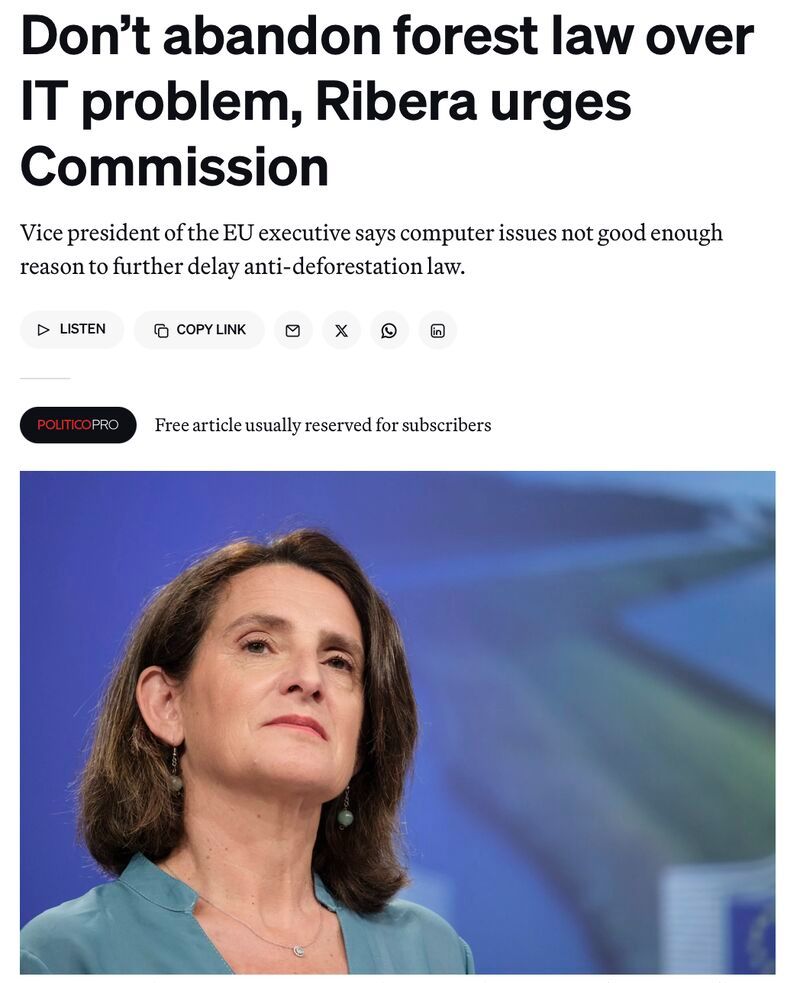

“There may be - I don't know - technical issues, difficulties. But I'm sure that we can find alternatives that are already being used. And that we can solve these technical issues as soon as possible.”
She also gives voice to what many have been thinking. “[The Commission must ensure that] those that have already taken steps forward, those that rely on the Commission and those that trust that our regulation is to be implemented do not feel deceived.” However, this is exactly how some businesses would feel if another delay comes along.
👉 Continued delays, “stop-the-clock” procedures, and #omnibus amendments risk eroding the trust businesses place in EU policymaking. This uncertainty fosters a damaging “wait-and-see mentality". Such lost trust is hard to gain back and, importantly, it undermines the EU’s own policy goals...
===
POLITICO: https://lnkd.in/dAMrtVnN
27-09-2025

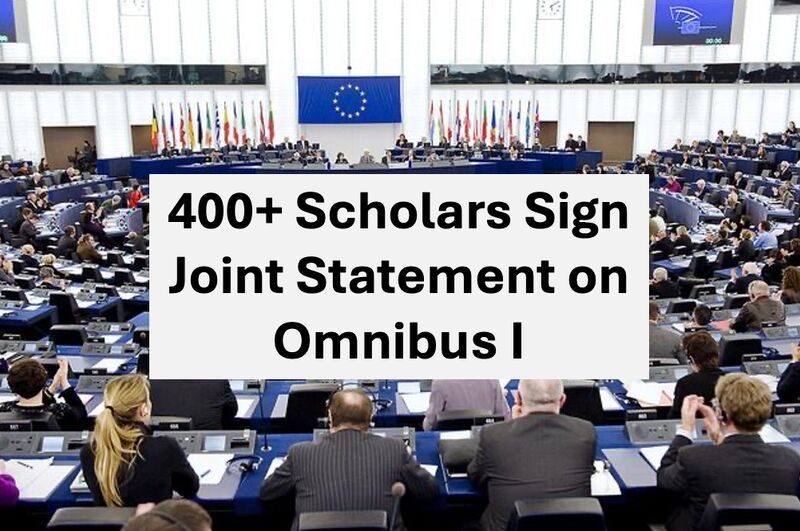

We want to be clear: we support the EU’s ambition to simplify and streamline regulation. But simplification must not come at the expense of the integrity and ambition of the #CSRD and #CSDDD.
Our Joint Statement makes five key demands:
1️⃣ Simplify with Evidence (e.g. use existing insights from research)
2️⃣ Align with Climate Science (e.g. when discussing transition plans)
3️⃣ Ensure Regulatory Consistency (e.g. with a cut-off at 500 FTE)
4️⃣ Balance Costs and Benefits (e.g. improved risk management)
5️⃣ Safeguard Risk-based Due Diligence (aligned with UNGPs and OECD)
What began as a simple lunch discussion among seven scholars has grown into a collective call echoed by hundreds.
🙏 Thanks to all the scholars who have signed — and special thanks to my brilliant co-authors Laura Marie Edinger-Schons, Judith Stroehle, Ali Aslan Gümüsay, Florian Berg, Gaia Melloni, and Florian Hoos for making this possible. The updated statement will be shared with relevant policymakers.
===
Access the statement and the updated list of signatories: https://lnkd.in/dtxzk_9c
26-09-2025

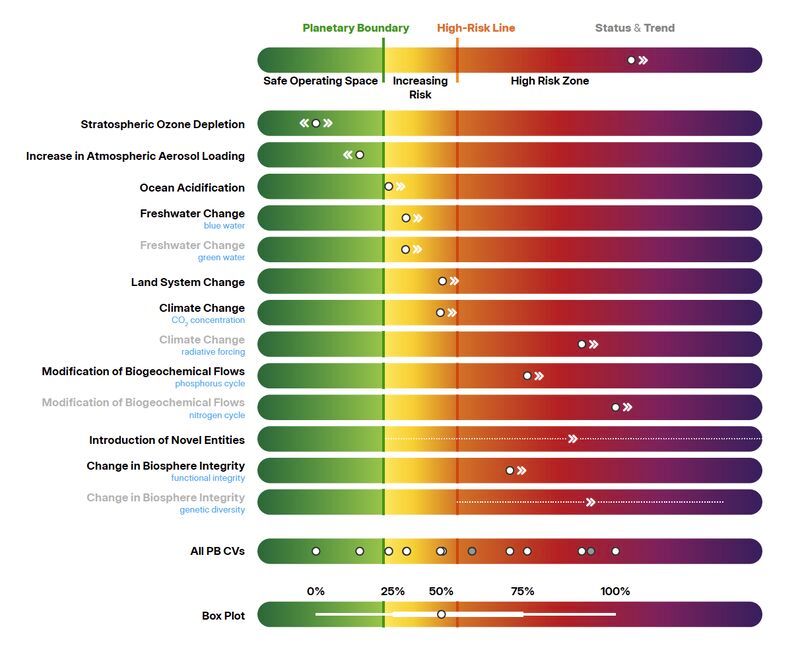

The latest scientific assessment of Earth’s health paints a sobering picture.
1️⃣ 7 of 9 planetary boundaries have now been breached (in 2024: 6 out of 9) — including climate change, biosphere integrity, land system change, freshwater, biogeochemical flows, novel entities, and ocean acidification.
2️⃣ All breached boundaries show worsening trends, pushing the planet closer to the high-risk zone of irreversible change.
3️⃣ Only two remain within safe limits: aerosol loading (air pollution) and stratospheric ozone (which continues to recover thanks to global action).
👉 The European Commission cites "urgency" around competitiveness as the main driver behind its #Omnibus I proposal. How about adding the real urgency that is displayed in the picture below? That would bring the balance that EU policy-making badly needs...
===
Access the Report: https://lnkd.in/dS72dEDx
25-09-2025

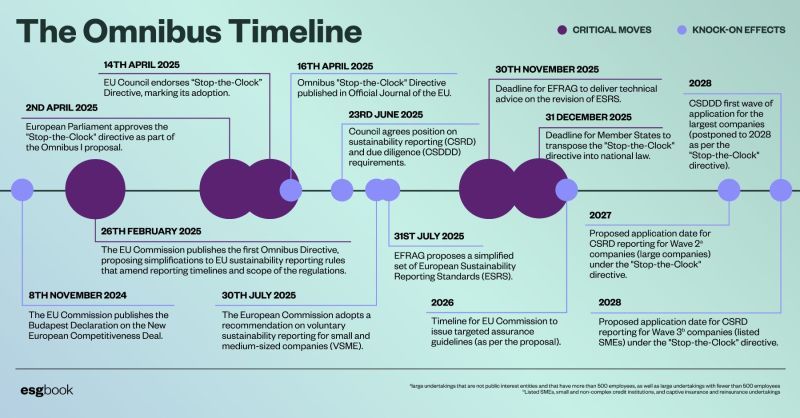

1️⃣ 13 October – The Parliament’s Legal Affairs Committee (JURI) is scheduled to vote, provided negotiators can reach a deal.
2️⃣ Week of 20 October – A plenary vote in the European Parliament may follow, depending on the outcome and timing of the JURI vote.
3️⃣ November/December – If Parliament has adopted its position, trilogue negotiations between the EU institutions will begin to agree on a final legal text. Denmark, holding the Council Presidency, will chair these talks.
👉 If the process stays on track, a final legal agreement could emerge by the end of 2025.
This makes the legislative process remarkably swift. Unfortunately, the EU lacks the same urgency when it comes to implementing sustainability regulation.
Yesterday’s news that the Commission plans to delay the #EUDR - yet again! - highlights a serious gap: despite almost three years of preparation time, the supporting IT system is still not ready.
24-09-2025
👉 "[T]he Commission is considering a postponement of the entry into application of the EUDR, currently foreseen for 30 December 2025, for one year, in order to avoid uncertainty for authorities and operational difficulties for stakeholders in the EU and third countries, and to allow time to remedy the identified risks."
The Commission has acknowledged serious concerns with the IT system needed to implement the EUDR. Without adjustments, the system risks major slowdowns and disruptions that could prevent companies from registering, filing due diligence statements, or meeting customs requirements
Read the letter below by Commissioner Roswall.
23-09-2025

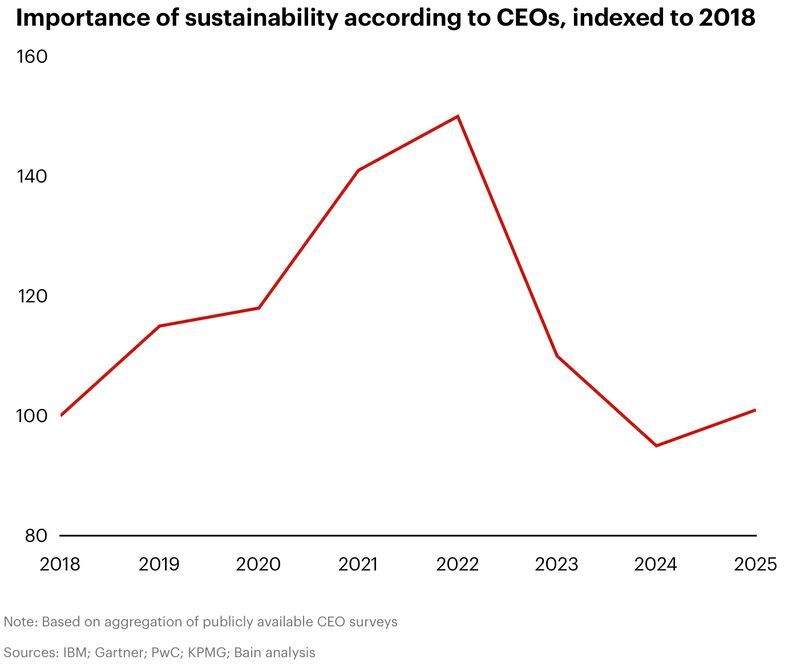

We are still seeing overshadowing effects. In many executive discussions, sustainability is overshadowed by geopolitics, AI, and competitiveness. But treating these topics as separate priorities, as many surveys do, is misleading. It overlooks the many ways in which they interrelate.
Of course, deregulation continues to impact progress, especially in the US and EU. But there are also many positive forces at play: (1) legislative initiatives that support focused future action (e.g., the Clean Industrial Deal), (2) inflection points in certain sustainable technologies that are approaching quickly, and (3) companies that continue to invest and act substantively, beyond the hype.
👉 The analysis suggests that we are moving past the peak of buzz — and perhaps into a phase of “quieter” action. And that might be exactly what is needed.
===
Analysis by Bain & Co.: https://lnkd.in/d-WAEv2h
22-09-2025

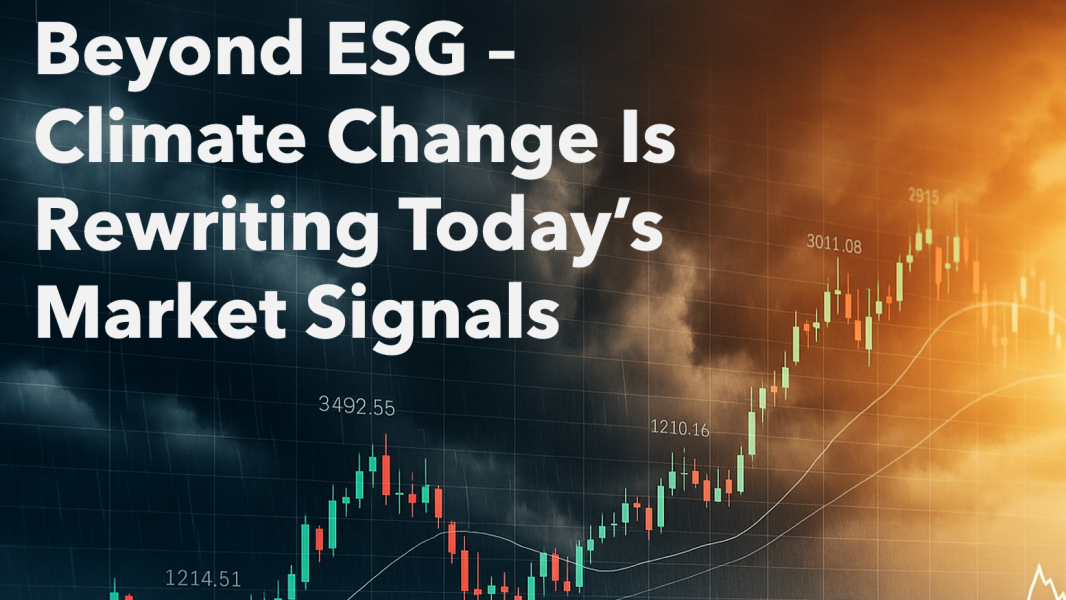

In our new piece, Georg Kell (the founding executive director of the UN Global Compact) and I discuss why it is vital that we recognise - more clearly and more honestly - the shift from forecasts to new economic facts.
This isn’t about ESG checklists. It is about how capital flows and valuations as well as incentives are being structurally reshaped. The climate-driven economic future has arrived quicker than anticipated in some sectors. A trend that will continue...
19-09-2025

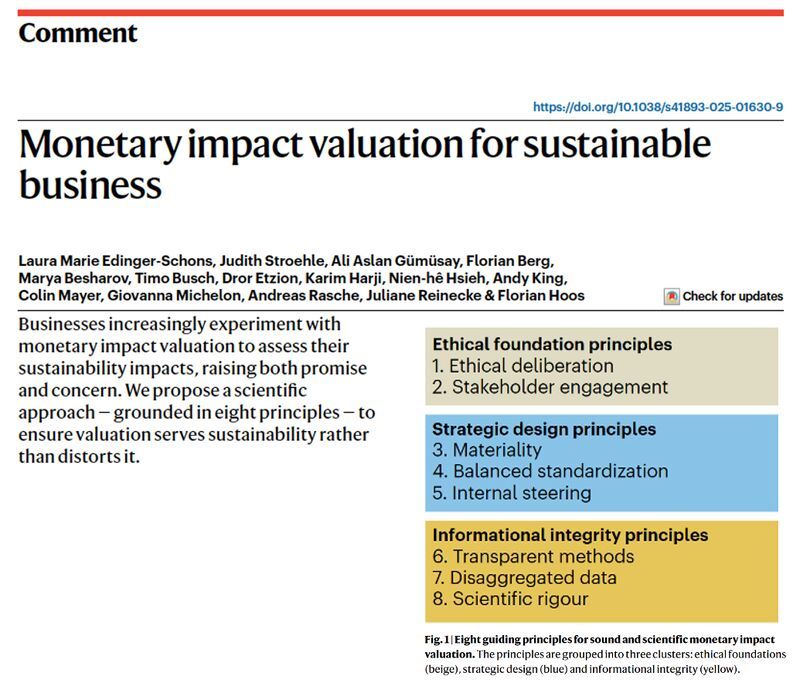

Translating social and environmental effects (e.g., carbon emissions or employee well-being) into financial terms holds promise: it can boost transparency, align sustainability with financial decision-making, and guide resource allocation. But it also carries many risks, from ethical concerns and oversimplification to greenwashing and policy displacement.
Our eight principles - spanning ethics, the strategic design of valuation, and information integrity - help to navigate through this minefield.
👉 The principles are a reminder that the goal is not to reduce sustainability to money, but to make it actionable without losing its complexity, plurality, or intrinsic value.
Thanks to the brilliant team of co-authors for pushing this agenda! Laura Marie Edinger-Schons, Judith Stroehle, Ali Aslan Gümüsay, Florian Berg, Marya Hill-Popper Besharov, Dror Etzion, Karim Harji, Nien-hê Hsieh, Andrew King, Giovanna Michelon, Juliane Reinecke, Florian Hoos.
===
Link: https://lnkd.in/d_FzBrCX
SSRN version (open): https://lnkd.in/dJE2UdyK
18-09-2025

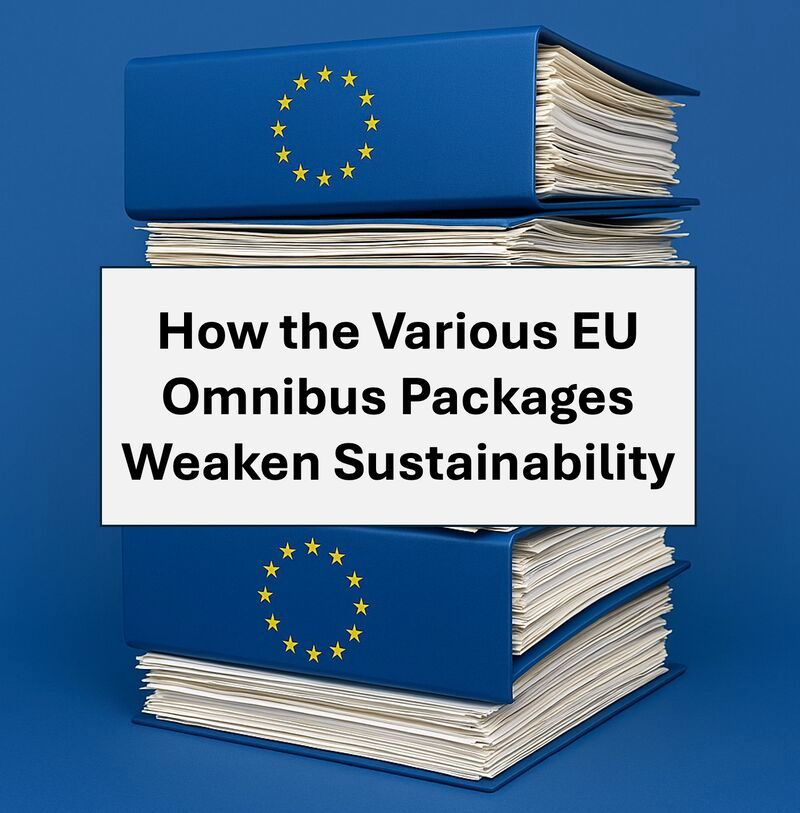

🔵 Omnibus III - Agriculture
Simplifies conditionality and controls related to the EU's Common Agricultural Policy (CAP). Fewer inspections and less frequent checks will make it harder to ensure agricultural practices meet environmental conditionality.
🟢 Omnibus IV - Digitalisation (incl. Batteries)
Two-year “stop-the-clock” on battery due-diligence (now 08/2027). This slows down safeguards against environmental and human-rights harms in minerals extraction, precisely as EU battery demand scales.
🟤 Omnibus V - Defence
Defence needs allow broader use of chemicals that would otherwise be more strictly regulated; existing rules (like REACH) can be applied less strictly for the defence sector under exceptions.
🔴 Omnibus VI - Chemicals
Streamlines labelling, cosmetics, and fertiliser rules; but reduced on-pack information, longer transition periods, and narrower bans (e.g. certain CMRs in cosmetics) weaken transparency and environmental safeguards.
Further planned sustainability simplifications in 2025: (1) review of #SFDR in Q4 2025 (likely to be delayed to Q1 2026), (2) an "Environmental Omnibus" focused on emissions, circularity and waste management.
👉 Cutting red tape and streamlining regulations is not inherently negative. But the EU is pursuing this at high speed and with far-reaching consequences for nature and society. These impacts must be carefully assessed and weighed against the potential cost savings.
16-09-2025

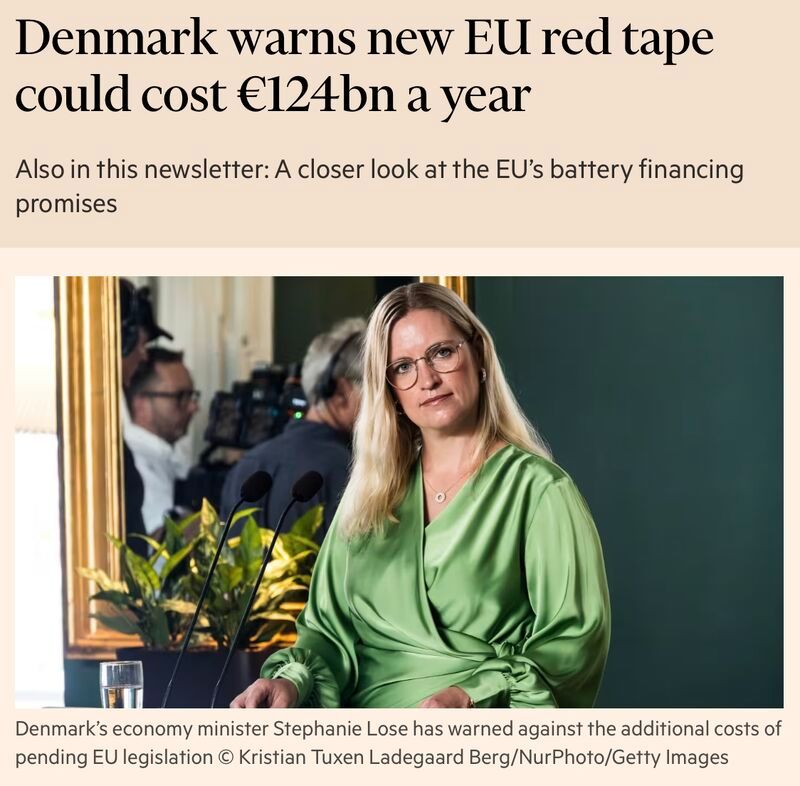

This is unbalanced and short-sighted. Yes, regulations can often be streamlined and made more efficient. But we need the full picture: we can’t just throw around big cost numbers while dismissing benefits as “too difficult to monetise” (see article).
👉 Regulations have a purpose: they protect people, the planet, and also long-term business interests.
Denmark is poorly advised if it falls into the popular “simplification-as-cost” trap. This undermines forward-looking policymaking. And Denmark’s stance matters: it holds the Council presidency and sets meeting agendas.
The Danish government will table this discussion at this week’s meeting of EU finance ministers.
===
FT: https://lnkd.in/dR6TK4MJ
16-09-2025
1️⃣ COMPLIANCE: The Commission plays the compliance card, emphasising that "[t]the Better Regulation Guidelines clearly state that they are an internal toolkit and not legally binding requirements."
2️⃣ LACK OF IMPACT ASSESSMENT: The Commission cites competitive pressure, a deteriorating security environment and “implementation issues” around #CSRD and #CSDDD to justify urgency and the absence of an impact assessment. But it still does not show how these factors created a concrete, immediate need to dilute and delay sustainability provisions.
3️⃣ LACK OF CONSULTATION: "The Commission must reiterate in this regard that the better regulation guidelines provide the flexibility not to carry out a public consultation in the absence of an impact assessment." The urgency argument is then again used to justify the lack of a public consultation.
Many argued the Commission could have first tabled a ‘stop-the-clock’ to win time for proper process and then return with a full content proposal. This is rejected because it "would have created uncertainty about the Commission’s intentions, including toward preserving the objectives of the proposals and the European Green Deal."
Overall, the arguments seem very 'thin' to me. The reply reinforces that the Commission legally had the right to do what it did, and that external forces required urgent action, however without specifying the links between these forces and the need for simplification.
It is now for the EU Ombudswoman to weigh the case and reach a finding.
15-09-2025

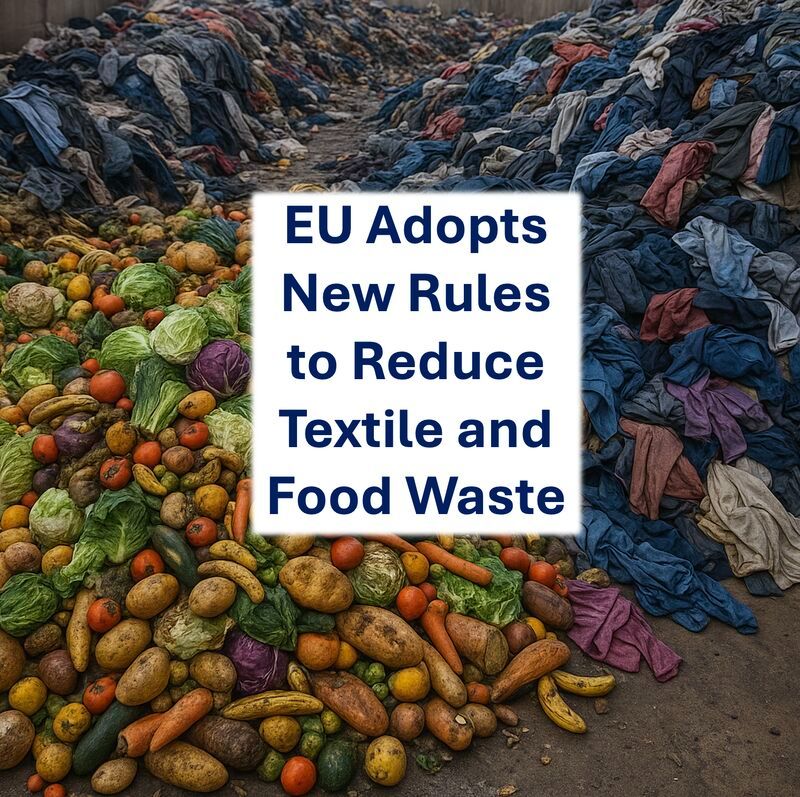

🔹 Textiles:
Producers selling textiles in the EU must cover the costs of collection, sorting, and recycling. EU countries must introduce an Extended Producer Responsibility (EPR) scheme to enforce the new rules.
All producers are covered, including e-commerce sellers, whether based in the EU or outside. Producers must disclose data on volumes of waste and their handling.
The new rules apply to clothing, footwear, accessories, hats, blankets, bed & kitchen linen, curtains.
🔹 Food waste:
Binding reduction targets by 2030: 10% in processing/manufacturing and 30% per capita in retail, restaurants, food services, and households.
Key business players must help prevent food waste and ensure safe, unsold food is made available for donation.
👉 Yes, some sustainability regulations (like CSRD and CSDDD) face headwinds. But let’s not forget: progress continues in other key areas.
===
Press Release: https://lnkd.in/dkYnNzvT
11-09-2025

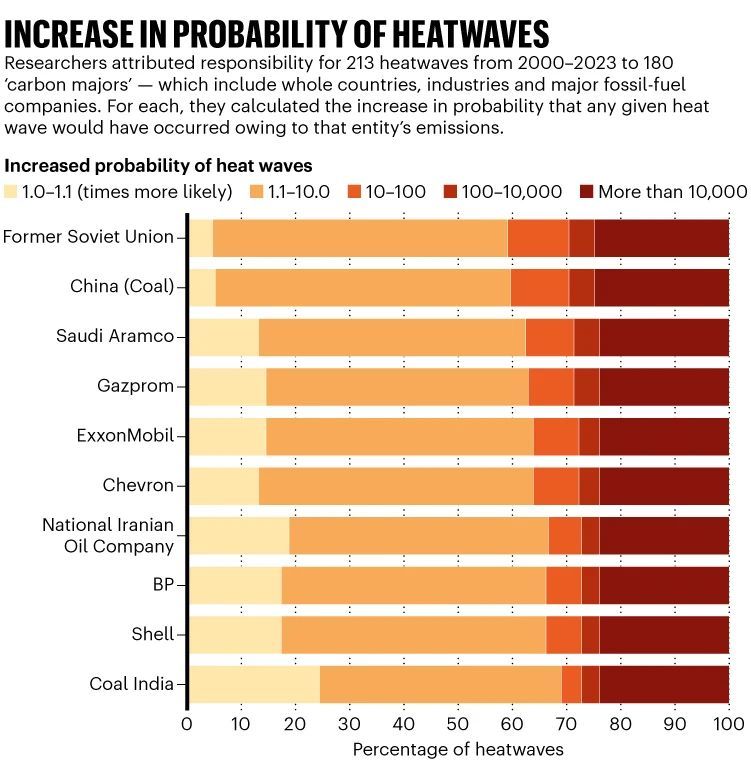

In other words: about 25% of heatwaves between 2000-23 can be directly linked to the GHG emissions of individual carbon majors (more on the attribution method in the paper). Overall, the emissions from the world’s 180 largest carbon emitters contributed to about half of the increase in intensity of heatwaves.
This is an important study, also for legal reasons. With the recent ICJ Advisory Opinion, we are likely to see more climate lawsuits and compensation claims. The findings could provide fresh evidence to support relevant claims.
Earlier this year, another paper (again in 'Nature') found that Saudi Aramco and Gazprom alone have each caused a bit more than $2 trillion in heat damage over decades. These studies show: science is turning up the heat on liability...
===
Article in 'Nature' (Open Access): https://lnkd.in/dewxjnfh
Summary: https://lnkd.in/dyizpY9a
09-09-2025
As scholars, we are united in our concern for the future of sustainability policy in Europe. While we support the EU’s efforts to simplify regulations and create more efficient frameworks, we are alarmed by the current direction of the Omnibus negotiations and therefore urge to pursue simplification without compromising the integrity and ambition of the #CSRD and #CSDDD.
The Joint Statement (called ‘The Copenhagen Declaration’, as it was drafted during a recent conference in Copenhagen) calls on EU policymakers to…
1️⃣ Simplify based on robust academic evidence
2️⃣ Align reforms with climate science
3️⃣ Ensure regulatory consistency (CSRD threshold at 500 employees)
4️⃣ Balance costs and long-term benefits
5️⃣ Safeguard risk-based due diligence
To strengthen these points, the co-authors of the Statement have compiled a body of relevant research (see the end of the document). We urge EU policymakers to draw on this body of knowledge in the final negotiations - for example, when weighing costs against long-term benefits.
👉 Simplification is not the issue - the risk lies in weakening the integrity and ambition of vital sustainability regulations...
===
The Joint Statement was shared with relevant EU policymakers in both the Parliament and the Commission. A big thank you to my co-authors: Laura Marie Edinger-Schons, Judith Stroehle, Gaia Melloni, Ali Aslan Gümüsay, Florian Berg, Florian Hoos and especially all the scholars who signed and supported.
Interested scholars can still sign the Statement (link in comments). Note: all signatures are vetted before they are added to the list.
08-09-2025

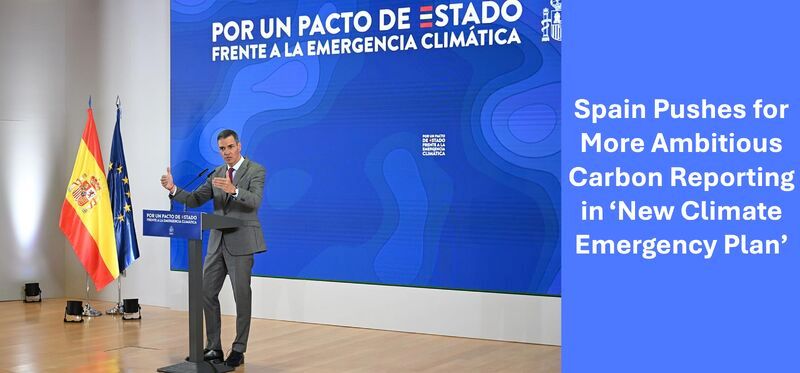

The legal basis (Royal Decree 214/2025) covers firms with more than 500 employees. The government stressed that “engagement this year is critical”, since requirements apply retroactively to 2025. Businesses must also submit greenhouse gas reduction strategies with five-year horizons starting in 2026.
👉 Before the EU #omnibus is even finalised, Member States are realising that without solid sustainability information, the green transition cannot be managed. This shows that many of the omnibus’ proposed changes are out of touch with Europe’s reality.
For Spain, action is a necessity after years of heatwaves, wildfires, and devastating floods (e.g. Valencia).
The Climate Emergency Plan goes well beyond reporting, with measures for mitigation and adaptation, including climate refuges to protect vulnerable populations, stricter forest management, and an accelerated clean energy transition.
===
ESG News: https://lnkd.in/d5A7D3Pp
04-09-2025

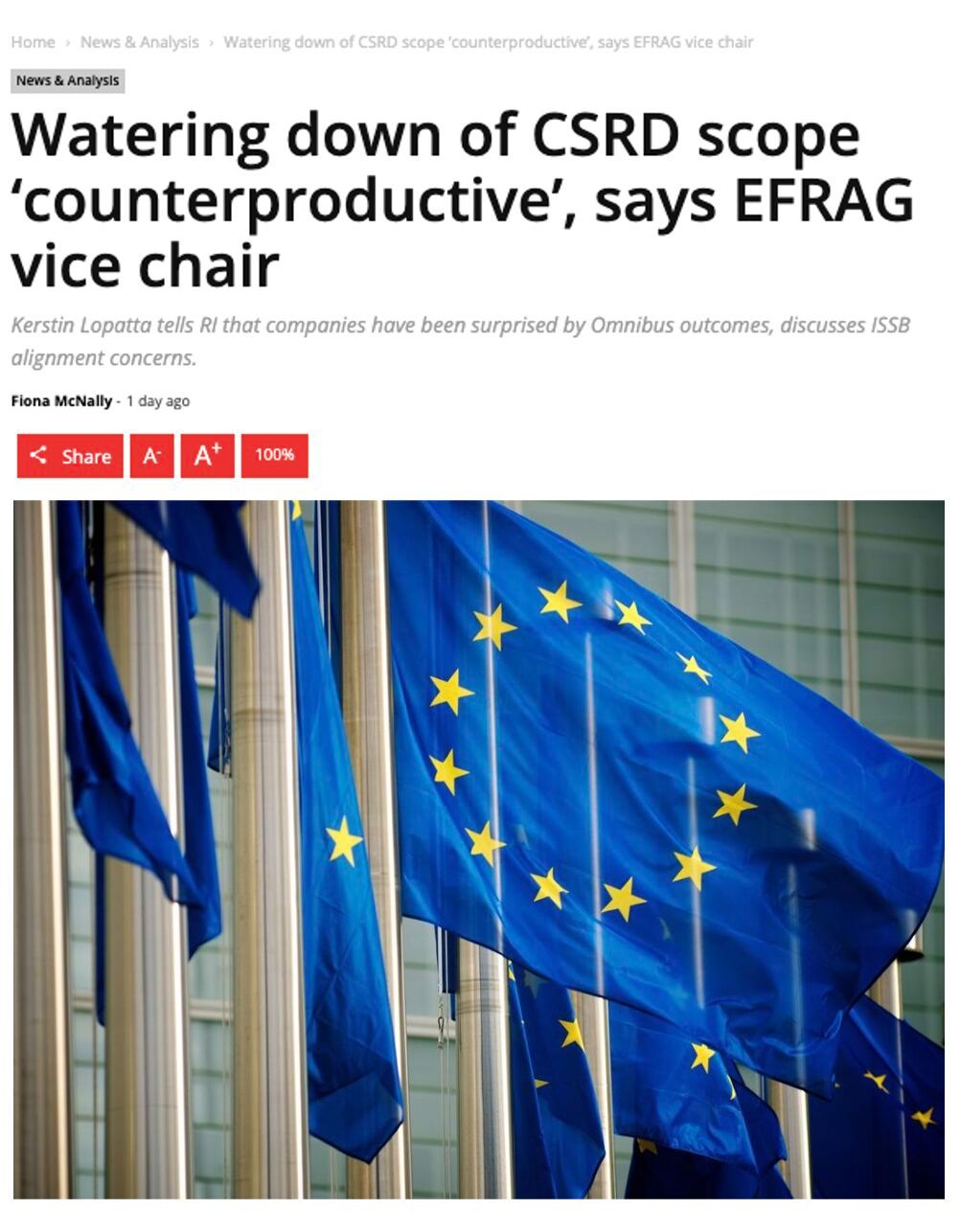

Taking a step back, it is interesting to look at the CSRD scope discussion:
1️⃣ Many investors and businesses support a 500-employee threshold (https://lnkd.in/dEi-5vh6)
2️⃣ The ECB sees a 500-employee threshold as striking the right balance between simplification and meaningful reporting (https://lnkd.in/d7sRbgE5)
3️⃣ The other political groups in the centre of the Parliament suggest either a 250 or 500-employee threshold (https://lnkd.in/dC2ydHHU)
4️⃣ Academic research suggests a 500-employee threshold could even be more cost-effective if limited assurance is not required for some firms (https://lnkd.in/dWMaYDDU)
👉 Meanwhile, the EPP proposes a 3,000-employee threshold — which would exclude 94% of companies from the CSRD. Something worth thinking about...
===
RI Article: https://lnkd.in/dFxzZwf6
03-09-2025

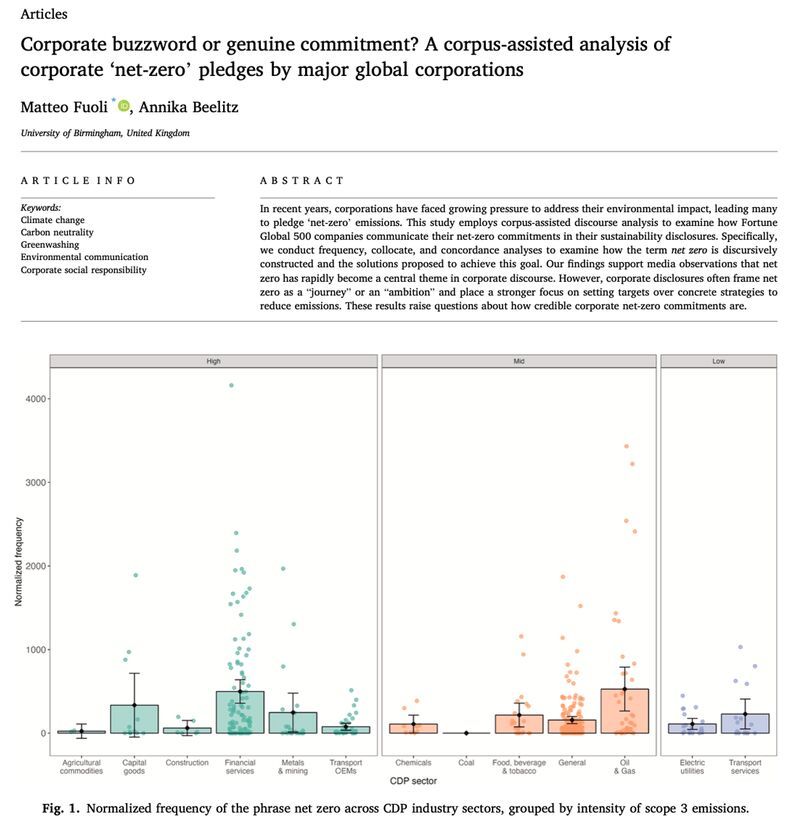

Framing net-zero as a "journey" downplays the scale and urgency of the change that is needed to address the climate crisis. The study shows that the net-zero corporate discourse is made up of weakly-committal language (e.g., talking about "ambitions") that put aspirations, rather than actions and impacts into the centre of communication.
Firms' net-zero communication leans heavily on techno-optimism, emphasizing innovations and efficiency gains as the main solutions, rather than addressing systemic change today.
The high level of strategic ambiguity in net-zero communication serves different functions (e.g., diverting, downplaying, legitiziming). Not surprising, then, that the oil and gas sector was found to exhibit the highest average frequency of net-zero mentions...
===
Article (Open Access): https://lnkd.in/d6xKhqvW
02-09-2025
I’ve distilled ten key lessons from the process so far (for details see the article):
1️⃣ Base simplification on experience and evidence, not politics
2️⃣ Don’t over-rely on employee headcount when scoping regulations
3️⃣ Communicate the value of sustainability regulations more clearly
4️⃣ Start simplification at the technical level
5️⃣ Define the problem before proposing solutions
6️⃣ Sequence interconnected regulations more effectively
7️⃣ Provide clearer guidance to reduce ambiguity
8️⃣ Avoid manipulative language that distorts debates
9️⃣ Remember: good process builds buy-in
🔟 Policy isn’t just about costs – it’s about value
Of course, what we see as “learnings” is always subjective. That’s why I would love to hear your reflections: what are your key takeaways from the Omnibus process so far? Pulling all these lessons together could make for a nice reading for policy-makers...
https://www.linkedin.com/pulse/what-can-we-learn-from-eu-omnibus-process-so-far-ten-short-rasche-y6gdf/?trackingId=mjFPGewRm7zovMVzozdBZQ%3D%3D
30-08-2025
1️⃣ They "urge the Commission to come up with further simplification initiatives of existing legislation and call for [the] examination of targeted simplification regarding the Urban Wastewater Treatment Directive (EU) 2024/3019." This Directive requires certain sectors to pay at least 80% of the costs to remove micropollutants from wastewater by 2028 (among other things).
2️⃣ They also call to "simplify and enforce REACH: support a pragmatic revision focused on reducing burdens." REACH is the EU’s core law protecting people and the environment from chemical risks.
3️⃣ Both countries push for "speedy progress of the negotiations on the #Omnibus Simplification packages" and "in addition to ambitiously reducing existing reporting obligations, limit new obligations by introducing a ‘1 for 1’ rule" (i.e. every new reporting obligation needs to be accompanied by an equivalent cost reduction.)
The direction is clear: both countries will push heavily for further sustainability "simplifications" (e.g. through the new environmental omnibus that is planned for the Fall).
👉 BUT: Declaring sustainability regulations a competitive disadvantage may appease populist and revisionist sentiments. But it is not a winning strategy for Europe‘s future...
28-08-2025

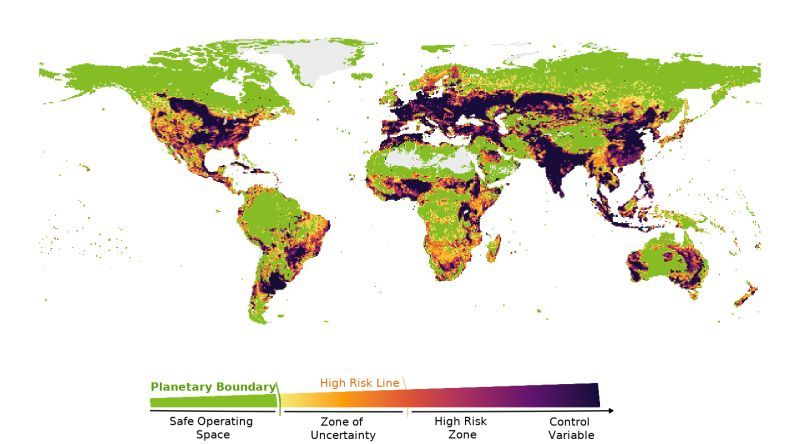

This systemic degradation is predominantly driven by land conversion for human activities, notably agriculture and other land-use changes, which have directly disrupted ecosystem function and integrity, especially in Europe, Asia and North America.
But this is not just a biodiversity issue. In the end, this is about the stability of the very systems that regulate climate, water, and food security. So, what matters is integrated thinking and integrated sustainability regulation.
And yet some EU actors are pushing to roll back key sustainability regulations via the #omnibus; the very frameworks that enable us to understand how corporations impact nature and climate. These rules are not red tape; they are essential for collecting biodiversity and climate data and guiding us toward systemic solutions. Weakening them means flying blind in the face of crisis.
===
Read the Study (Open Access): https://lnkd.in/dzxc6A6D
27-08-2025
The Norwegian Transparency Act entered into force in 2022, and the non-paper emphasises that the legislation has (1) already "led to concrete improvements" in firms' supply chains and (2) improved supply chain management through the "identification of significant risks". But the paper also highlights that implementation can be challenging and that some firms perceive an increased administrative burden.
👉 Summarising the insights, the Norwegian Government "would emphasize that risk-based due diligence assessments with a strong link to the established practices of UNGP and OECD guidelines should be at the core of any legal instrument."
Such sharing of lessons is vital - legislation is improved by learning from implementation experiences not through political bargaining. It is a pity that the EU's CSDDD never even had a fair chance to create such implementation experiences before it was "simplified"....
25-08-2025

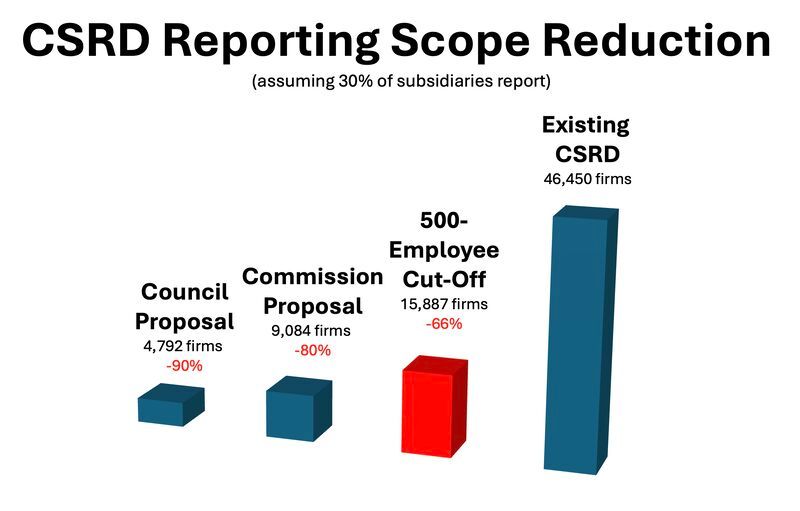

By contrast, the current proposals by the Commission (-80%), Council (-90%), and EPP (-94%) fall short of meeting the sustainability data needs of investors and companies’ business partners. The ECB has suggested that requiring reporting for firms with 500–1,000 employees could strike a better balance between simplification and the benefits of consistent, comparable data.
And let’s be realistic: if firms with 500–1,000 employees are no longer legally required to report, many will still face bilateral disclosure demands from customers and tender processes.
On costs: our analysis shows that a 500-employee threshold without limited assurance (a major cost driver) could even result in lower overall compliance costs than the original Commission proposal.
👉 We will discuss these research findings in a webinar on 4 September (11:00-12:00 CEST). We will welcome Kirsten Baumbach from the ECB (tbc) as well as Gerhard Huemer from SMEunited as guests to debate our findings.
Webinar Sign-Up: https://lnkd.in/dihXWBnd (use the Event Link to register)
Paper Download: https://lnkd.in/d999FfV4
22-08-2025

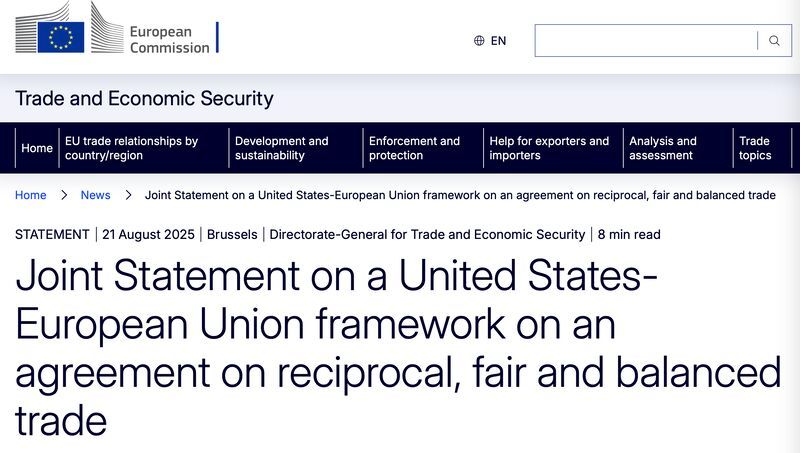

▶️ CSDDD AND CSRD: "The European Union commits to undertake efforts to ensure that the Corporate Sustainability Due Diligence Directive (CSDDD) and the Corporate Sustainability Reporting Directive (CSRD) do not pose undue restrictions on transatlantic trade. In the context of CSDDD, this includes undertaking efforts to reduce administrative burden on businesses, including small- and medium-sized enterprises, and to propose changes to the requirement for a harmonised civil liability regime for due diligence failures and to climate-transition-related obligations. The European Union commits to work to address US concerns regarding the imposition of CSDDD requirements on companies of non-EU countries with relevant high-quality regulations."
▶️ EUDR: "Recognising that production of the relevant commodities within the territory of the United States poses negligible risk to global deforestation, the European Union commits to work to address the concerns of US producers and exporters regarding the EU Deforestation Regulation, with a view to avoiding undue impact on US-EU trade."
Full Joint Statement: https://lnkd.in/dZqkrb-P
21-08-2025



➡️ We will focus on recent research on CSRD/ESRS disclosures to understand what can be learned from the first reports that were issued in 2025.
➡️ We also discuss which insights from the first CSRD reports are most critical to the ongoing #omnibus discussion. Key aspects of the omnibus (e.g., scope, value chain cap, climate transition plans) should build on the knowledge that has been collected so far.
Sign up and join the discussion: https://lnkd.in/g7Y5mGS3
18-08-2025
"The proposed reduction in the scope of undertakings subject to sustainability reporting requirements under the CSRD would limit the availability of firm-level data, thereby weakening the Eurosystem’s ability to perform a granular assessment of climate-related financial risks on its balance sheet and within its collateral framework."
She stresses that the omnibus must "strike the right balance between retaining the benefits of sustainability reporting for the European economy and the financial system while also ensuring that the requirements are proportionate."
Descoping 80%-94% of companies from the CSRD does not strike the right balance - to the contrary, it creates long-term risks for the European economy.
👉 Our analysis of the Commission, Council and EPP proposals shows a pragmatic compromise: A 500-employee threshold would fully do the job. It would bring 6,800 firms back into scope, and cost savings would still be very substantial when not requiring limited assurance for mid-sized firms (https://lnkd.in/d999FfV4).
The EPP, and Rapporteur Mr. Warborn, should take note of Lagarde's opinion. After all, it is her job to keep price stability and thereby ensure competitiveness...
15-08-2025

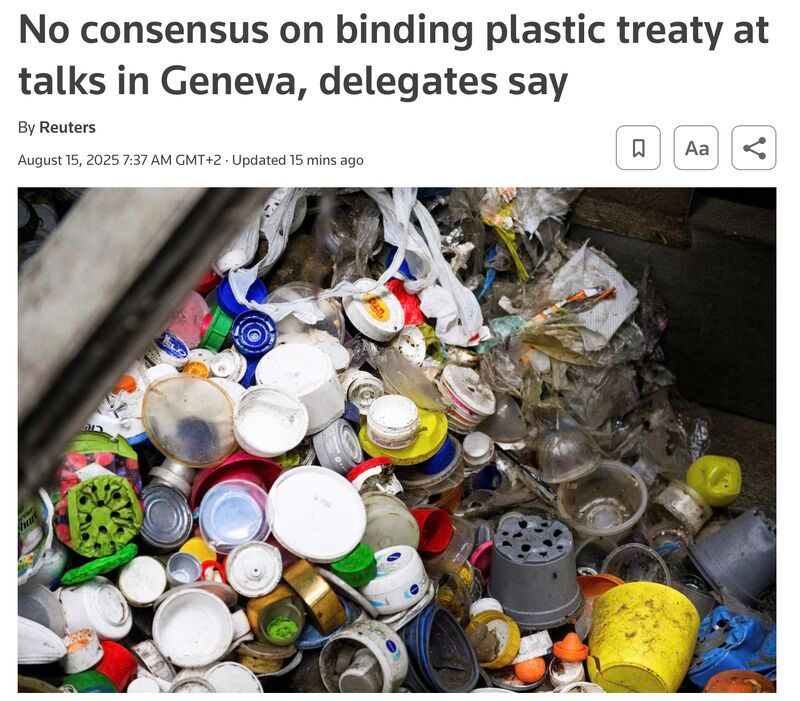

More than 100 countries pushed for limits on new plastic production, but influential petro‑states - such as Saudi Arabia, Kuwait, Iran, the U.S., China, and Russia - opposed them, arguing these limits exceed the treaty's intended scope.
But a weak treaty would have served no one. What is needed is a treaty that covers the full life cycle, that clarifies financing for developing nations, and that has a dynamic component to account for evolving scientific insights.
We stand at a crucial juncture: plastic production is projected to grow by approx. 70% by 2040 without action, weighing heavily on both ecosystems and human health. Watered-down promises are no solution to this situation...
===
Reuters: https://lnkd.in/dUB_eCv2
14-08-2025

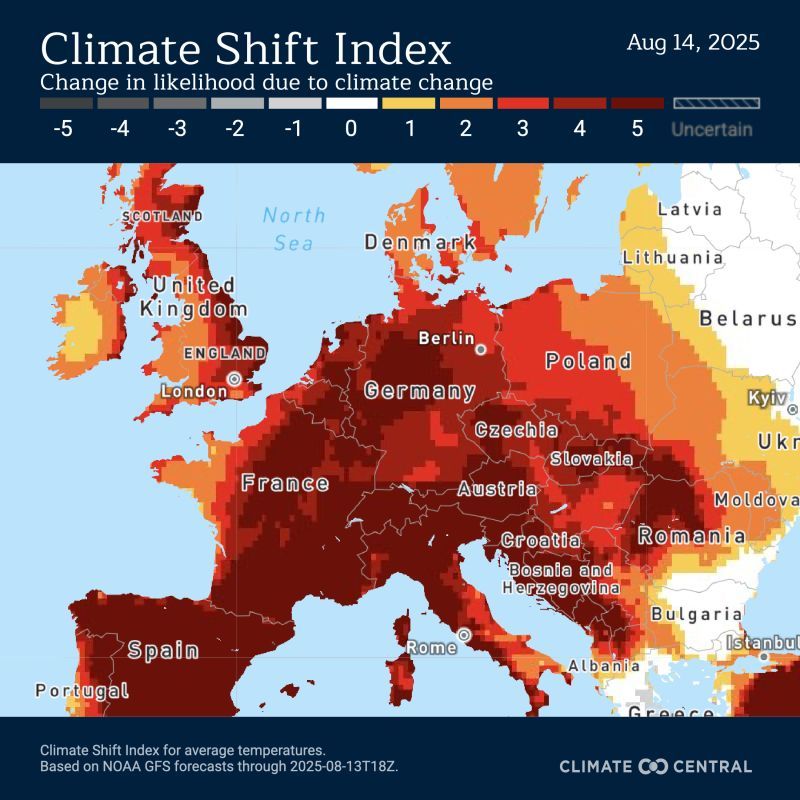

The Index is both simple and profound: it assigns a value to each day. For instance, a CSI of level 5 means that climate change made conditions at least 5 times more likely (when compared to a world without climate change), while a value of 0 would indicate that the influence of climate change on current weather conditions is not detectable.
The CSI bridges a crucial gap: people don’t experience global temperature averages, but they feel the heat (or cold) of daily weather. Hence, it is vital to "translate" (based on climate attribution science) how much more or less likely daily temperatures are becoming due to climate change.
It is a powerful real-time mapping tool and it should be used more often, not just by those working on climate risk or academics like me, but most of all by those who communicate about weather extremes to the public...
===
Try it out here: https://lnkd.in/dmYsHrUS
13-08-2025
It also gives an overview of the date of application (30 Dec 2025, deferred to 30 Jun 2026 for micro and small enterprises). The guidance clarifies the applicability of the EUDR to relevant products (e.g., timber, cocoa, coffee, oil palm) when considering the date of production of the relevant commodity and the date of placing it (or the resulting product) on EU markets.
There is also a welcome clarification on how the EUDR relates to the #CSDDD. If there is a conflict between the two, the EUDR takes precedence - because it is more specific - as long as both aim at the same objective.
❗ But: There is growing pressure that the EUDR might be "simplified" and delayed. The Parliament rejected the benchmarking system just before the summer and big companies push for a further delay....
===
Access the document in other languages: https://lnkd.in/dPcaAqGG
13-08-2025

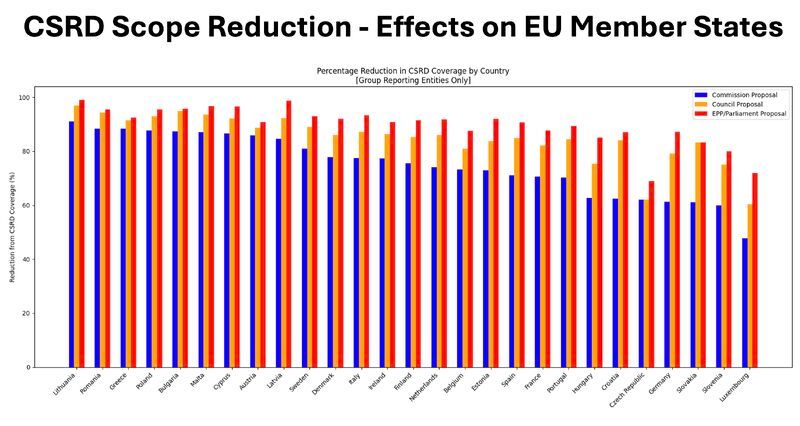

Member States with up to 90% exclusion rates will lack solid access to company-specific ESG data, making it harder to assess risks and track progress toward the EU Green Deal. A severe lack of company-level data will also complicate the design of targeted subsidies, the planning of regulatory interventions (e.g., taxes), and the evaluation of national-level regulation.
❗ We discuss the effects of CSRD scope reduction on EU Member States and sectors in more detail in the updated version of our working paper (with Theodor Cojoianu, Andreas Hoepner, and Fabiola Schneider). The paper shows that lowering the CSRD threshold to 500 employees would bring approximately 6,800 companies back into scope, while still achieving very substantial cost savings (by not requiring limited assurance). Access it here: https://lnkd.in/d999FfV4
===
Note: Discussed differences are based on the Commission proposal (blue bars) and focus on group entities. The Council (orange bars) and EPP/Parliament (red bars) proposals descope so many companies that differences between Member States become less significant.
10-08-2025

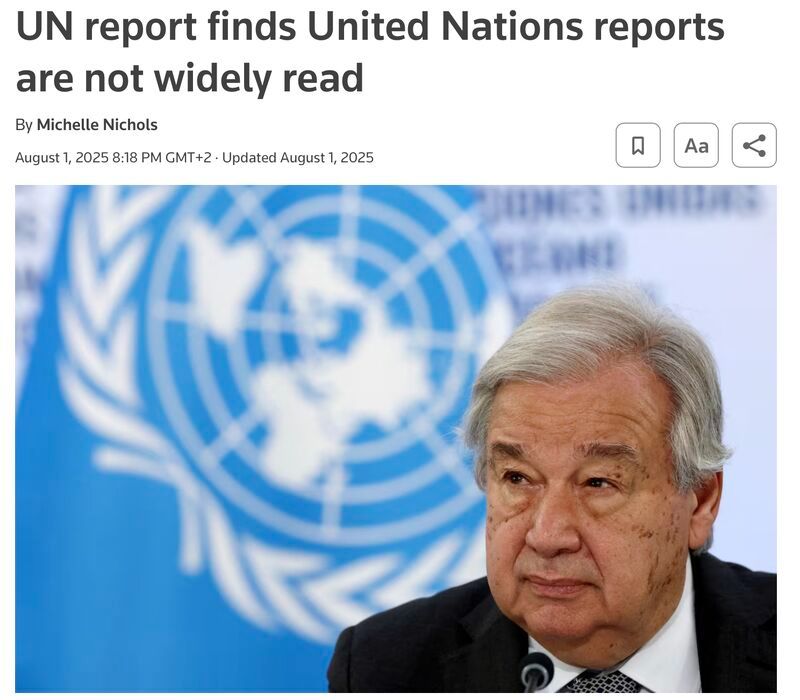

According to Antonio Guterres: "The top 5% of reports are downloaded over 5,500 times [per year], while one in five reports receives fewer than 1,000 downloads. And downloading doesn't necessarily mean reading."
While downloads do not equal impact or utility, it is clear that if even top reports are only downloaded 5,500 times, they are not disseminated sufficiently.
▶️ The problem is not content, it is communication. While many UN reports aim at expert audiences, they still contain messages that are important beyond expert communities. However, report length (which has grown 43% since 2005) and overly formal language make content hard to access for ordinary readers. All of this adds to the perceived distance from peoples' daily lives.
▶️ The solution is not to oversimplify content. But it must be to shorten reports and to translate their core message much better (e.g., finding stories that people can relate to and perceive as relevant). Most of all: to get the core message into the hands of those who reach young people in the age of TikTok. This can spark interest (and maybe even lead to more downloads...).
The upside: The UN is aware of the problem and also makes good suggestions in the report (e.g. fewer reports and introducing different formats based on needs and content type). This year the UN turns 80 - time to get this right...
===
Access the Report: https://lnkd.in/dMSHNrp8
07-08-2025

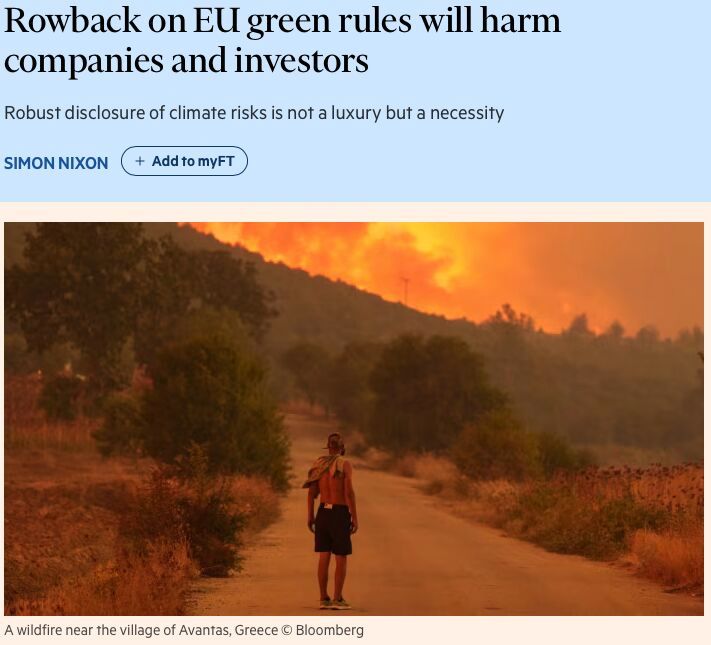

This op-ed correctly captures the main problem of the #omnibus: "The way that Brussels is trying to alleviate the short-term costs for companies risks damaging rather than enhancing Europe's long-term competitiveness."
Descoping 80-94% of companies from the #CSRD (depending on proposal) does nothing to support long-term competitiveness. Rather it will lead to a situation where "vital data will not be collected, leaving investors and regulators in the dark. That increases the risk that climate costs will end up being borne by taxpayers."
Policy makers should focus on those aspects of the omnibus that promise meaningful simplification. The revised #ESRS give a good example how costs can be reduced while preserving the core objectives of the CSRD.
===
FT Article: https://lnkd.in/dzv2nrmk
CSRD Scope Reduction Calculations: https://lnkd.in/djb-8nm4
07-08-2025
In the report, the bipartisan committee concludes: "The UK’s current approach of relying on voluntary implementation of due diligence is not effectively tackling forced labour in supply chains. Implementing mandatory human rights due diligence requirements for companies would level the playing field and be welcomed by many responsible businesses."
While the EU’s own Forced Labor Regulation is a key step, it is crucial to maintain a strong CSDDD that applies beyond just the largest companies.
Just as the UK is being urged to catch up with international standards by implementing strong due diligence legislation, the EU may be pulling back from its own landmark directive. This likely creates regulatory gaps and confusion for businesses operating across both regions...
06-08-2025

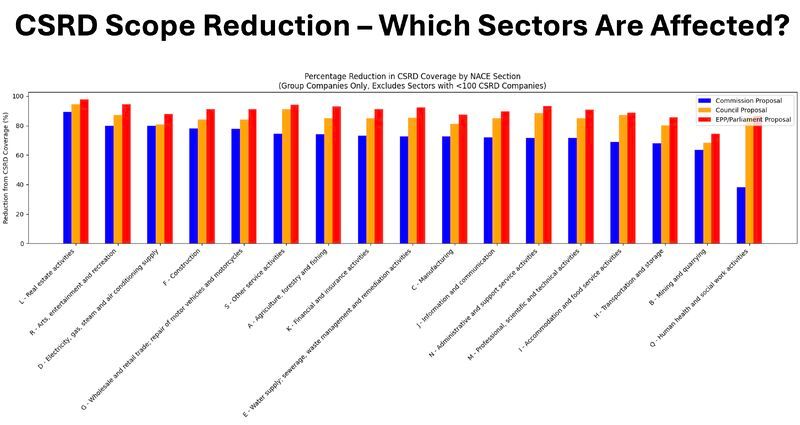

1️⃣ Politicians must ensure that the #omnibus does not disproportionally exclude companies from sectors with a significant potential for driving the green transition. For instance, ESG data from large scale corporate real estate owners is essential (e.g., to assess climate risks).
2️⃣ Using the number of employees as a mandatory threshold for determining CSRD scope can be misleading in sectors where even large companies tend to have relatively few employees. See also the analysis in our recent paper "Scenarios for CSRD Scope Amendments" (https://lnkd.in/d999FfV4).
3️⃣ We also calculated the reduction in CSRD total asset coverage for each sector (this may be seen as being more indicative of impact on the environment). This analysis confirms the significant reduction for the real estate and agricultural sectors.
Thanks Theodor Cojoianu, Andreas Hoepner, and Fabiola Schneider for the collaboration.
===
Note: Sector differences are based on the Commission proposal (blue bars). The Council (orange bars) and EPP/Parliament (red bars) proposals descope so many companies that differences between sectors are less visible.
05-08-2025

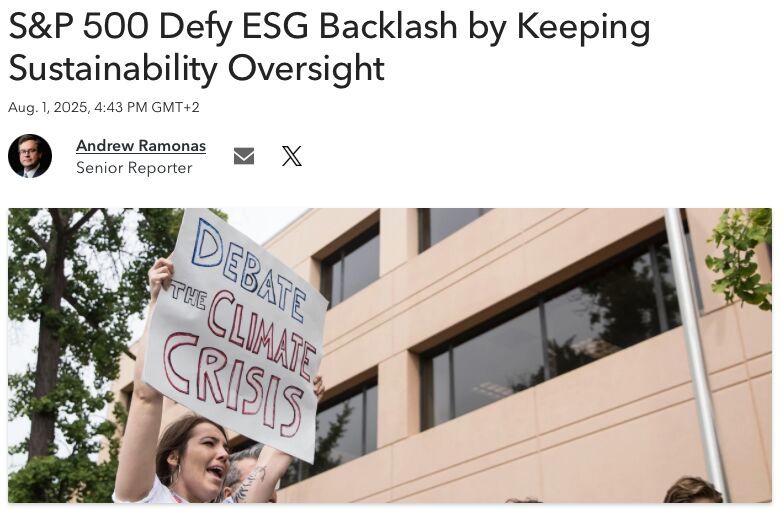

The mere existence of such board committees is not that important. What truly matters is what these committees actually do, and the mindset with which they approach sustainability discussions. In a recent paper, I argued that such committees (structure) should be evaluated alongside directors’ knowledge (competencies) and their assumptions and beliefs about sustainability (mindset). This more holistic view offers a better understanding of how board-level sustainability oversight is actually practiced.
After all, a board-level sustainability committee might focus solely on compliance issues. In fact, this could be one reason why many U.S. boards retain these committees: to navigate the rapidly evolving regulatory landscape surrounding sustainability.
===
Link to Paper: https://lnkd.in/d23nStue
Bloomberg Law: https://lnkd.in/duunxQDc
04-08-2025

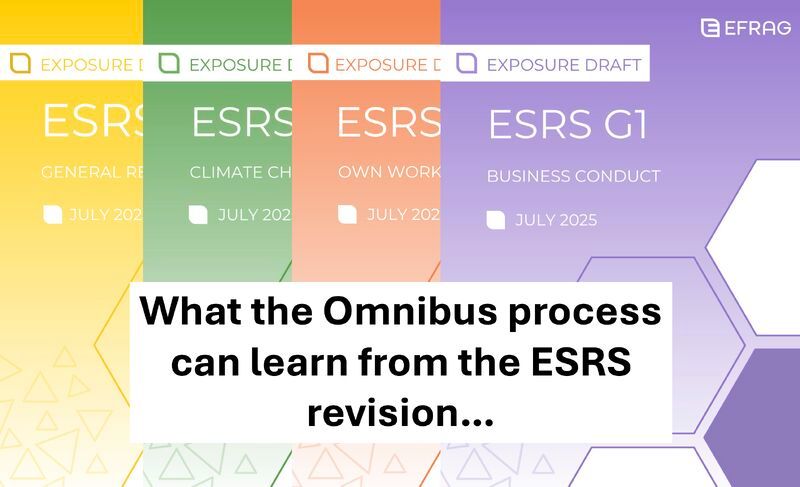

Real simplification begins at the technical level - where rules and processes are defined. Yet in the political omnibus debate, this technical dimension is overshadowed by efforts to shrink the CSRD/CSDDD scope and weaken key elements (e.g., climate transition plans).
Simplification should also be based on broad stakeholder input. EFRAG revised the ESRS based on over 800 survey responses and stakeholder consultations, and now seeks further feedback. By contrast, the wider omnibus lacks a solid evidence base - so much so that the European Ombudswoman has launched an inquiry.
Surely, the revised ESRS face their own challenges, and feedback will likely reflect this (see e.g., Frank Bold’s assessment: https://lnkd.in/dnUNF5nG). Some important data points were cut and granularity will be reduced. Still, the outcome is meaningful as it preserves the core of the ESRS.
Policymakers should take note: If simplification is truly the goal, the process should first start at the technical/operational level and then, if necessary and evidence-based, trigger further adjustments at the level of directives...
01-08-2025
1️⃣ While an overall simplification is welcome, more detailed analysis will now need to show at what cost the 68% reduction in disclosures comes (e.g. granularity) and what potential consequences may be.
2️⃣ The focus was on cutting complexity and improving usability, drawing on survey responses and also stakeholder engagements. One focus was also to streamline the double materiality assessment, reduce overlaps, and to clarify language. Overall, very good ambitions!
3️⃣ With the release, the public consultation period started which runs from 31 July to 29 September 2025. Stakeholders are encouraged to provide feedback via a consultation survey (https://lnkd.in/d94bFxHm).
4️⃣ EFRAG launched the following documents: (1) the revised standards ESRS 1 and 2 as well as (2) the revised ten topical standards, plus (3) a number of further documents (e.g., implementation guidance). Each revised standard is accompanied by a log of amendments (which is really good). All documents can be accessed here: https://lnkd.in/d37GB2zx
===
Press Release: https://lnkd.in/dr4Ni7eJ
30-07-2025
"The Commission encourages large companies and financial institutions that seek sustainability information from SMEs to base their requests on the voluntary standard as far as possible."
Note that this is not yet the Delegated Act on the VSME standard. The Commission therefore writes: "The content of the future voluntary reporting standard might differ from the current VSME Recommendation." The Q&A document (linked below) gives more details on the link between today's recommendation and the future Delegated Act (and the further process regarding SME reporting).
There is also a document on practical implementation guidance (link below). It is good that finally more authoritative guidance is provided together with European sustainability reporting standards. This is the way to go...
===
VSME Standard: https://lnkd.in/dkDicN7N
Practical Implementation Guidance: https://lnkd.in/dd-nApp7
Q&A Document: https://lnkd.in/dEEC7SGA
29-07-2025

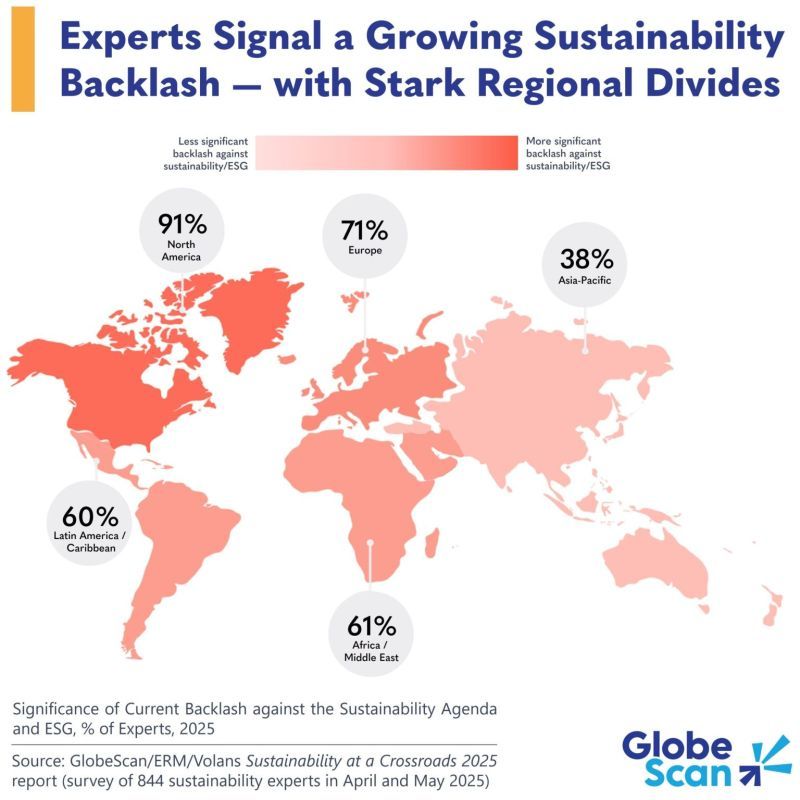

However, there are strong regional differences: 91% of North Americans perceive a pushback against sustainability compared with only 38% in the Asia-Pacific region. Globally, over 60% of experts believe that "current global political and economic shocks" threaten the sustainability agenda. Over 50% of experts believe that the sustainability agenda is in need of "radical revision".
Without doubt, a backlash exists and it is significant. But it is equally vital that we do not develop a "backlash bias" (where we only see pushbacks, resistance, and negative developments). There are also still plenty of positive aspects that drive sustainability - e.g. ranging from the EU Clean Industrial Deal to renewables experiencing record growth rates in 2024.
===
Full Study: https://lnkd.in/deS3WvK9
26-07-2025
Kofi Annan first called for a "global compact" of shared values during his address at the World Economic Forum on 31 January 1999 (see the decisive part of his speech in the video). While the Compact was often critcizied for its lack of enforcement, it deserves credit in many ways:
1️⃣ It helped to mainstream the debate around corporate sustainability by providing an early, widely accessible network through which businesses could engage with the broader sustainability agenda.
2️⃣ It succeeded in engaging companies of all sizes - from multinational corporations to SMEs - and from both developed and developing countries.
3️⃣ While not an enforcement body, it catalyzed a range of tools (e.g., on reporting and benchmarking) which are used until today.
Most of all, the Compact has co-shaped the global narrative on corporate sustainability and helped to embed it into corporate language. The ten principles provide a moral compass that is more relevant than ever, especially right now in times of deregulation and sustainability backlash...
===
Read Kofi Annan's Speech: https://lnkd.in/dHACNhrv
24-07-2025
1️⃣ VARIETY: High variability of report length and style - the average is 115 pages. Interestingly, Southern EU companies have longer statements (e.g. Spain, average 222 pages), while Northern EU companies produce shorter reports (e.g., Denmark, average 69 pages).
2️⃣ COMPARABILITY: The high-level structure of the reports is comparable and consistent leading to a "good comparability of results at a high level".
3️⃣ TOPICS: As confirmed by other studies, E1, S1 and G1 were by far the most disclosed (>90%), while sub-topics such as "Biodiversity Animal Welfare" (G1) or "Microplastics" (E2) were rarely material (<5%). Only 10% of preparers considered all 10 topical standards.
4️⃣ STAKEHOLDERS: One significant gap is the lack of broad stakeholder engagement in the double materiality assessment - e.g., only 20% of firms consult with unions.
5️⃣ TRANSITION PLANS: 55% of companies have a climate transition plan, but the disclosure of the elements of such plans "is not yet homogenous across prepares, hindering comparability."
===
Database with all Reports: https://lnkd.in/dWt_7iws
24-07-2025
1️⃣ The Opinion makes clear that states that are party to the UNFCCC "have an obligation to adopt measures with a view to contributing to the mitigation of greenhouse gas emissions and adapting to climate change."
2️⃣ The Court clarified that obligations also exist under customary international law. This could have consequences for states that are not (anymore) party to the Paris Agreement (such as the U.S.).
3️⃣ "Failure of a State to take appropriate action to protect the climate system from GHG emissions — including through fossil fuel production, fossil fuel consumption, the granting of fossil fuel exploration licences or the provision of fossil fuel subsidies — may constitute an internationally wrongful act which is attributable to that State."
4️⃣ The Court made a clear link between between human rights and climate change. "[T]he human right to a clean, healthy and sustainable environment is essential for the enjoyment of other human rights."
While not legally binding per se, this Advisory Opinion carries significant legal and political weight. The Opinion interprets binding international law to which countries have already committed. Courts are likely to treat this Opinion as a persuasive authority, and it will impact rulings that have binding effect under national or regional legal systems.
❗ From now on, climate inaction by governments does not just reflect another policy failure, but it can be seen as a breach of international law.
22-07-2025

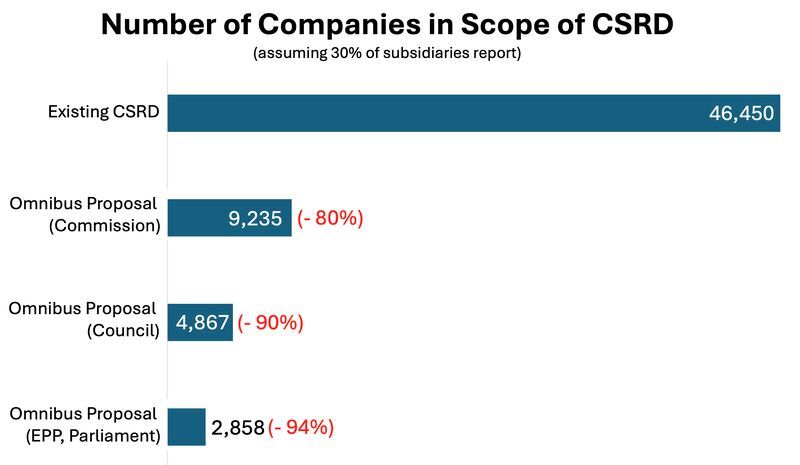

These calculations are based on a paper that I published together with Andreas Hoepner, Theodor Cojoianu and Fabiola Schneider last week (https://lnkd.in/d999FfV4). We propose a compromise solution with a 500-employee threshold. This would bring 6,853 companies back into scope (still -65% compared to the existing CSRD).
We show that this approach can lead to additional cost savings if some companies are not immediately required to obtain limited assurance. Although assurance is important, a phased-in implementation of assurance (aligned with the Draghi Report’s emphasis on regulatory proportionality) is a sensible option.
Basic message: It's more effective to involve a larger number of companies in a basic, legally required reporting system - so they can learn and improve - than to have only very few companies follow a more advanced reporting regime.
21-07-2025

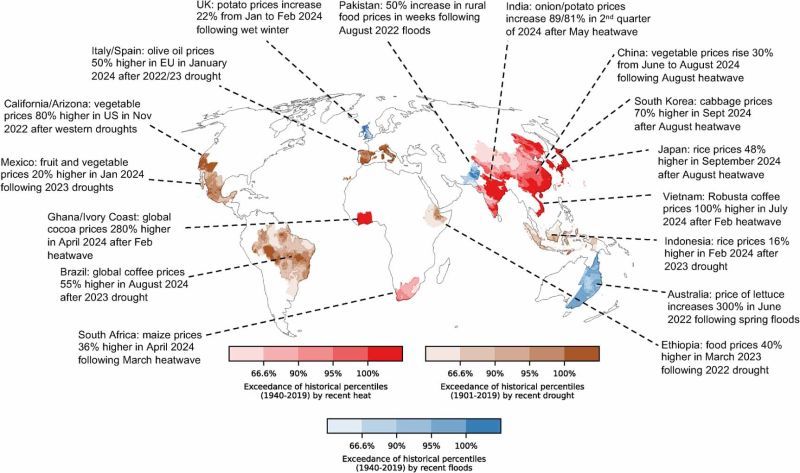

The study, co-authored by scholars from the Barcelona Supercomputing Center and the European Central Bank, paints a truly global picture. For instance, in California and Arizona vegetable prices increased 80% in November 2022 after the extreme drought, while in India a heatwave in May 2024 pushed up onion prices by 89 per cent.
The study mentions one vital, yet often unacknowledged fact: all of this has likely impacts on public health. "When price increases shift consumer spending towards cheaper, often less nutritious options, or when climate extremes directly affect the prices of nutritious foods such as fresh fruit and vegetables, this can have knock-on consequences for the quality of diets."
Markets are changing right before our eyes... and yet we remain blind.
===
Full study (open access): https://lnkd.in/dnm9x5W7
#climatechange, #sustainability
18-07-2025

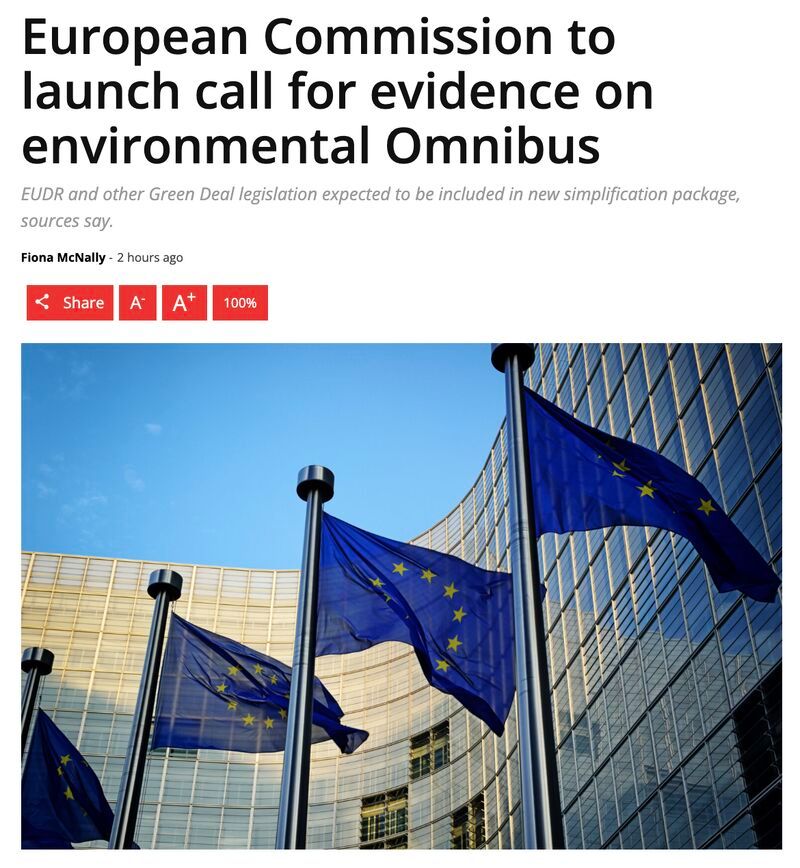

This new omnibus is planned for the autumn, and a call for evidence will be published "shortly". Such a call for evidence usually reflects a formal request for input from stakeholders and the public to help shape upcoming policy.
On the EUDR, the Commission faces strong headwinds from member states and also the EPP, so its inclusion into such a new omnibus would be no big surprise. The inclusion of the Green Claims Directive seems odd (as the trilogue still needs to finish), but it is again not surprising as the Commission indicated that it views this directive as not aligned with the simplification agenda.
It is really disappointing to see that (again!) regulations and directives that are not even implemented become the target of further "simplification" efforts.
===
Full Story by RI: https://lnkd.in/dVDt5WCz
17-07-2025
1️⃣ We propose a two-tiered system: companies with 500–1,000 employees (Tier 1) would follow a lighter reporting regime without limited assurance, while firms with over 1,000 employees (Tier 2) report under the revised ESRS with limited assurance. This would bring 6,850 companies back into CSRD scope and it controls costs. Another scenario (500-5,000 employees in Tier 1) even shows that cost savings are higher than under the original omnibus proposal.
2️⃣ The EUR 450 million threshold proposed by the Council and Parliament (EPP) drastically reduces firms in scope - from about 9,200 firms (Commission) to 4,800 (Council) and 2,800 companies (EPP). This threshold makes the employee criterion largely irrelevant, as firms with such turnover typically have over 1,000 employees.
3️⃣ Considering the CSRD subsidiary exemption is essential to avoid overestimating scope. Under the EPP proposal, 3,400 firms appear in scope if all subsidiaries report. But, assuming that 30% of subsidiaries report (which is more realistic and used by the Commission), the number drops to 2,800.
4️⃣ Importantly, any cost and scope calculation must factor in the benefits of reporting. We cannot make this a pure "compliance cost game". The paper therefore identifies four key benefits of reporting which are discussed in the peer-reviewed academic literature.
Just like the Commission, we used the Orbis database for the calculations. Thanks Theodor Cojoianu, Andreas Hoepner, and Fabiola Schneider for the collaboration.
16-07-2025



The Ombudswoman also wants further clarification around the very short inter-departmental consultation time at the Commission. For the omnibus this was just 24h, while normally this is 10 days (with 48h fast-tracking being possible in exceptional situations).
All of this shows that the process around the Commission's omnibus proposal faced many challenges, and that clarifications around these issues do not seem to be simple and straightforward. A full and detailed inquiry is needed here as a neglect of these problems would even further undermine trust in the process.
The Ombudswoman's inquiry started 21 May. So far, her Office inspected documents and also had a meeting with the Commission. Now, the Commission has until 15 September to provide more detailed reasoning.
===
Ombudswoman Press Release: https://lnkd.in/dHEed-q9
12-07-2025
Moreover, Wave 1 companies with more than 750 employees will have the same phase-in provisions which currently apply to firms with up to 750 employees.
The Commission argues that this "Quick Fix" became necessary as Wave 1 companies were not included into the "Stop-the-Clock" Directive that was part of the #omnibus. Hence, this Delegated Act is supposed to ensure that Wave 1 companies do not face additional requirements.
===
Press Release: https://lnkd.in/dsTaYmwn
Link to the Full Delegated Act: https://lnkd.in/d7Qrhvz8
11-07-2025
It was also communicated that "EFRAG has adopted a less granular approach to narrative disclosures in the area of policies, actions and targets (PATs) as well as in the topical specifications of ESRS 2."
10-07-2025
The EPP therefore tabled a Resolution that calls on the Commission to repeal and revise the country classification based on "up-to-date data". Clearly, the current country classification is not perfect (only four countries are "high-risk"), but this Resolution rather wants to weaken the EUDR and possibly delay it further. Actually, the Commission committed to reviewing the EUDR in 2026 and such technical problems could be addressed then.
What's next? Resolutions are not legally binding, but they push for action by the Commission. Now, the pressure is on the Commission, especially as there will be an informal meeting of the Environmental Council and 18 EU agricultural ministers already called for a revision and further delay of the EUDR earlier this week. All of this makes a "simplification" of the EUDR more likely.
The "simplification" agenda gets wider every day, reaching much beyond the #omnibus by now...
===
More Background: https://lnkd.in/d_nJ5NEu
09-07-2025
This exemption extends the existing two-year transitional provisions, which currently apply only to companies with fewer than 750 employees, to all Wave 1 companies. Needless to say, this will further limit the scope of reported information for FY2025.
The safeguard clause, however, makes clear: "[W]here an undertaking uses those temporary exemptions for a complete topical standard, it must nevertheless report certain summarised information on the topic concerned if the undertaking has concluded that the topic in question is material."
===
Great and more detailed discussion of this Delegated Act by Simon Taylor: https://lnkd.in/daAuZ_zT
08-07-2025
The latest data by RepRisk shows that greenwashing remains a significant problem. Although cases declined globally by 12% in 2024 (mostly due to a decline in Europe), high-risk incidents increased by over 30%. Almost one third of companies linked to greenwashing in 2022-23 were repeat offenders in 2023-24.
This shows: there is still a lot to learn and regulators need to be more serious. It is exactly for this reason that the EU's Green Claims Directive is needed...
===
Official Link: https://lnkd.in/dhZANwg6
RepRisk Greenwashing Data: https://lnkd.in/drAz9GFB
05-07-2025
1️⃣ Companies do not have to assess the eligibility and alignment of "non-material" economic activities. "For non-financial companies, activities are considered non-material if they account for less than 10% of a company's total revenue, capital expenditure (CapEx) or operational expenditure (OpEx)."
2️⃣ For financial undertakings, indicators like the green asset ratio (GAR) for banks are simplified, and reporting templates will contain fewer data points (e.g., 64% for non-financial companies).
3️⃣ The criteria for ‘do no significant harm' (DNSH) to pollution prevention and control related to the use and presence of chemicals are simplified.
Some of the changes are meaningful (e.g., the materiality thresholds), while other changes are questionable (e.g., the flexibility for financial companies to not report KPIs until 2027). But it shows that "simplification" should happen at the technical level instead of having very politicised debates about scope criteria and fundamental content of EU directives.
This applies as of 1 January 2026 and will cover the 2025 financial year (with an option to defer application to the 2026 financial year).
===
Press Release: https://lnkd.in/dq5Q7TCb
Delegated Act: https://lnkd.in/e6JfvJPM
04-07-2025

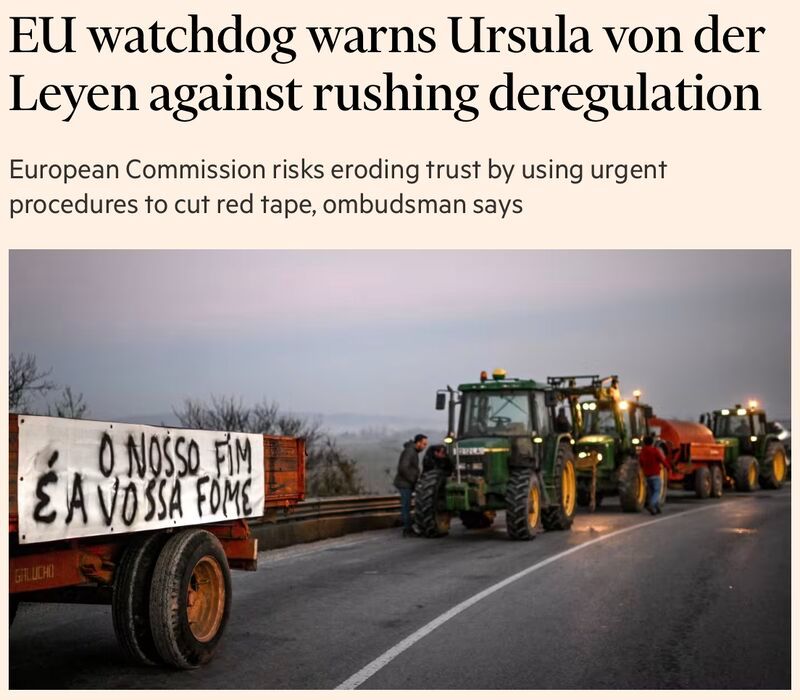

On the #omnibus she warned: “The way these decisions are being perceived [...] is that competitiveness is, in a way, coming at the cost of these legislative procedures and pre-established laws” and that there is a perception that “these decisions are being taken behind closed doors, that they are being rushed."
Considering the lack of impact assessments, she said: “There are situations where you can derogate from these impact assessments, but they are normally exceptional.” While she acknowledged that the legislative process is time-consuming, she argued that “the procedures exist to guarantee also that there is fairness”.
All of this shows: those who expressed serious concerns around the omnibus legal process have a point. The Ombudswoman has an ongoing official inquiry into the omnibus process to clarify concerns around lack of justification and consultation.
===
FT Story: https://lnkd.in/diJn5nEv
02-07-2025
▶️ Set the #CSRD scope to 500 employees to ensure regulatory consistency;
▶️ Simplify the ESRS in a way that double materiality is fully preserved;
▶️ Maintain risk-based due diligence aligned with the UNGPs;
▶️ Keep climate transition plans; include "through best efforts, put into effect";
▶️ Ensure that value chain caps allow for constructive information exchange.
It is great to see large and small organizations joining forces here. The signatories include large players (e.g., Allianz, EDF, IKEA) as well as small and mid-sized companies. This is the right spirit to carry the discussion forward...
❗ The statement remains open for signatures: https://lnkd.in/dNXc5QFe
01-07-2025
Very good suggestion by Renew to introduce "medium-large undertakings" (between 500 and 1000 employees). This would really help with what Draghi suggested in the first place: better align legal requirements and company size to make things proportionate.
Also very good remarks by the Greens/EFA on contextualising reporting requirements more (e.g., in terms of sector) and pushing back the employee threshold. The document also shows significant pushback against tier-1 limitation of due diligence and the delegation of climate transition plans.
It will not be easy to find a compromise given how far the positions are apart. But this document clearly shows that the EPP draft position is challenged significantly. Next stop: negotiations start 15 July.
01-07-2025

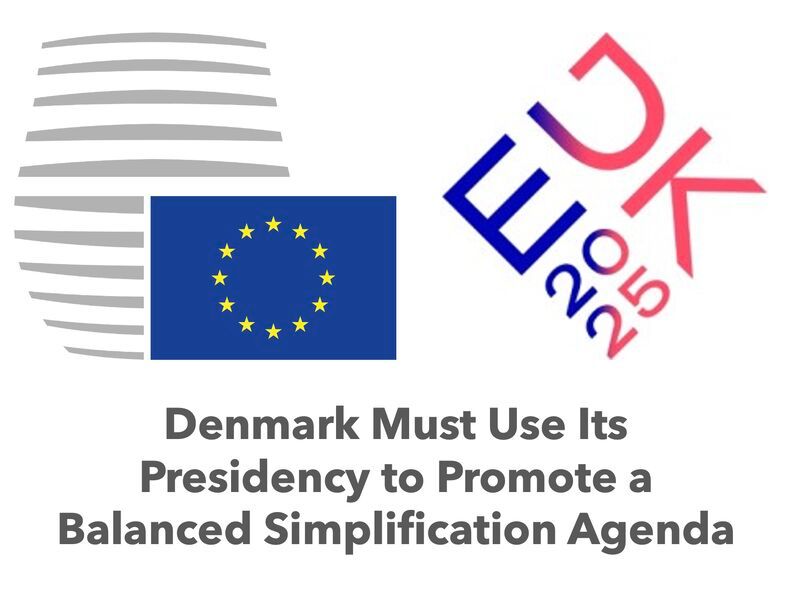

1️⃣ Omnibus: The Parliament is scheduled to adopt a position in October, which means that Denmark will chair the trilogue negotiation meetings which are likely to follow in Nov and Dec (considering the high pace of the process, so far). This will not be an easy task as France and Germany push for significant changes (especially on #CSDDD) and hence may stand in the way of compromises.
2️⃣ Green Claims Directive (GCD): The Danish Presidency also "inherits" the GCD trilogue which was not completed due to the back-and-forth in the last two weeks. Italy withdrew its support and the current situation is unclear. So, it is up to Denmark to coordinate and push the GCD over the finish line.
3️⃣ SFDR: The Commission's first proposal for a simplification of SFDR is planned for Q4 2025. Hence, first talks in the Council on this simplification process will likely fall into the Danish Presidency.
4️⃣ EU Climate Targets: The 2040 target will be presented tomorrow, but the 2035 target is long overdue (planned for February) and remains contested. France pushes for a lower-than-expected 2035 goal and hence a delay in emissions reductions. Finding a deal will be critical, but not easy.
Lots of work to do! Good Luck Denmark - Europe is counting on you to balance the need for simplification with the need for impactful sustainability regulations.
===
Read Denmark's Program for the Presidency: https://lnkd.in/dXRgPDkS
30-06-2025

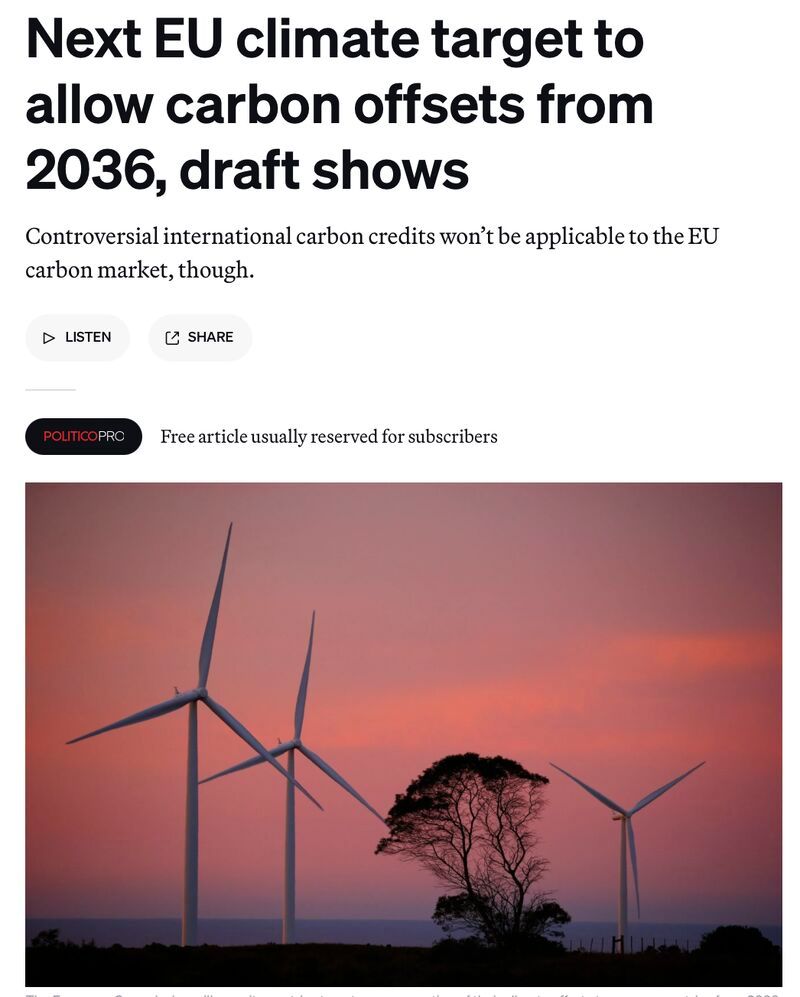

This moves comes despite criticism from the EU's own scientific advisory board on climate change which does "not recommend using international carbon credits to replace domestic emission reductions when meeting the 2040 target.”
The new climate goal will contain 18 “elements” that were included to make the 2040 target more palatable to skeptical governments (e.g., to open the EU carbon market to permanent CO2 removals). This just shows how politicised debates around sustainability have become, also much beyond the #omnibus. And it is frustrating that the EU ignores the advice of its own scientific advisory body.
===
News Story: https://lnkd.in/d3h_db5h
Report by EU's Scientific Advisory Board: https://lnkd.in/dHRGZ44R
27-06-2025

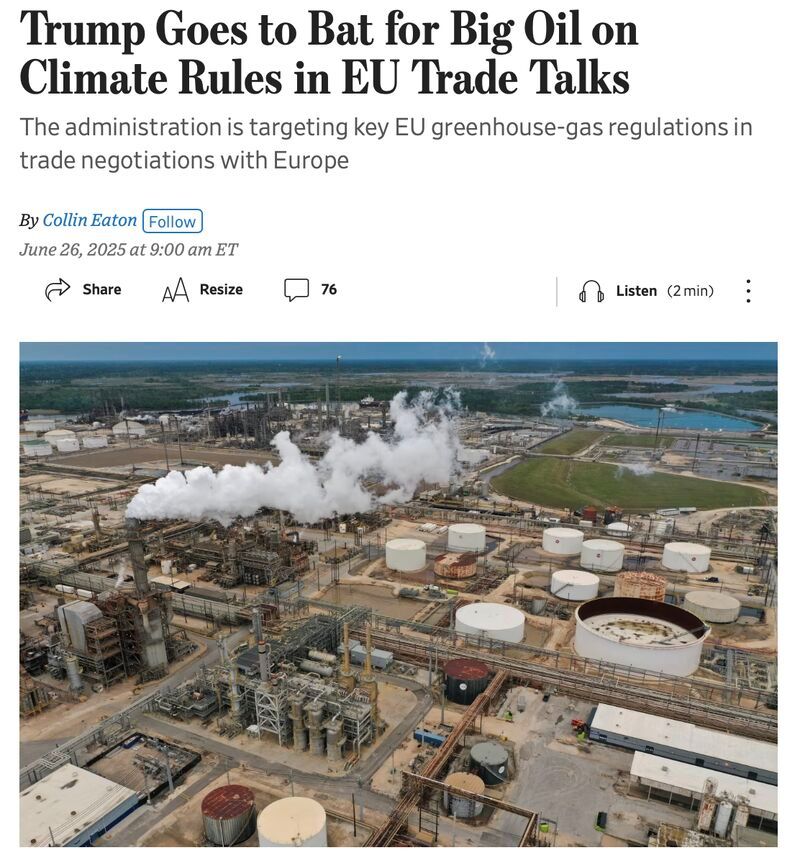

Darren Woods (CEO of Exxon) commented on the CSDDD: "This is probably one of the most irresponsible pieces of legislation I've seen come across in any country." The WSJ writes that "senior Trump officials indicated to oil executives that they plan to include the issue in trade talks with the EU."
So far, it was unclear whether the CSDDD played a role in the trade talks. But the White House also confirmed that "unfair regulatory burdens placed on American companies" is a focus in the ongoing negotiations.
Such pressure could shape the path of the #omnibus. Currently, climate transition plans are already either completely deleted (EPP draft position) or significantly weakened (Commission and Council positions). With additional pressure coming from the U.S. (and also Qatar), it will be more difficult to retain a version of such plans that really is impactful.
===
Wall Street Journal (WSJ): https://lnkd.in/d7uwVWbK
26-06-2025

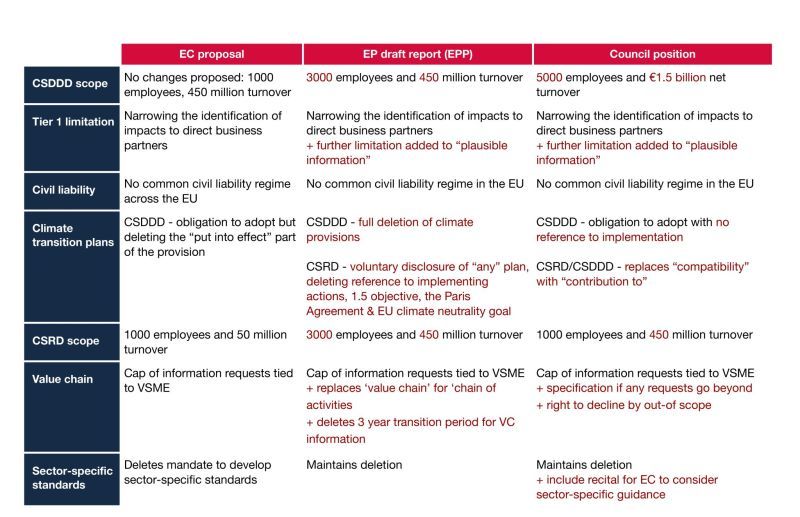

CONTENT: The image below gives a good overview of the three existing positions (image credit Frank Bold). Positions are far apart when it comes to the scope of #CSRD and #CSDDD and we can expect this to be the main "battle ground". For orientation on CSRD: approx. 47,000 companies were in scope of the original CSRD; a 1,000 employee threshold puts around 11,700 firms in scope (-75%) while a 3,000 employee threshold puts approx. 3,000 businesses in scope (-94%). But positions also differ on climate transition plans, tier-1 limitations of CSDDD, and "value chain caps" related to CSRD.
PROCESS: The omnibus follows the EU's ordinary legislative procedure where three parties interact. (1) The European Commission made a proposal (on 26 February) because it has the right of initiative. (2) The Council of the EU (representing member states) has agreed its negotiation mandate on 23 June. (3) The European Parliament (representing EU citizens) is in the process of forming its negotiation mandate - so far, only a first draft report by the EPP has been communicated. The Parliament will likely adopt its negotiation position in October. Once this has happened, the trilogue starts where the three institutions find a final agreement (either at the end of 2025 or early 2026).
It is sometimes confusing when all these things play together, but what matters in the end is that we get an end result that improves the regulations and not makes them irrelevant to the majority of companies. Right now, it does not look that way...
===
Threshold calculations by Accountancy Europe: https://lnkd.in/dAt9NjWA
Overview of positions by Frank Bold: https://lnkd.in/dBf53Mje
25-06-2025

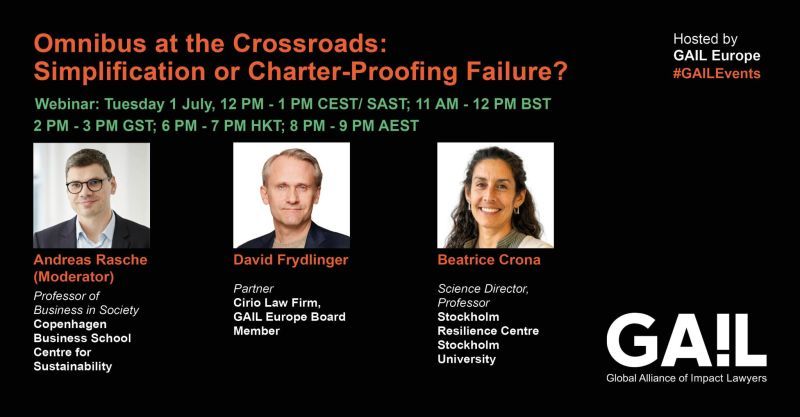

📅 Date: Tuesday, 1 July 2025
🕛 Time: 12 PM – 1 PM CEST
Some of the questions that we will debate:
1️⃣ Can the proposed Omnibus revisions survive scrutiny under the EU Charter of Fundamental Rights and the European Convention on Human Rights?
2️⃣ Are the rollbacks supported by solid environmental evidence—or weakened by scientific and data gaps?
3️⃣ What litigation pathways exist to challenge the changes—and what are the realistic timelines for European Court of Justice (ECJ) or European Court of Human Rights (ECHR) rulings?
4️⃣ How science-based thresholds and clearer legal duties can reduce reporting burdens without eroding sustainability ambitions.
Join us for a discussion where law, science and business thinking merge. Thanks to the Global Alliance of Impact Lawyers (GAIL) for hosting this webinar.
Register here: https://lnkd.in/dKdhkFjJ
===
EU Observer on Potential Legal Challenges of the Omnibus: https://lnkd.in/d2AUG4-S
25-06-2025

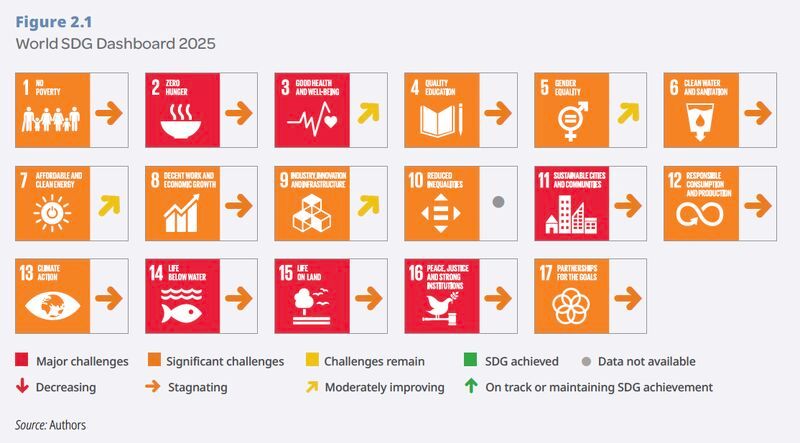

▶️ Overall, "only 17 percent of the targets are on track to be achieved
worldwide", however most UN member states have made progress on targets related to access to basic services and infrastructure.
▶️ European countries do well on the SDG Index (1. FIN, 2. SWE, 3. DK, 4. GER), but the data also shows that even these countries face significant challenges achieving climate and biodiversity goals.
▶️ "On average, East and South Asia has shown the fastest progress on the SDGs since 2015, driven notably by rapid progress on the socioeconomic targets."
▶️ Lack of "fiscal space" is the main impediment that prevents progress, but the report also points to the role of conflicts as another obstacle.
Overall, the report clearly shows that this is not the time to roll back sustainability regulations.
===
Download the Report: https://lnkd.in/dWwYy_ae
The Report includes the SDG Index and Dashboards covering all 193 UN member states. The SDG Index is based on 126 indicators, including 102 global indicators and an additional 24 for dashboards of OECD countries.
25-06-2025

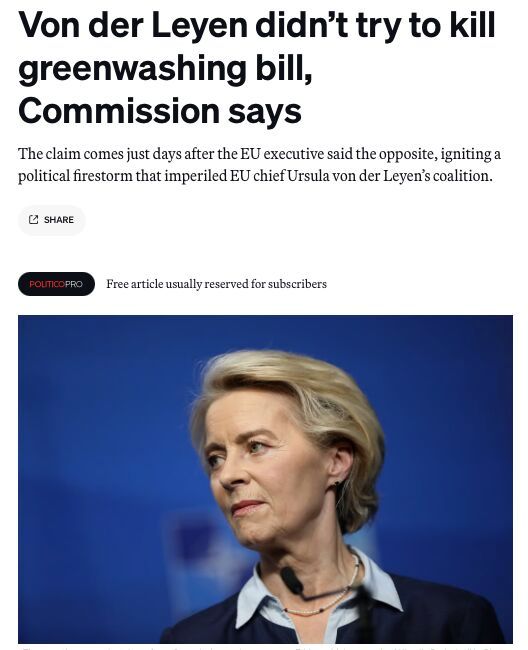

This statement contradicts the position communicated on Friday which was widely shared by multiple media outlets. But an official now said: “At no point has there been a backtrack on commitment to the Green Claims. The [Commission] would only kill the file if a resolution was not found over a specific issue: whether the law should cover businesses with fewer than 10 employees."
After Friday's announcement, things erupted in Brussels with political groups in the centre pushing back hardly. René Repasi (S&D) said: “Von der Leyen and the EPP [now] need to say that this action [the withdrawal] was an accident, and to remedy this within this week, otherwise the very foundation [of the coalition] is put into question.” And Valérie Hayer (Chair of Renew) commented: “We are on the brink of an institutional crisis.”
⁉️ What now⁉️
All of this leaves a difficult situation because Italy already pulled its support for the Directive (which killed the majority for it). Hence, the Commission says that it is up to the Council and thus member states to find a way forward. "It's up to the Council to state what its intentions are, and then we see from there." According to POLITICO, the Council will discuss the matter today.
What a political theatre. Regardless of where this ends up, one thing is clear: this endless back-and-forth on sustainability regulations does not help anyone. EU institutions must ensure that at the very least there is a basic level of certainty and predictability, even in times of "simplification"...
===
POLITICO reporting: https://lnkd.in/dswe_HvM
24-06-2025

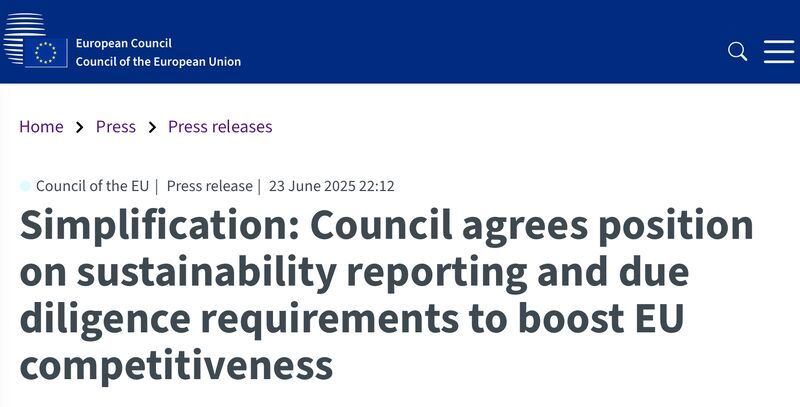

▶️ THRESOLDS / SCOPE: #CSRD scope is set at 1,000 employees plus a net turnover of €450 million --- this further reduces the scope of CSRD. #CSDDD scope is set at 5,000 employees and €1.5bn turnover --- this significantly reduces the scope of due diligence, even to an extent where one needs to question its impact overall.
▶️ DUE DILIGENCE APPROACH: "The Council’s mandate changes the focus from an entity-based approach to a risk-based approach, focusing on areas where actual and potential adverse impacts are most likely to occur." But this new risk-based approach comes with many limitations, for instance "obligations are [only] extended in case of objective and verifiable information suggesting adverse impacts beyond direct business partners."
▶️ CLIMATE TRANSITION PLANS: "The obligation to put into effect these plans is replaced by a clarification that this transition plan includes outlining implementing actions (planned and taken)." In other words, the focus is on adoption only. Further, the adoption of such plans is postponed by two years.
▶️ CSDDD TRANSPOSITION: The Council's position also postpones the CSDDD transposition deadline by one year, to 26 July 2028.
===
Press Release: https://lnkd.in/dNvj7ucX
Full document: https://lnkd.in/d62M6Zue
24-06-2025
1️⃣ "We understand and share the concern that excessive bureaucratic and regulatory demands can impact the internal operations of European companies. That is why we support efforts to reduce and streamline these demands. However, we believe it is essential to uphold certain non-negotiable principles and political commitments that have established the European Union as a global leader in social and environmental matters."
2️⃣ "We reject the false dichotomy between sustainability and social responsibility on one hand, and efficiency and competitiveness on the other."
3️⃣ "We advocate for competitiveness rooted in innovation and social justice — not in a race to the bottom through cost cutting or the erosion of welfare standards and human rights, both within the EU and in third countries."
For further details please read their full statement.
This message must be heard by the institutions of the European Union. The current rollback of sustainability regulations endangers years of hard work, it undermines Europe's long-term competitiveness and its recognised role as a global norm setter.
24-06-2025
The #CSRD threshold is set at 1,000 employees (so the Council agrees with the Commission) and the #CSDDD risk-based approach will face significant limitations (e.g., firms are only required to take "reasonable measures" when collecting information).
This text will be discussed by the Permanent Representatives Committee (Coreper II) later today (https://lnkd.in/dEeB8JP6). If there is agreement, it will move to the General Affairs Council which already meets tomorrow (https://lnkd.in/d7iSmU-m).
23-06-2025

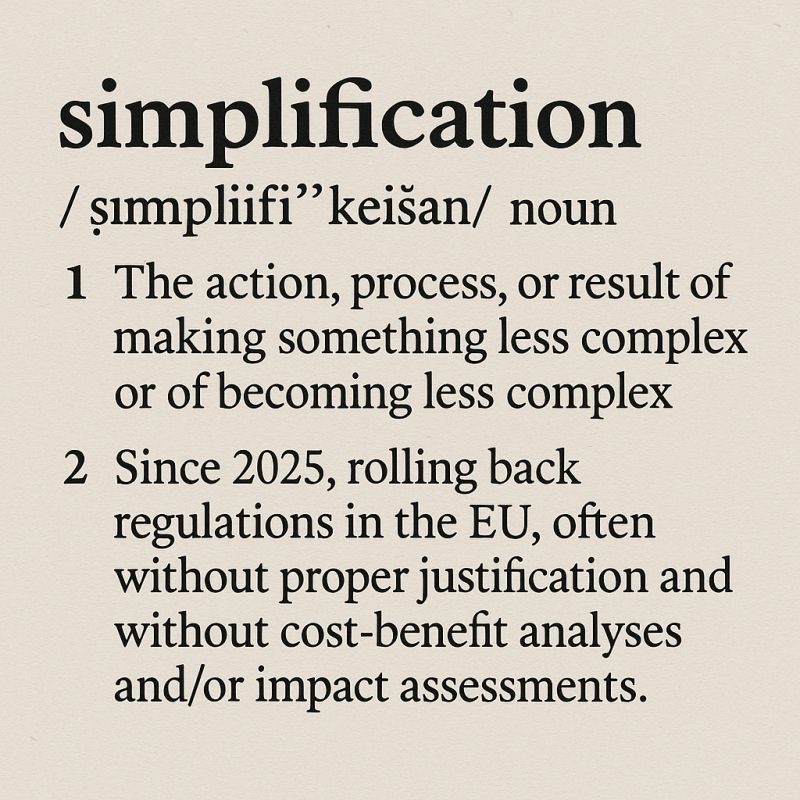

Simplification, in its original use, aims at making something less complex and more manageable. But much of what is suggested by the omnibus has little to do with simplification. (1) De-scoping companies from #CSRD & #CSDDD makes these directives irrelevant (from a compliance view). (2) Deleting climate transition plans does not simplify anything. (3) Canceling EU-wide civil liability actually complicates things.
1️⃣ Real simplification happens at the "technical level" where standards (like the ESRS) are revised to make them more focused, workable, and easier to implement.
2️⃣ Real simplification includes aligning terminology and methods to improve and ease communication. While there is a bit of this in the omnibus, the real focus and debate lies somewhere else, unfortunately.
3️⃣ Real simplification includes more and better guidance for regulatory implementation, so that those who are in charge of putting things into practice face less ambiguity.
Simplification and its sister term "competitiveness" have turned into catch-all phrases. They are used with such vagueness that their meaning is difficult to clarify. Some politicians use this lack of clarity strategically to enhance the public acceptance of the regulatory rollback. After all, "deregulation" sounds really harsh...
We need to reclaim language!The sustainability backlash is also a linguistic backlash driven by the misleading use of terms to mask deregulation. Several terms are misappropriated in the current debate, but one stands out: "simplification".
Simplification, in its original use, aims at making something less complex and more manageable. But much of what is suggested by the omnibus has little to do with simplification. (1) De-scoping companies from #CSRD &#CSDDD makes these directives irrelevant (from a compliance view). (2) Deleting climate transition plans does not simplify anything. (3) Canceling EU-wide civil liability actually complicates things.
1️⃣ Real simplification happens at the "technical level" where standards (like the ESRS) are revised to make them more focused, workable, and easier to implement.
2️⃣ Real simplification includes aligning terminology and methods to improve and ease communication. While there is a bit of this in the omnibus, the real focus and debate lies somewhere else, unfortunately.
3️⃣ Real simplification includes more and better guidance for regulatory implementation, so that those who are in charge of putting things into practice face less ambiguity.
Simplification and its sister term "competitiveness" have turned into catch-all phrases. They are used with such vagueness that their meaning is difficult to clarify. Some politicians use this lack of clarity strategically to enhance the public acceptance of the regulatory rollback. After all, "deregulation" sounds really harsh...
We need to reclaim language!
21-06-2025

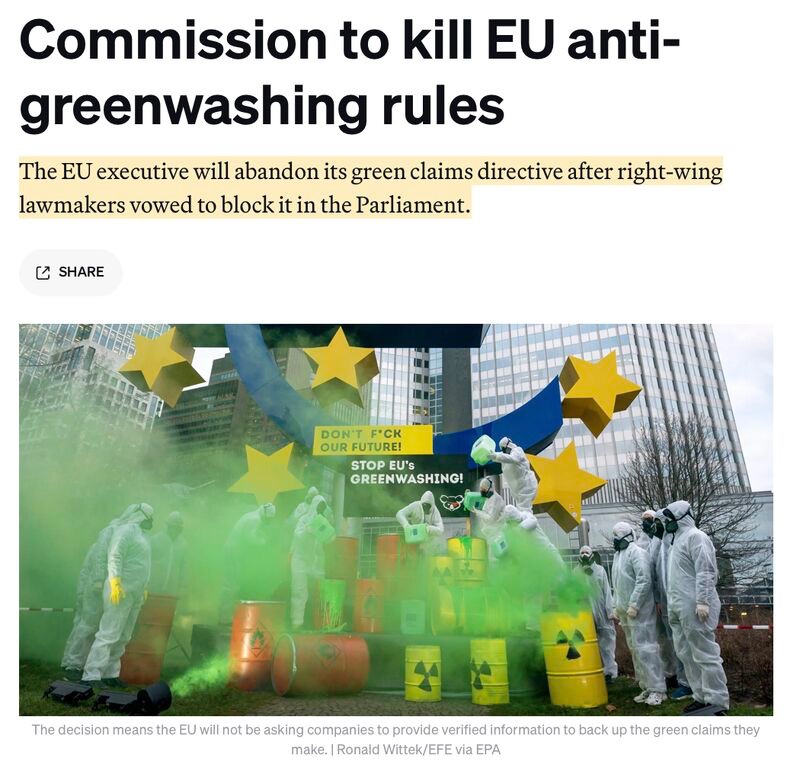

The decision comes only briefly after the EPP wrote a letter to the Commission that they will not support the GCD any longer and request withdrawal. Such a withdrawal is very unusual, but the Commission has the right of initiative and hence can use it also to withdraw proposals for legislation.
Fighting greenwashing will become more difficult with this withdrawal....
===
Some Background: https://lnkd.in/dJmsdsVp
POLITICO Reporting: https://lnkd.in/dbFK2RYh
20-06-2025
The argument is, again, administrative burden: "[T]he GCD risks unduly hindering sustainability communication through procedures that are overly complex, administratively burdensome, and costly." Also: the current proposal does not "convincingly demonstrate that the expected benefits of the regime would outweigh the significant costs and regulatory uncertainty it entails."
Lack of benefits? Anti-greenwashing legislation is needed (1) to build consumer trust and to protect consumers, (2) to ensure fair market competition, (3) to reduce reputational and litigation risks for companies, and (4) to protect sustainability goals in the sense to better ensure that corporate claims are genuine and backed by actions. But apparently these benefits do not seem to be sufficient.
"Without backing from the EPP, the Parliament's largest group, the file has almost no chance of being adopted, a parliamentary source told Euractiv." The Letter comes just days before the final round of negotiations of the GCD which were scheduled for 23 June.
❗ UPDATE (20 Jun, 14:00): The Commission just indicated that they intend to withdraw the GCD: https://lnkd.in/dAG5sxxr
===
Euractiv: https://lnkd.in/dPcucNkk
Thanks to Inma V. for sharing the article.
20-06-2025
"Preliminary indications based on the current status of discussions and still subject to change until the final decisions, suggest that the activation of the levers described above and the systematic review performed are expected to achieve a substantial reduction in the number of datapoints (aiming at 50+ per cent) while preserving the integrity of the core objectives of the CSRD."
More insights in the full report. #omnibus
19-06-2025

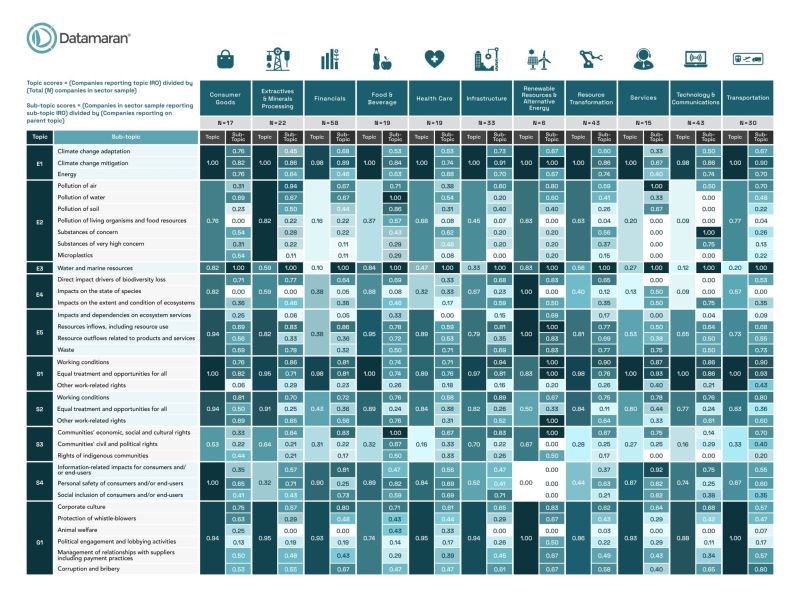

1️⃣ Reports average 103 pages - which is no(!) different from the average length of 2024 sustainability reports published by EU issuers. However, there is a clear shift towards more standardized and in-depth disclosures.
2️⃣ "Negative impacts dominated CSRD disclosures, characterizing 37% of IROs – nearly triple the share of opportunities (13%)."
3️⃣ "Almost all companies reported on Climate Change (E1 – 99%), Own Workforce (S1 – 98%), and Business Conduct (G1 – 92%), signaling these as core sustainability priorities. In contrast, Biodiversity (E4 – 44%), Water (E3 – 37%), and Affected Communities (S3 – 36%) were the least reported topics, signaling potential future blind spots."
4️⃣ Context is often missing. "Many companies omitted key contextual details – 31% didn’t clarify whether IROs were actual or potential, and 21% left out time horizons altogether."
===
Full Study by Datamaran: https://lnkd.in/d4cwWS2W
18-06-2025

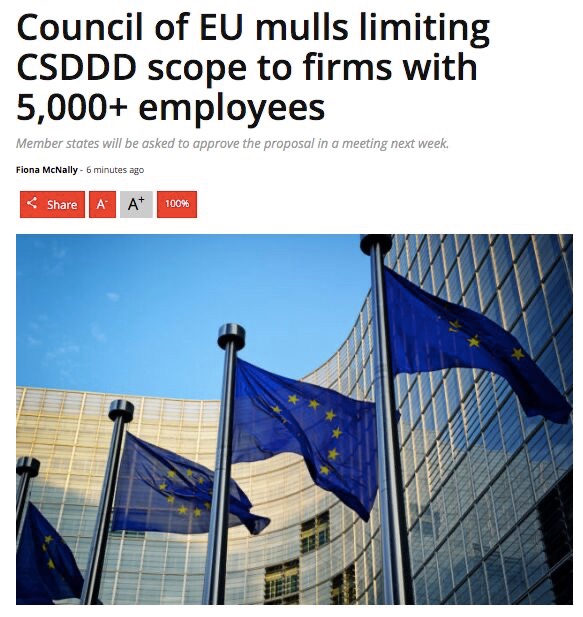

It is also suggested to delay the adoption of climate transition plans to 2030, and to move from a "best efforts" behavioural standard towards just "reasonable efforts". Further, the Polish Presidency suggests to postpone the transposition of the CSDDD by one additional year to July 2028.
Further Process:
▶️ Coreper II meets today (18 June) and the Presidency Compromise will be debated (see agenda: https://lnkd.in/d3JuhfMH)
▶️ If Coreper II finds an agreement, the#omnibus will move to the Council (General Affairs) for their meeting next week (24 June) for final adoption.
It is clear that the Polish Presidency tries to further water down the #CSDDD in a last minute move. Denmark takes over the Presidency on 1 July and is unlikely to share suggestions like a 5,000 employee threshold.
===
Story in RI: https://lnkd.in/dYweYgdg
18-06-2025

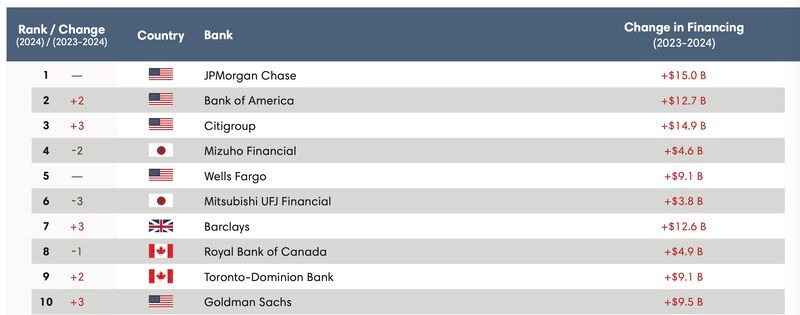

JP Morgan remains the world's biggest financier of fossil fuel activities, with Barclay's being the biggest European financier. The data shows that Chinese banks remain the biggest financiers of coal.
It is clear that the current political environment, especially in the U.S., leaves its mark. In recent months, many banks have rolled back or delayed their net-zero targets. Some banks seem to be using this newly gained flexibility to increase fossil fuel financing and underwriting.
===
Full Report: https://lnkd.in/dzpkkH7c
16-06-2025



The Commission itself admits potential negative effects: On #CSRD, they write: "It serves to make companies more aware of fundamental rights and positively influence how they identify and manage actual and potential adverse impacts on fundamental rights. The proposed modifications may partially diminish these positive impacts [...], but the reduction of administrative burden on such companies should lead to other societal gains in terms of wealth creation, employment and innovation, including innovation for sustainability." (p. 13, omnibus proposal). In other words, some of the positive impacts are traded in for other "societal gains".
The EU may repeat past mistakes here. In 2014, the European Court of Justice declared the Data Retention Directive invalid for breaching fundamental rights and not meeting the principle of proportionality. Similar legal challenges of the omnibus would only add to the legal uncertainty created by the process so far...
===
EU Observer: https://lnkd.in/deiipSZF

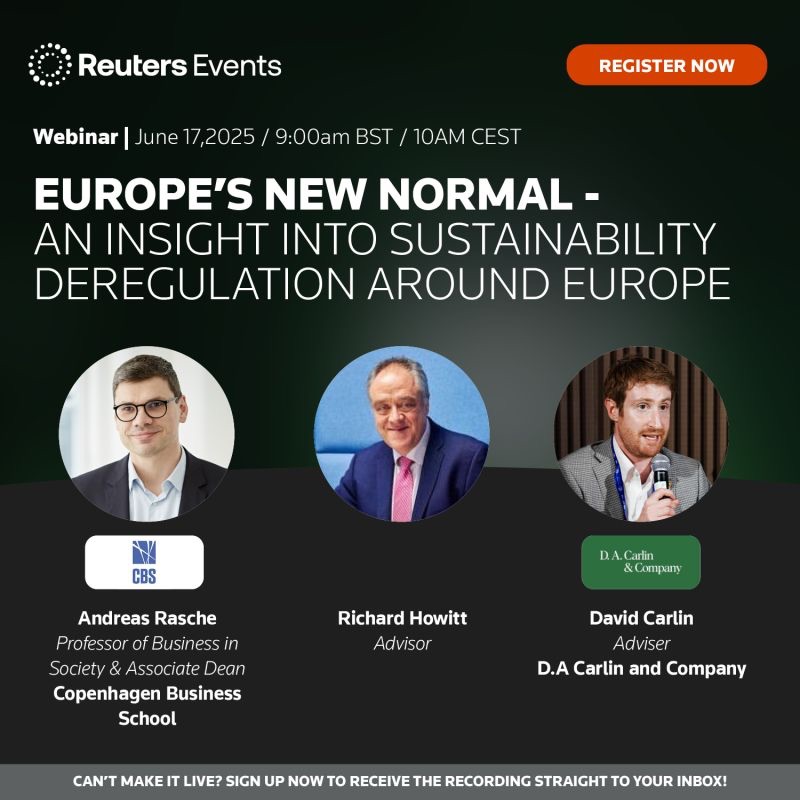

We want to put the #omnibus proposal into broader perspective. Which current political and economic realities shape the omnibus debate and what can we expect in terms of outcomes? How can executives best react to the deregulation tendencies? How does ambitious corporate sustainability look like in times of "simplification"?
We cannot afford political headwinds in Europe to set back the progress that has been made.
===
Register here: https://lnkd.in/dCREV3uM
15-06-2025



The primary motivation for the law is economic protection of European companies. The new law spares European players like H&M, Zara and others from major economic effects. But, these brands still account for the lion's share of clothing sold. It is therefore in a sense a lost opportunity to really tackle overconsumption and the related ecological damage.
This shows (a) that some progress is still possible if (b) sustainability concerns are coupled to current political priorities. This may not always yield the most ambitious results, which of course is a shame, but it can open doors to initiate change processes.
While the French Senate passed the bill, it is not law yet. A joint committee of senators and lower house deputies will meet in September to produce a final legal text.
===
Euronews Story: https://lnkd.in/d-cszcrj
14-06-2025

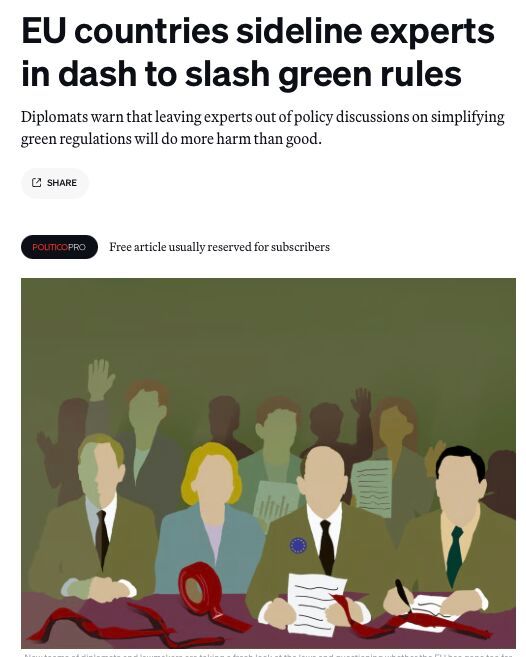

Other diplomats complain that the process in the Council "is a mess" because the national envoys appointed to work on the files are not experts on the topics they are "simplifying". A key problem is the governance structure underlying the simplification work, the so-called Antici Group. According to POLITICO sources, this Group is designed in a way that the experts who were previously in charge of those legal files that are being simplified "now sit in the background, unable to chime in."
"They say a deliberate political decision was taken to distance technical experts from the simplification work in order to fast-track the process of reducing the regulatory burden." Something is wrong when expert opinions become a burden in themselves. The incoming Danish Presidency (starting 1 July) must address this problem.
It seems like speed of process is traded in for precision and quality, which leads to a simplification of another sort: a simplified treatment of the underlying topics and debates...
===
POLITICO: https://lnkd.in/dNZ7gPbb
13-06-2025



Limits are: (1) Companies are allowed to "gradually assess risk areas" in their in-depth assessment, starting with the most severe risks and then over time move to less severe risks and (2) the initial scoping only needs to rest on information "that is reasonably available to the company." Interestingly, both points also appear in the EPP rapporteur's first draft report for amendments (see 22 and 22a).
In terms of #CSRD scope, the Council writes: "Sustainability reporting [...] of large undertakings with an average of more than 1000 employees during the financial year is important to understand the transition to a climate-neutral economy." This implies that a potential 3,000 employee threshold (as suggested by the EPP in the Parliament) would not find the support of the Council.
The Council is likely to finalise its negotiation position in June, as this is when the Polish Presidency ends.
12-06-2025

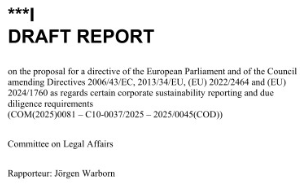

1️⃣ #CSRD & #CSDDD to be aligned at 3,000+ employee threshold and €450 million net turnover. With this new scope, one needs to ask: What will be left of CSRD and CSDDD?
2️⃣ Climate transition plans are completely deleted.
3️⃣ Further Limiting CSRD Value Chain Information: The Report proposes that "the notion of ‘value chain’ should be replaced by ‘chain of activities’." This will further limit value chain reporting and limit transparency and accountability.
4️⃣ Further Limiting CSDDD Information Requests: Seeking further information from direct business partners is further limited and only possible under "certain conditions." In general, companies "should not seek to obtain information from their business partners but rely only on information that is already reasonably available such as publicly known information, information from searches and information gained through earlier cooperation."
This report will provide the basis for the negotiation in the Parliament. Hopefully, other political groups in the centre will push back so that a meaningful compromise can be found. We need simplification of some aspects of the Directives.
What we do not need is deregulation and a simplification of the underlying debate. Unfortunately, the EPP proposal pushes further in this direction...
11-06-2025

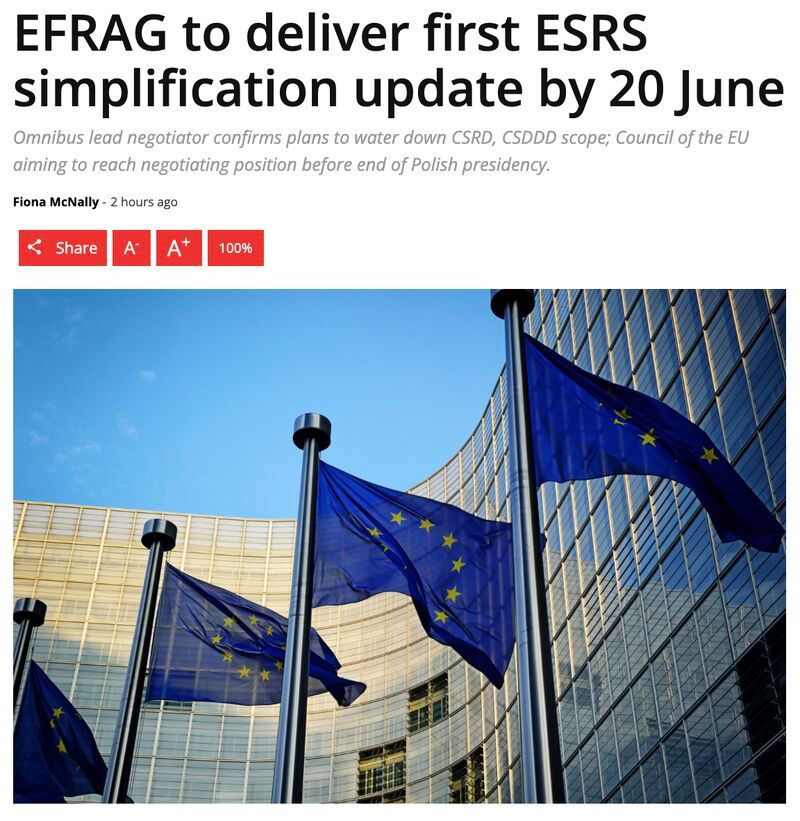

A spokesperson of Mr Warborn confirmed that the aim is "to substantially cut the number of companies required to comply with the #CSRD and Corporate Sustainability Due DiligenceDirective (#CSDDD)." In practice, this will likely mean a suggestion that both CSRD and CSDDD will only be relevant for companies with more than 3,000 employees. I am sure that such a suggestion will invite lots of debate as it would dramatically undercut the impact, reach and also usefulness of both Directives.
Things are moving fast and there will be lots of discussions towards the end of June. The Council will aim to finalise its negotiation position by the end of June as the Polish Presidency ends then.
===
RI Article: https://lnkd.in/dFmzPeSu
Council Meeting Agenda: https://lnkd.in/dNaUvaca
09-06-2025

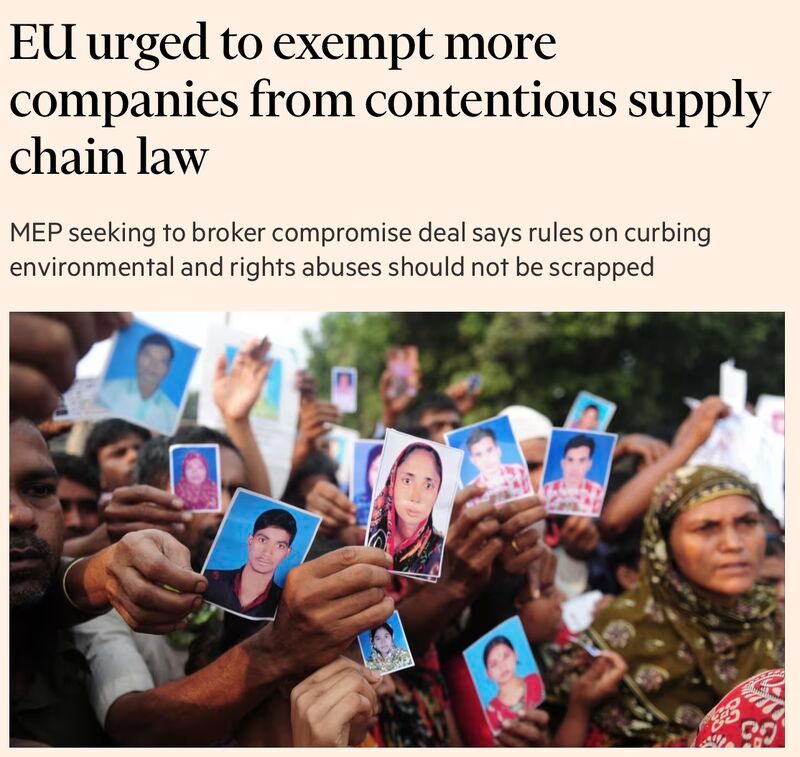

Overall, he sees the Commission's omnibus proposal as "good," but not "good enough". He will therefore also propose to completely delete climate transition plans. Further, he plans to suggest to raise the #CSRD threshold to 3,000 employees which would reduce the Directive to a fringe regulation without much impact.
While Warborn acknowledged that some companies have warned against revisiting the regulations, he also indicated: “the louder voices, the huge criticism has been around Europe being too bureaucratic, too much red tape that costs too much money."
This quote is worrying: it should not just be about how "loud" a voice is. If we always go by how loud voices are, politicians end up with an incomplete perspective that represents the opinions of a few powerful actors. I have spoken to many businesses who feel that their voice is not adequately represented in the omnibus debate...
===
Financial Times: https://lnkd.in/d-hJW2TR
07-06-2025

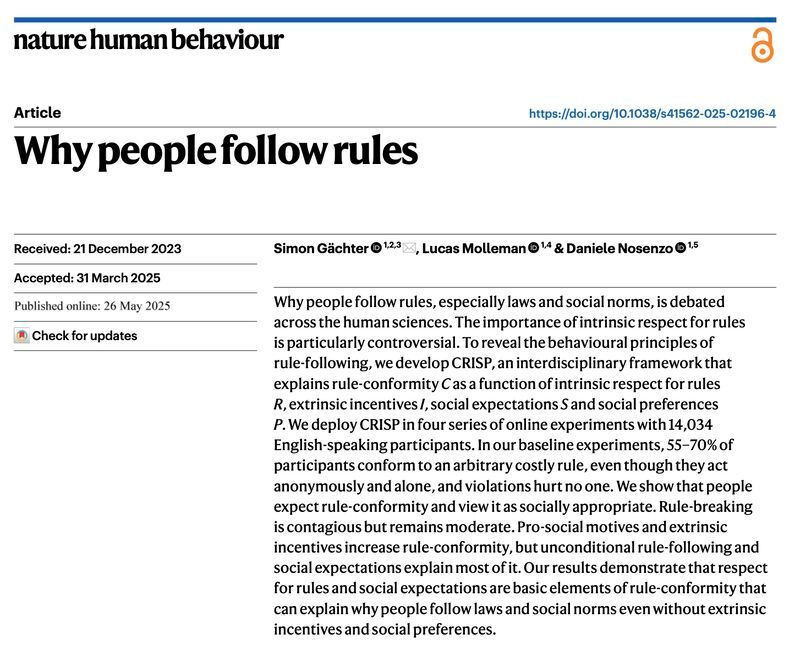

To me, this shows what is wrong with the #omnibus discussion. Yes, we can streamline regulations and simplify them, but at the heart of the debate rests a different challenge. We need to explain much better WHY laws like the #CSRD and #CSDDD matter to companies. Better communicating the purpose of these regulations can activate more intrinsic respect for them. I believe that this was never done appropriately (e.g., because good official guidance was lacking).
Right from the start, some firms perceived the EU regulations as something that is unduly forced upon them. "We must report for the sake of reporting" - this put extrinsic incentives at the forefront. This, in turn, created resistance and an attitude in which the value of rule-following could not gain much visibility in the debate.
The omnibus process should not just aim at regulatory amendments. It must also act as a platform to discuss how to shape the respect for those regulations that are being amended. In the end, more streamlined regulations and(!) a higher appreciation of their value can go a long way...
I discussed some related insights in a recent podcast with Julian Kölbel at the University of St. Gallen (https://lnkd.in/ezSaTna2).
===
Full Article (Open Access): https://lnkd.in/dMDjfNu8
04-06-2025

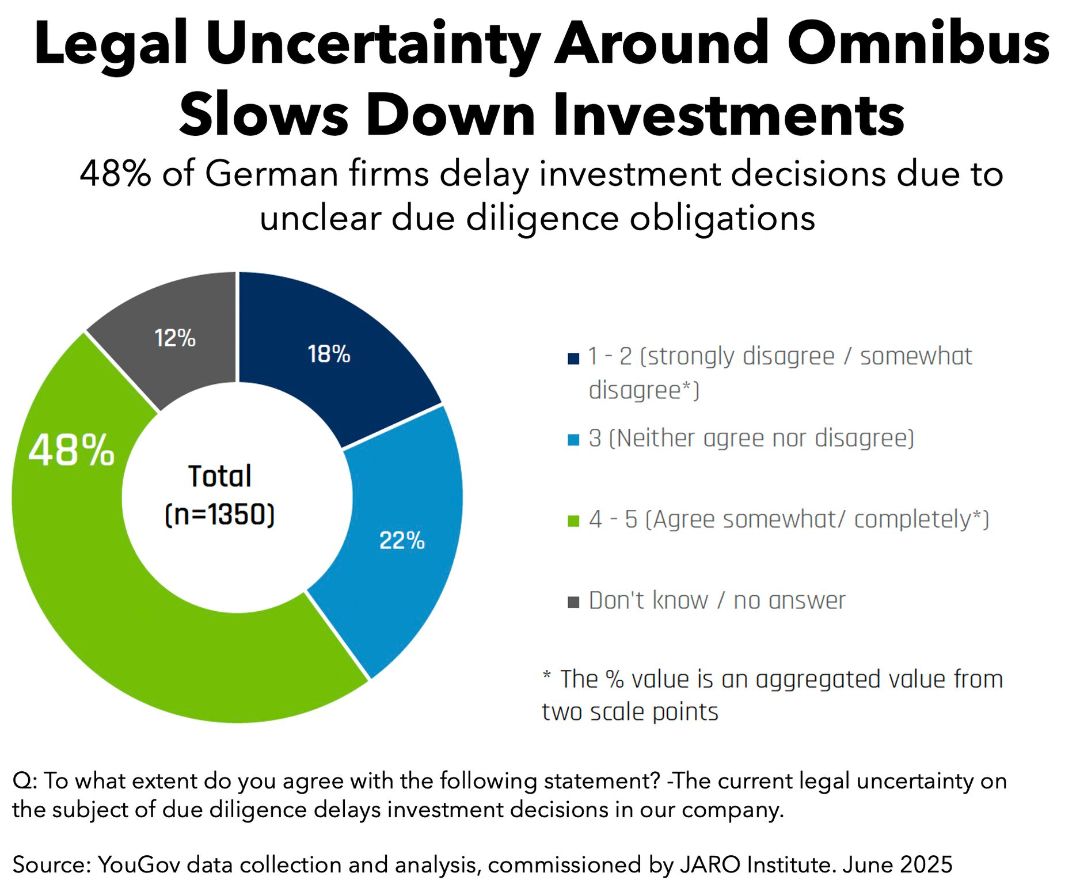

Further interesting insights:
1️⃣ Well-designed due diligence may support economic growth in the Eurozone, e.g. 57% of firms see due diligence benefiting suppliers from the European Economic Area as compliance with due diligence rules is easier to verify.
2️⃣ German businesses consider mandatory due diligence the least(!) of their concerns when it comes to Germany's sluggish economy. Biggest barriers were: high energy costs, slow planning processes and lagging digitalisation.
3️⃣ Some of the results resemble insights from the recent omnibus survey by WeAreEurope (n=1,062) where approx. 50% of firms were dissatisfied with the omnibus. Here, in this survey, around half of all firms delay investments and see planning risks (which points towards a certain level of dissatisfaction).
Let's hope that politicians will take note of these results...
===
Full Study: https://lnkd.in/dTK5gWhf
The representative survey was carried out by YouGov and commissioned by JARO Institute for Sustainability and Digitalization e.V.
03-06-2025

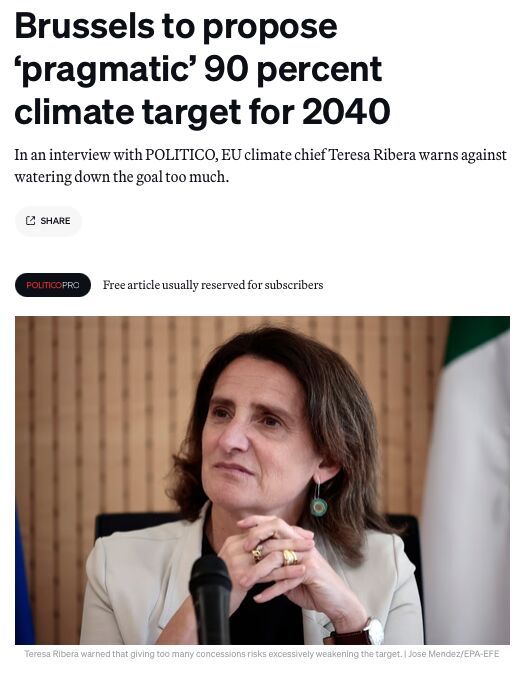

The key "pragmatic solution" will be that the use of international carbon credits to reach the 90% goal will be granted. This will allow EU governments to pay for emission-cutting projects in other countries instead of pushing for more ambitious reductions of their own domestic footprint.
The EU’s independent Scientific Advisory Board immediately criticised this: "The Advisory Board does not recommend using international carbon credits to replace domestic emission reductions when meeting the 2040 target.” The Board insists that their 2023 recommendation (which led to the 90% target) only referred to CO2 reductions within the EU.
So, "simplification" is now joined by "pragmatism" in EU sustainability policy making...
===
Report by Scientific Advisory Board: https://lnkd.in/dHRGZ44R
POLITICO: https://lnkd.in/dcgvkSNg
02-06-2025

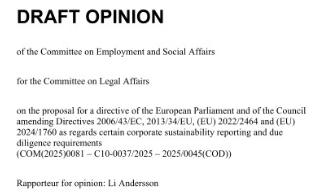

The document also asks the Commission to ensure consistency with international instruments such as the UNGPs and OECD Guidelines, and it suggests to delete several other proposed amendments (e.g., the tier-1 focus of #CSDDD).
This draft opinion shows that MEPs' perspectives on the omnibus really differ significantly. Although this Committee's final input can be expected to look different from this draft, and the Parliament's primary committee for the omnibus is Legal Affairs (JURI), it is still vital to show the wide spectrum of viewpoints. In the end, politics is a give-and-take business and it is about finding compromises and building bridges between positions...
30-05-2025

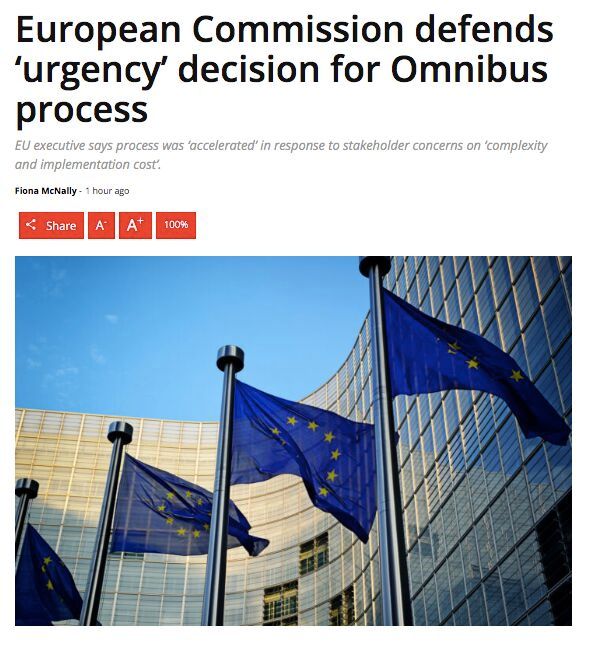

These seem like rather thin arguments to me. The need to provide legal clarity actually arises out of the omnibus itself (as there was legal clarity before). So, the argument is circular: we need legal clarity because the proposal causes legal uncertainty. Why didn't the Commission just "stop-the-clock" (under urgency procedure) to then work on a proper impact assessment for the full omnibus?
This would have provided legal certainty and it would have allowed to collect data on cost savings, foregone benefits, and potential impacts. It would have also allowed to specify where exactly "complexity" is an issue and which activities are driving costs up (and why they do this).
But, instead the process was rushed and we got, as Dutch MEP Lara Wolters rightly said, not a simplification of EU rules but rather a "simplification of a debate"...
===
Full Story: https://lnkd.in/duTHPHiD
28-05-2025

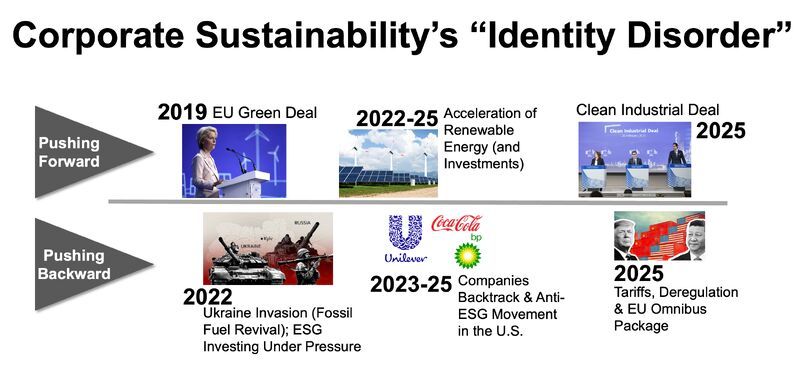

This situation makes decisions challenging and orientation difficult. I will debate this situation with Georg Kell - the founding Executive Director of the United Nations Global Compact during a webinar on 17 June (16:00-16:45, CEST; sign up below).
Georg has seen the many ups and downs of sustainability, so he is the perfect partner for this conversation. He has just published an article titled "Corporate is in Crisis: What Should Companies Do Now?" in the Harvard Business Review (with Martin Reeves and Helena Fox) which discusses some aspects of the topic that we will debate. You can access the article here: https://lnkd.in/dh9CXm5c
===
Webinar Sign Up: https://lnkd.in/d-jh9Ywu
26-05-2025

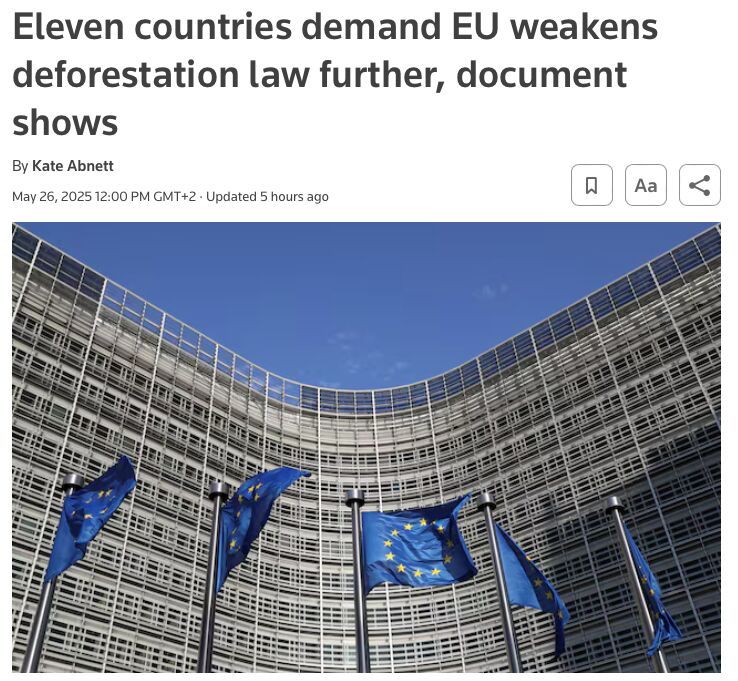

The 11 States propose in a paper that "the requirements imposed on farmers and foresters remain high, if not impossible to implement. They are disproportionate to the regulation's objective." Last week, the EU revealed that only four countries will be categorised as high risk under the EUDR, which means that key countries (like Brazil) will be sparred from strict checks. Now, this paper is an attempt to roll back the EUDR even further.
The paper is also signed by: Bulgaria, Croatia, the Czech Republic, Finland, Italy, Latvia, Portugal, Romania, and Slovenia. The EU agriculture ministers already discussed the paper yesterday during a meeting. It appeared on the agenda as "Simplification of the EU Deforestation Regulation" (https://lnkd.in/dzH-sh4c).
===
Reuters: https://lnkd.in/dD8ha7F9
Thanks to Christophe George for sharing the article.
26-05-2025

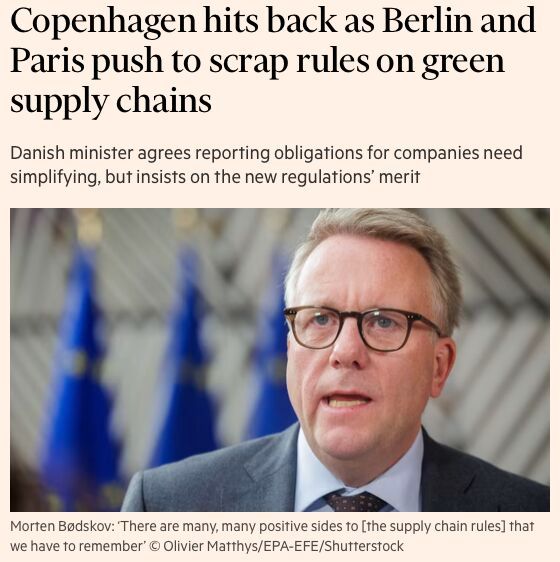

"Bødskov’s remarks reflect growing concern among some EU countries that the EU’s push for “better regulation” could be used as a vehicle to dismantle green legislation." [...] “Better regulation is not deregulation, it’s simplification.”
However, given the Minister's prior support of significant #CSRD scope reduction, it is still difficult to figure out where exactly he stands on the #omnibus package. But it is a good thing that he acknowledges that when looking at reporting “there are many, many positive sides to it that we have to remember”.
Although it is unlikely that the German-French proposal to scrap the CSDDD would end up in a legislative proposal (e.g., it violates the German coalition agreement), it still very good to see senior politicians in other European capitals to push back in such a public way...
===
FT Story: https://lnkd.in/dY2Hcnnw
26-05-2025

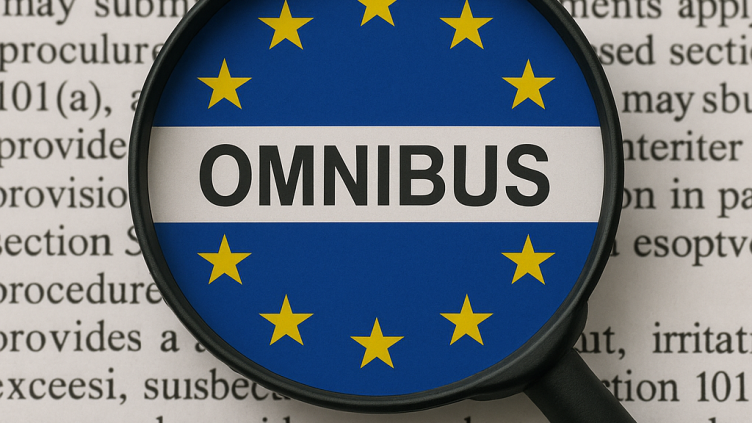

I show that good outcomes depend on solid process, but solid process was lacking when looking at the Commission's #omnibus proposal.
===
EU Ombudswoman on Omnibus (Case Description): https://lnkd.in/dGN8g3B4
26-05-2025

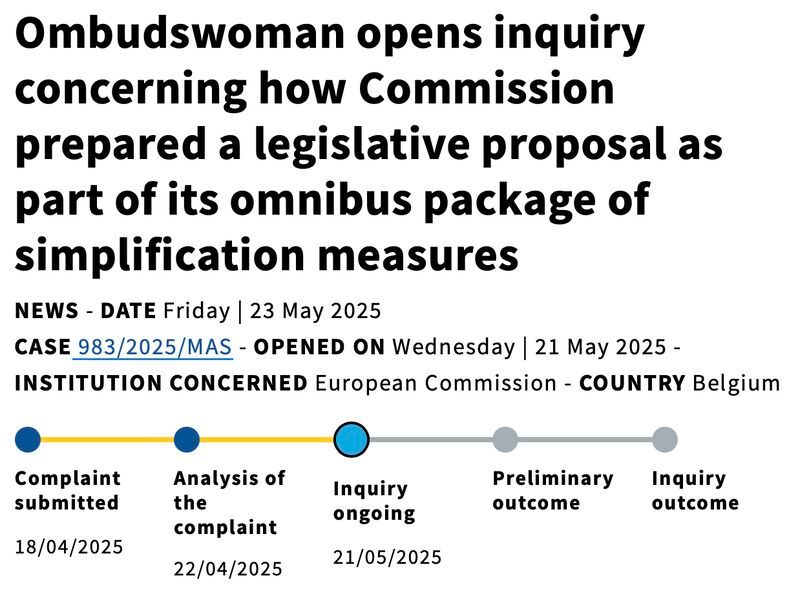

1️⃣ The official letter to President von der Leyen states: "The complainants argue that, in this case, the Commission departed from key procedural requirements foreseen in the Better Regulation Guidelines and failed to carry out a public consultation and an impact assessment without a proper justification. In their view, the Commission performed a rushed inter-service consultation that was not in line with its rules of procedure. [...] This is the third complaint that my Office has received in recent months concerning the Commission’s compliance with legal requirements, its Better Regulation Guidelines and further rules in preparing legislative proposals. [...] For these reasons, I have decided to open an inquiry into this complaint."
2️⃣ The Ombudswoman will now start an inquiry which in practice means that Commission officials will be interviewed and documents analysed before 18 June. While the Ombudswoman has no legal enforcement powers, she can issue recommendations that impact future lawmaking and can also increase scrutiny of the Commission by other EU institutions.
===
Official Statement: https://lnkd.in/dGN8g3B4
Thanks to Inma V. for sharing the info.
25-05-2025



I have been part of CBS for almost 13 years now. It has become my academic home; a home where we cherish diversity, inclusion and excellence in research and teaching. Academic independence and freedom are foundational values that underlie this purpose. It is very reassuring to see CBS standing up for its values with words... and actions.
===
If you want to have more information on who to contact regarding the new positions, have a look at this post by CBS (https://lnkd.in/d9c-SiPP).
24-05-2025



CSRD SCOPE: "In light of the above, the Presidency considers that the Commission’s proposal offers a balanced approach, preserving the policy objective of answering the market demand for sustainability information while significantly alleviating the reporting burden on undertakings." In the other words, the Council considers the 80% scope reduction to be workable.
CSDDD: The tier-1 focus of the #omnibus is considered "burdensome" and the "plausible information" clause to be too unclear. "On this basis, some delegations called for a return to focusing identification and assessment of actual and potential adverse impacts on areas where these impacts are most likely to occur (the so-called “risk-based approach”)."
TRANSITION PLANS: By and large, the #omnibus proposal seems to find support by Member States. "[T]he Presidency proposes to maintain the Commission’s proposal while introducing further textual alignments with the CSRD, in particular to clarify that the relevant plans under both Directives are the same ones and thus there is no doubling of obligations."
Bottom line: The Council by and large agrees with the Commission's proposal on #CSRD scope reduction, but it suggests changes related to #CSDDD. It also calls on Member States to further clarify their position on deleting the EU-wide civil liability, as positions seem to be unclear here.
23-05-2025



Such an argumentation seems like an excuse to raise the threshold further. It also puts the attention exclusively on "reaction" (How much can you influence others?), while the point of CSDDD is also proactive behaviour (Where are actual and potential risks?).
Apart from the fact that this statement directly contradicts what President Macron just said earlier this week, it shows that France aims to push for an alignment of scope criteria with its existing national law. I think this paper also contains a misreading of the Draghi report which calls for “uphold[ing] proportionality for SMEs and small mid-caps in EU law”. But a firm with 4,500 employees is neither an SME nor a small mid-cap.
Further Process: Coreper II (Council) will debate the #omnibus today, and I am sure that this proposal will be on the table. The agenda can be accessed here: https://lnkd.in/dUAT2YGH
22-05-2025



The document distinguishes between Wave 1 companies with up to 750 employees and Wave 1 companies with more employees. This will create rather unequal reporting in the coming years, and it will be even more difficult to compare and benchmark. The #omnibus is in full swing...
The new rules "shall apply from 1 January 2025 for financial years beginning on or after 1 January 2025."
22-05-2025

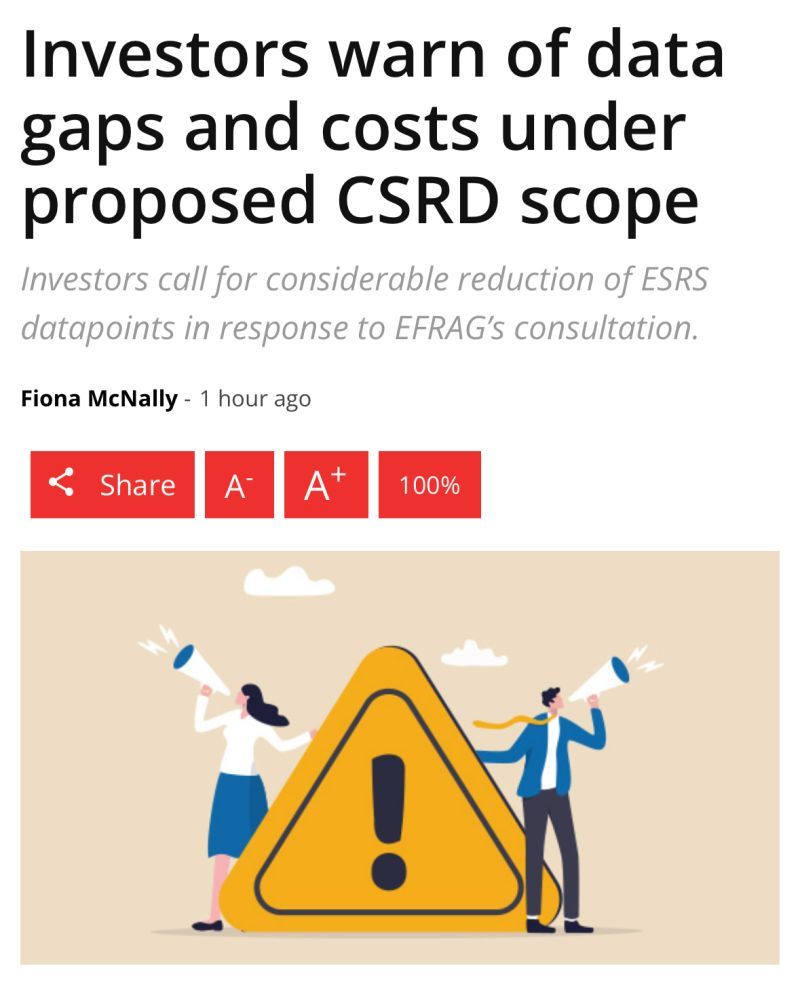

The PRI suggests to move to a 500 employee threshold, and this is also echoed by the European Central Bank (ECB). Eurosif recommends to create a new mid-sized category of 250-500 employees with "tailored, simplified" ESRS. Investors are supportive of the ESRS revision as long as it is "smart" in the sense that the reduction of indicators considers data needs and ensures interoperability with other global standards.
The Commission should have heard these investor voices before drafting the omnibus proposal. They clearly show that "simplification" comes at a cost for investors. And these costs are not considered in the Commission's own costs savings calculation...
===
Full article: https://lnkd.in/dsQSnk2h
20-05-2025

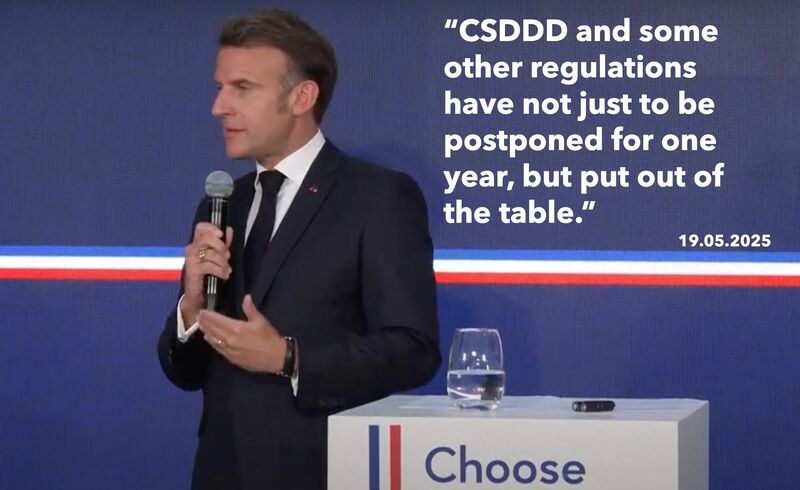

After German Chancellor Merz announced recently that he wants to "cancel this [due diligence] directive", now Macron moves and calls for scrapping the CSDDD entirely. This means the two biggest EU economies are in favour of completely abandoning the CSDDD.
Clearly, this is not simply possible, but France and Germany are heavyweights in the Council and determine directions. As Merz indicated during his press conference: “We will make suggestions on how we can go further.”
===
Watch the relevant excerpt of his speech: https://lnkd.in/dwZQKNwv
Thanks to Abrial Gilbert-d'Halluin for making me aware of this recent development.
20-05-2025

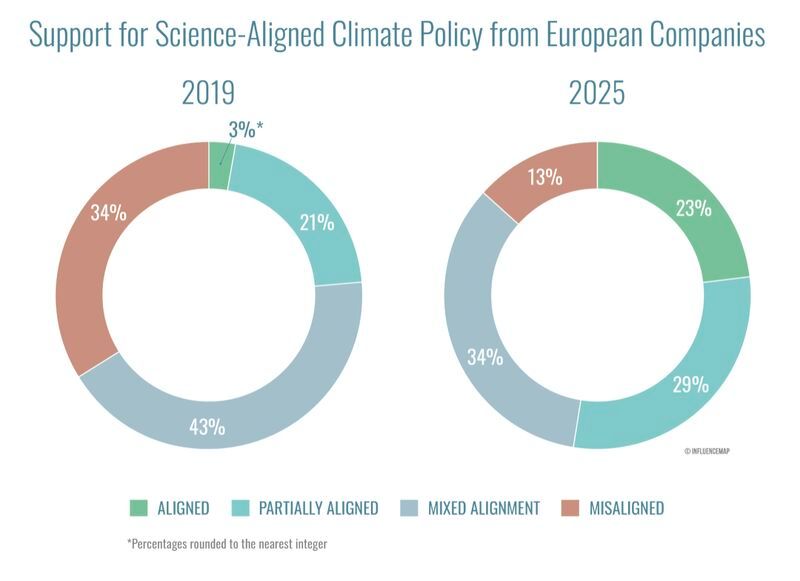

Possible explanations: (1) Associations follow the "lowest common denominator effect" by only advocating for those policies that are supported by the least ambitious of their members. (2) Ambitious companies are not vocal enough in the associations and allow less progressive firms to take over. (3) Companies take a more progressive stance publicly (to protect their reputation) but wilfully tolerate that associations push back.
In practice, it is probably a mix of these explanations. But this finding raises an essential question that policy makers should reflect on: Which voice are you really hearing?
===
Financial Times Coverage: https://lnkd.in/dqy4Qqtx
Report on Climate Advocacy: https://lnkd.in/dmt3fiA9
19-05-2025

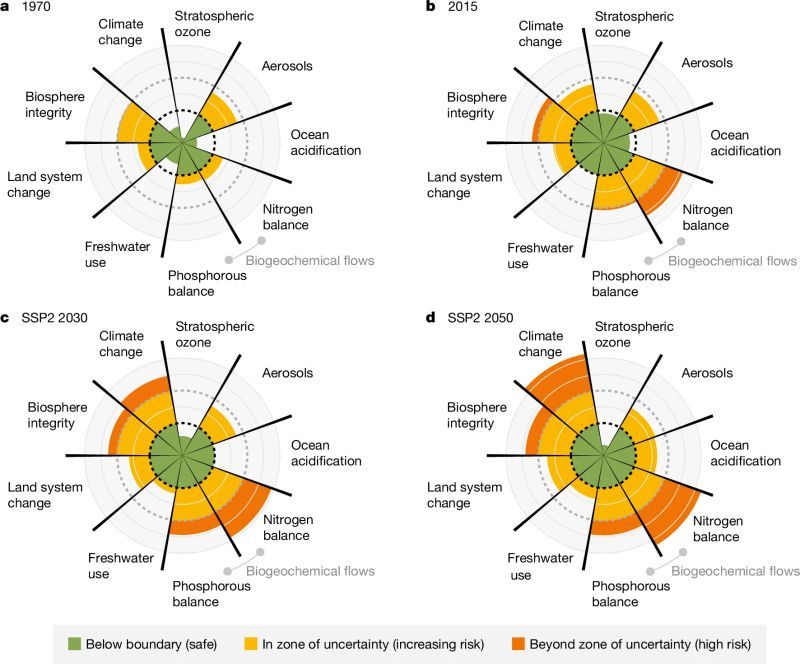

Key message: Climate policies by themselves are not enough. The authors (among them J. Rockström) call for an integrated policy approach. "This necessitates a wider whole-Earth system approach to policy-making, going beyond climate change and biodiversity, while accounting for synergies and trade-offs among the planetary boundaries."
The science is clear. We need a focus on integrated sustainability regulation and our food system should be a top priority! However, what get is a simplifying discussion of the "simplification" of sustainability regulations...
===
Full study (open access): https://lnkd.in/dc9Uk6du
15-05-2025

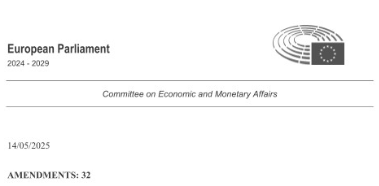

The proposal aligns quite a bit with yesterday' leaked information about what the omnibus rapporteur, Jörgen Warborn, wants to put into the first draft report. Overall, these suggestions show that it will be difficult to find a consensus. It is critical to not further politicise the omnibus package, but to look for solutions that really help businesses to do reporting and due diligence in efficient yet meaningful ways.
15-05-2025

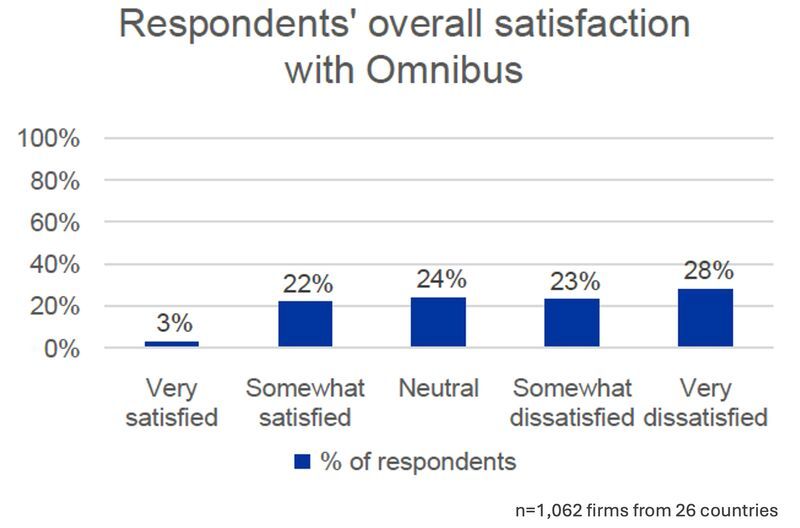

1️⃣ SATISFACTION: 54% of firms are somewhat satisfied with the CSRD (7% very satisfied), while 17% expressed dissatisfaction with the Directive. This contradicts the European Commission's narrative that companies favour fundamental changes to the Directive in the sense of moving 80% of firms out of scope. It rather points to the need to make targeted improvements in specific areas that really address the current weaknesses.
2️⃣ SCOPE: While the Commission is proposing to move medium-sized firms out of the scope of CSRD, 53% of companies with 500-1,000 employees themselves say they should stay in scope.
3️⃣ STRENGTHS & WEAKNESSES: Businesses saw (1) lack of guidance and (2) the time consuming and costly preparation of reports as weaknesses. Key perceived strengths included (1) improving transparency and comparability for investors and (2) strengthening ESG strategy and risk assessment.
❗ Companies want clarity, better guidance, and a proportionate EU reporting regulation. They do not want deregulation in the sense of removing a large chunk of businesses from requirements!
===
Full Survey: https://lnkd.in/dg99Vbun
The project was carried out by #WeAreEurope and HEC Paris in partnership with a number of other scholars from academic institutions throughout Europe (Full Disclosure: I was one of those scholars).
14-05-2025

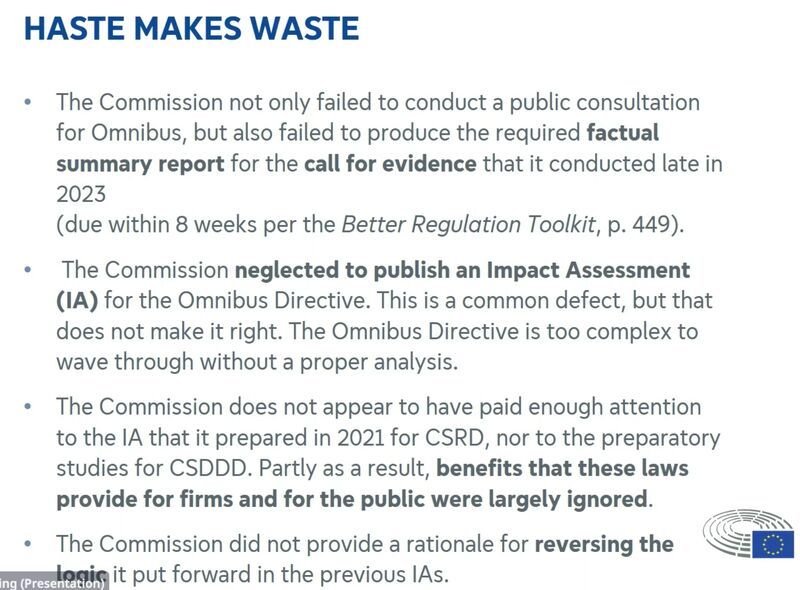

Hopefully, this analysis will prompt the Parliament to demand from the Commission a much better justification for the proposed measures. As the omnibus introduces significant changes to reporting and due diligence legislation, a proper analysis of costs, benefits and impacts is not just a nice-to-have...
The analysis clearly mentioned that there is need for simplification (too many overlaps; administrative burden that can be reduced). However: "In this case, the process deficiencies are so great that they make it difficult to properly evaluate the substance. Bad process leads to bad outcomes."
===
Watch the Presentation (16:33-16:44): https://lnkd.in/duGvNtE4
14-05-2025

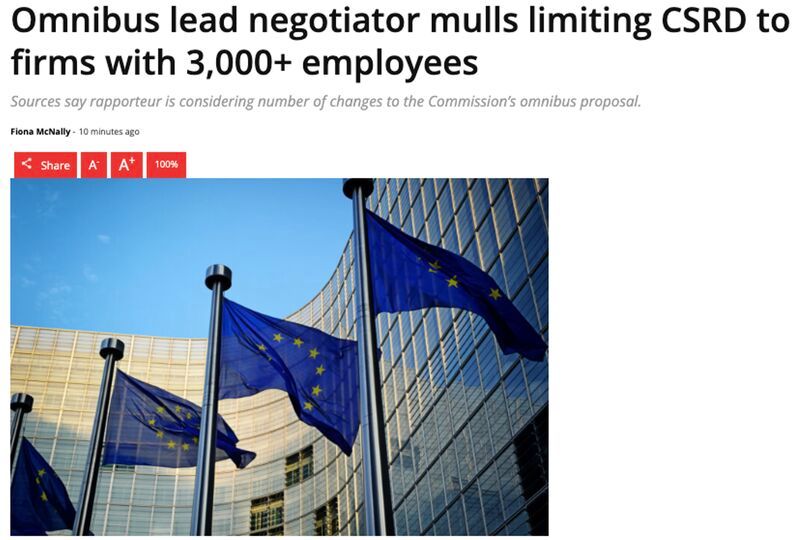

During the exchange of views in the Parliament's Legal Affairs Committee (JURI) in April, Warborn already indicated that he aims to push for changes that reach beyond the Commission's proposal. However, a threshold of 3,000 employees completely neglects the reality of investors' sustainability information needs (among other things). The suggestion also contradicts the position of the European Central Bank which proposed just last week that companies between 500-1,000 employees should report under simplified reporting rules.
At this stage it would be good to remember that the "Draghi Report" called for making regulations more proportionate to company size. Simplification should therefore not be an exercise in de-scoping as many companies as possible from a regulation.
===
Responsible Investor: https://lnkd.in/ddE3PMau
12-05-2025

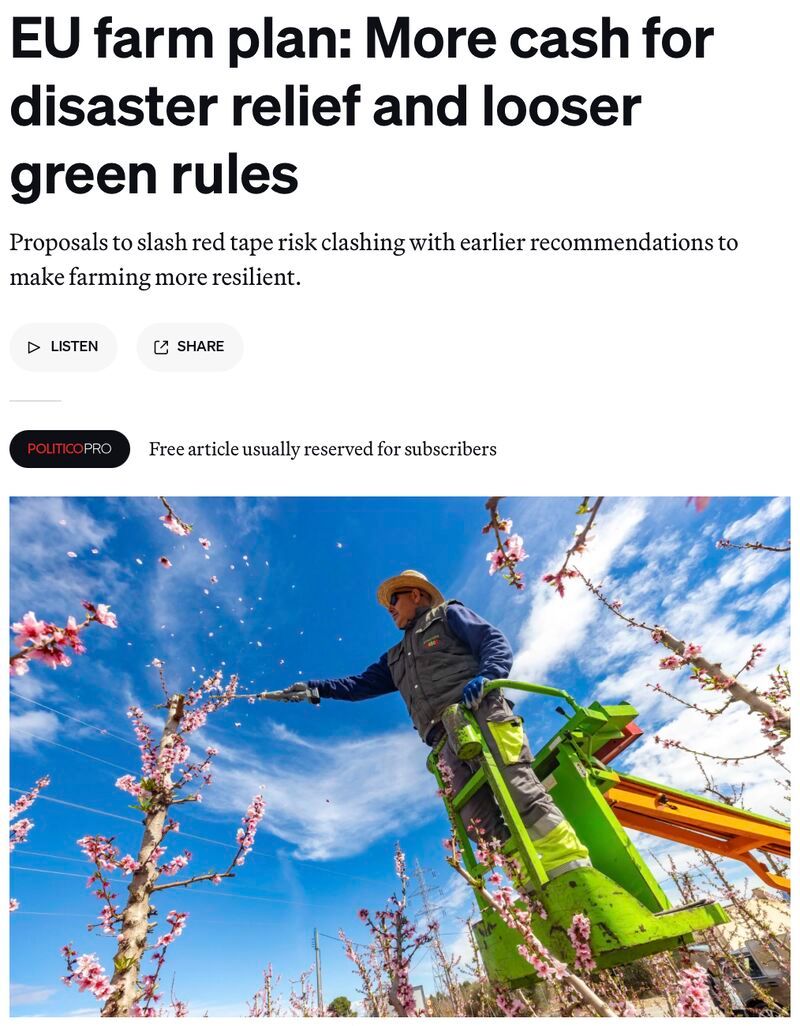

This third omnibus package will be presented on Wednesday (14 May). It will also contain two funds that will compensate farmers that are hit by negative climate impacts (e.g., flooding and droughts).
While the sustainability omnibus on #CSRD and #CSDDD was written rather quickly, this third omnibus package responds to feedback gathered through an 18-month "strategic dialogue". This still begs the question why the sustainability omnibus package neither had an impact assessment nor any substantive consultation (apart from two closed-door meetings). If we want to learn from policy implementation, we need (1) experiences first (difficult when e.g. the CSDDD is not implemented yet) and (2) hear from a variety of stakeholders.
===
POLITICO: https://lnkd.in/dBm8ypkV
11-05-2025

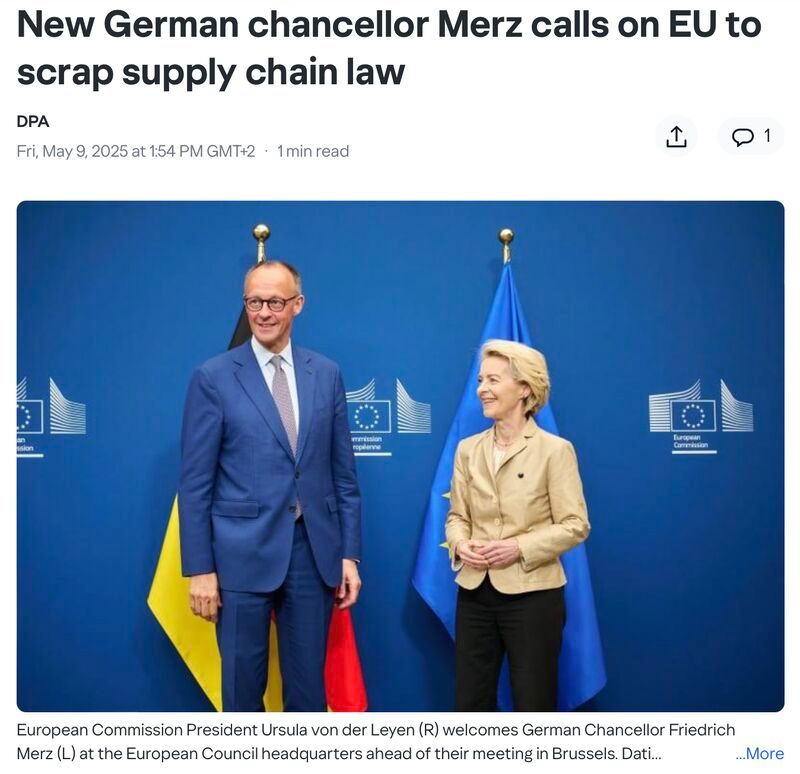

This position directly contradicts the German coalition agreement between Merz' CDU and the social democrats (SPD). This agreement clearly indicates that the existing German supply chain law will be replaced by a law “which implements the European Supply Chain Directive (CSDDD) without much bureaucracy and in an easy-to-enforce manner.” (p. 60) It took Merz just four days to break the very agreement he had negotiated...
At this stage, it is unclear which operational consequences Merz' "expectation" to cancel the CSDDD will have (and whether he actually had given this any thought at all). But it puts more pressure on the #omnibus process as the new German government will likely push for more significant changes. As Directives need to pass with a qualified majority in the Council, Germany's perspective carries a lot of weight due to its population (we had seen this during the "2024 CSDDD Saga").
===
German Handelsblatt: https://lnkd.in/dnEJExcM
Yahoo: https://lnkd.in/d7gXkcKp
10-05-2025

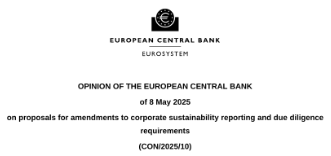

1️⃣ The ECB notes: "This amendment could significantly limit stakeholders’ access to important information and potentially lead to the following unwanted outcomes. [...] The proposed reduction in scope would reduce the overall availability of sustainability-related information, including information on GHG emissions produced by undertakings. [...] In view of these drawbacks, the ECB invites the Union legislators to give further consideration to the
scope of sustainability reporting, in order to ensure that it remains well calibrated."
2️⃣ They also make a constructive proposal (see pp. 8-9) to include medium-large undertakings (500-1000 employees), which would report under "simplified sustainability reporting standards that are proportionate".
3️⃣ The ECB also cautions that the #ESRS revision needs to keep in mind that ESRS E1 (climate) and E4 (biodiversity) contain important information to assess exposure to physical and transition risk.
Also a number of good comments on the value chain cap and the CSDDD transition plans. Overall, a good and balanced discussion of the omnibus, which will hopefully be heard by relevant policy makers.
===
Link to the Document: https://lnkd.in/dYNNXeN6
09-05-2025

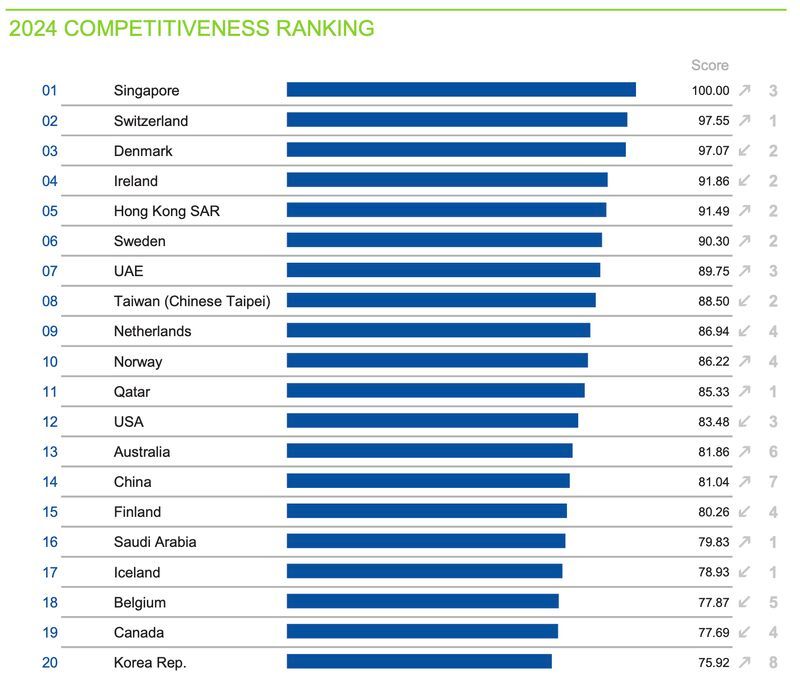

1️⃣ If you equate competitiveness with labor productivity, Europe does indeed not do well. Hence, the ranking remarks: "While productivity is an essential aspect of competitiveness, it’s just one piece of the puzzle. A genuinely competitive entity excels in productivity and areas like quality, innovation, talent, and a good regulatory environment. This is why focusing solely on productivity is not enough to ensure competitiveness."
2️⃣ The EU has six countries in the top 20, with the U.S. ranking 12 and China 14. Europe's big economies are in the midfield with Germany (24), France (31), and Italy (42). France and Italy are stable in their position, while Germany dropped (from 17 in 2020 to 24 in 2024).
Bottom Line: Competitiveness is a multidimensional construct and the omnibus discussion should reflect this and reach beyond a focus on compliance costs. We do not need competitiveness solely for the sake of economic performance. We need competitiveness to create prosperity for Europe's citizens, so we should look beyond one-dimensional perspectives...
===
Full Report: https://lnkd.in/dBc-XFnK
Note: Underlying the WCR is a comprehensive measurement framework that compiles data in four dimensions: (1) economic performance, (2) government efficiency, (3) business efficiency, and (4) infrastructure.
08-05-2025



1️⃣ TIER 1 FOCUS: The fact that beyond tier one assessments are only required when plausible information of adverse impacts arises "converts human rights due diligence into a mostly reactive process [...] and means companies are no longer in the driving seat when it comes to their due diligence process." This shifts the logic of due diligence from being proactive into being reactive. Hence: "companies would be addressing impacts beyond tier one only when it is too late – after impacts have already occurred."
2️⃣ SHIFTING RESPONSIBILITY: "The Omnibus Proposal effectively seeks to shift the burden of identifying and assessing certain impacts from businesses to other actors, such as civil society organizations and trade unions, who will need to present 'plausible information' of impacts beyond tier one to trigger action." This creates an inequitable situation as many human right abuses happen exactly where nobody is collecting such information (e.g., because governments restrict unions and civil society).
3️⃣ CIVIL LIABILITY: "Simply removing the liability regime in Article 29(1) [...]
exacerbate[s] the risk of legal fragmentation and confusion. This would heighten legal uncertainties and confusion for both companies and other interested parties in the medium to longer term, particularly if courts and regulators in different Member States started to take divergent approaches to specific companies, sectors, and problems."
===
Link to the Document: https://lnkd.in/dk9SZgbD
06-05-2025

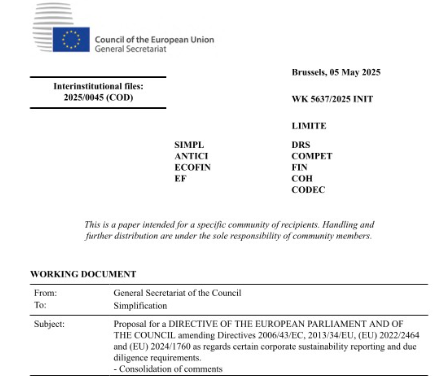

Member States by and large agree on the CSRD "value chain cap", but they are quite undecided when it comes to the suggested possibility to exempt CSRD wave 1 companies from reporting earlier (which the Council originally proposed).
Overall, my impression is that Member States are by and large aligned. There are, of course, differences when it comes to the details, but there do not seem to be States that completely reject the omnibus as such. Many States also push further suggesting more comprehensive changes...
===
Comments from BE, BG, CZ, DE, EE, ES, IT, LV, LU, NL, PT, SK, FI, and SE. Thanks to Richard Gardiner for sharing...
05-05-2025

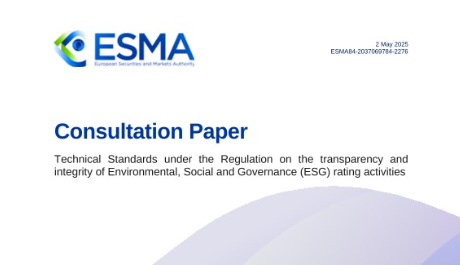

The standards ask raters to show "how major new information is taken into account in a rating change" and also to specify how significant alternations of methods affect ratings. Whenever raters publish aggregated ESG ratings, they must include a separate assessment of the E, S, and G dimension. The standards also fix the sequence and structure which need to be met when disclosures are made.
The draft standards implement the EU Ratings Regulation which was adopted last year. Feedback on the standards is open until 20 June 2025, and a final document will be published by October 2025.
===
Give Feedback: https://lnkd.in/dVz5w2nW
#esg, #sustainability
02-05-2025

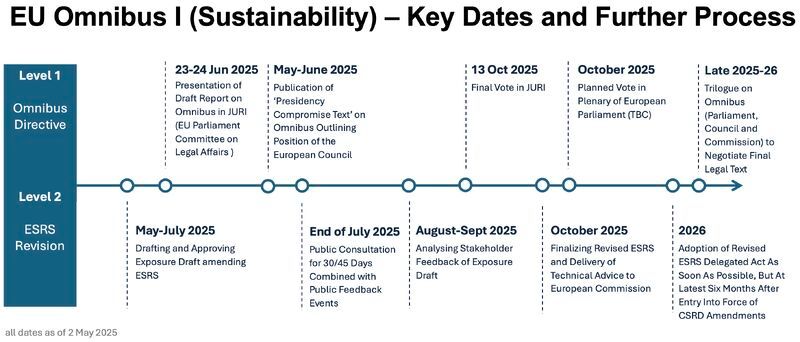

1️⃣ Milestones: (1) vote in the Parliament's Committee on Legal Affairs (JURI) on 13 October and the subsequent vote in the plenary of the European Parliament and (2) the publication of the revised ESRS Exposure Draft at the end of July by EFRAG. Both will give an indication of where the journey is going...
2️⃣ Final Outcome: It is reasonable to expect a trilogue in late 2025 and early 2026. The outcome of the trilogue then needs to be finally adopted by the Parliament and Council. So we are probably looking into Q2 2026 for a final legal text - of course, depending on how things go. Many of us still remember the lengthy "Post-Trilogue #CSDDD Saga" last year...
01-05-2025

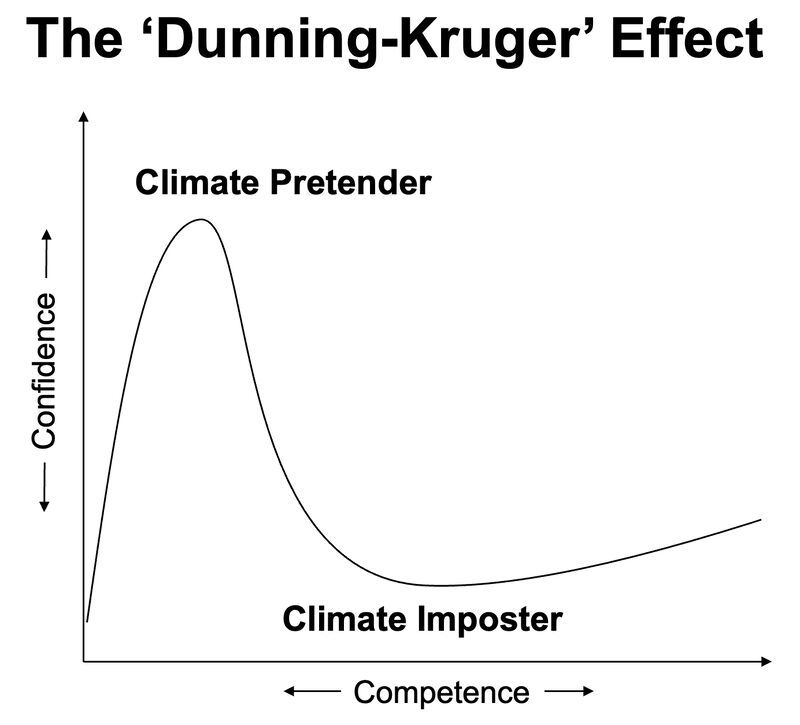

Sustainability is an area where gaps between self-perceived knowledge and actual knowledge can quickly emerge, e.g. because sustainability knowledge is moving fast and assessing such knowledge is not always easy. This shows the relevance of the so-called 'Dunning-Kruger Effect' - those with low levels of competencies in an area tend to overestimate their competencies in this area (see illustrative graph).
This effect shows that, often, we do not know that we do not know. This can impede progress in important contexts (e.g., boards of directors discussing sustainability). So, we need more emphasis on how to identify and develop sustainability competencies, including knowledge but also the relevant skills and mindset that matter for the transition...
===
On 14 May at 9:00, I will be discussing how to identify and develop competencies for sustainable leadership in a 45-minute 'Morning Brief' with Hans Reus (Russell Reynolds Associates). Join us: https://lnkd.in/dbWsxqne
Study on Climate Knowledge: https://lnkd.in/dz9h9H2k
30-04-2025

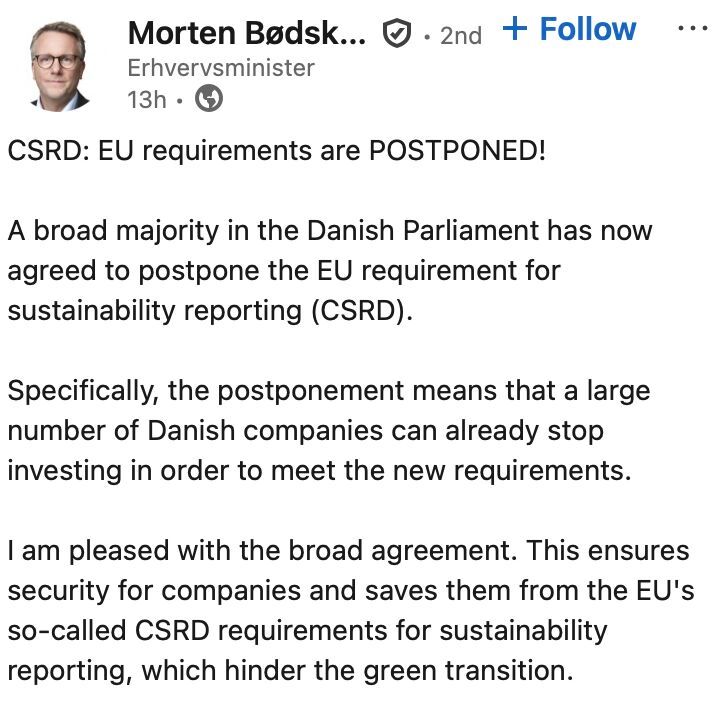

But, sustainability reporting fulfils a number of important functions that support the green transition, such as: (1) It provides transparency and, if well done, allows for comparability of performance which is vital for investors, (2) It provides essential data for managing risks and allocating capital for the green transition, (3) It is vital to check on company progress against green targets (without measurement you cannot see whether you actually make progress year-on-year), (4) It is vital for many business relations as buyers demand such information.
Before companies stop investing, as indicated by the Minister, they should reflect on what role such data plays in their unique context. In the end, this is not about compliance, this is about good management...
===
Link to Full Original Post (image below shows only part of the original post and was translated by LinkedIn): https://lnkd.in/dpMBCp34
28-04-2025

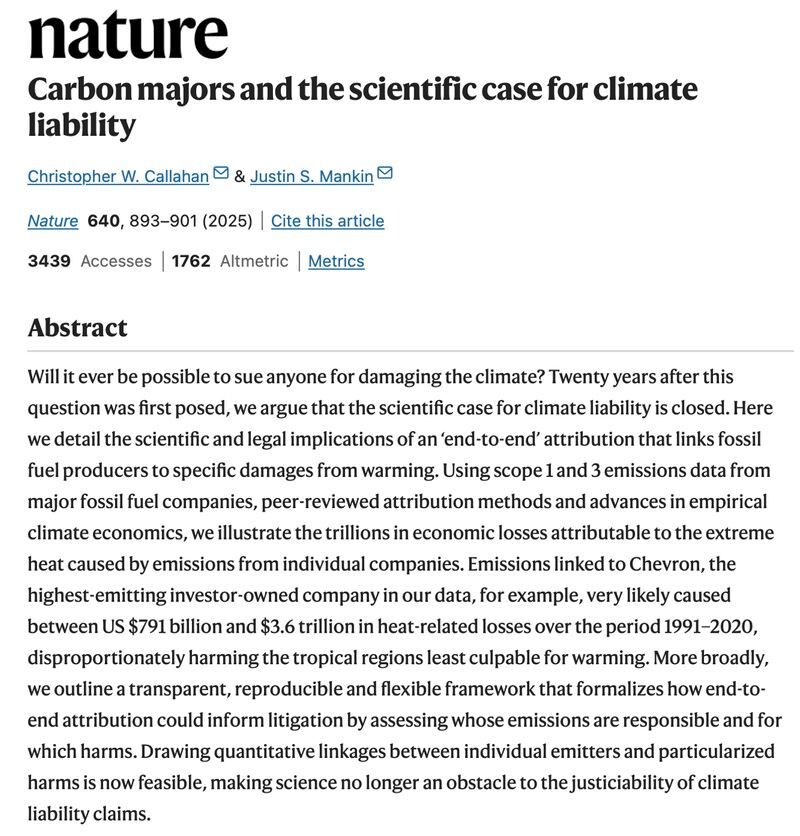

Such research is an important contribution to future climate liability cases. For accountability there is a need to create a link between corporate emissions and climate damages. Such research shows that this is possible. "Chevron, for example, has raised the Earth's temperature by .045 degrees Fahrenheit (.025 degrees Celsius)."
===
Nature Article: https://lnkd.in/dntXbEEA
Phys.org (Summary): https://lnkd.in/dv3FEXMf
#climatechange, #sustainability
25-04-2025

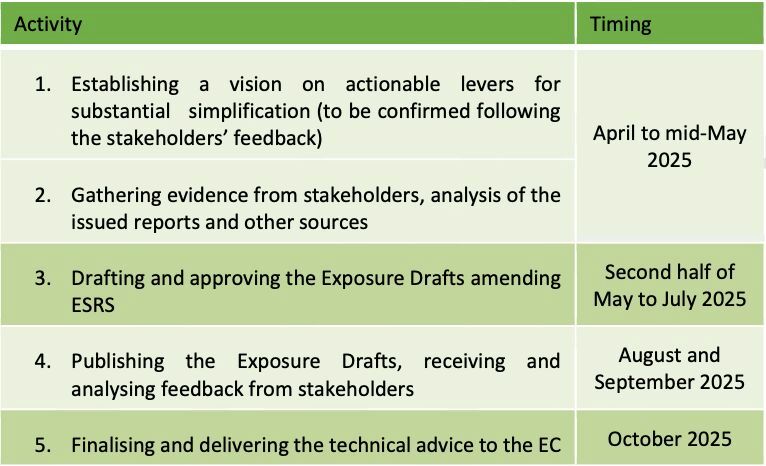

The overall timeline is, of course, very tight. Due to the overall rushed process, public consultation will take place for 30/45 days "starting at the very end of July". This will be combined with some public feedback events at the beginning of September.
===
Access the Full Work Plan and Timeline: https://lnkd.in/dckh2WjR
#CSRD, #omnibus, #esg
25-04-2025

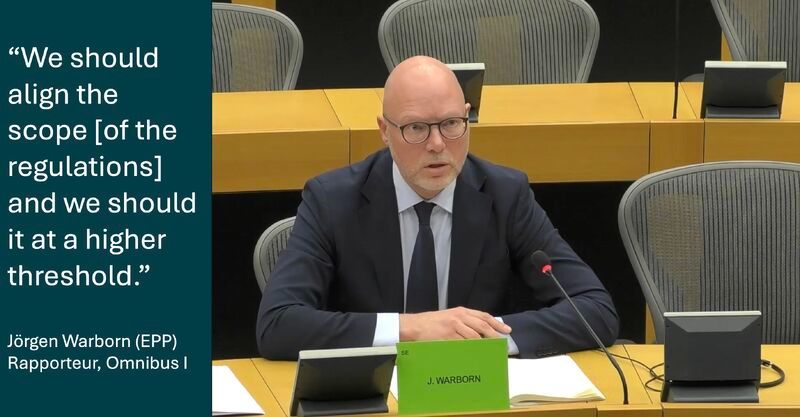

The input by S&D, the Greens, and Renew showed the need for a reasonable compromise. But the speakers also exposed contradictions. For instance, Pascal Canfin (Renew) reminded everyone that scrapping the EU-wide civil liability regime under CSDDD leads to the exact opposite of simplification, as firms will have to cope with 27 different national regimes. S&D stated that focusing on just tier-1 will result in "pointless form filling and box ticking, especially for SMEs."
Political groups on the right (Patriots and ECR) indicated that they prefer to completely scrap the CSRD, CSDDD, and Taxonomy. The ECR believes that a voluntary regime on reporting and due diligence would be sufficient. These remarks put pressure on the EPP, because they show that parties on the right cannot be a partner. It is therefore vital that political groups around the centre fight for a reasonable compromise that preserves the basic rationale of the regulations...
===
Watch the Recorded Debate: https://lnkd.in/dQzAskyR
24-04-2025

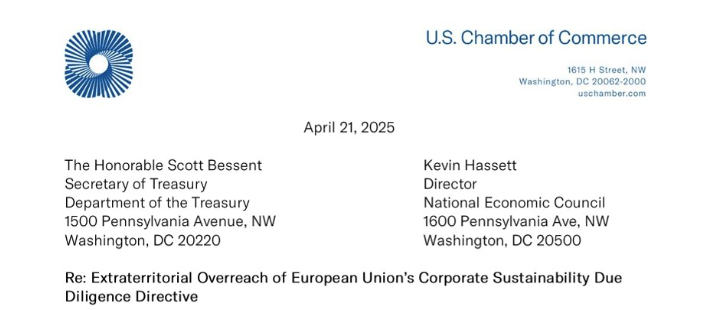

As the Trump administration has already made clear that it sees the CSDDD as a non-tariff trade barrier (https://lnkd.in/dvUtWv-J), it seems likely that U.S. policy makers will bring this up during the pending tariff negotiations. However, exempting U.S. businesses is highly problematic as it would not provide a level playing field (to have such a level playing field is the very reason why the CSDDD has extraterritorial reach).
U.S. Senators are also working hard to undermine the reach of the CSDDD. They have introduced legislation which would prevent U.S. companies from complying with the CSDDD (https://lnkd.in/dVpTkjsr). It is vital that Europe stays its course...
22-04-2025

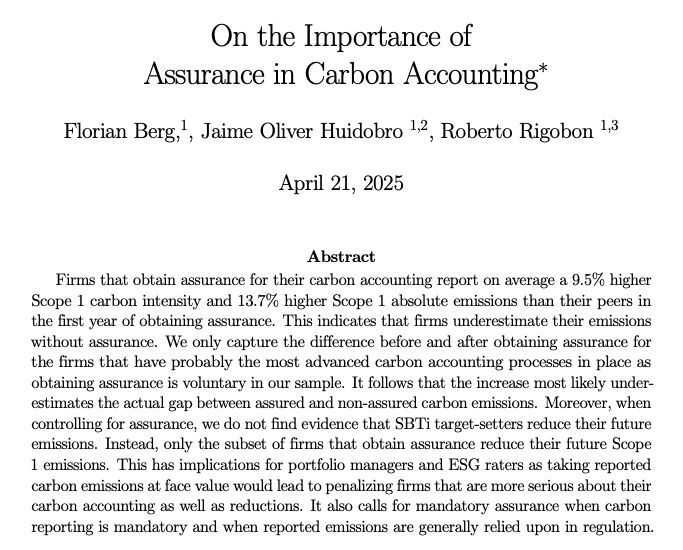

With the #omnibus moving 80% of European companies away from limited assurance, this throws up serious questions of data reliability and comparability. The study therefore concludes: "In the ongoing discussion triggered by the omnibus proposal, about which firms fall under #CSRD, policymakers must know that without assurance, firms’ reported CO2 emissions cannot be accurately compared in the cross-section."
===
Access the paper: https://lnkd.in/drkgiwDj
18-04-2025

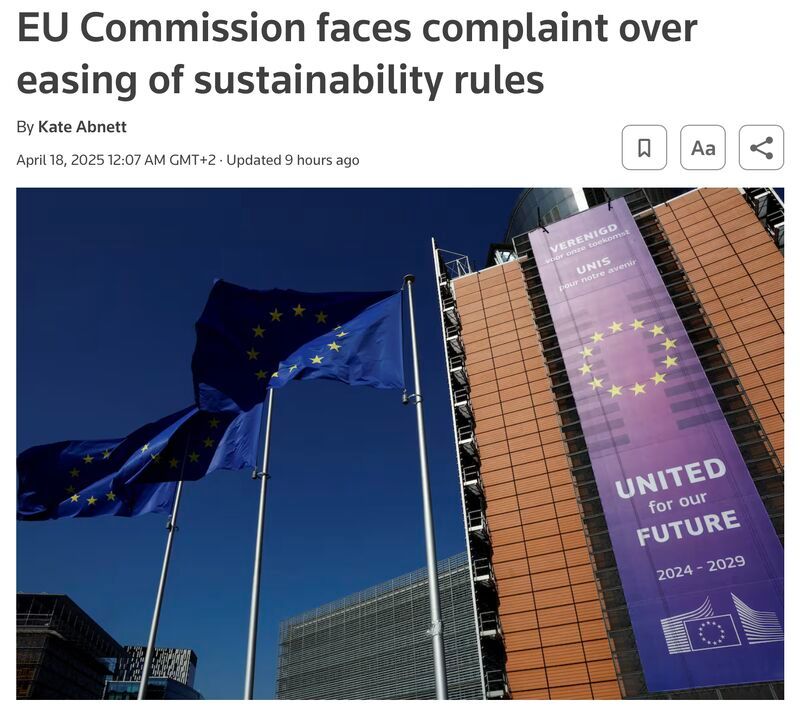

"This so-called simplification does nothing to enhance competitiveness; the commission is ignoring both evidence and science. Strong sustainability laws like the #CSDDD and #CSRD are key to the EU’s competitive advantage in a global market where consumers and investors increasingly demand responsible corporate action."
The Ombudsman Office, the EU's independent watchdog, must now decide whether to open a formal investigation. The Ombudsman has no legal enforcement powers, but can issue recommendations that impact future lawmaking. It can also increase scrutiny of the Commission by other EU institutions.
===
Reuters Story: https://lnkd.in/dZ-vHeHv
Sustainable Views Story: https://lnkd.in/d_6b7_uY
17-04-2025

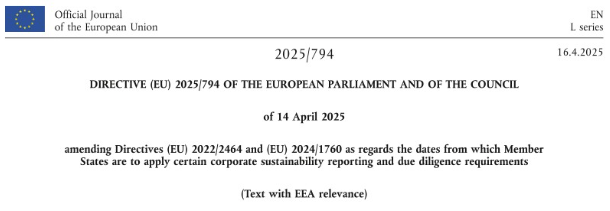

The EU really moved very quick on this one. I wish they would always show such ambition for speedy legislative action when it comes to other sustainability-related regulations. The European Council finally adopted the stop-the-clock mechanism earlier this week paving the way for the publication of the final legal text.
Upside: This gives sufficient time for transposition into national law and it also provides certainty to businesses about reporting timelines. Downside: We delay, and delay, and delay...
===
Thanks to Nora Laurinaityte, and Alise Artamonova for pointing this out.
17-04-2025



The very swift agreement between Council and Parliament will now give sufficient time to agree on the "full" omnibus proposal and it provides legal certainty for businesses. The "stop-the-clock" mechanism will delay #CSRD reporting for wave 2 companies by two years and postpone #CSDDD implementation by one year.
===
EU Press Release: https://lnkd.in/dNDteZFr
#sustainability, #esg
11-04-2025

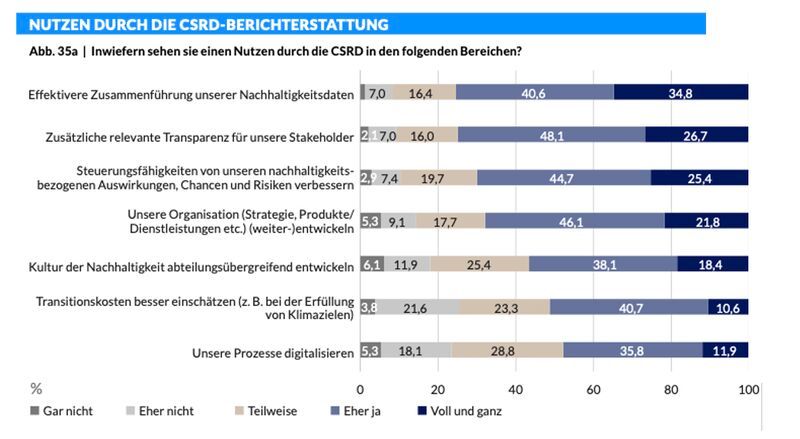

Interestingly, SMEs view the cost-benefit ratio more critically with 77% of companies judging costs to be higher than the benefits. This is why we need more proportionate reporting rules, as suggested by the Draghi report. What we do not need is to exclude 80% of companies from reporting, as suggested by the current #omnibus proposal. Such blanket exclusions of companies and the believe that voluntary reporting will fill the gaps are based on misleading assumptions.
===
Download the Sustainability Transformation Monitor 2025: https://lnkd.in/d2Hty8Nw
This sample dies not include financial market participants, and it is focused on German companies. #sustainability, #esg
10-04-2025

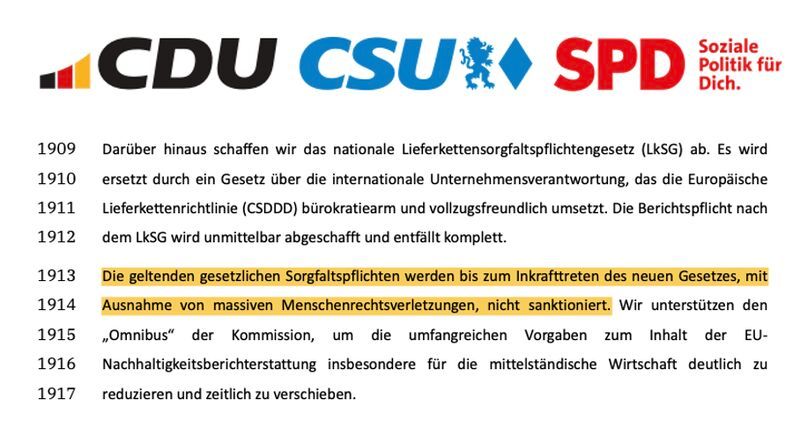

"Until the new law comes into force, the existing statutory due diligence obligations will not be sanctioned, with the exception of serious human rights violations. We support the Commission's "Omnibus" approach to significantly reduce and postpone the extensive requirements regarding the content of EU sustainability reporting, particularly for small and medium-sized enterprises."
It therefore seems unlikely that Germany will challenge the changes proposed by the omnibus in the Council. This was expected, but now we have it in writing...
===
Full Agreement (in German): https://lnkd.in/dywpAkfE
#sustainability, #esg
08-04-2025

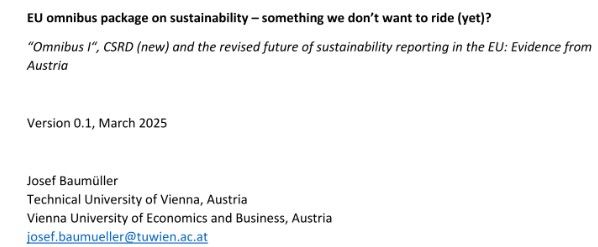

"Setting a threshold of 1,000 employees, e.g., excludes most companies from the real estate sector from reporting requirements; the same holds true e.g. for the sectors transportation or steel. At the same time, social service providers still remain to a very high extend in the scope of regulation."
The study is based on an analysis of 32,000 firms in Austria. It exposes some of the limitations of the omnibus proposal which suggests a blanket exclusion of 80% of companies. Defining different scope criteria for "high risk" sectors may be a way forward, although political support for such a solution seems unlikely (see the #CSDDD process last year where a similar proposal was on the table).
===
Note: This is a working paper which is not yet peer reviewed.
06-04-2025

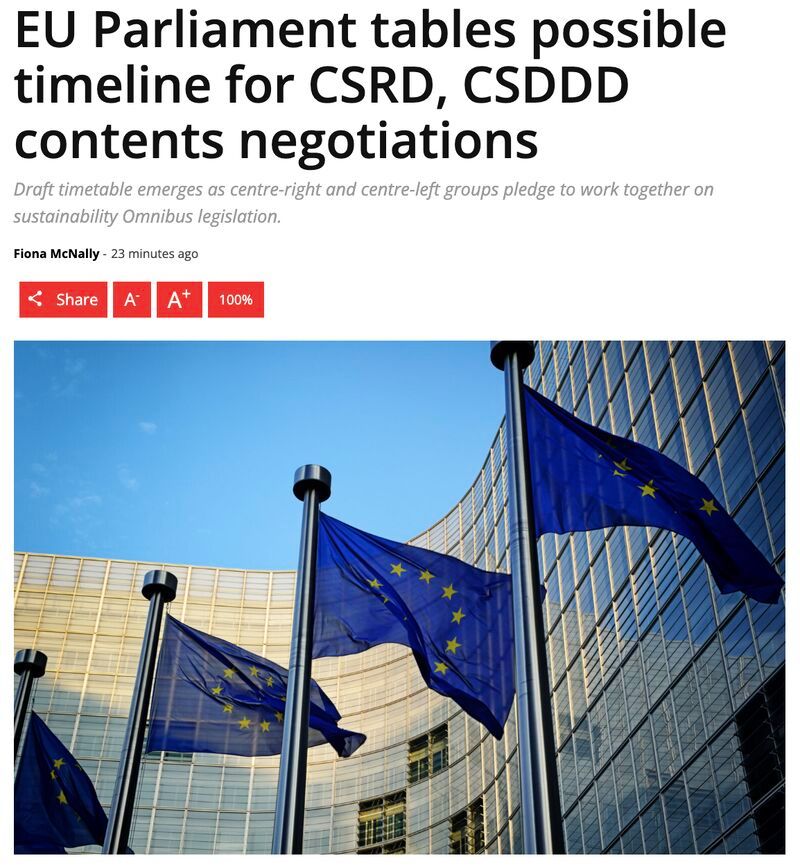

The good news is that the four political groups in the centre (EPP, S&D, Greens, Renew) are willing to work together on this. "The joint support from the four groups shows that the Parliament is happy to tackle this from the centre [...] which sends a 'strong signal' that these groups are able to work together and make compromises." This may imply that some of the changes proposed by the omnibus could be softened as compromises need to be found.
The Council is also progressing on the omnibus, and work on a compromise text will start soon. Once the Council reaches an agreement, it will vote on a negotiating mandate (to be used for negotiations with the co-legislators). The exact timeline is unclear, but there is a chance that this work may fall into the Danish presidency (starting in July 2025).
===
RI Story: https://lnkd.in/dE4nTHDy
#csrd, #csddd, #eugreendeal
03-04-2025

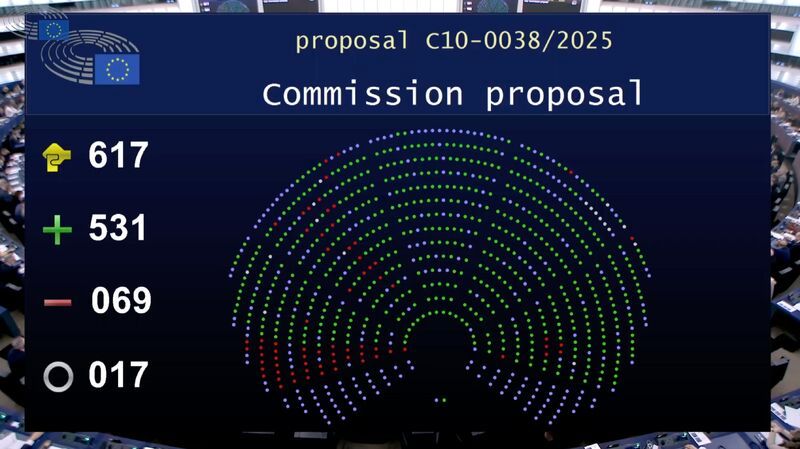

Today's vote is likely to provide certainty for businesses and investors as to who will have to report in the coming years. The comfortable majority is also based on votes that also come from the centre left, which shows that the broad alliance in the centre seems to agree on at least some aspects.
03-04-2025

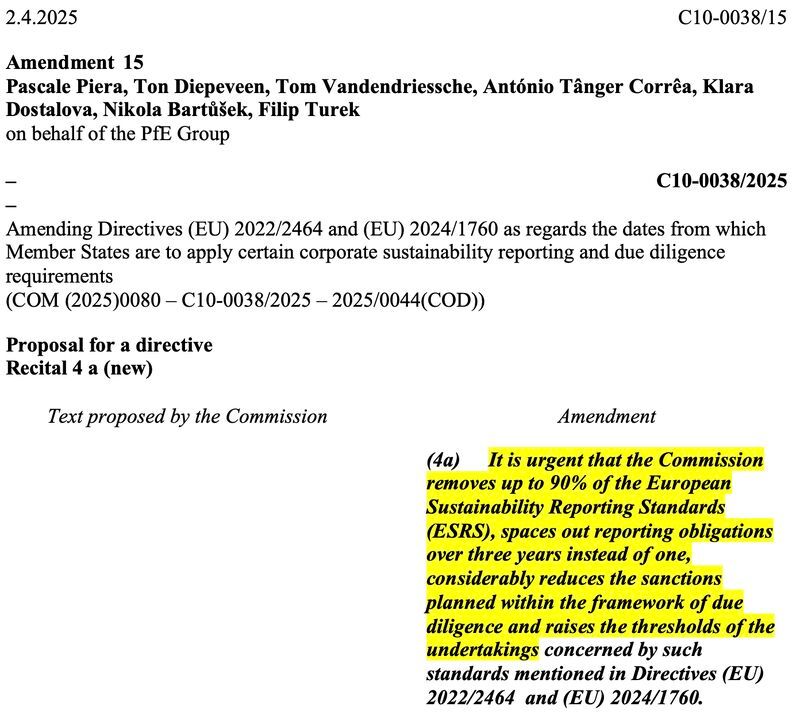

Of course, this amendment will not pass, but it vividly shows that the EPP is "walking on thin ice" when they rely on votes from these groups to pass sustainability-related legislation. It is vital for the success and legitimacy of the EU Green Deal that parties in the centre of the Parliament find a consensus.
===
View All Amendments: https://lnkd.in/dGCQsFXM
03-04-2025

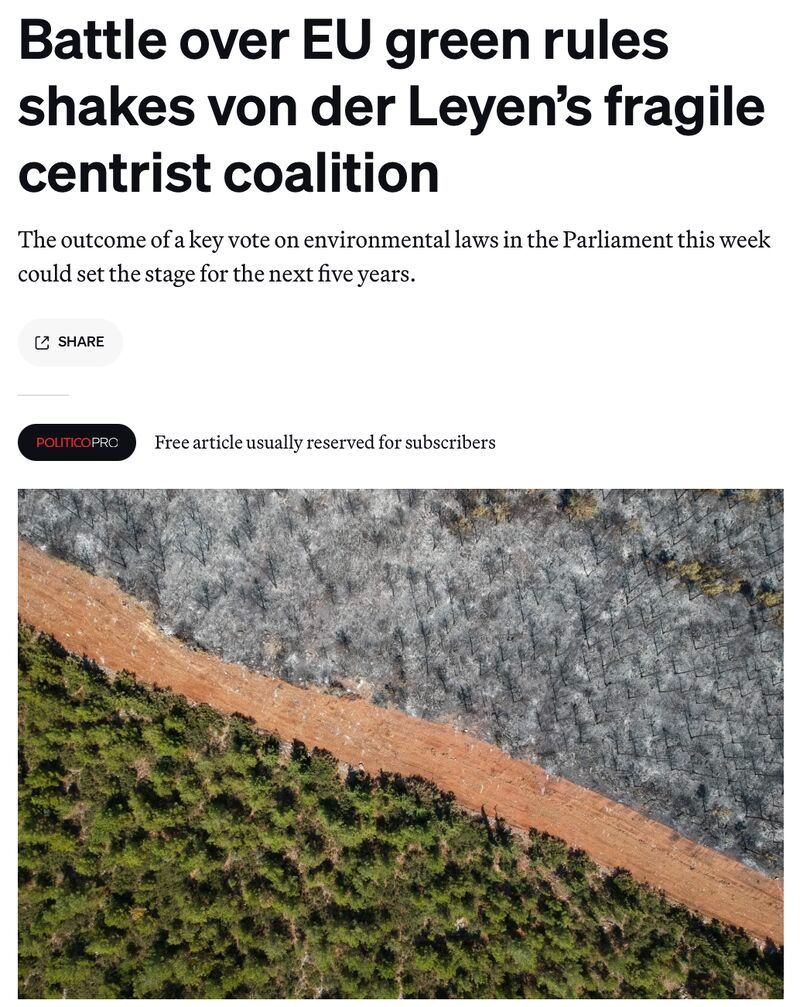

"The S&D refused to back the EPP’s call to accelerate the legislative process unless the conservatives committed in writing not to support major cuts to the rules. That prompted the EPP to demand that the right-wing European Conservatives & Reformists (ECR) be invited to vote alongside the coalition [...]." The EPP "did not want to have any limitation on content", according to POLITICO sources.
If the EPP presses ahead with the support of far right parties today, it will be difficult to find common ground later in the process when the full details of the omnibus are negotiated. With a set up where far right parties are on the table, we may even see further changes to the #CSRD and #CSDDD.
===
POLITICO: https://lnkd.in/dyvD_MB9 (thanks to Inma V. for sharing) #sustainability, #esg
01-04-2025

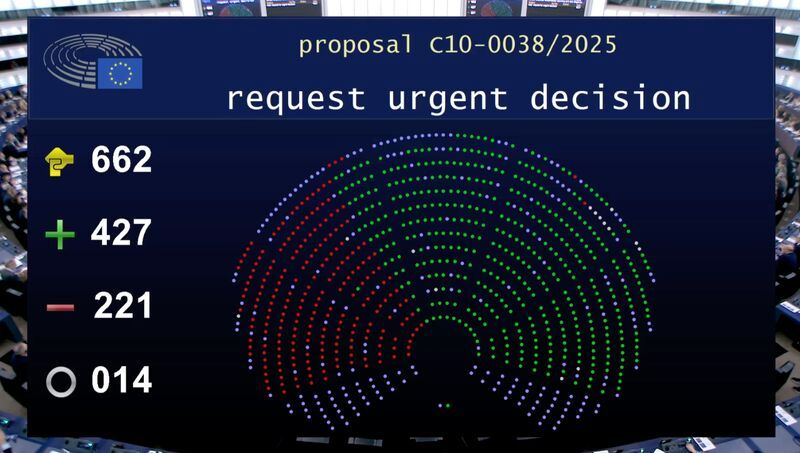

The proposal was adopted by a rather comfortable majority (427), but the picture also shows that political groups remains split on the omnibus bill. If the stop-the-clock proposal is approved on 3 April, the co-legislators can start their job to negotiate a final legal text.
#CSDDD, #CSRD, #eugreendeal
01-04-2025

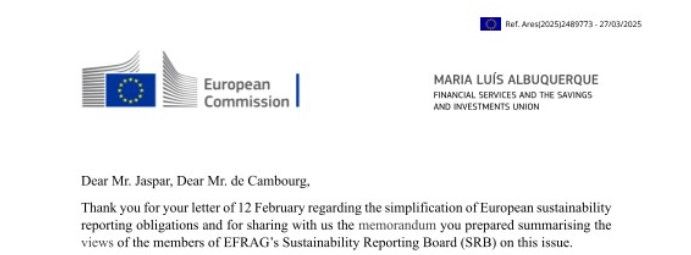

1️⃣ "Substantially reduce the number of mandatory ESRS datapoints by (i) removing those deemed least important for general purpose sustainability reporting, (ii) prioritising quantitative datapoints over narrative text and (iii) further distinguishing between mandatory and voluntary datapoints."
2️⃣ Clarify provisions in the standards that are unclear and provide "clearer instructions on how to apply the materiality principle" (to avoid over-reporting).
3️⃣ Improve consistency with other EU legislation and ensure a "high degree of interoperability with other global sustainability reporting standards."
The revised ESRS will be implemented via a delegated act no later than six months after the full #omnibus revisions enter into force. The letter states that the Commission expects that firms which report for financial year (FY) 2027 can use the revised standards, with a potential option that companies may already apply them for FY 2026 reporting if they wish so.
31-03-2025

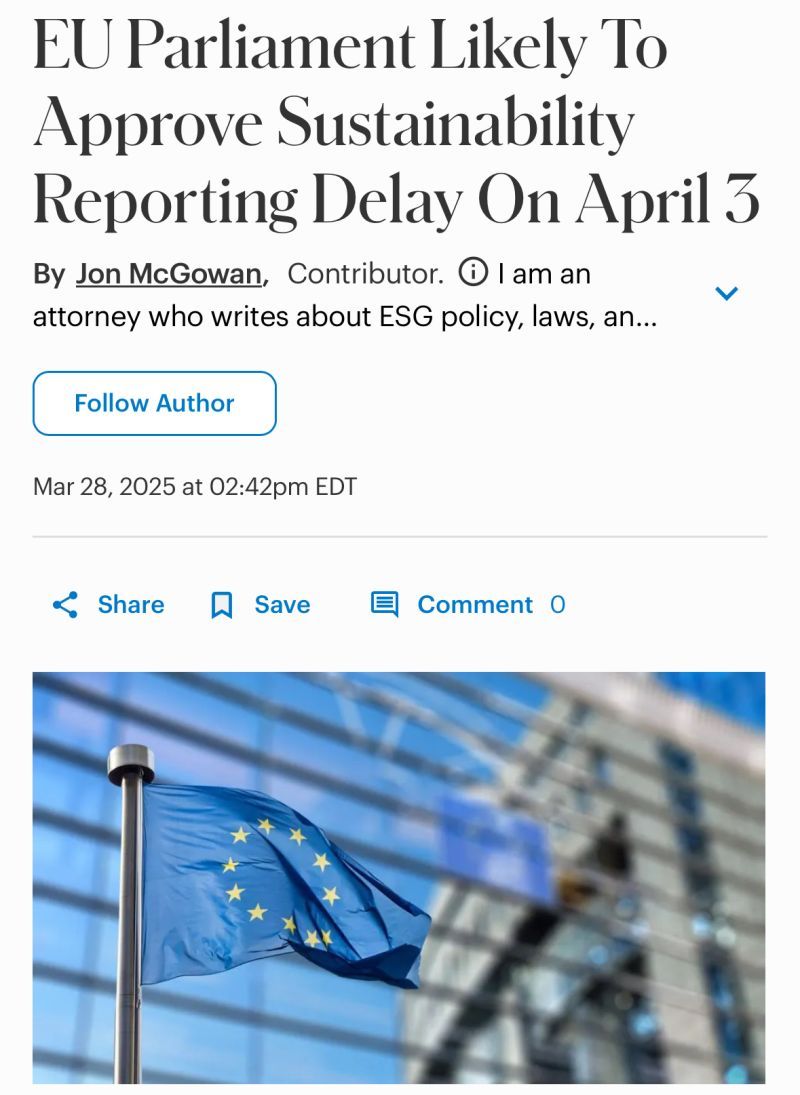

While this speeds up the process, it also leaves very limited time for debate and amendments (such amendments would need to be submitted by 2 April latest). Note that this is not yet the final adoption of this proposal.
After the likely vote on 3 April, the co-legislators need to agree on a final legal text. Right now, it is reasonable to expect that this will happen fast, so that the final legal text can be adopted before the summer. EU member states then have until 31 Dec 2025 to transpose the Directive into national law.
===
Forbes article: https://lnkd.in/d66bWru2
#sustainability, #esg
28-03-2025

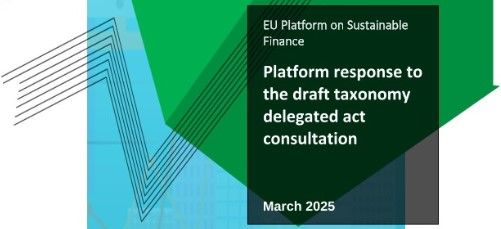

"The Platform strongly recommends aligning the scope of Taxonomy reporting with the scope of the Corporate Sustainability Reporting Directive (CSRD), while preserving the CSRD’s original scope. For non-SME companies below the 1,000-employee threshold, reporting should be focused on the most essential standards, including Taxonomy alignment." The Platform raises "serious concerns" regarding the potential loss of data due to the combined effects of narrowing the scope of the CSRD and the Taxonomy.
The Platform broadly supports the proposed Taxonomy-related changes, for instance the introduction of a materiality threshold and the simplification of reporting templates. But it also makes clear that "further efforts to simplify the Taxonomy’s implementation and usage could be supported by issuing additional guidance."
===
Short Description of the Response: https://lnkd.in/d_sex5Jf
#sustainability, #esg
27-03-2025

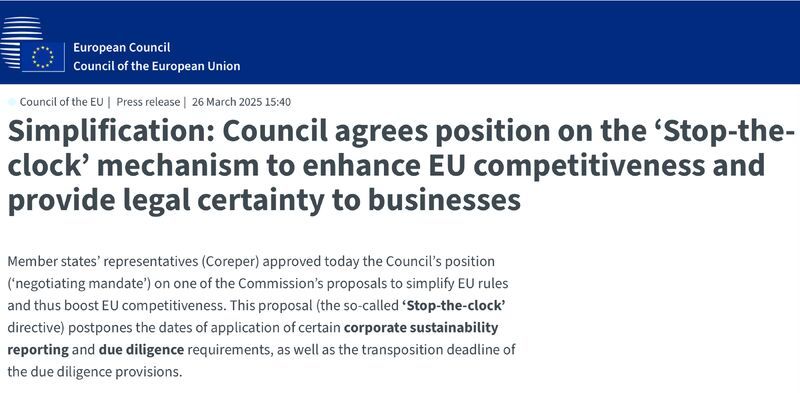

The agreed position reflects the Commission's proposal: (1) #CSRD two-year delay of entry into application for companies that have not yet started to report and (2) #CSDDD one year postponement of transposition deadline.
The Council's position is a kind of "negotiating mandate". Based on this, the Council can enter into negotiations with the Parliament with a view to reach an agreement. The Parliament on its side will vote on the request to treat the "stop-the-clock" proposal under urgent procedure next week (right now scheduled for 1 April). So, things are moving quickly...
===
Press Release: https://lnkd.in/dtrBSyyq
#sustainability, #esg
24-03-2025

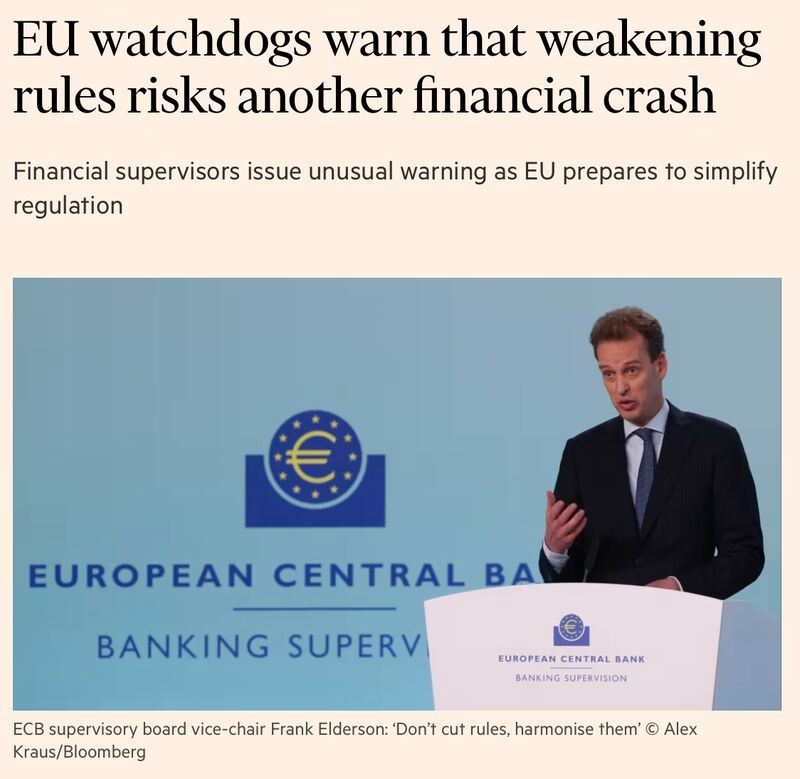

The ECB also published a working paper a few days ago which discusses the potential of #CSRD, #CSDDD, and the #EUTaxonomy to limit greenwashing. The paper argues: "it is important that the simplification and streamlining initiated by the European Commission preserves the elements in the sustainable finance framework that prevent greenwashing." The assessment suggests that, if well implemented, the regulations can limit the possibility of greenwashing.
===
FT Story: https://lnkd.in/d67fuKci (note that this article covers both Omnibus Packages, not just the sustainability one).
ECB Paper: https://lnkd.in/d8ikHAau
#sustainability, #esg
22-03-2025

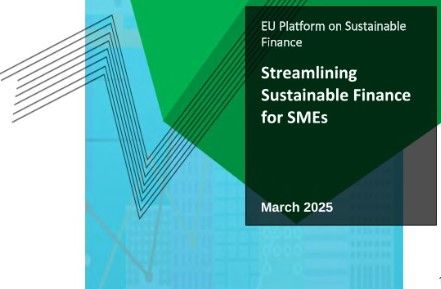

As the EU Taxonomy was not designed specifically for SMEs, at least in its current form, this proposal is an important step in the right direction, also to work towards proportionality of frameworks and standards. At this initial stage, the proposal focuses on climate mitigation and adaptation objectives.
Such a standard is needed because many SMEs when seeking external financing of sustainability activities turn to bank loans. Hence, through the standard, "SMEs would be able to demonstrate that the activity, measure or project they are requiring external financing for is sustainable, or that they are sustainable at entity-level."
===
Description by the Platform: https://lnkd.in/di2GuDv5
#sustainability, #esg, #eutaxonomy
21-03-2025

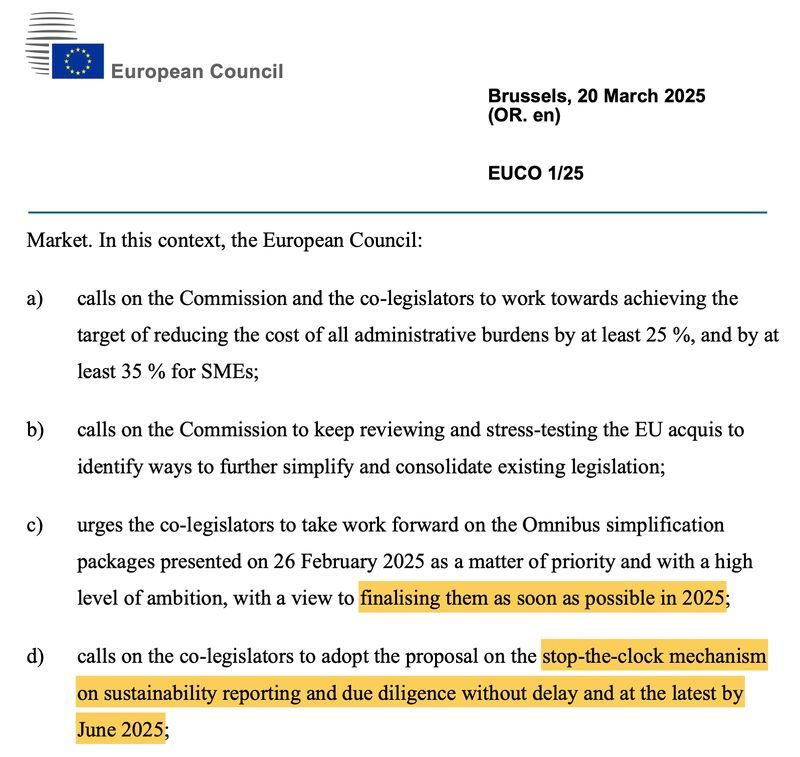

Importantly, the Council "urged" the co-legislators to finalise all omnibus packages "as a matter of priority and with a high level of ambition [...] as soon as possible in 2025." We may therefore see pressure on the full omnibus proposal to be adopted already later in 2025. The remark on high ambitions also shows that the Council fully backs the suggested changes, and may even demand more.
With all this urgency and pressure it is vital to keep the process transparent, balanced and inclusive. We cannot rush into conclusions on such wide-ranging changes, especially as the content of the proposal remains very contested.
===
Full Council Conclusions Document: https://lnkd.in/dajZTE_8
#sustainability, #esg, #CSRD, #CSDDD
20-03-2025

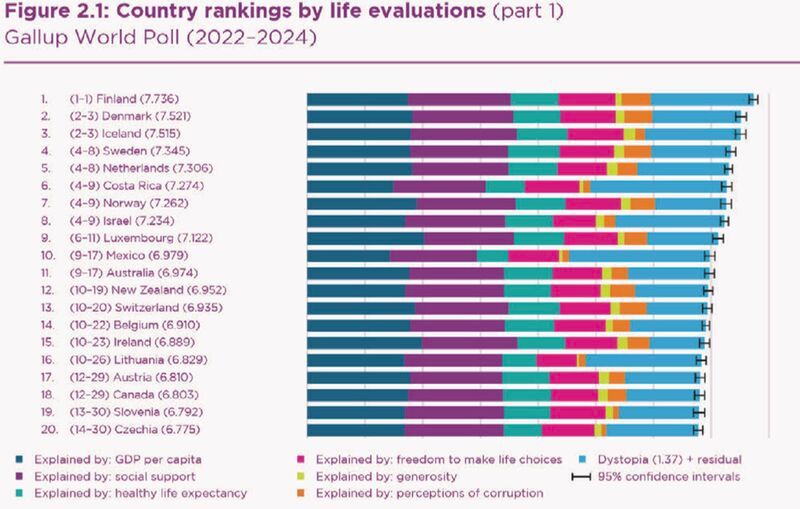

1️⃣ The report finds that people are much too pessimistic about others' desire to care and to do good. "For example, when wallets were dropped in the street by researchers, the proportion of returned wallets was far higher than people expected." We systematically underestimate others' disposition to do good. This is also confirmed by a recent study in "Nature" that found that 69% of people would give 1% of their income to tackle climate change. However, only 43% believed that others in their country would do the same (https://lnkd.in/g2nB5wW6).
2️⃣ Our own wellbeing depends on our perceptions(!) of others' caring and kindness, and their actual caring behaviour. As we underestimate others' caring behaviour, our own wellbeing can be improved by receiving more and better information about others' behaviour. Too often, we miss such "micro-positive-information" in the sustainability context, as the focus is often on aggregated data, e.g. by corporations and countries.
3️⃣ The U.S. fell to its lowest ever place on "life evaluations" in the report (24th in the world). The Nordic countries fared very well, both in terms of happiness but also in terms of caring. So, people are happier living where they believe people care about each other. And such caring behaviour also shapes key variables that impact sustainability (e.g., trust).
===
Full Report: https://lnkd.in/gqWa5giC
Note: The report does not just ask people whether they are "happy". Methodological remarks are in the report. The report is based on individuals' assessments. The six variables listed in the image are used to explain the variation of life evaluations (they are not a measure themselves).
19-03-2025

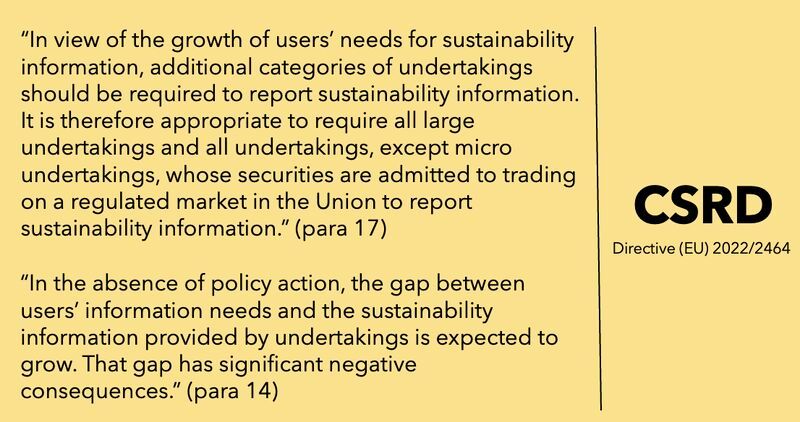

1️⃣ INFORMATION NEEDS: The information needs that the original Directive talks about (see image) are still there. These needs may differ from actor to actor (e.g., investors differ in needs for granular data), but the needs themselves have not suddenly changed. These needs also exist internally within firms (e.g. risk management), even though some may not recognise this (yet).
2️⃣ PROPORTIONALITY: The Draghi Report, which is often used as a reference point for the omnibus, does not suggest to simply move companies out of the scope of regulations. It suggests “to better consider the size of companies affected by regulation, using appropriate mitigation measures in line with the proportionality principle.” The omnibus proposal argues that proportionality is achieved because out-of-scope companies may report voluntarily. This, however, is unlikely to close the information gap that the original Directive emphasized.
3️⃣ DIFFERENTIATION: Not imposing excessive burdens on smaller companies is important, and it is therefore necessary to better align firm size and reporting requirements. For this we need more and better differentiation and consideration of what Draghi called proportionality. But the omnibus delivers the opposite: a one-size-fits-all reporting regime for larger companies with the option for everyone else to report voluntarily.
It is now up to the European Parliament to correct this course. The vote on the stop-the-clock part of the omnibus will already be on 1 April (12:00-13:00).
17-03-2025

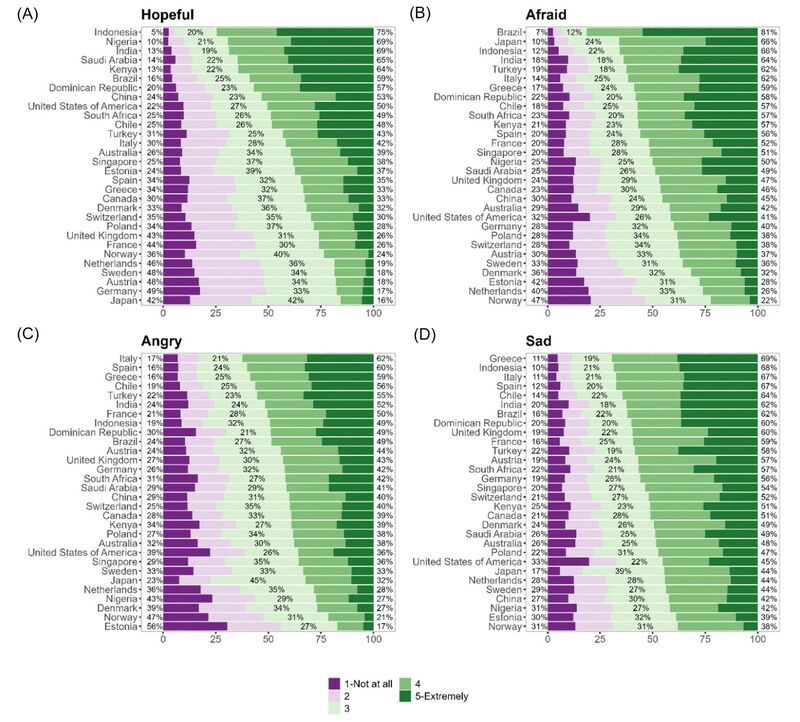

Interestingly, the study shows that in some countries people experience a strong mix of emotions (e.g., being hopeful but also being afraid and angry). What also stands out is that countries that are quite vulnerable to climate change still experience hope (the question here would be what sustains this hope).
Climate emotions matter because they also shape to which degree we support certain interventions. Being hopeful or worried about climate change positively related to support for certain climate interventions (e.g., afforestation). The support of interventions was also linked to being afraid and hence the desire for more protection (but with a weaker effect).
Our emotional experiences about climate change differ a lot across countries, and it is vital to keep the adverse effects of not(!) engaging with these emotions in mind...
===
Full study (open access): https://lnkd.in/duv3ppcw
#sustainability, #climatechange
14-03-2025



We could add to this that the demands made by Germany and France (in their respective letters) are also very well reflected in the proposal (e.g., Germany directly called for the 1,000 employee threshold cut, the two-year delay, and also the value chain cap).
Given that the original processes around #CSRD, #CSDDD, and the #EUTaxonomy were undergoing such significant consultations and assessments, it is worrying to see that the omnibus proposal primarily resembles the input by only two stakeholder groups: some business lobbyists and some European member states.
The lack of transparency and inclusiveness in consultations related to the omnibus proposal significantly undercuts (a) trust in the legislative process and (b) trust in the proportionality of the proposed changes. But the Green Deal needs this trust, especially now that the U.S. is trying to pull apart key aspects of the sustainability agenda.
It is now up to the European Parliament to correct this course and to also demand clear justifications for the proposed changes.
===
Press Release: https://lnkd.in/dmYc5_At
Analysis of positions by German and France: https://lnkd.in/dfrWiQhm
#sustainability, #esgl
13-03-2025

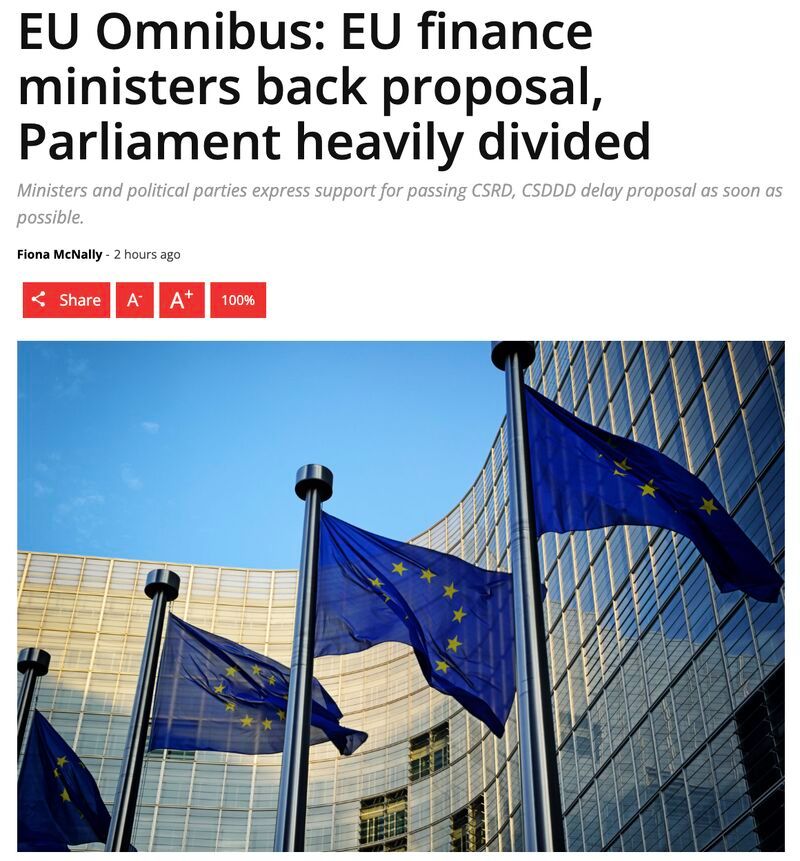

1️⃣ STOP-THE-CLOCK: The Polish presidency of the Council treats the #omnibus as a priority file and is planning a vote on the stop-the-clock proposal in April. As the EPP pushes for an "urgent procedure" on the stop-the-clock proposal in the Parliament, we may also see a vote there pretty soon. Hence, the proposal could be finally adopted before the summer, so that countries have time to transpose this into national law (deadline 31 Dec 2025).
2️⃣ FURTHER CHANGES: According to reporting by Responsible Investor, some countries in the Council even pushed for further changes. France suggests to move the threshold on #CSDDD to 5,000 employees (which would align with the country's own due diligence law), the Netherlands "would like to extend the delay proposal to the first wave of reporters under CSRD", and Czechia thinks that the Commission needs to aim for more than just 25% burden reduction.
3️⃣ LEVEL PLAYING FIELD: Ministers emphasised the need to keep a level playing field between member states on reporting. I think this is indeed a good point. Levelling the playing field is important because some countries have still not transposed the #CSRD into national law (and therefore cannot amend the Directive, at least not as of now).
===
Responsible Investor: https://lnkd.in/dFRV3RRa
#sustainability, #esg, #eugreendeal
11-03-2025

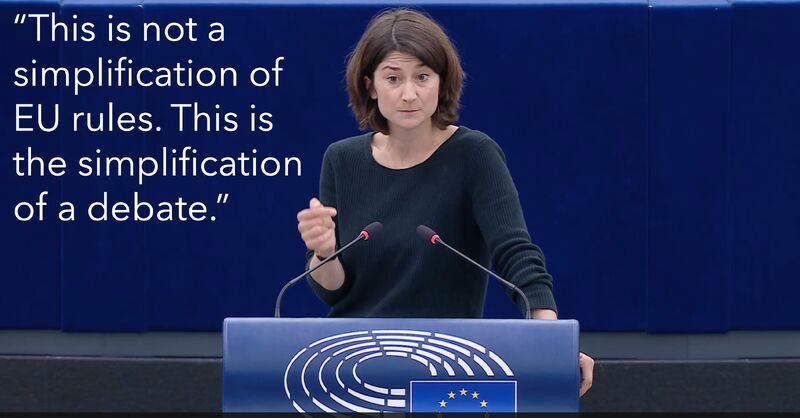

1️⃣ EPP (centre-right) indicated that they will push for an "urgent procedure" in the Parliament on the stop-the-clock proposal (explanation: https://lnkd.in/dnuUqtjK). They also made clear that "more is needed" and that it is necessary to push for further changes in the upcoming negotiations.
2️⃣ S&D (centre left) indicated that they welcome simplifications in general. However, the omnibus "does not deliver on simplification" but rather reflects deregulation. Lara Wolters summarized it well: “This is not a simplification of EU rules. This is the simplification of a debate.” Wolters made clear that just asking companies to assess direct suppliers results in "pointless box ticking".
3️⃣ The Greens indicated that the omnibus is a massive deregulation that undermines the green transition. They also stressed that it "puts off investors who were already on the path of change". Renew Europe (liberal, centrist) reminded the EPP that it has the choice to negotiate with the centre or to form an alliance with the extreme right. Renew stressed that it is possible to move quickly on this without falling into excesses, as suggested by the far right.
4️⃣ ECR (conservatives and reformist) emphasised that the omnibus is a small and insufficient step. Hence, they push for further amendments. One MEP plainly stated: "Cut, cut, cut, and once again cut. We have to throw a lot of Directives into the trash, where they belong." The Europe of Sovereign Nations group pushed it further by suggesting to "remove obligations from all businesses" and that we "need a chainsaw rather than a letter opener."
Bottom line: Either EPP works with the extreme right (in which case additional radical changes are on the horizon), or the parties around the centre find a way to balance this out (in which case we may see a softening of some of the proposed changes).
===
Note that this is a not a complete summary of the debate, and it only refers to statements made by some of the MEPs. Image below shows Lara Wolters (S&D). #CSRD, #CSDDD, #eugreendeal, #sustainability
08-03-2025

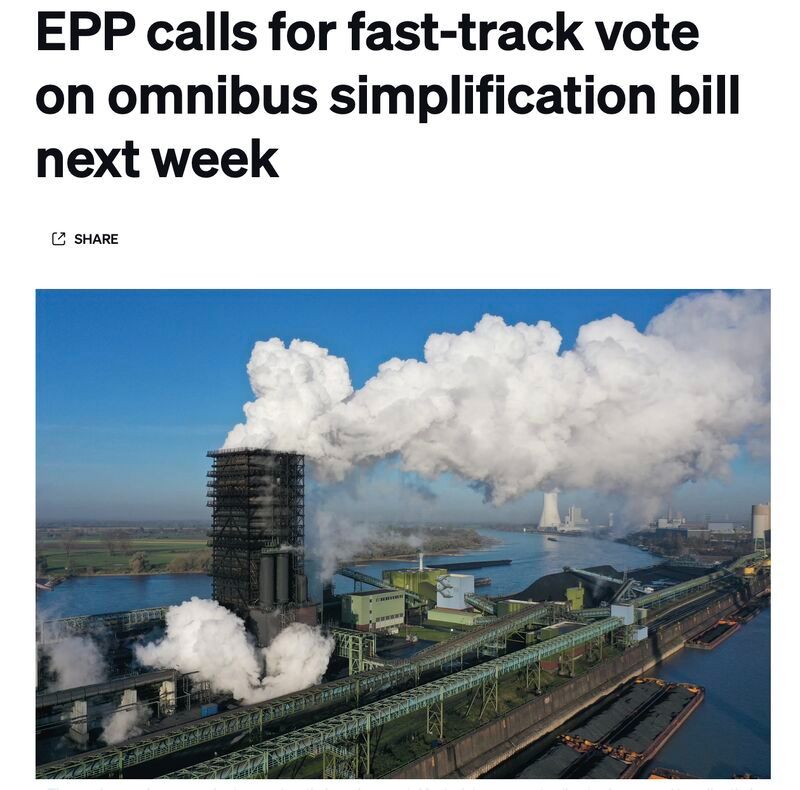

The Parliament has already scheduled a session to debate the #omnibus for 10 March (https://lnkd.in/dRDARjRp)). Note that this is a scheduled debate, not a scheduled vote. When it comes to a vote it will be decisive to see who the EPP builds an alliance with (and based on which arguments)
If a vote on the stop-the-clock part of the proposal comes through in the next weeks, it is reasonable to expect final adoption before the summer, so that the transposition deadline for member states (31 Dec 2025) can be met. This would at least create legal certainty for companies, and this is a key factor in this entire debate, regardless of where we stand on the content of the omnibus itself.
===
POLITICO Story: https://lnkd.in/dzCVr2FU (thanks to Inma Vaquero Pernia for sharing this article with me)
#sustainability, #esg, #eugreendeal
07-03-2025

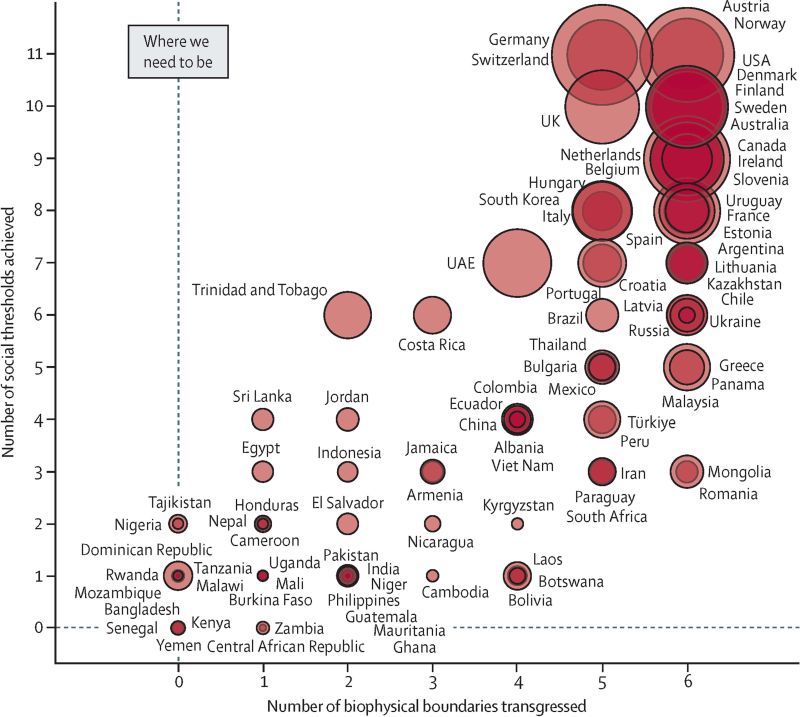

Growth and competitiveness should not be an end in themselves - they need to serve the long-term interest of people. More precisely: the social, environmental and economic wellbeing of people. So policies, also in the context of the #omnibus, need to balance this out. So far, however, this balancing act did not work (see image), and seeing parts of the puzzle such as sustainability reporting and due diligence only as cost burdens does not help with finding such balance.
We need a much better narrative around business competitiveness - a narrative that affirms long-term thinking and that acknowledges the interdependence of the various systems upon which businesses and people depend.
===
Full Study (open access): https://lnkd.in/djW6PgKQ
#sustainability, #esg, #planetaryboundaries
06-03-2025

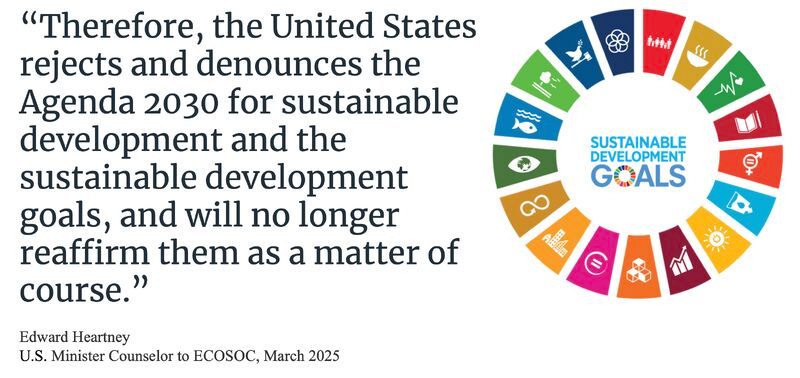

The US Minister Counselor to ECOSOC said: “The United States rejects and denounces the Agenda 2030 for sustainable development and the sustainable development goals, and will no longer reaffirm them as a matter of course.” and "Although framed in neutral language, Agenda 2030 and the SDGs advance a program of soft global governance that is inconsistent with U.S. sovereignty and adverse to the rights and interests of Americans." (full statement: https://lnkd.in/dDu6j_dX)
The resolution nevertheless passed with 162 countries in favour and 3 against (the United States, Israel, and Argentina). The SDG midterm review showed that we are off track to meet the SDG. With the U.S. now even denouncing this global development agenda, which includes the protection of very basic rights, chances of scalable progress in the next years are slim.
===
Read the Full Resolution: https://lnkd.in/dMibtkz8
UN Coverage: https://lnkd.in/d7QmftBB
SDG Midterm Review: https://lnkd.in/ddAVYihK
#sustainability, #agenda2030
05-03-2025

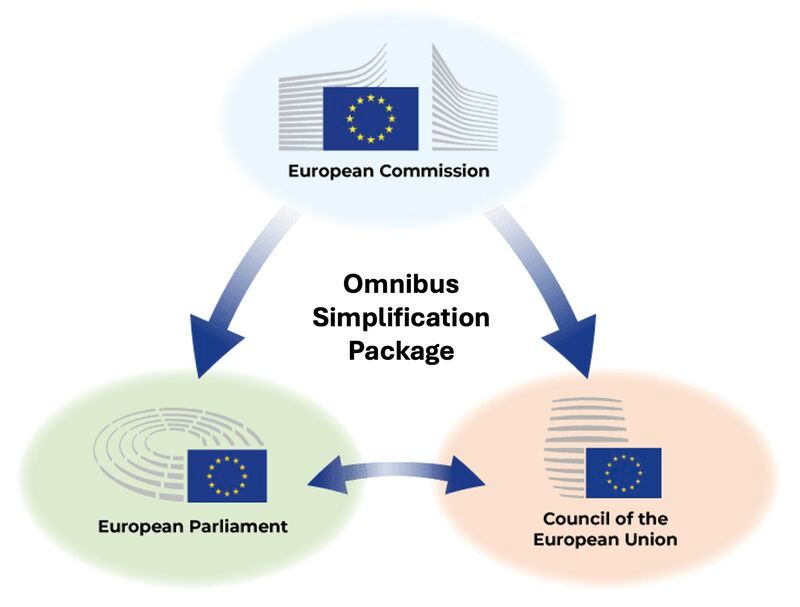

1️⃣ COUNCIL: The Council has decided to set up a new dedicated body which will discuss all upcoming simplification proposals. The body operates as a sub-group of the Antici Group and it already had its first meeting with several more meetings planned. This may help to speed things up on the side of the Council.
It is unlikely that there will be a lot of opposition against the proposal in the Council. Some of the positions communicated by EU member states before the release of the omnibus do not support such a view. In the Council, proposals are adopted through a "qualified majority" (55% of member states need to be in favour and these need to represent at least 65% of the EU population). Hence: opposing the proposal would require support by at least two big EU countries, which seems unlikely at this stage.
2️⃣ PARLIAMENT: It is clear that there will be pushback. The Commission has asked the Parliament to fast-track the "stop-the-clock" part of the proposal. Many expect a decision on the "stop-the-clock" part before the summer (to have certainty on timelines). However, the full omnibus proposal will be contested and pushback can be especially expected from the Social Democrats (S&D) and The Greens.
Lara Wolters (S&D) rightly wrote: "MEPs must now succeed where the commission has failed — finding a compromise for common-sense simplification, without lowering standards." The Greens also issues a strong statement in support of #CSRD and #CSDDD (https://lnkd.in/daAWdfSk). The EPP already indicated that they "will push for its success with full force". (https://lnkd.in/d6M4G_zq).
Although the EPP is the biggest bloc in the Parliament (188 seats), they need support to push the omnibus through (361 needed for a simple majority). Basically, the EPP has two options: (1) either look for a compromise that focuses on more balanced simplifications with the centre parties (e.g., S&D, Greens) or (2) make an alliance with the far right. The latter option would open up the EPP to work with anti-democratic forces, and it is also clear that these parties will want further and more radical changes to #CSRD and #CSDDD.
===
Story on the new "simplification" body in the Council: https://lnkd.in/dPUCERbt (thanks Inma Vaquero Pernia for sharing).
04-03-2025

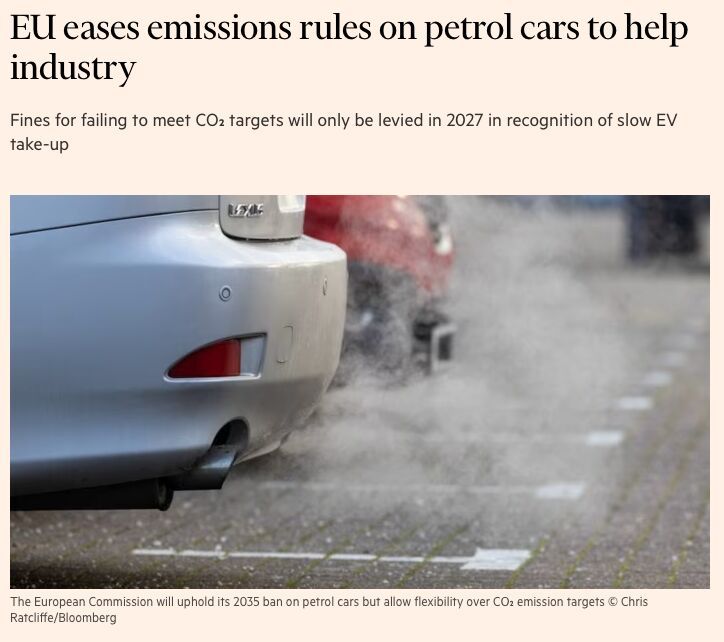

Compliance is now calculated based on average emissions (2025-2027) which is likely to reduce fines for laggards in the field. VW, for instance, warned that it would have to pay €1.5bn in fines (for 2025) due to the emission rules. Some car manufacturers welcomed the opportunity (VW, Mercedes), while others pushed back that this only delays the necessary transition (Volvo).
Interestingly, the Commission is keen on easing fines these days, as it also proposed to remove the maximum penalties related to #CSDDD (which were 5% of global net turnover). Fines are always a last resort. But if the EU keeps on systematically weakening fines for non-compliance with its sustainability regulations it undercuts certainty and trust into its own legislative actions...
===
FT Story: https://lnkd.in/dWuPpFHm
#sustainability, #climatechange, #fossilfuels
03-03-2025



1️⃣ ”IT’S POLITICAL!”: The omnibus discussion is not just a discussion of reporting and due diligence. It is a discussion about political direction. The EU wants to cut back sustainability directives, which it actually just adopted. This sends the wrong political signal, within Europe but also beyond. While the US is going down an unprecedented path of deregulation, many look at regulations like #CSRD and #CSDDD as setting global standards (and norms).
2️⃣ “IT’S SIGNIFICANT!”: The proposed changes are significant. The public reaction would have been less intense had the Commission just focused on technical alignments of indicators and cutting a few datapoints. However, this did not happen. The proposal moves 80% of companies out of the reporting regime and changes due diligence in ways that impact will be difficult to create. As these significant amendments are bundled into one single(!) document, the interest is understandably high.
3️⃣ “IT’S NECESSARY!”: Of course, reporting is not impact. But reporting serves many important functions. It provides data – and data creates transparency and supports accountability. Data is also vital for investors and therefore necessary to align investments with the Green Deal, and it enables companies to understand their own impacts, risks, and opportunities. Most of all, due diligence is supposed to protect some of the most vulnerable stakeholders affected by global value chains.
4️⃣ “IT’S PERSONAL”: Reporting and due diligence also employ people (just as financial reporting employs people). In the last years, Europe developed an industry with firms which pushed for innovative solutions to support CSRD and CSDDD. This industry will be hit by the proposed changes. While some out-of-scope companies will acknowledge the value of voluntary reporting, others will walk away. So, jobs are on the line…
5️⃣ "IT'S SUPERFICIAL": Feelings also run high because the justification of the changes lacks depth. The omnibus is justified based on generic remarks related to changing political and economic circumstances and the need for growth and competitiveness. The cost savings calculations focused narrowly on estimated compliance cost savings; other types of costs - e.g. sunk costs for already taken investments were not considered, and potential benefits of the regulations or even the impacts of the changes were left out.
The omnibus debate is a critical one as it defines the contours of a field. So, we are not seeing on overreaction, but an interest in Europe's level of ambition vis-à-vis key sustainability practices…
01-03-2025



Georg Kell (founding Executive Director of the UN Global Compact) and I argue in this short article that this dominant cost narrative is based on wrong assumptions and a misconception of what reporting and due diligence are all about. Of course, we do not need "reporting for the sake of reporting", but we need it as a strategic management framework for meaningful long-term changes.
Declaring sustainability reporting and due diligence a competitive disadvantage may appease populist and revisionist sentiments. But it is not a winning strategy for Europe‘s future.
28-02-2025



EU Press Release with all details: https://lnkd.in/dkKj_jbr
Official Omnibus Q&A: https://lnkd.in/dgbnj_wa
Highlights from Press Conference:
1️⃣ CSRD:
- "stop-the-clock" for companies that have not yet reported (wave 2) for two years to give them more time;
- CSRD and CSDDD scope aligned; 80% of companies are freed from "very burdensome reporting" according to the Commissioner:
- ESRS are reviewed for streamlining;
- sector standards are eliminated;
==> Emphasis was put on the fact that companies that are out of scope can voluntarily report under "simplified standard".
2️⃣ CSDDD:
- focus will be on direct business partners only;
- extending intervals for assessments from 1 to 5 years;
- more proportionate penalty regime (no longer linked to net turnover);
- move away from EU-wide civil liability
3️⃣ Taxonomy
- reporting only for "very large companies" - the scope is aligned with CSRD and CSDDD (1,000 employee threshold);
- 80% of companies freed of reporting under Taxonomy
#esg, #sustainability, #eugreendeal
27-02-2025

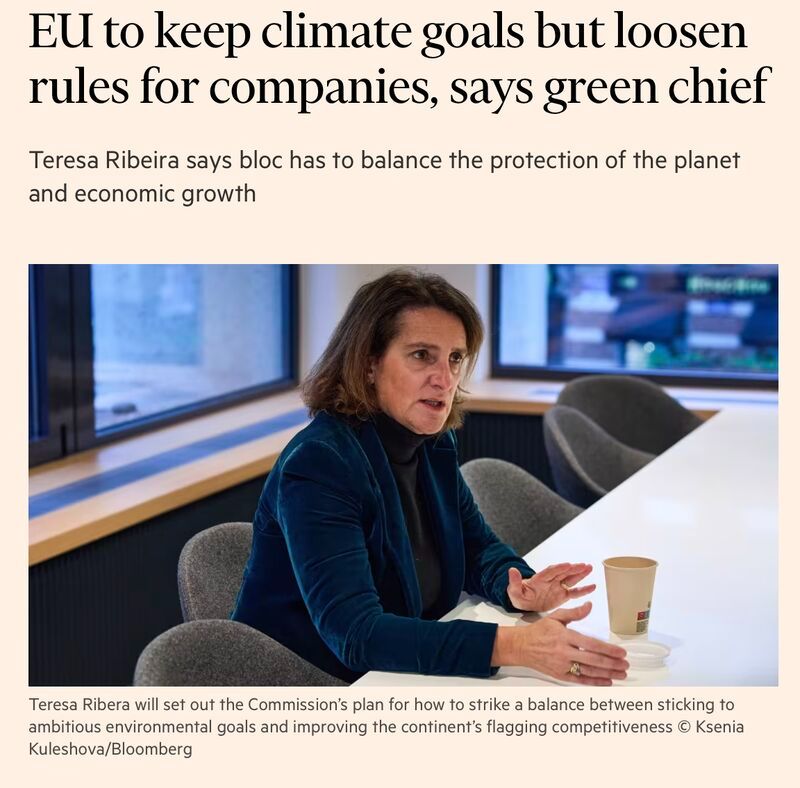

We need a growth narrative that is based on the long-term value that sustainability reporting and due diligence can bring to organizations. This value comes in different forms and shapes and it is not always easy to grasp. But, it exists, and it deserves more attention in the story that the Commission is weaving around the renewed Green Deal.
===
FT Story: https://lnkd.in/dWR8757i
#CSRD, #CSDDD, #eugreendeal
23-02-2025

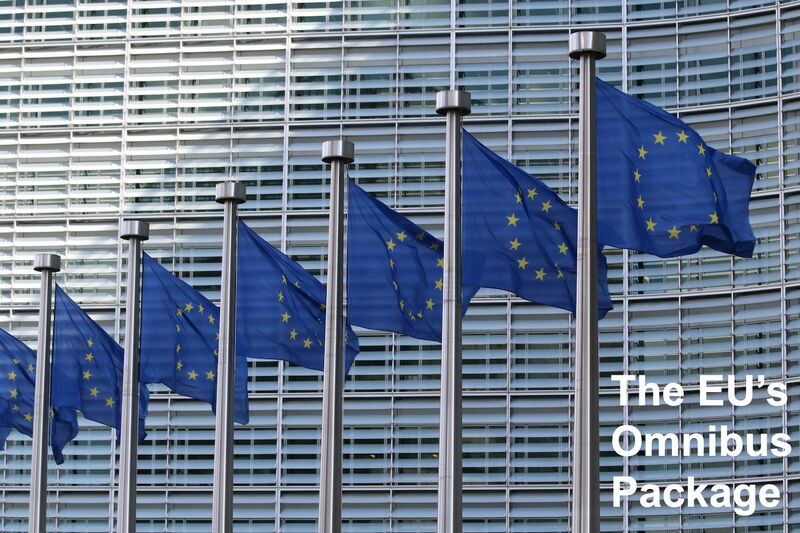

1️⃣ #CSRD and #CSDDD scope to be aligned (i.e. 1,000 employee threshold); double materiality preserved
2️⃣ Taxonomy to be turned into a voluntary system (which would completely undermine the whole point to compare performance across firms)
3️⃣ #CSDDD would be weakened (watered down climate transition plans; civil liability scrapped; due diligence requirements "not meaningful anymore")
Overall, Level 1 to be opened for CSRD, CSDDD and Taxonomy - plus Level 2 for CSRD and Taxonomy.
POLITICO also published a story yesterday discussing the enormous tensions within the Commission on all of this. The Commission produced different omnibus drafts: one "very unambitious one" and one "very radical one".
A Commission official commented: "I believe we're finding a balance now". One contentious item was/is double materiality (it was included into the "radical" draft but this created a big fight). Another Commission official is quoted with: "It's going to be an ugly text, but we're [doing] our best to save the essentials."
As always - we know for sure once we see the official draft...
===
UPDATE: A draft of the #omnibus proposal has now been leaked:
https://lnkd.in/dQqek5Te
22-02-2025

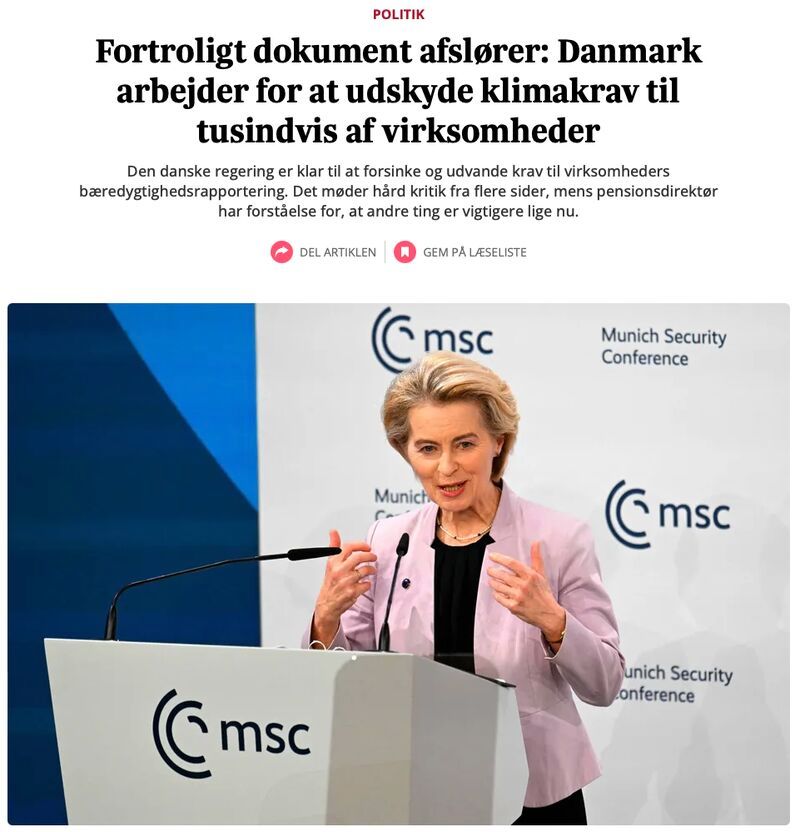

Overall, a very disappointing position, especially when considering that Denmark sees itself as a leader in the green transition. The outlined proposal is less about simplification (e.g., a postponement does not simplify) and more about deregulation (e.g., axing reporting requirements by up to 75%).
Denmark is also “open to discuss simplifications of the CSDDD” while “staying true to the original objectives of the Directive” (e.g. making the exemption for financial institutions permanent). The paper also mentions to review the scope and "the necessity of mandatory reporting" under the EU Taxonomy.
A bit of an irony that the paper starts with: "With climate change happening before our eyes, we must deliver on the green transition of European businesses." A kind reminder to Danish politicians: a recent assessment of #SDG progress showed that Denmark still faces major challenges to reach SDG13 (Climate Action). Such type of positions won't close this gap...
===
Story by Finans (in Danish): https://lnkd.in/guBRsaaU
Story by POLITICO (in English): https://lnkd.in/gA66xzJp
2025 EU SDG Assessment: https://lnkd.in/gqcNxPhs
#sustainability, #esg, #eugreendeal
21-02-2025

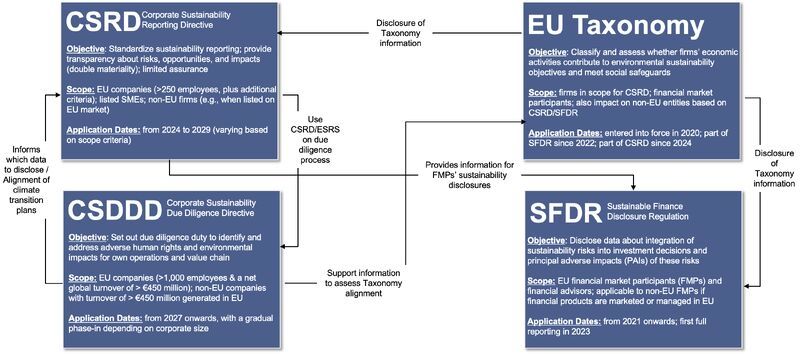

For sure, the system can (and should) be improved. There is much potential to reap efficiency gains. But we should not forget why this system was build in the first place - (1) to have better and more reliable data (not just by a few very big companies), (2) to better manage risks and opportunities, (3) to provide transparency and enable comparability, and (4) to reorient private investments so that they better align with the Green Deal. Delaying implementation and moving companies out of scope is unlikely to support these objectives.
Yes, we need these regulations to be "proportionate" - but we also need a proportionate omnibus package...
===
#CSRD, #CSDDD, #eugreendeal The image comes from an old post of mine (https://lnkd.in/gQKB4ezh) and it only lists some of the connections.
20-02-2025

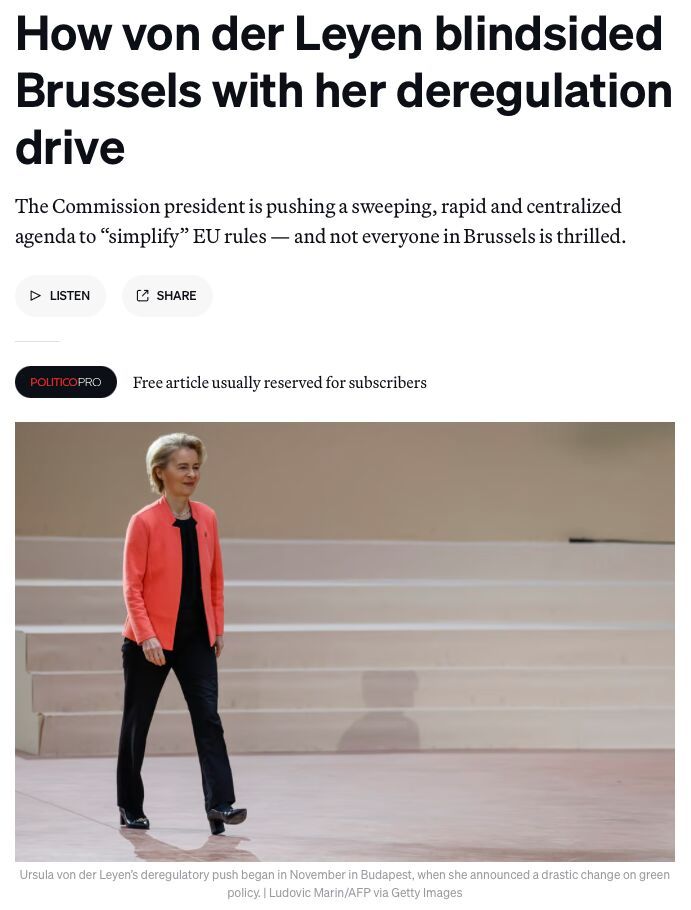

Many seem to be concerned about the speed with which the simplification agenda is pushed and the #omnibus packages are prepared. "'When we’re going that fast, how can we be sure we’re getting it right?' said a senior national regulator."
"From Commission staffers 'depressed' to see years of work being speedily undone, to Cabinet officials straining for influence under von der Leyen’s centralized working style, the speed and top-down nature of the new deregulation drive has transparency alarm bells ringing in Brussels."
All of this is concerning - pushing the simplification agenda at high speed and in such a top-down manner comes at the cost of making well-informed, evidence-based decisions that rest on a participative and transparent process. Europe can and must do better...
===
POLITICO Story: https://lnkd.in/dZNs2P7P
#sustainability, #esg, #eugreendeal
19-02-2025

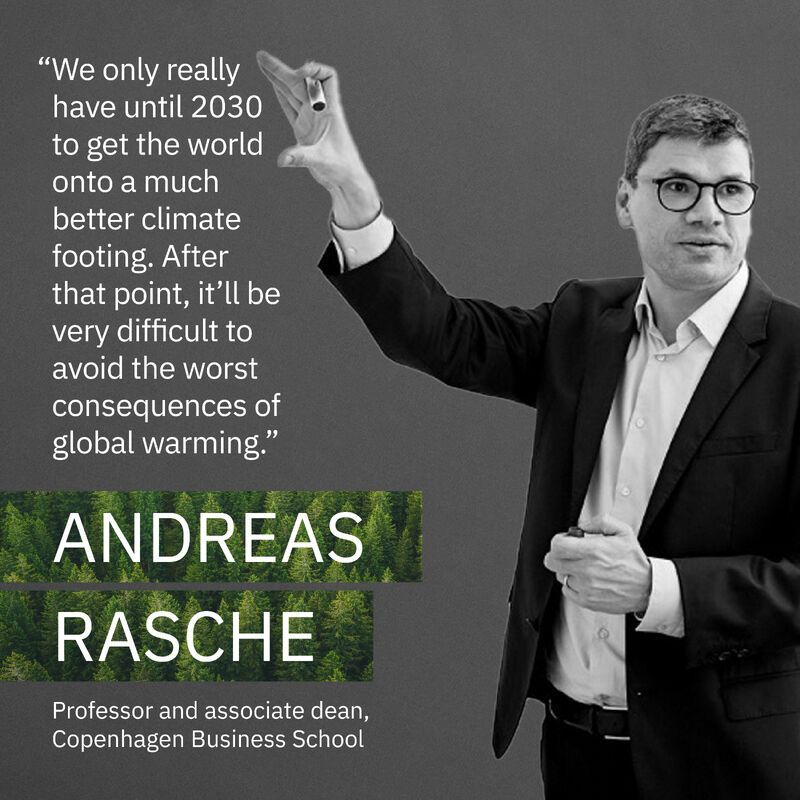

17-02-2025

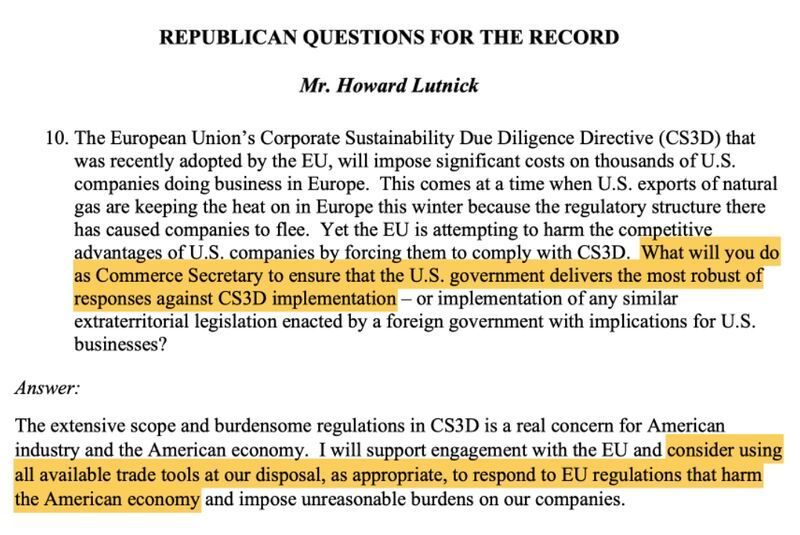

In his Senate Nomination Hearing, Howard Lutnick said: "The extensive scope and burdensome regulations in CS3D is a real concern for American industry and the American economy. I will support engagement with the EU and consider using all available trade tools at our disposal, as appropriate, to respond to EU regulations that harm the American economy and impose unreasonable burdens on our companies."
Given that the EU is already trying to find ways to deescalate around Trump's tariffs (e.g., buying more gas), changes to the CSDDD via the omnibus package might be a welcome additional opportunity. At least, the political pressure from beyond the EU is there, and the pressure is strong...
===
Full Record of the Hearing: https://lnkd.in/dwYCUuSu
#sustainability, #esg, #eugreendeal
16-02-2025

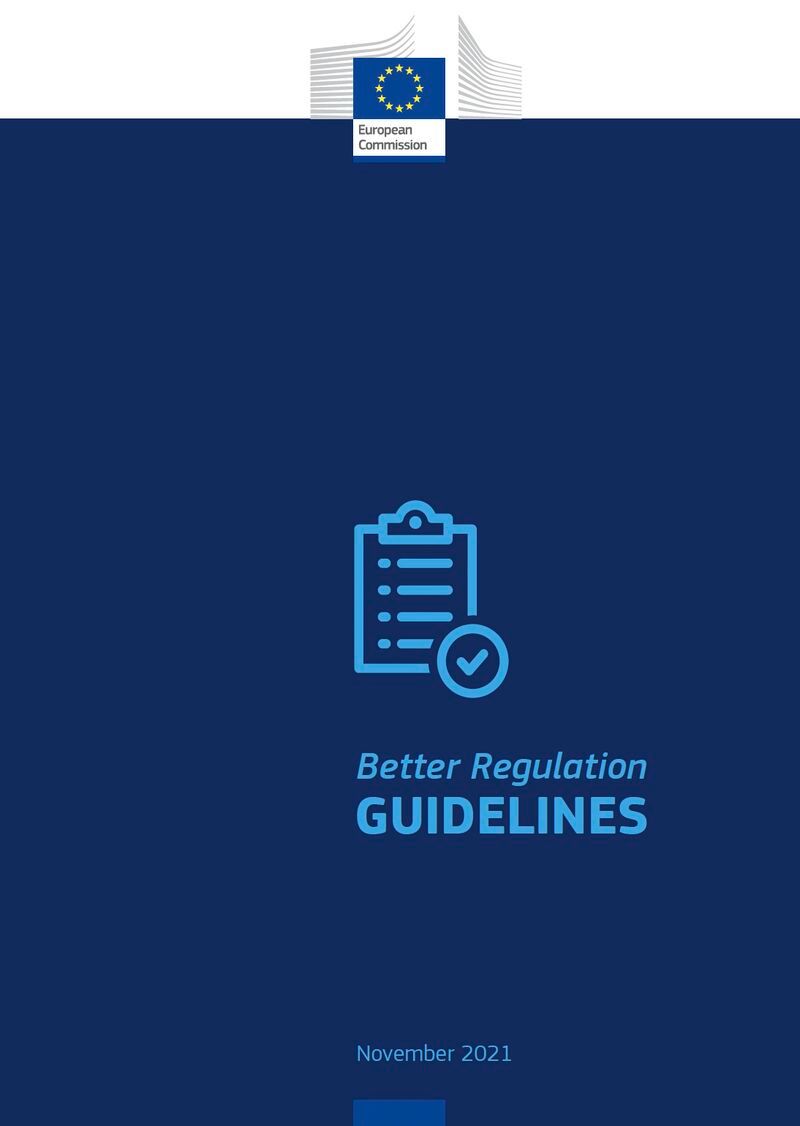

Especially the proportionate nature of an #omnibus must be kept in mind, as the proposal needs to be "proportionate to the expected impact". So far, it seems unlikely that a proper impact assessment will be conducted. However, the Guidelines require an impact assessment for initiatives "that are [1] likely to have significant economic, environmental or social impacts or which entail significant spending, and [2] where the Commission has a choice of policy options."
In my opinion, both criteria are met for the #omnibus - there is a choice of policy options and also significant expected impacts (e.g., anticipated cost savings). These expected impacts need to be properly studied. BUT, it is difficult to assess expected impacts at this stage, as the #CSRD is in an early stage and the #CSDDD not even transposed into national law. Assessing implementation impacts (and also the likely effects of simplifications) is very difficult to judge in such a context.
This is a problem that the Commission needs to seriously look into, otherwise
we are "flying blind"...
===
Better Regulation Guidelines: https://lnkd.in/d-mTnKzE
#sustainability, #esg, #eugreendeal
15-02-2025

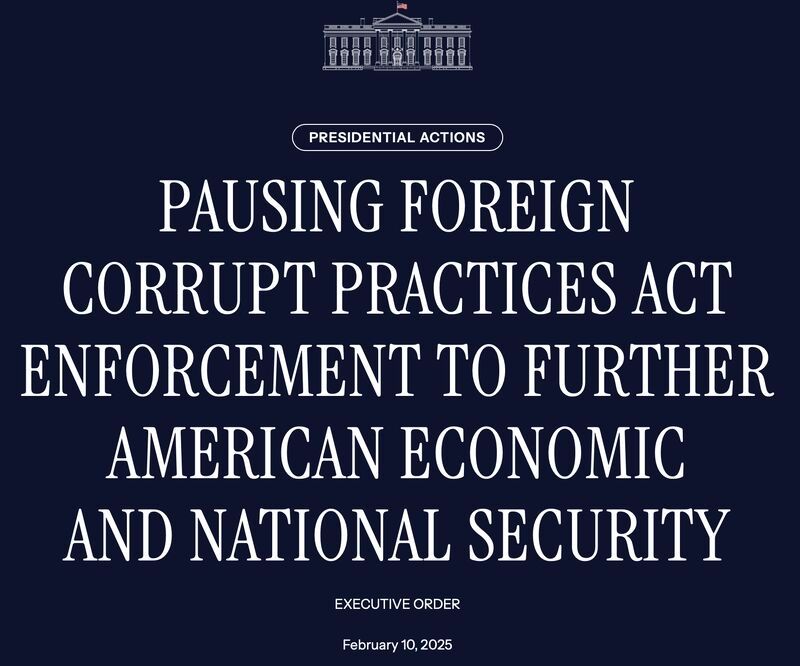

What Trump completely neglects is that corruption creates costs for all parties (incl. American businesses). Bribery distorts markets and undermines trust; it is an unproductive cost and many businesses appreciate the legal certainty that the FCPA provides.
Trump complained that the FCPA makes American businesses less competitive, because non-US competitors did not face similar rules. What he did not say is: (1) non-US companies can also be subject to the FCPA and (2) other countries have similar legislation (e.g., the UK Bribery Act).
The plan is to issue new FCPA enforcement guidance which “promotes American competitiveness and efficient use of federal law enforcement resources.” Previous and existing FCPA cases will be reviewed.
Trump is just bulldozing through the ESG agenda, now including action on "anti-anti-corruption"...
===
Executive Order: https://lnkd.in/duaCHuek
FT Story: https://lnkd.in/dnbi4rHw
#sustainability, #corruption
Activate to view larger image,
14-02-2025

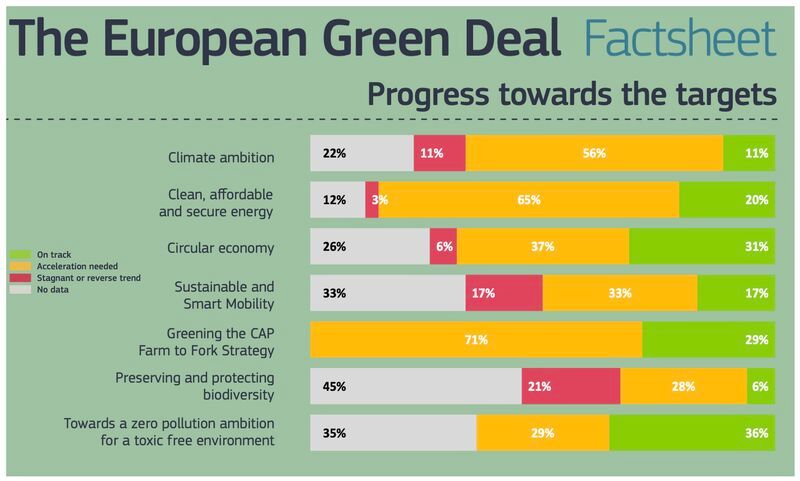

This report shows where Europe stands with the Green Deal. Yes, there is some progress, but the tasks ahead are monumental, especially on biodiversity, smart mobility and climate action. We need a robust data infrastructure around sustainability and therefore regulations like #CSRD and the #EUTaxonomy are of significant importance to collect and analyse data from the corporate sphere.
The report emphasises: "Data and knowledge gaps remain on ecosystem condition and pressures: more knowledge of the value of natural capital and the cause effect relationships between socio-economic systems and ecosystems is needed to systematically integrate into policy and investment decisions."
This is why we need a proportionate omnibus simplification strategy, and not simplistic reporting or deregulation...
===
Full Report: https://lnkd.in/dKzD7873
Press Release: https://lnkd.in/dfHTmDP8
#sustainability, #esg, #eugreendeal
14-02-2025

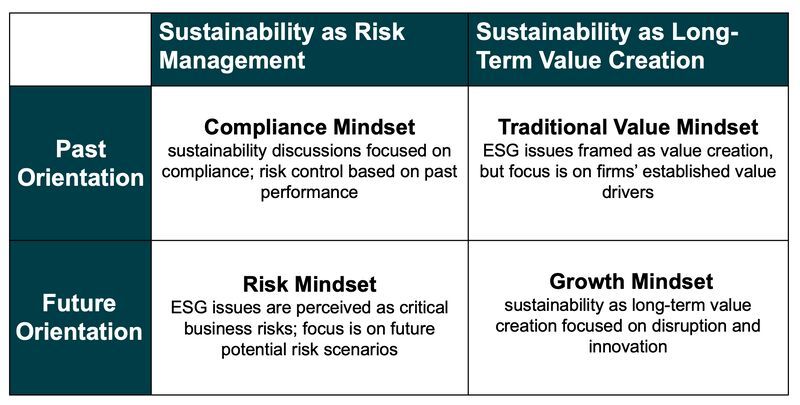

I would say: no, not at all. First, nobody really knows where the omnibus simplifications will land. Politics is difficult to predict (see #CSDDD process in 2024). Second, and more importantly, sustainability reporting should not just be a compliance exercise. I always distinguish four different sustainability mindsets that a company can have (see image). Seeing CSRD reporting purely as compliance is too shortsighted - it becomes a reactive exercise to address litigation risk.
Ask yourself: Would a business stop its financial reporting, if it was no longer legally required? Probably not, as such reporting yields important information to steer a business, to understand risks and opportunities, and to communicate with stakeholders. The same holds for sustainability reporting: If done correctly, it can help to better understand risks along the value chain, it can help with capital allocation decisions, it can point towards growth opportunities (and the list could go on).
In the end, each company, works with a mix of these four mindsets. The essential question, however, is: Which one dominates in which context? Do not let compliance dominate your CSRD discussions... reach beyond!
===
Background on CSRD changes: https://lnkd.in/d2yMVQ4f
Background on the four mindsets (which were developed based on my research about how boards of directors relate to sustainability): https://lnkd.in/dSAyrBnh
#sustainabiluty, #esg, #compliance
12-02-2025

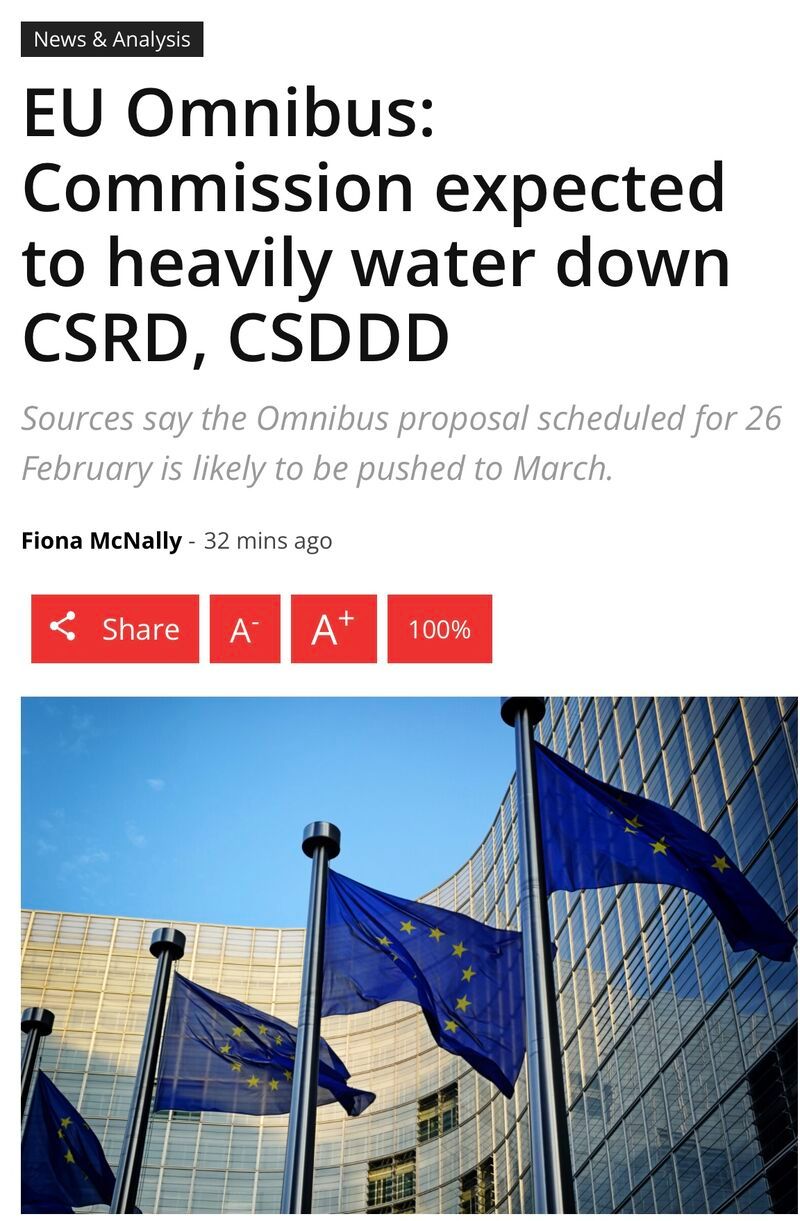

1️⃣ "RI understands that the double materiality aspect of CSRD is also at risk, and that there may be a re-focus on single (financial) materiality."
2️⃣ Numerous essential elements of CSDDD are being discussed, including climate transition plans and civil liability.
3️⃣ Publication of the #omnibus proposal is likely to be pushed into March (and not 26 February).
Of course, we need to be careful at this stage and certainly there should not be too much speculation. On the other hand, RI is usually well-informed, and even if these points are not 1:1 in the final proposal, they at least show that we seem far beyond discussing technical simplifications...
===
Full RI story: https://lnkd.in/dcERAPdA
09-02-2025

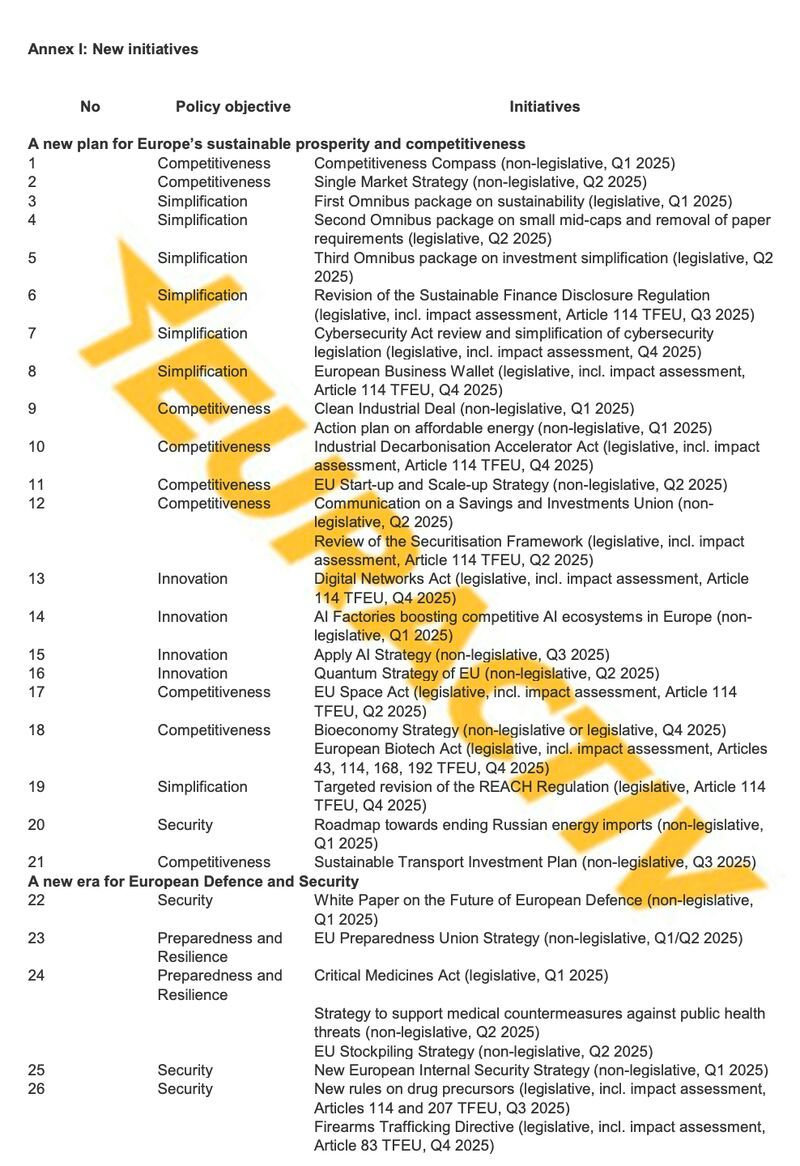

It will be interesting to see how the omnibus packages on sustainability and small mid-caps interrelate. The Work Programme is due to be adopted next Tuesday.
===
Press story: https://lnkd.in/dnJMY8NB
#sustainability, #esg, #eugreendeal
05-02-2025

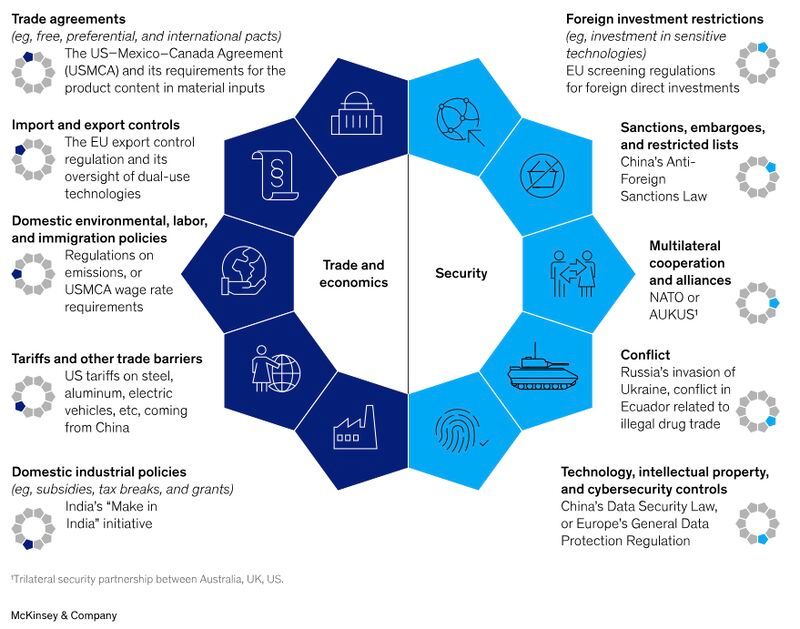

Below is an overview of areas of geopolitical risk that can provide a basis to discuss the geopolitics-sustainability link. Recent research shows that geopolitical risk impacts sustainability, for instance because higher risk is "detrimental to efforts aimed at improving environmental sustainability." (https://lnkd.in/d_DwwVss) So, what to do?
1️⃣ UNDERSTANDING: Preparedness starts with creating a common baseline of facts - in terms of geopolitical risk exposure and possible impact of these risks on a firm's sustainability targets. The challenge is to develop a granular understanding of such impacts.
2️⃣ GOVERNANCE: The geopolitics-sustainability link needs to be anchored somewhere in the organization (and often it is not) - e.g., government relations, public affairs, sustainability, strategy (or a mix). Boards should acknowledge the geopolitics-sustainability interplay in their oversight work (this remains a challenge).
3️⃣ SCENARIOS: It makes sense to embed sustainability impacts into the scenarios that firms develop to respond to geopolitical developments. Such scenarios are not about anticipation, but about having narratives of plausible and possible futures.
===
Article (that includes the image below): https://lnkd.in/dZKKm3kE
02-02-2025



1️⃣ Open Letter by C3D (representing more than 400 French companies): "Support companies with resources and guidance to ensure compliance while maintaining competitiveness." (https://lnkd.in/d2V627CD)
2️⃣ Open Letter by Unilever, Nestle, Mars et al.: "The most practical step the European Commission can take to support future competitiveness is to focus on developing the clear and practical guidance needed to support businesses in implementing the CSDDD." (https://lnkd.in/dwyiyh9b)
Also, politicians in the European Parliament have made clear that they oppose far-reaching changes:
3️⃣ Renew Europe (Group in the European Parliament): "When it comes to CSRD, simplification can be done without reopening level 1 legislation in the first stage. For instance, the new VSME standard, supported by SME organizations, should be used as a tool to cap the requests coming from large corporates." (https://lnkd.in/d84Zd3aP)
4️⃣ Lara Wolters (S&D Group, NL) emphasised what while simplification is a valid concern, the Draghi report did not argue for deregulation and also did not see such deregulation as the path to competitiveness. (https://lnkd.in/dzANbTbZ)
The bottom line is: The EU Commission must look for a balanced and inclusive approach towards the omnibus. Nobody is arguing against simplifications, if changes are proportionate. But changes to the scope and timeline of regulations like #CSRD and #CSDDD are not simplifications, they stand for a deregulation agenda that reflects political opportunism...
#sustainability, #esg , #eugreendeal
31-01-2025

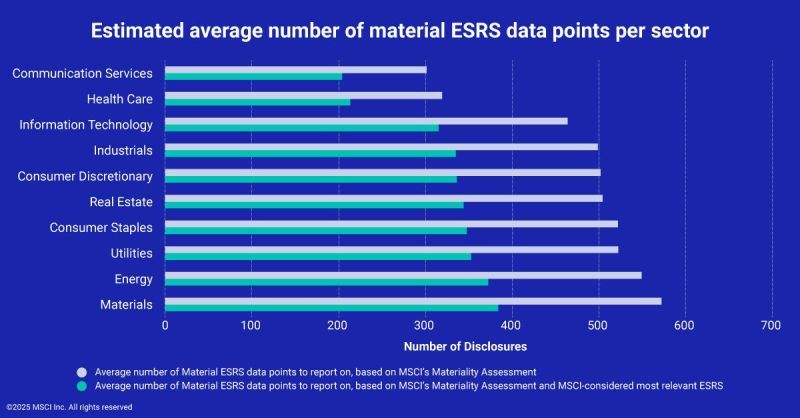

With new legislation, everyone lacks implementation experience. This creates a situation in which legal security is on top of the agenda and compliance dominates. Hence: right now is simply not a good time to objectively judge the "burden" of sustainability reporting, as data for costs and benefits are unlikely to reflect long-term trends.
The #omnibus discussion focuses too much on "bureaucracy" and "burdens" (for political reasons) and too little on proportionate implementation. The EU should provide more targeted guidance to professionals to ensure proportionate implementation. This would help more than creating additional uncertainty by discussing changing scope criteria and a deferral of #CSRD.
Let's go for simplifications, not deregulation or simplistic reporting...
#sustainability, #esg
24-01-2025

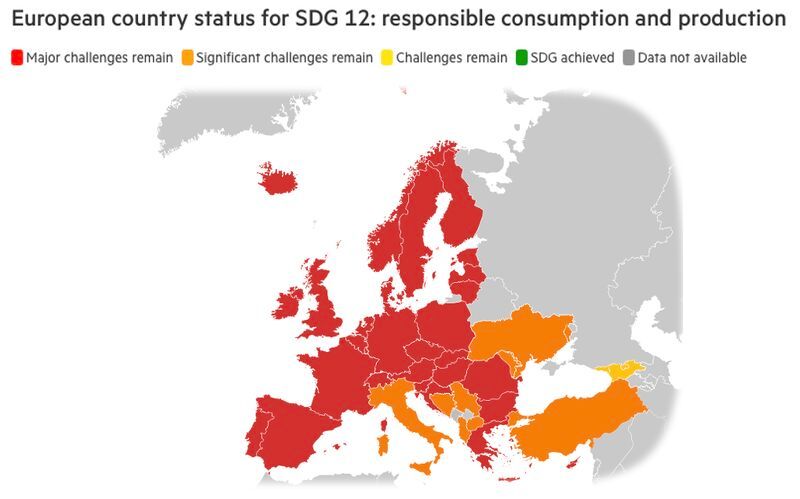

▶️ Significant challenges remain related to responsible consumption and production (SDG12). The image below shows the current status - all countries either have major or significant challenges. The report explicitly notes in this context that the EU "generates large negative spillovers, notably via unsustainable consumption and exports."
▶️ The report also identifies "persisting challenges related to environmental and biodiversity goals, including sustainable food and land systems SDG2, SDGs 12-15)." On climate action, all countries either have major or significant challenges.
▶️ On many SDGs, progress is significantly uneven across Europe. One key reason is inequality within countries. The report captures this through a new measure - the "Leave-No-One-Behind" index.
The European Commission needs to consider this upsetting status of SDG progress in Europe when thinking about the scope and scale of the upcoming #omnibus simplification package.
===
Access the full report and data: https://lnkd.in/d-xMxGef
#sustainability, #esg, #eugreendeal
23-01-2025

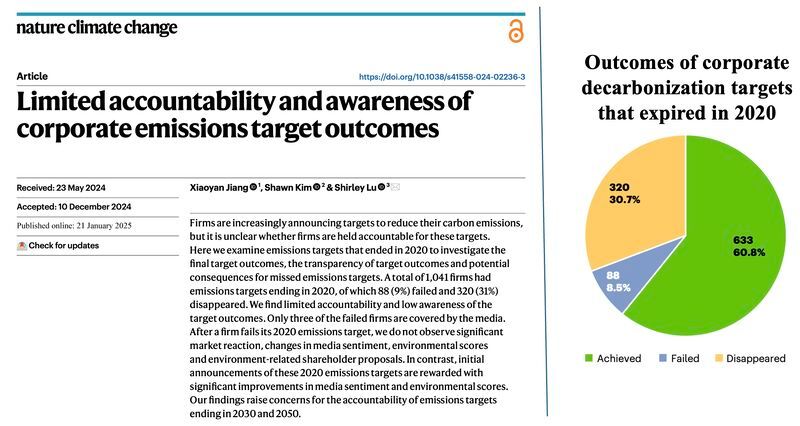

1️⃣ Of the 1,041 firms, 8% had failed their 2020 emissions target, while for 31% of the firms the target simply disappeared (either because the 2020 target was silently removed or because the target was pushed into the future).
2️⃣ "Our findings suggest that firms do not face penalties for failing their emissions reduction targets." Assessed consequences of not meeting a target included: market reaction, ESG rating score, and media sentiment.
3️⃣ Although failing targets is not punished, announcing targets provides firms with benefits (e.g., media coverage). Overall, the announcement of decarbonization targets gained more visibility than the actual outcomes.
Corporate decarbonization targets risk being a "free lunch". The media plays an important role in this context: media coverage of achieved targets was more likely than for failed/disappearing targets.
Worrying is the high number of firms where targets disappeared. Disappearing targets prevent acknowledgement of failure. Failure as such can (and should) be an opportunity to learn, unless there is a systematic problem....
===
Study (open access): https://lnkd.in/dZBDFR4W
#sustainability, #esg, #climatechange
21-01-2025

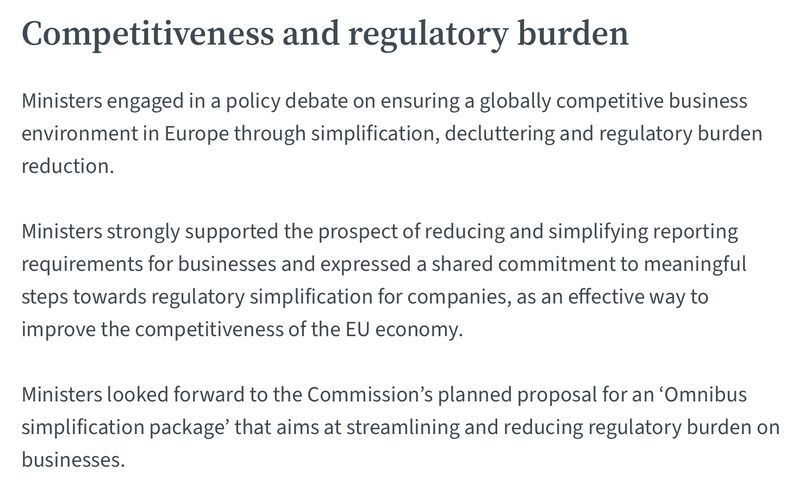

1️⃣ SCOPE: Commissioner Dombrovskis confirmed in a press conference that the precise scope of the omnibus is still unclear. They seem to be primarily looking at "sustainability reporting", but other elements are also considered. So, it is not a given that the omnibus will exclusively focus on sustainability reporting legislation. (https://lnkd.in/dXbsK8ZD)
2️⃣ AMBITION: Commission President von der Leyen mentioned in her speech in Davos (WEF) that "we will launch a far-reaching simplification of our sustainable finance and due diligence rules." So, there is ambition behind the omnibus package, at least from her side, and we should therefore expect a package that does not just include some minor fixes. (https://lnkd.in/dmafwCDa)
3️⃣ CSDDD Inclusion: The S&D Group in the Parliament expressed their opposition to including the #CSDDD into the omnibus package in a letter to Commission President von der Leyen. Lara Wolters, who was the Rapporteur for the CSDDD, summarised this letter very nicely, laying out key arguments why it simply makes no sense to include the CSDDD (https://lnkd.in/dqKJ_qvx).
The Commission has to understand that an "ambitious" omnibus package will lead to a lot of confusion, it will halt back investments, and it will add to a lot of (unnecessary!) business uncertainty. All of this will cost money... The omnibus should deliver on what it promised to deliver "simplification without deregulation".
===
Press Release by the EU Council: https://lnkd.in/dJs-VzEU
#sustainability, #esg, #CSRD, #EUTaxonomy
20-01-2025

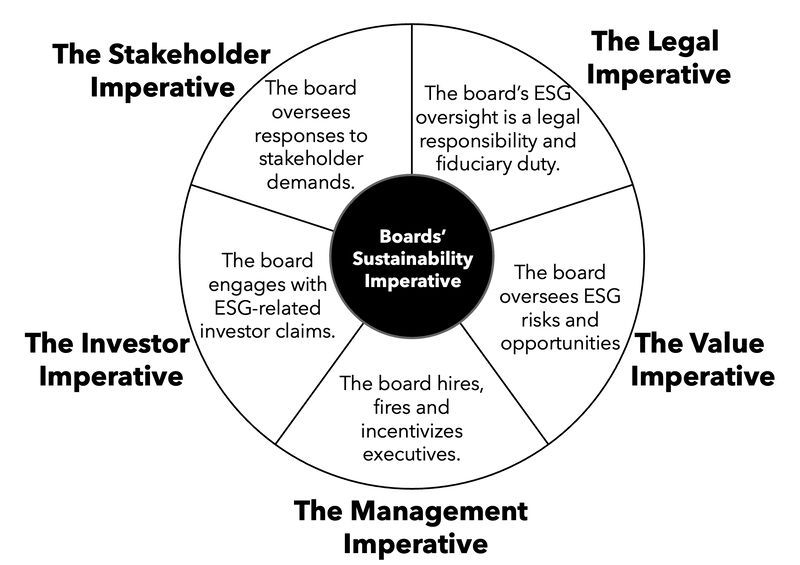

1️⃣ The MANAGEMENT Imperative: Boards hire/fire CEOs and also monitor/approve the compensation of executives. This gives directors lots of influence on the long-term sustainability agenda. A powerful thing to do is to hire a CEO who cares about sustainability and who has the necessary competencies...
2️⃣ The STAKEHOLDER Imperative: Boards oversee firms' stakeholder engagement and engage directly with key claims. But too often boards remain detached from engagement with key stakeholders, with engagement being just one-directional and not integrated into decision-making (here some interesting results: https://lnkd.in/dqKk77iC).
3️⃣ The INVESTOR Imperative: Boards interact with investors (major investors often even have a seat on the table). This puts major ESG-related claims on the board agenda, and hence raises the need to justify and explain relevant decisions through enhanced sustainability engagement.
4️⃣ The VALUE Imperative: ESG issues create risks and opportunities and boards need to factor these into their work. While many boards are aware of these risks and opportunities, their integration(!) into board-level decision making often remains too limited.
5️⃣ The LEGAL Imperative: Boards also need to look into sustainability because new regulations bring new compliance requirements, some of which affect directors' work directly (e.g., CSRD's consequences for the audit committee).
Bottom line: There are many good reasons for boards to engage with sustainability - regulations just being one of them. The most powerful reason, of course, is if directors acknowledge that addressing sustainability is simply the right thing to do...
#sustainability, #esg, #boards
19-01-2025

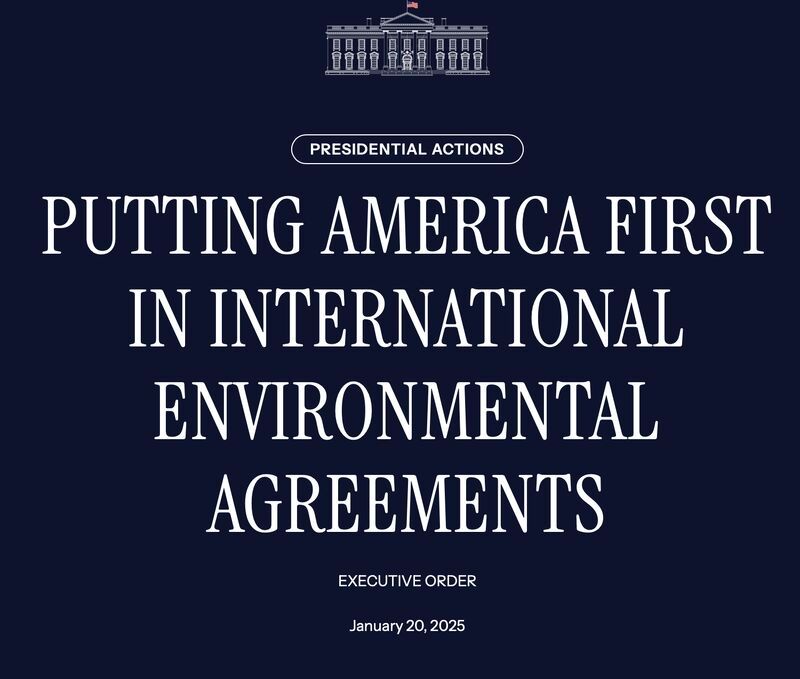

Before signing the EO, Trump said: "I'm immediately withdrawing from the unfair, one-sided Paris climate accord rip-off." What he forgets: climate change does not care whether he thinks this Agreement is a rip-off - climate change is basic physics and it will continue...
The EO argued that such Agreements "do not reflect our country’s values" and that they also do not reflect the "pursuit of economic and environmental objectives." Hopefully, Americans will remember these statements when more frequent and intense extreme weather events (hurricanes, wildfires) occur and create enormous economic costs. The likely costliest natural disaster in US history, the LA wildfires, are not even fully contained yet...
===
Full text of the EO here: https://lnkd.in/dz7ad2sn
#sustainability, #esg, #trump
18-01-2025

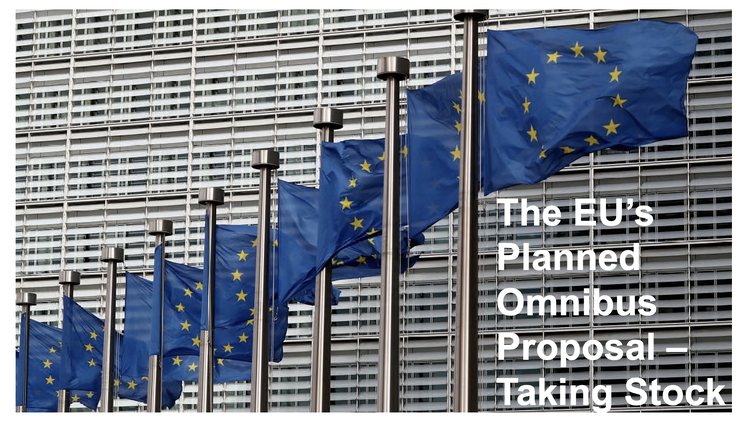

===
You can access the article here https://www.linkedin.com/pulse/eus-omnibus-proposal-taking-stock-andreas-rasche-g4t8f/?trackingId=nlyx75WXvP9crXEWP1DZ9A%3D%3D
#CSRD, #EUTaxonomy, #CSDDD, #sustainability, #esg
16-01-2025

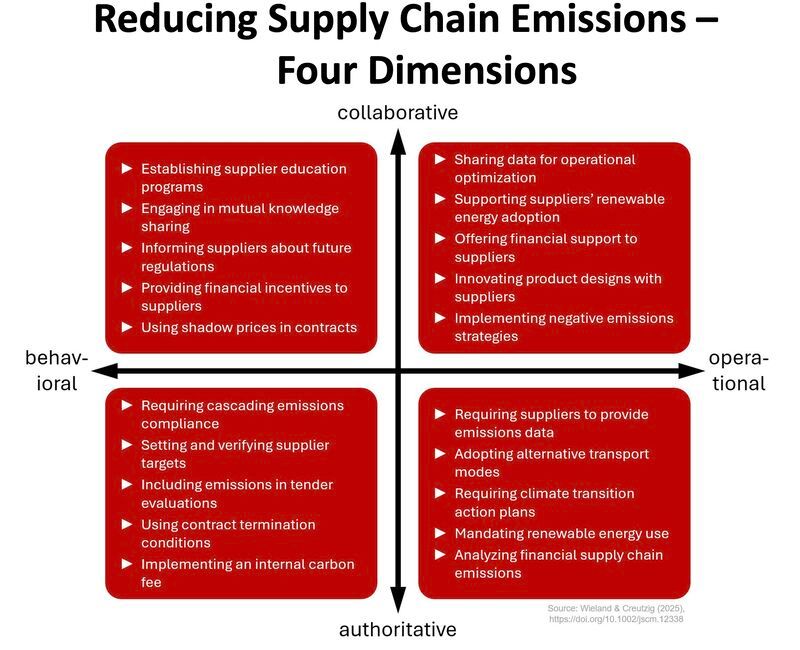

1️⃣ Are interventions aimed at modifying suppliers' BEHAVIOUR (e.g., beliefs, attitudes, willingness) or do they aim more at changing suppliers' OPERATIONS (e.g., products, processes, technologies)?
2️⃣ Are interventions more COLLABORATIVE in nature (e.g., building mutual trust and shared goals) or are they more AUTHORITATIVE (e.g., based on power and control relationships)?
As always these are analytical distinctions and real-life corporate practices work on a continuum, often reflecting a combination of the four quadrants. But it is a very helpful tool to gain an overview of possibilities in this space.
In the end, relevant questions to ask are: Are current interventions by a company too much aimed at one quadrant? Is there need to diversify? What is the right mix for engaging suppliers?
===
Credit to my colleague Andreas Wieland at CBS for co-developing this framework. You can access the article here (open access): https://lnkd.in/gJX7zqcX
#sustainability, #esg, #supplychains
15-01-2025

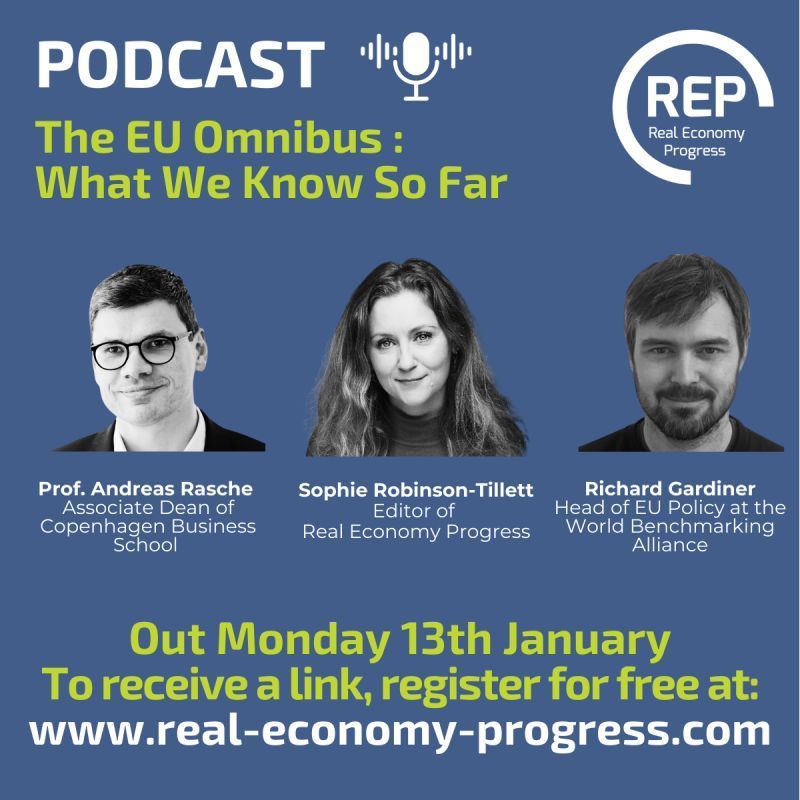

While we cannot say anything about the precise content or scope of the planned amendments yet, we discussed the context surrounding the omnibus: What is an omnibus regulation? Why now? What is the likely process? What can companies do?
You can access the podcast here: https://lnkd.in/dA72h33q
#sustainability, #esg, #eugreendeal
14-01-2025

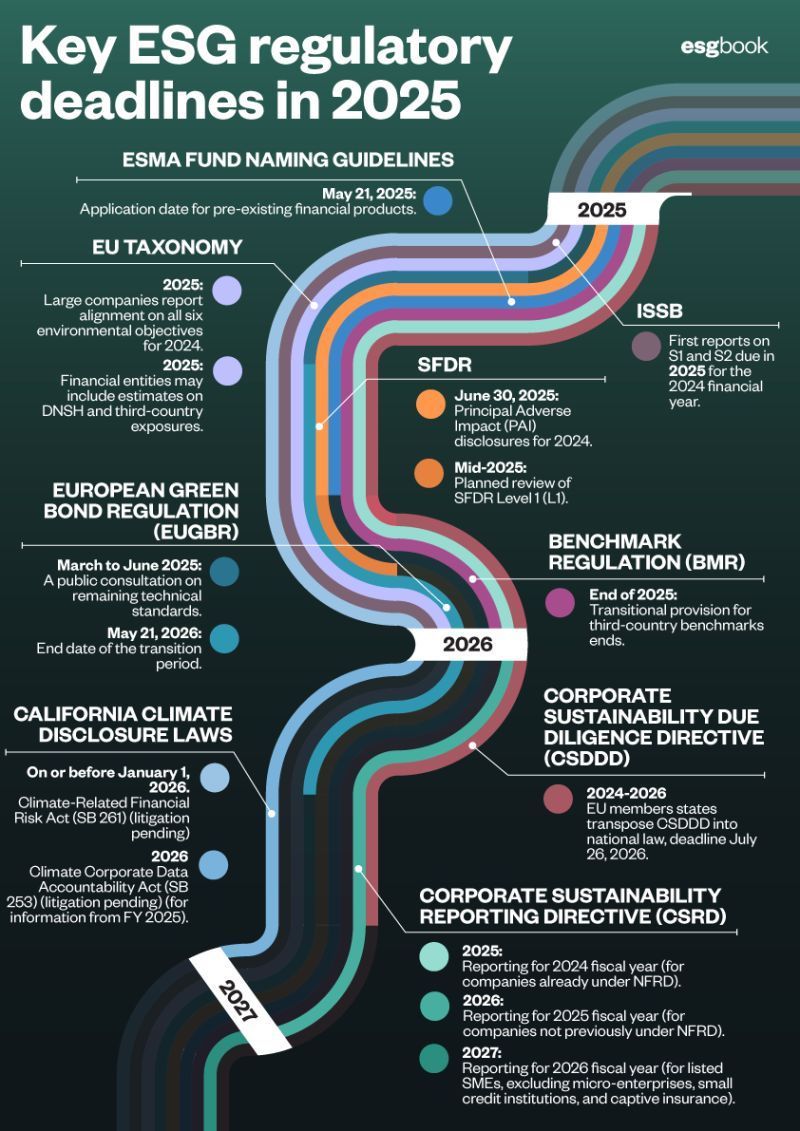

➡️ ...the EU's "Competitiveness Compass" which is delayed slightly (it was due on 15 Jan). This Compass is key for the Green Deal regulations as it sets out the broader “economic doctrine for the next five years", as Commission Executive Vice President Stéphane Séjourné recently put it (https://lnkd.in/dQTAB4T7).
➡️ ... the proposed "Clean Industrial Deal" (planned for 26 February). Together with the Competitiveness Compass, this new Deal will set the context for many of the EU's sustainability actions in the next five years. In essence, this new framework will merge sustainability and competitiveness concerns, as argued for by the Draghi Report in 2024.
➡️ ... the planned "Omnibus Simplification Package", with a proposal likely by 26 February. The omnibus is supposed to amend key EU regulations with the aim to reduce firms' reporting requirements (e.g., related to #CSRD and the #EUTaxonomy).
The Commission will publish its 2025 Work Programm on 11 February. This Programme will give further clues on where the journey goes. Thanks to ESG Book for the great overview of other key deadlines...
#esg, #sustainability, #eugreendeal
13-01-2025

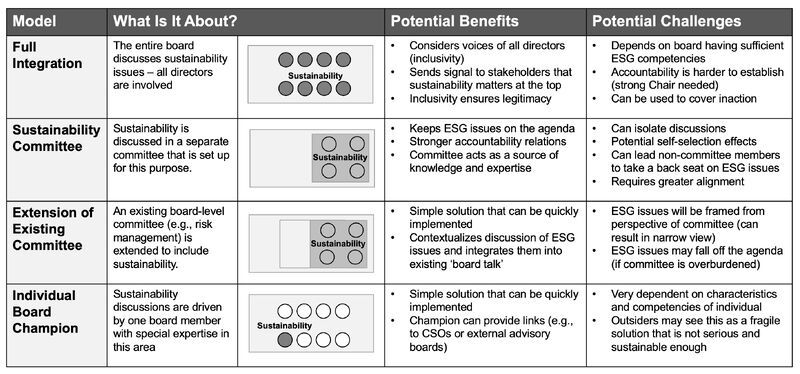

1️⃣ FULL INTEGRATION: Often, boards claim that they fully integrate sustainability into their discussions. While such an option is desirable, as it involves the entire board and embeds sustainability into routine decision making, it also requires a critical mass of competencies at board level. Often, these competencies do not exist (yet). Hence, full integration can also become a cover for insufficient integration.
2️⃣ SUSTAINABILITY COMMITTEE: Adding a sustainability committee can be a good idea. It keeps sustainability on the agenda and it can, for instance, be used to keep attention on highly material ESG issues. But, such committees can also isolate discussions and they need to link back well to the entire board.
3️⃣ EXTENSION OF COMMITTEE: Some boards extend existing committees (e.g., audit) so that these cover sustainability issues. In some cases, multiple committees are extended. This is a simple solution that can be quickly implemented. But it requires lots of coordination and the committee is likely to view sustainability from its own perspective (e.g., audit committee = focus on disclosures).
4️⃣ BOARD CHAMPION: Some boards appoint an individual director who is supposed to drive sustainability oversight. This is an easy solution that can be quickly implemented, and it can work in some contexts (e.g. if complexity is limited). But it all depends on the competencies of the individual, and also on how the whole board works with the individual input.
If you are interested in how boards can integrate sustainability, have a look at one of my recent papers: https://lnkd.in/dSAyrBnh
#sustainability, #esg, #boards
12-01-2025

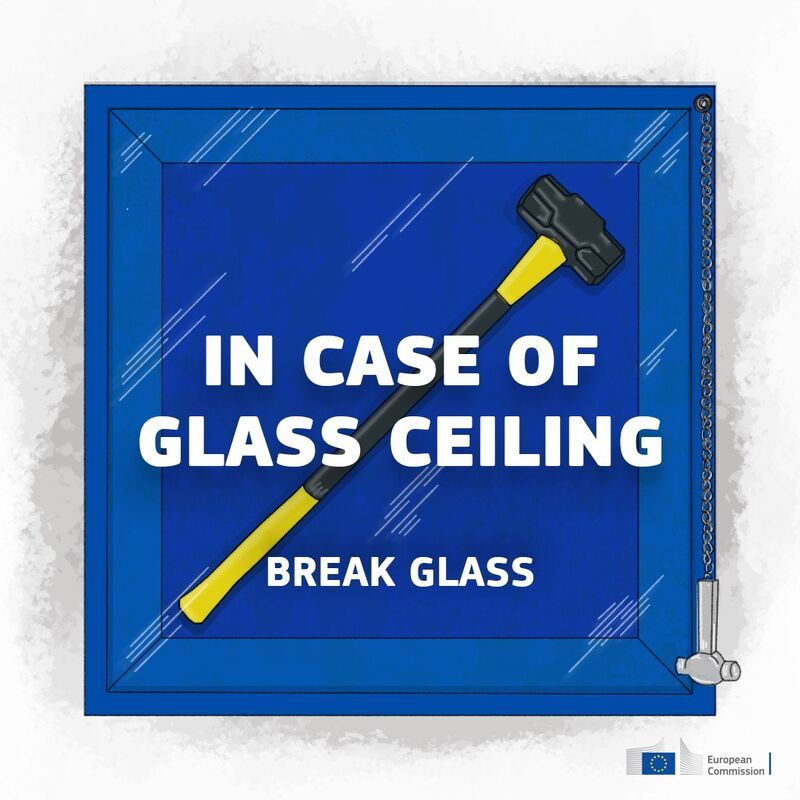

The Directive is an important and timely initiative: "In 2024, women accounted for 39.6% of the board members of the largest listed companies in countries with binding gender quotas, compared to 33.8% in countries with soft [voluntary] measures, and just 17% in countries that have taken no action at all."
The Directive also aims to make the appointment process of directors more transparent. For instance, candidates for director positions can request the specific qualification criteria upon which the selection was based and the "objective comparative assessment of the candidates under those criteria".
Downside: The scope of the Directive is limited as it applies only to EU-listed companies...
===
Link to Directive: https://lnkd.in/dPhD9Pwt
EU Press Release: https://lnkd.in/d7r3mnFD
#sustainability, #esg, #humanrights
08-01-2025

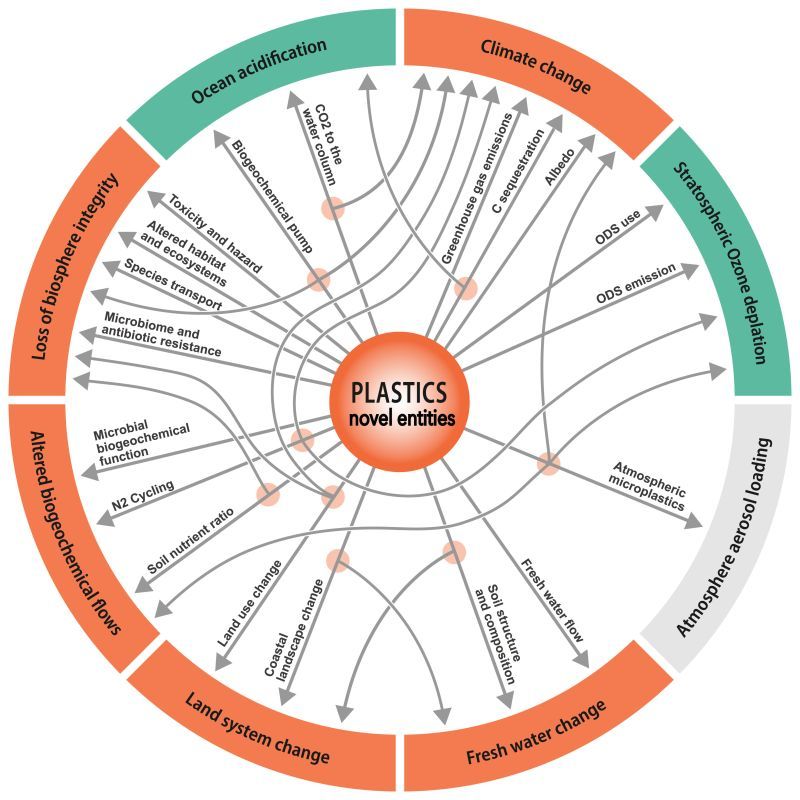

Effects are manifold: "Plastics pollution amplifies the impacts of other already breached planetary boundaries. Similarly, changes in other planetary boundaries (notably climate change, ocean acidification, and freshwater change) can intensify the pressures caused by plastics pollution on the world’s ecosystem."
The study uses the impact pathway concept and thus covers the entire life cycle of plastics, from raw-material extraction to production, consumption, disposal, and environmental release as a pollutant. The resulting picture exposes the significant and complex effects which are created by the over 450 million tonnes of plastics produced each year (of which only 9% are recycled).
❗ A stark reminder that one of the biggest missed opportunities in 2024 was the lack of an agreement on a global plastics treaty...
===
Full study (open access): https://lnkd.in/dW6_H6Xv
#sustainability, #planetaryboundaries, #plasticpollution
05-01-2025

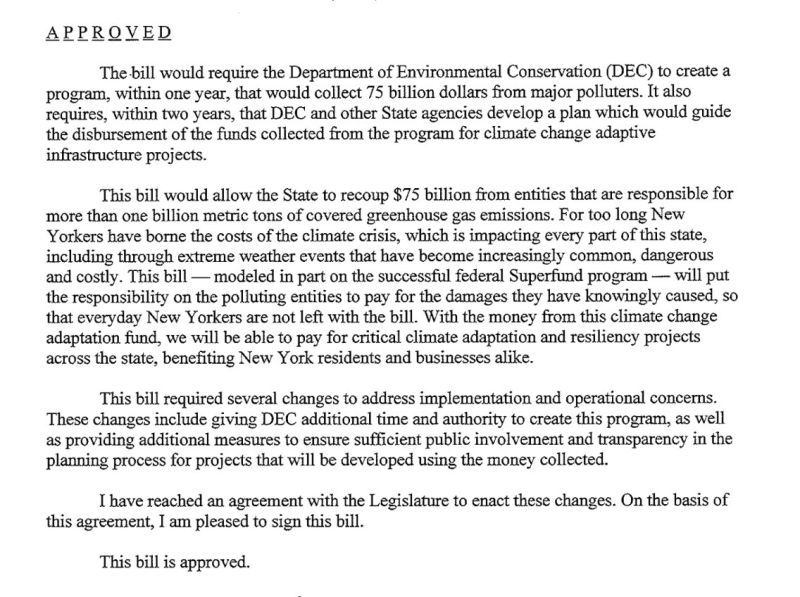

This new law is, as State Senator Liz Krueger, said: "a shot that will be heard around the world."
The new law is modelled on the polluter-pays principle and it is trying to ease the burden that the consequences of climate change create for the taxpayer. By 2050, New York estimates that adaptation measures and damages will cost the State more than half a trillion USD ($65,000 per household). The money raised will go into a fund to e.g. improve storm water drainage structures.
Of course, this law will be challenged in the courts - most likely around the question whether an individual US state can issue such legislation at all, or whether this reflects national climate policy. But, the direction of legislation is clear: Vermont passed a similar law earlier in 2024 and other US states (e.g., New Jersey) also have legislation in the pipeline.
This is an important step to hold those companies most responsible for the climate crisis accountable for their past actions.
===
Full legal text: https://lnkd.in/ddapFgnm
New York Times reporting: https://lnkd.in/dT3vD7-4
#climatechange, #sustainability, #climatefinance
04-01-2025

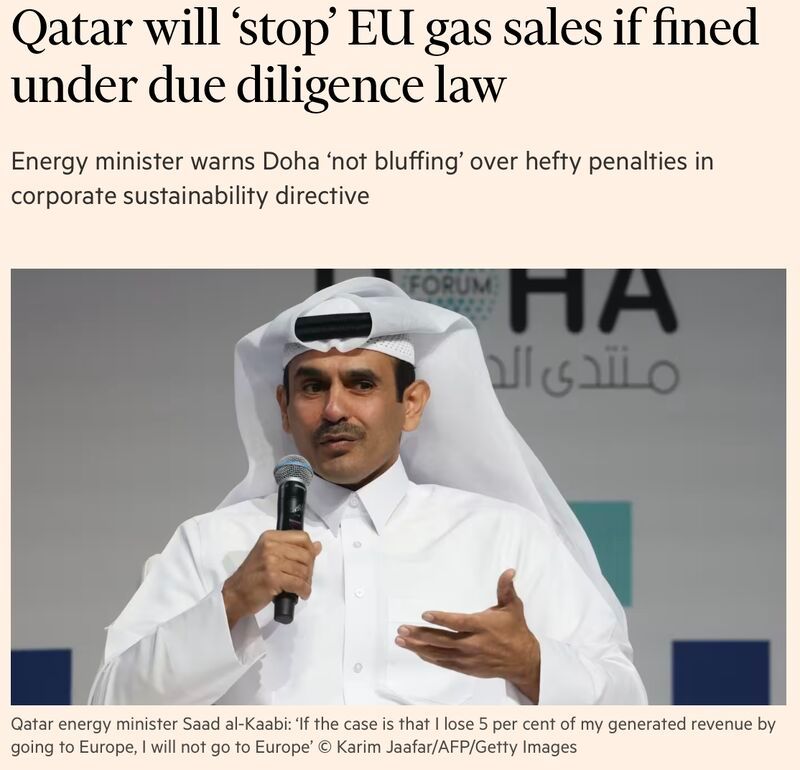

A bit of "#CSDDD bashing" to start the holiday season... Qatar is outraged about the CSDDD and threatens to stop providing gas to the EU if it would face non-compliance penalties under the new Directive. Qatar is afraid that its energy company (QatarEnergy) could be fined up to 5% of its net worldwide turnover.
Qatari energy minister Saad al-Kaab argued: "If they said that the penalty is 5 per cent of your generated revenue from that contract that you sell to Europe, I say, 'OK, I need to assess that. Does that make sense?! [...] But if you want to come to my total generated revenue, come on, it doesn't make any sense." For Qatar, this non-compliance scenario and the maximum(!) possible penalty seem to be the main reference point for discussing the Directive.
Saad al-Kaab also complained that the CSDDD requires due diligence on all of QatarEnergy's suppliers, with a global supply chain that involves "100,000" companies. "I probably need a thousand people with the size that I have and the billions we spend, or [would need to] shed millions on a service... to go and do audits on every supplier." This portrays the Directive in an incorrect (and rather populist) way. The CSDDD's risk-based approach to due diligence "allows companies to limit in-depth assessments of adverse impacts to those areas identified as high risk." (see CSDDD FAQ).
❗ But, the key problem for Qatar is likely not the CSDDD's scope but rather the necessity to adopt and put into effect a Climate Transition Plan compatible with the Paris Agreement (as per the CSDDD's Article 22).
===
FT Story: https://lnkd.in/d9AGGuwa
POLITICO Story: https://lnkd.in/dPNs85m9
#sustainability, #esg, #eugreendeal
02-01-2025

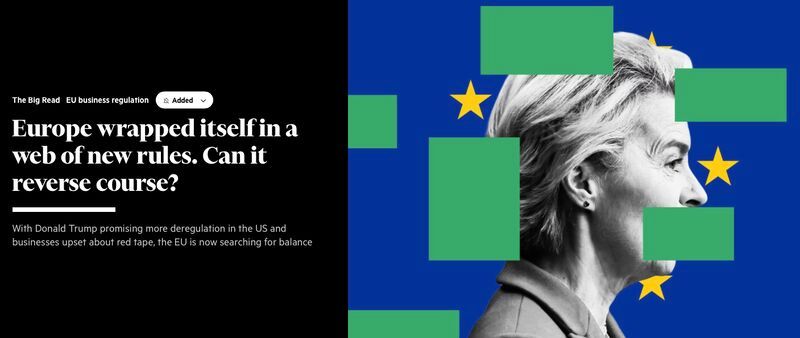

Between 2019 and 2024, the EU produced 13,942 legal acts, which obviously is a lot, also compared to other regions (the US had 5,927 pieces of legislation and resolutions during this time). But, why do we always single out sustainability rules like #CSRD, #CSDDD, #EUDR and the #EUTaxonomy from all these legal acts when discussing the potential for deregulation?
This introduces an unnecessary bias into the public debate and it gives the false impression that the only area where Europe can “afford” to deregulate is sustainability.
I agree: there is need to discuss how to better align regulations and reap efficiency gains where possible. But we need to do this in balanced way. Most of all: we need to keep the EU's own "Better Regulation" principles in mind (e.g., all proposals need to be evidence-based and stakeholder consultation needs to be a key element).
===
FT discussion of EU regulation: https://lnkd.in/dQF_74if
EU Better Regulation Guidelines: https://lnkd.in/djbEcjwH
#esg, #sustainability, #greendeal
27-12-2024

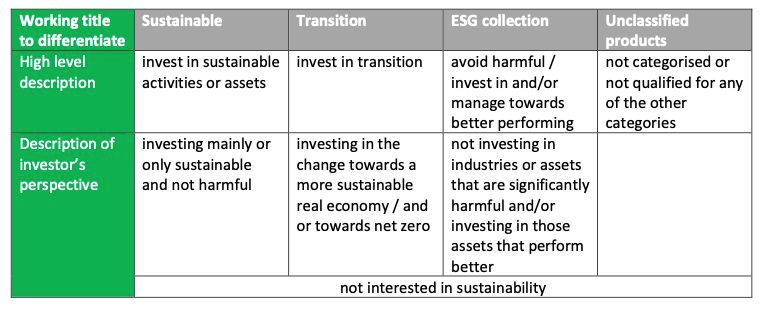

#SFDR Update: We may be moving from Article 8 and 9 financial products to a categorisation based on "sustainable", "transition", and "ESG collection" products, according to new recommendations by the EU Platform on Sustainable Finance.
Overall, the recommendations aim at tightening the product classification regime and introduce "precise minimum criteria, clearly defined objectives, and measurable KPIs."
➡️ For instance, "sustainable" products would need to meet a minimum percentage of taxonomy-aligned investments or Sustainable Investments (SFDR definition), and non-taxonomy-aligned investments in this category would need to pass Principal Adverse Impact thresholds (see pp. 7-12 for further details).
➡️ The new categories would also refer to Paris-aligned benchmark exclusions (for "sustainable") and Climate-transition benchmark exclusions (for "transition" and "ESG collection").
➡️ There is no "impact" category because it is recognised that there are limits to using impact as a criterion for products that are investing in secondary markets (e.g., stocks, bonds). This is mostly due to difficulties with assigning a causal link between such investments and bottom-line improvements (p. 13-14).
Product classifications under SFDR are tricky for so many reasons, but this new proposal makes some really good suggestions and charts a possible way forward.
===
Link to the Full Platform Briefing: https://lnkd.in/dpSqyj2D
#esg, #sustainablefinance
22-12-2024

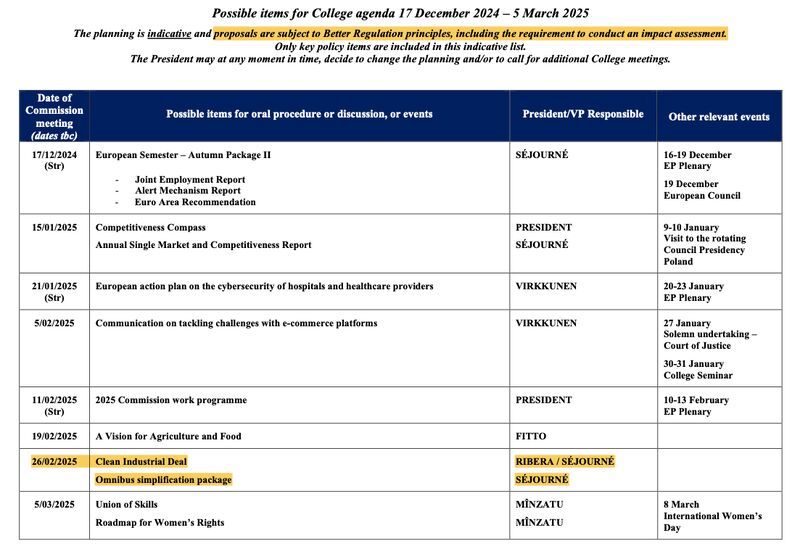

The planned #CSRD, #CSDDD, #EUTaxonomy "Omnibus Simplification Package" is on the agenda of the Commissioner College meeting for 26 February 2025. As stated in the text above the schedule (image below), all proposals are subject to the EU's "Better Regulation" principles. These principles point to issues that will be challenging in the context of the planned omnibus:
➡️ EVIDENCE: proposals need to be informed by an evidence-based approach, basing them on the "best available evidence". However, such evidence does not (yet) exist for the CSRD and CSDDD. We have some early CSRD implementation studies, while for CSDDD such studies cannot exist at this stage.
➡️ PROPORTIONATE NATURE: proposals need to be proportionate to the expected impacts. Such expected impacts, however, will be difficult to judge, as we lack reference points (e.g., evidence on existing long-term costs and benefits).
➡️ LEARNING: proposals should consider and be based on "learning from experience". But how can we learn from experience when, again, a systematic assessment of such experiences is limited at this stage?
I am fully supporting that we reap efficiency gains where these are available. But at this point in time the planned simplification package seems to reflect more short-term political manoeuvring than evidence-based policy making...
===
EU Better Regulation Guidelines: https://lnkd.in/djbEcjwH
#sustainability, #esg, #eugreendeal
19-12-2024

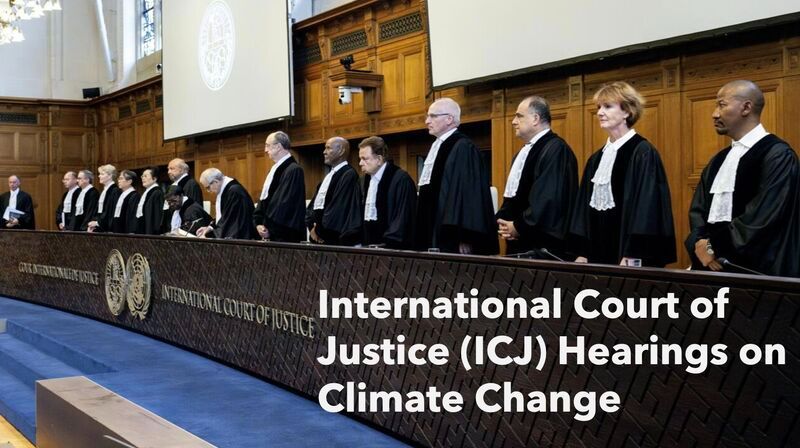

Second week of hearings on climate change at the International Court of Justice (ICJ). Many countries with high emissions have argued against (and even rejected) further legal responsibilities. Here comes a short summary of some of the positions:
1️⃣ #Australia, #Germany, and #SaudiArabia kicked it off (on 2 Dec) by arguing that States' obligations in relation to climate change were predominantly found in the Paris Agreement, basically arguing against additional legal duties. Germany's position is interesting as it shows the gap between its self-proclaimed climate leadership and the obligations under international law that it is willing to accept.
2️⃣ #China also pushed back in clear words: “GHG (greenhouse gas) emissions do not constitute internationally wrongful acts under general international law.” (https://lnkd.in/dnsC7fmm). #Brazil indicated that it does not bear any historic responsibility for climate change and pushed the burden to developed nations (a notion broadly shared by China).
3️⃣ The #UnitedStates argued for a very narrow focus of States' legal obligation based on existing agreements, also rejecting any further legal obligations. Both the US and #Russia refuted claims by smaller nations and stressed that there is no international legal protection for a right to a healthy environment (https://lnkd.in/dxM2NfyB).
Several other nations have fiercely argued against these positions by pointing to States' right to self-determination and the role of international law in protecting all people. The Hearing process will conclude on 13 Dec. By then over a 100 countries and organisations will have submitted their opinions...
===
Records from the Hearings: https://lnkd.in/d79GqfEE
Daily summary by PISFCC: https://www.pisfcc.org/
#climatechange, #humanrights, #sustainability
18-12-2024

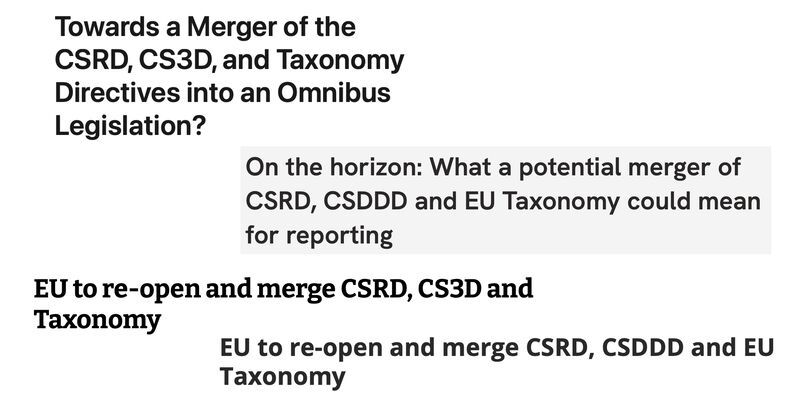

The planned EU omnibus does not "merge" the #CSRD, #CSDDD and the #EUTaxonomy as several media stories have claimed recently (see image). What the omnibus does is this: it amends all three regulations through the same legal process, but it does not merge or unify them in any way. This distinction is important because both are fundamentally different things.
As this recent article explains (https://lnkd.in/dkJUYdJR), making amendments to the three regulations through an omnibus is actually preferable over opening each individual file. The omnibus is more likely to keep the focus on aligning the three regulations and compromises will need to make reference to this broader focus.
However, as I have written elsewhere (https://lnkd.in/dSnNaPDk), significant risks still remain. There will be a blurry line between which changes count as efficiency improvements (these should be welcomed) and which changes reflect more substantive alterations.
Right now, the plan seems to be that the EU Commission releases a proposal for the "omnibus package" on 26 February 2025 (https://lnkd.in/dhT8f7Sk). This is reasonable given that the Budapest Declaration asked the Commission to implement concrete proposals on reducing reporting requirements in the first half of 2025.
#eugreendeal, #sustainability, #esg
14-12-2024

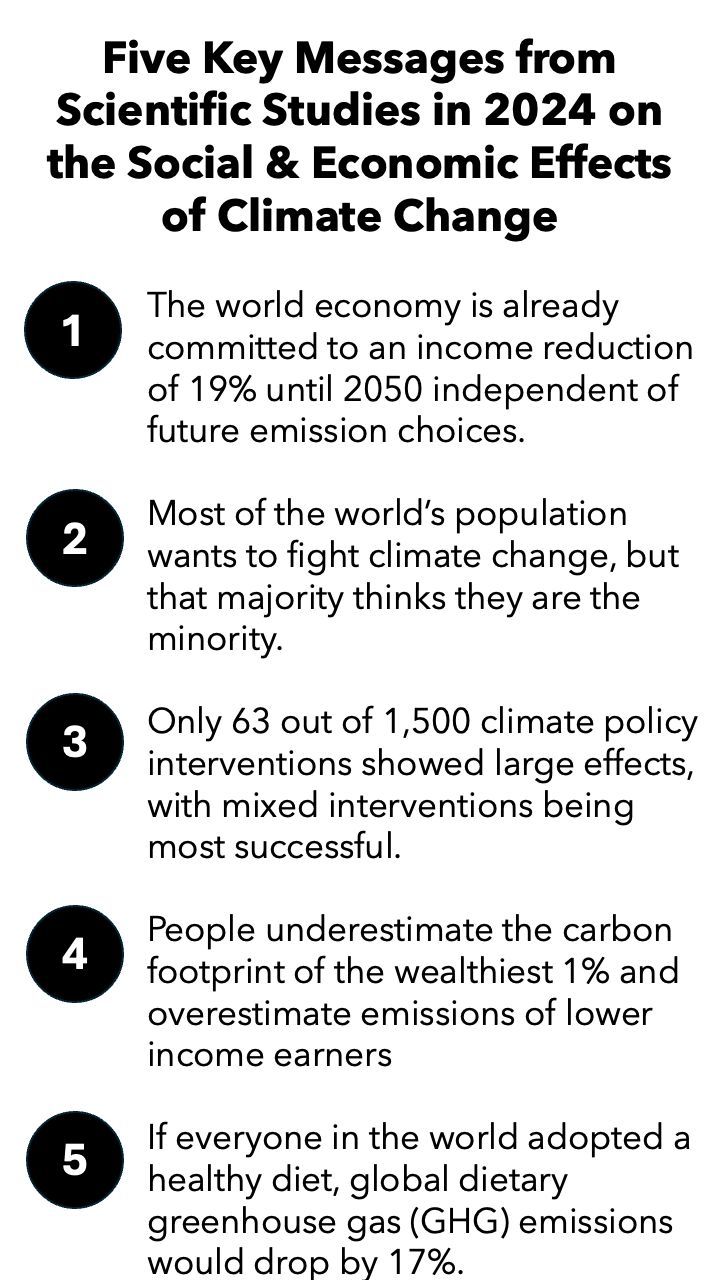

In 2024, we gained many excellent new insights into the social and economic effects of climate change. Here are my top five learnings from studies this year...
1️⃣ The world economy is already committed to an income reduction of 19% in the next 26 years independent of future emission choices. This corresponds to global annual economic damages in 2049 of $38 trillion. The damages are six times larger than the mitigation costs that are needed to limit warming to 2C, and countries least responsible for climate change will face most damages. Study in 'Nature': https://lnkd.in/dTg9xaPv
2️⃣ 69% of the world's population would contribute 1% of their monthly income to fight climate change, but only 43% believe that others would contribute as well. In other words, we systematically underestimate others' willingness to contribute to climate change. Study in 'Nature Climate Change': https://lnkd.in/d-jndW4M
3️⃣ Only a fraction of climate policy interventions produces significant results. The study assessed 1500 policies (e.g., subsidies) implemented between 1998 and 2022 across 41 countries. Only 63 policies showed large effects on reduced emissions. Successful emissions reductions rely on mixes of different interventions (e.g., tax and price incentives). Study in 'Science': https://lnkd.in/d7GdU6v3
4️⃣ People consistently underestimate the carbon footprint of the wealthiest 1% and overestimate emissions of lower income earners. People from the top 10% income segment perceived carbon footprint inequality to be significantly fairer than people from the general population. Study in 'Nature Climate Change': https://lnkd.in/dPMiCGaX
5️⃣ If everyone in the world adopted a healthy diet, global dietary GHG emissions would drop by 17%. "More than half (56.9%) of the global population, which is presently overconsuming, would save 32.4% of global emissions through diet shifts, offsetting the 15.4% increase in global emissions from presently underconsuming population." Study in 'Nature Climate Change': https://lnkd.in/dm2TrU_K
#sustainability, #climatechange
Activate to view larger image,
10-12-2024

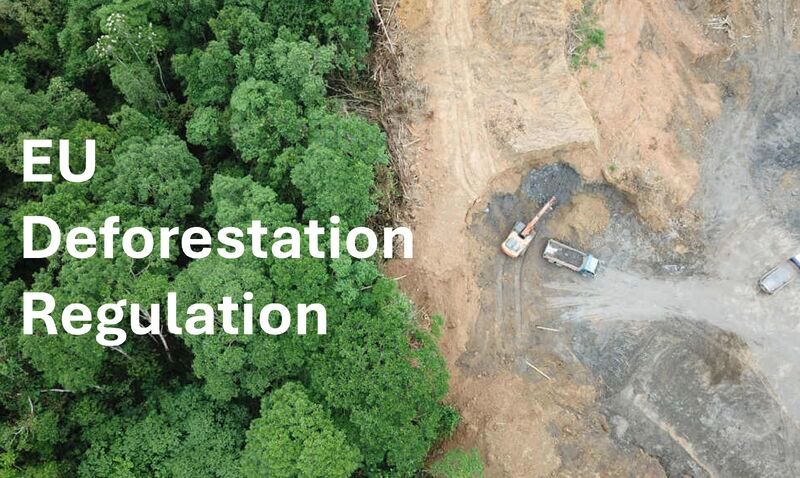

Last night, EU institutions reached an agreement to delay the deforestation law by one year (new application date: 30 Dec 2025), but the amendment does not include further substantive changes. So, in some sense, a partial success...
The original plan by the EPP to water down the regulation by introducing a "no risk" category did not make it into the amendment, as the EPP itself pulled this proposal at the last minute. Such a proposal would have jeopardised the entire law and it would have also raised questions around compatibility with WTO regulations.
Parliament and Council still need to endorse the agreement before the end of the year. Parliament will vote on it during the next session (16-19 Dec).
===
Council Statement: https://lnkd.in/d7PQdWU4
#sustainability, #deforestation, #eudr
02-12-2024

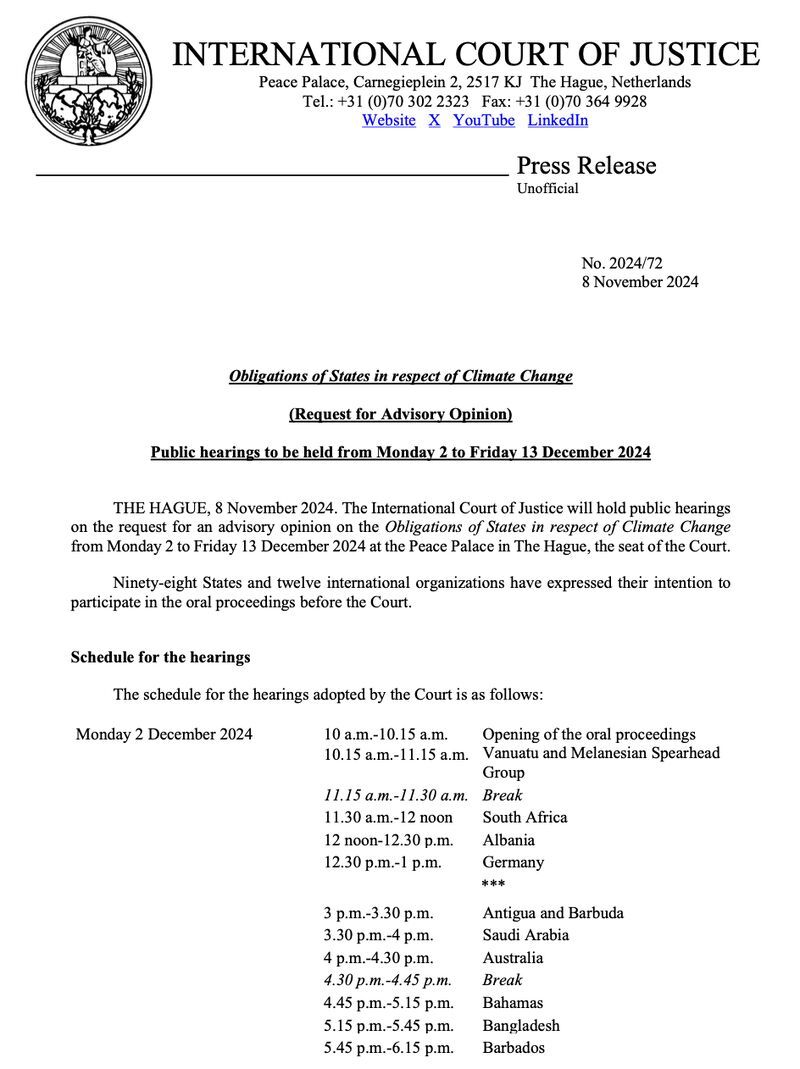

Today is an important day - the International Court of Justice (ICJ) starts to hear over 100 nations and organizations in order to produce a landmark Advisory Opinion that will assess whether actions responsible for climate change and its negative effects are lawful under international law.
Many expect that this opinion will act as a "legal blueprint" that will inform future climate litigation on the national and international levels. The Advisory Opinion was requested by the UN General Assembly on 29 March 2023, following a push by a global coalition of States led by the Republic of Vanuatu (https://lnkd.in/dUAGH_KB). The Advisory Opinion must answer two questions:
1️⃣ "What are the obligations of States under international law to ensure the protection of the climate system and other parts of the environment from anthropogenic emissions of greenhouse gases for States and for present and future generations?"
2️⃣ "What are the legal consequences under these obligations for States where they, by their acts and omissions, have caused significant harm to the climate system and other parts of the environment?”
This ICJ Advisory Opinion will be critical for judging what countries worldwide are legally required to do to combat climate change. It is reassuring to see that climate change has finally reached the UN's top court, after the European Court of Human Rights already ruled earlier this year that countries must better protect their people from the consequences of climate change.
ICJ hearings close 13 December 2024, and the advisory opinion is expected for 2025.
===
Read the full request by the UN towards the ICJ: https://www.icj-cij.org/sites/default/files/case-related/187/187-20230412-app-01-00-en.pdf
#climatechange, #sustainability, #humanrights
Today is an important day - the International Court of Justice (ICJ) starts to hear over 100 nations and organizations in order to produce a landmark Advisory Opinion that will assess whether actions responsible for climate change and its negative effects are lawful under international law.
Many expect that this opinion will act as a "legal blueprint" that will inform future climate litigation on the national and international levels. The Advisory Opinion was requested by the UN General Assembly on 29 March 2023, following a push by a global coalition of States led by the Republic of Vanuatu (https://lnkd.in/dUAGH_KB). The Advisory Opinion must answer two questions:
1️⃣ "What are the obligations of States under international law to ensure the protection of the climate system and other parts of the environment from anthropogenic emissions of greenhouse gases for States and for present and future generations?"
2️⃣ "What are the legal consequences under these obligations for States where they, by their acts and omissions, have caused significant harm to the climate system and other parts of the environment?”
This ICJ Advisory Opinion will be critical for judging what countries worldwide are legally required to do to combat climate change. It is reassuring to see that climate change has finally reached the UN's top court, after the European Court of Human Rights already ruled earlier this year that countries must better protect their people from the consequences of climate change.
ICJ hearings close 13 December 2024, and the advisory opinion is expected for 2025.
===
Read the full request by the UN towards the ICJ: https://lnkd.in/dtVP-pyN
#climatechange, #sustainability, #humanrights
NOV 2024

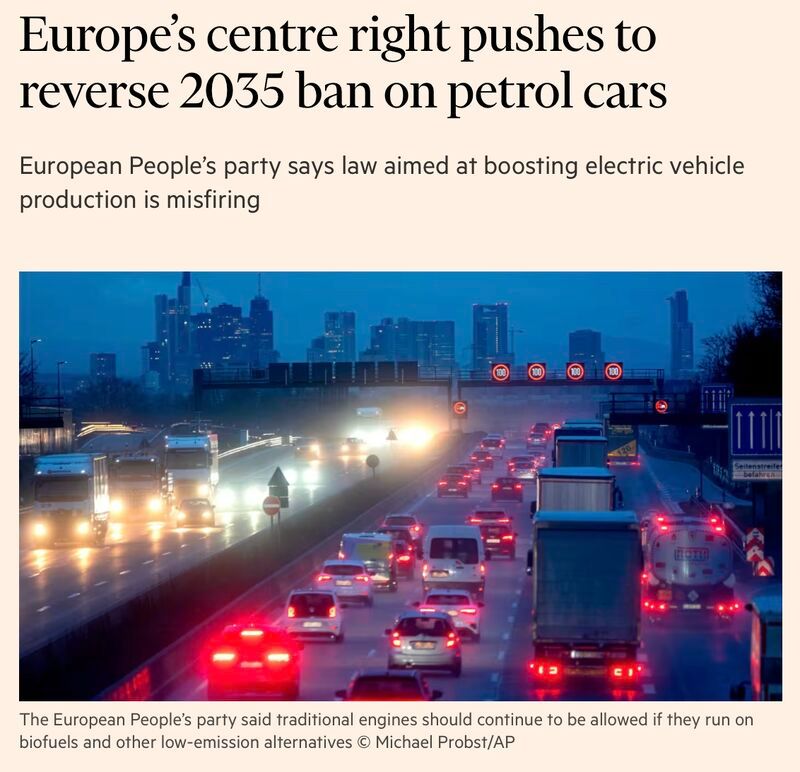

The biggest bloc in the European Parliament, the EPP, wants to reverse the 2035 ban on petrol cars. This is a shortsighted move (for environmental and economic reasons). The EPP argues: "We should be driven by economic realism and remain technologically neutral." But, we cannot remain technologically neutral if we want to become carbon neutral...
The problem is not this law. The problem is that none of the major European car manufacturers have been capable of producing electric vehicles that can compete on the global market. We do not make car manufacturers more competitive by protecting backward technology, especially as companies have invested billions already. The car industry needs predictability to invest in EV-related innovations, and politicians must ensure that car manufacturers face a fair economic environment (the EU's tariffs on Chinese EVs support this).
Wopke Hoekstra (the EU's climate chief) made clear that he intends to stick to the 2035 deadline during his parliamentary hearing. So, it will be another political battle related to the Green Deal...
===
FT Story: https://www.ft.com/content/61a769cc-478e-4935-9c22-10600710afd1#myft:my-news:page
EPP Group position: https://www.eppgroup.eu/newsroom/revise-the-combustion-engine-ban
#eugreendeal, #climatechange
The biggest bloc in the European Parliament, the EPP, wants to reverse the 2035 ban on petrol cars. This is a shortsighted move (for environmental and economic reasons). The EPP argues: "We should be driven by economic realism and remain technologically neutral." But, we cannot remain technologically neutral if we want to become carbon neutral...
The problem is not this law. The problem is that none of the major European car manufacturers have been capable of producing electric vehicles that can compete on the global market. We do not make car manufacturers more competitive by protecting backward technology, especially as companies have invested billions already. The car industry needs predictability to invest in EV-related innovations, and politicians must ensure that car manufacturers face a fair economic environment (the EU's tariffs on Chinese EVs support this).
Wopke Hoekstra (the EU's climate chief) made clear that he intends to stick to the 2035 deadline during his parliamentary hearing. So, it will be another political battle related to the Green Deal...
===
FT Story: https://lnkd.in/dvmXXh3q
EPP Group position: https://lnkd.in/dxHzeP7D
#eugreendeal, #climatechange
NOV 2024

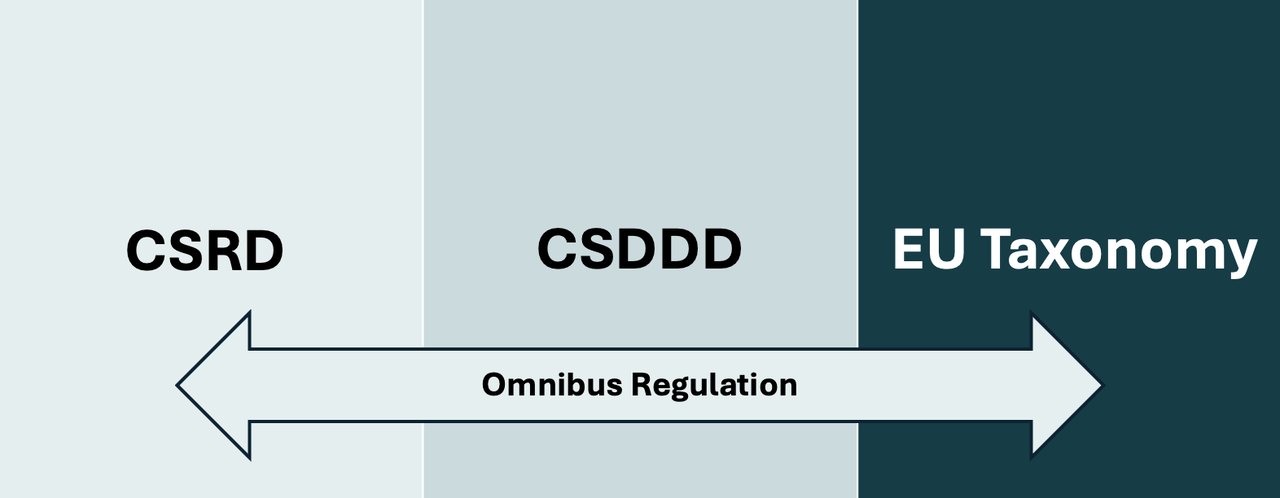

My reflections on the current stage of the planned #CSRD, #CSDDD, #EUTaxonomy omnibus.
In the article below, I discuss four significant risks that are attached to such a proposal. In one sentence: The omnibus would be an (1) unfocused attempt at the (2) wrong time creating (3) uncertainty for business and reintroducing the risk of (4) watering down the regulations. I unpack each of the four risks and likely consequences for companies and the regulatory process.
The Political Guidelines for the 2024-2029 EU Commission carry the title "Europe's Choice" ( https://commission.europa.eu/document/download/e6cd4328-673c-4e7a-8683-f63ffb2cf648_en?filename=Political%20Guidelines%202024-2029_EN.pdf ). Creating risks around three important sustainability regulations should not be the Commission's choice...
Read the article: https://www.linkedin.com/pulse/eus-csrd-csddd-taxonomy-omnibus-four-arguments-why-bus-rasche-owiaf/
#sustainability, #esg, #eugreendeal
My reflections on the current stage of the planned #CSRD, #CSDDD, #EUTaxonomy omnibus.
In the article below, I discuss four significant risks that are attached to such a proposal. In one sentence: The omnibus would be an (1) unfocused attempt at the (2) wrong time creating (3) uncertainty for business and reintroducing the risk of (4) watering down the regulations. I unpack each of the four risks and likely consequences for companies and the regulatory process.
The Political Guidelines for the 2024-2029 EU Commission carry the title "Europe's Choice" ( https://commission.europa.eu/document/download/e6cd4328-673c-4e7a-8683-f63ffb2cf648_en?filename=Political%20Guidelines%202024-2029_EN.pdf ). Creating risks around three important sustainability regulations should not be the Commission's choice...
Read the article: https://www.linkedin.com/pulse/eus-csrd-csddd-taxonomy-omnibus-four-arguments-why-bus-rasche-owiaf/
#sustainability, #esg, #eugreendeal
NOV 2024

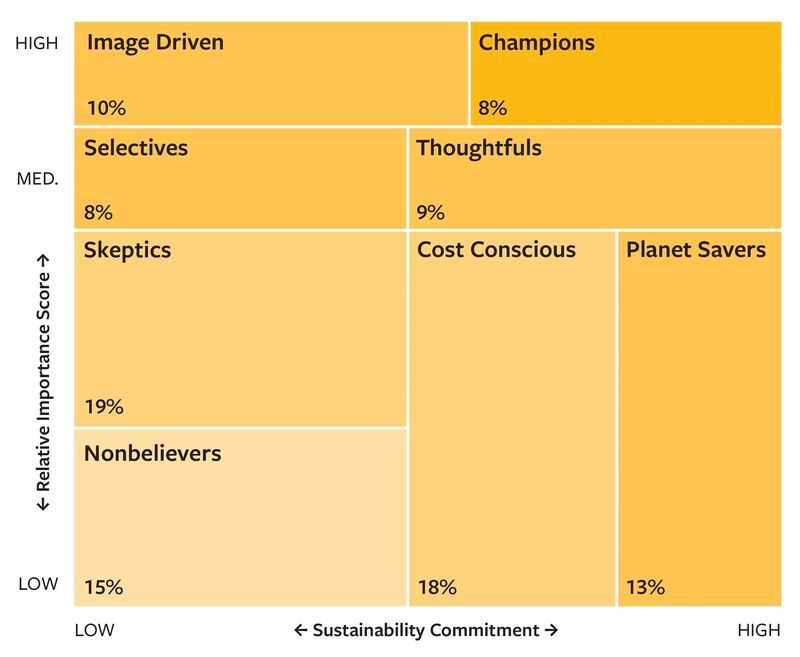

New research shows the diversity of ways in which consumers relate to sustainability. Often, we tend to think of the 'stereotypical' sustainable consumer as someone with high passion and high willingness to pay. But sustainability relates to consumers in many ways based on their relative willingness to pay more and their overall commitment towards sustainability.
This more nuanced segmentation shows that consumers at the extremes (i.e. champions and nonbelievers) only account for 23% of the population. It is the 77% of consumers in the other six archetypes that are interesting - they face different barriers that need to be better taken into account (e.g., product access and affordability). Other research showed, for instance, consumers often assume that sustainable products are more expensive than they actually are ( https://www.bcg.com/publications/2022/consumers-are-the-key-to-taking-sustainable-products-mainstream ) - so communication is key.
Bottom line is that there is not THE sustainable consumer, but a variety of consumer clusters that relate to sustainability in different ways based on how they mix considerations around brand, price, quality, and sustainability.
===
Full study: https://sloanreview.mit.edu/article/the-myth-of-the-sustainable-consumer/
Note: The study only looked at Europe and North America (n=8,000) and rests on qualitative and quantitative data. Demographic factors (location, gender, income) had no significant influence on the archetypes.
#sustainability, #esg
New research shows the diversity of ways in which consumers relate to sustainability. Often, we tend to think of the 'stereotypical' sustainable consumer as someone with high passion and high willingness to pay. But sustainability relates to consumers in many ways based on their relative willingness to pay more and their overall commitment towards sustainability.
This more nuanced segmentation shows that consumers at the extremes (i.e. champions and nonbelievers) only account for 23% of the population. It is the 77% of consumers in the other six archetypes that are interesting - they face different barriers that need to be better taken into account (e.g., product access and affordability). Other research showed, for instance, consumers often assume that sustainable products are more expensive than they actually are ( https://www.bcg.com/publications/2022/consumers-are-the-key-to-taking-sustainable-products-mainstream ) - so communication is key.
Bottom line is that there is not THE sustainable consumer, but a variety of consumer clusters that relate to sustainability in different ways based on how they mix considerations around brand, price, quality, and sustainability.
===
Full study: https://sloanreview.mit.edu/article/the-myth-of-the-sustainable-consumer/
Note: The study only looked at Europe and North America (n=8,000) and rests on qualitative and quantitative data. Demographic factors (location, gender, income) had no significant influence on the archetypes.
#sustainability, #esg
NOV 2024

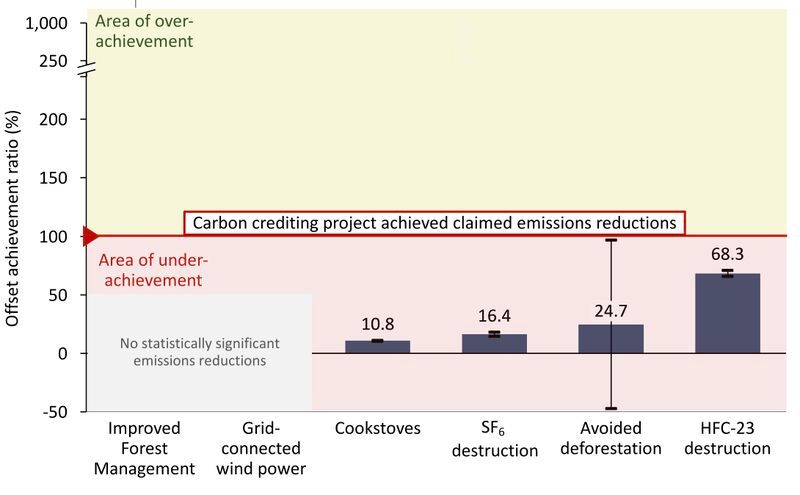

Less than 16% of issued carbon credits reflect real emission reductions, according to a large-scale systematic assessment of carbon crediting projects that was just published in 'Nature Communications'. The study looked at 2,346 mitigation projects which together account for nearly 1 billion tons of CO₂ (19% of all issued credits).
But the "offset achievement ratio" (OAR) differs significantly across project categories: Wind power projects in China and improved forest management in the US showed no statistically significant emission reductions, while avoided deforestation achieved a ratio of 25% and SF6 destruction 16%. Even the best performing project category (HFC-23 abatement) only achieved a 68% OAR.
"Our assessment highlights that many project developers pick favourable data or make unrealistic assumptions. Some methodologies make use of outdated data or inappropriate methodological approaches, which can lead to adverse selection or perverse incentives." These problems lead to many non-additional projects being registered.
A stark reminder that carbon crediting systems need much better mechanisms to cope with adverse selection problems...
===
Full study (open access): https://www.nature.com/articles/s41467-024-53645-z
#climatechange, #sustainability, #carboncredits
NOV 2024

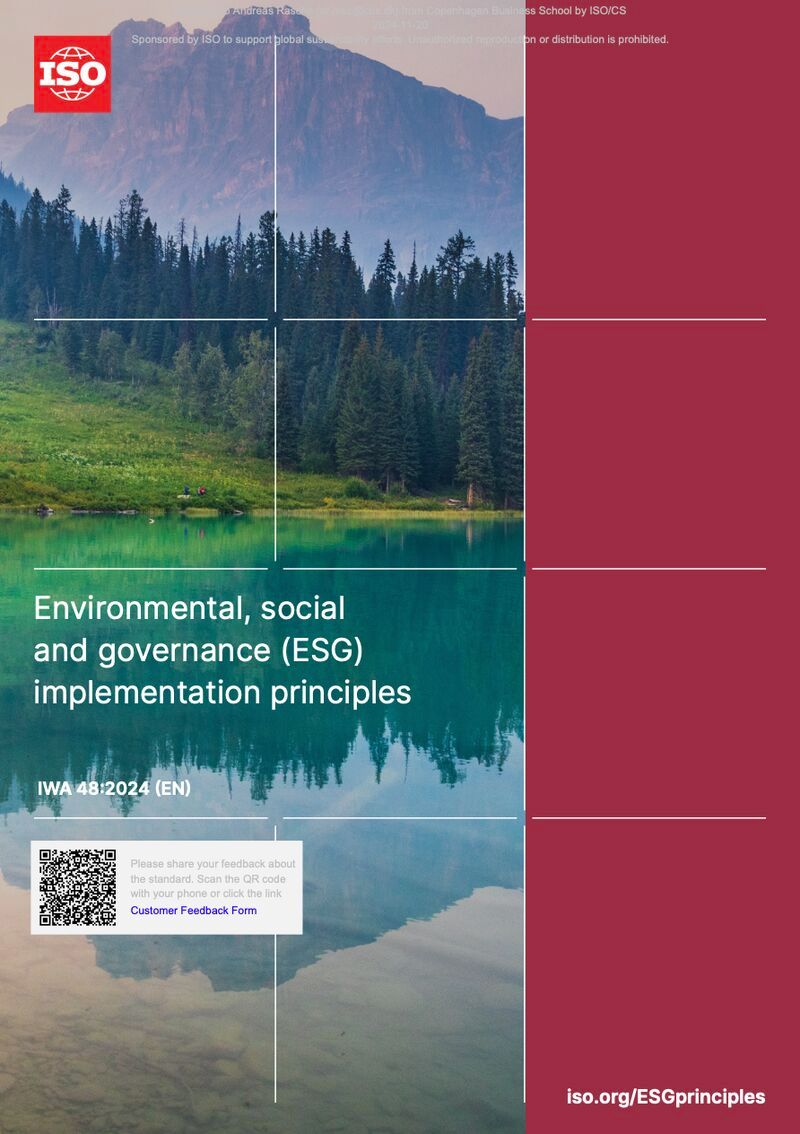

ISO launched a new standard focused on ESG implementation principles (ISO IWA 48:2024). Considering that, globally speaking, ESG practices are still fragmented, a standard that provides structure and outlines key processes makes sense. It reads a bit like an "ESG 101" - an introduction to the field.
Although I doubt that such a document in itself can standardise language and processes (without further enforcement by policy makers), it is a welcome reference point, for instance: (1) for those in organizations who increasingly get in touch with ESG debates and need an introduction, (2) for smaller firms that seek initial guidance on how to set up structures and processes, and (3) for non-business entities that come into touch with ESG debates. ISO points out that the standard is explicitly designed for and applicable to different types of organizations, not just large corporations.
While ISO IWA 48 rightly claims that ESG is not just about reporting and that the focus is on embedding relevant practices into an organisation's culture, there is relatively little in the standard on how to shape such a culture. Of course, cultural transformations cannot (and should not) be standardised, but still more specific things could have been said on this topic...
===
Access ISO IWA 48: https://www.iso.org/obp/ui/en/#iso:std:iso:iwa:48:ed-1:v1:en
#sustainability, #esg
NOV 2024

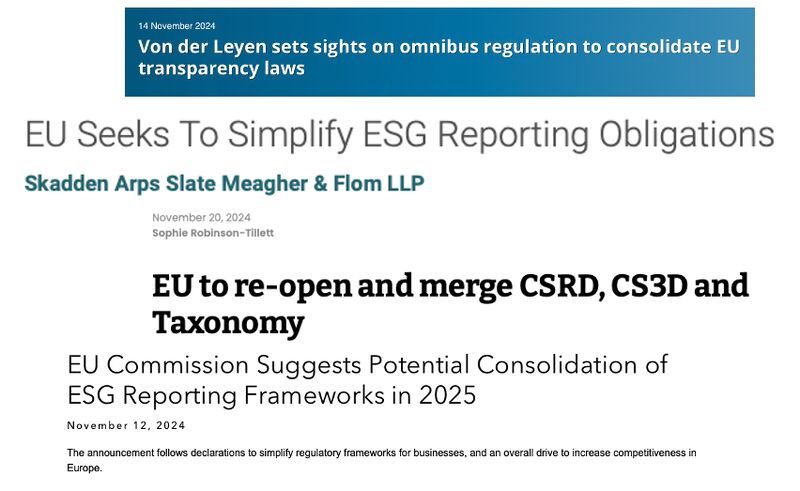

Commission President von der Leyen commented on plans to streamline and consolidate #CSRD, #CSDDD, and the #EUTaxonomy by potentially introducing an "omnibus regulation". This is deeply concerning as it may weaken these Green Deal regulations.
At a recent press conference, von der Leyen discussed plans to reduce bureaucracy. “We will look, for example, at the triangle [of the] Taxonomy, CSRD, CS3D.” But she also stressed that the content of the regulations is "good". “We want to maintain it, and we will maintain it. But the way we get there, the questions we are asking, the data points we are collecting – thousands of them – is too much. Often redundant, often overlapping.” ( https://real-economy-progress.com/eu-to-re-open-and-merge-csrd-cs3d-and-taxonomy/ )
Such an omnibus regulation would enact the Budapest Declaration ( https://www.consilium.europa.eu/en/press/press-releases/2024/11/08/the-budapest-declaration/ ) in which the Council asked the Commission to make proposals to reduce reporting obligations by at least 25% in the first half of 2025. An omnibus regulation consolidates or amends multiple other regulations into one document. So, omnibus in the sense of: "covering multiple areas".
Such a move would create legal uncertainty into an area where companies are just starting to build up capacity (and hence it would reward laggards). Further, the legal effects on the three regulations are uncertain. If the omnibus regulation follows the traditional legal path, the Council and Parliament can amend a Commission proposal. Especially the new Parliament may use a "consolidation" as a pretext to weaken the regulations in substantive ways.
So far, the Commission has not officially communicated any position. So, at this stage these are media reports based on a press conference. But, politics moves fast and it can be a dirty game...
===
Links to some press articles:
https://real-economy-progress.com/eu-to-re-open-and-merge-csrd-cs3d-and-taxonomy/
https://www.lexology.com/library/detail.aspx?g=b061ce07-0a2c-41c4-bc57-0bf7a323167f
https://www.lw.com/en/insights/eu-commission-suggests-potential-consolidation-of-esg-reporting-frameworks-in-2025
#sustainability, #esg
NOV 2024

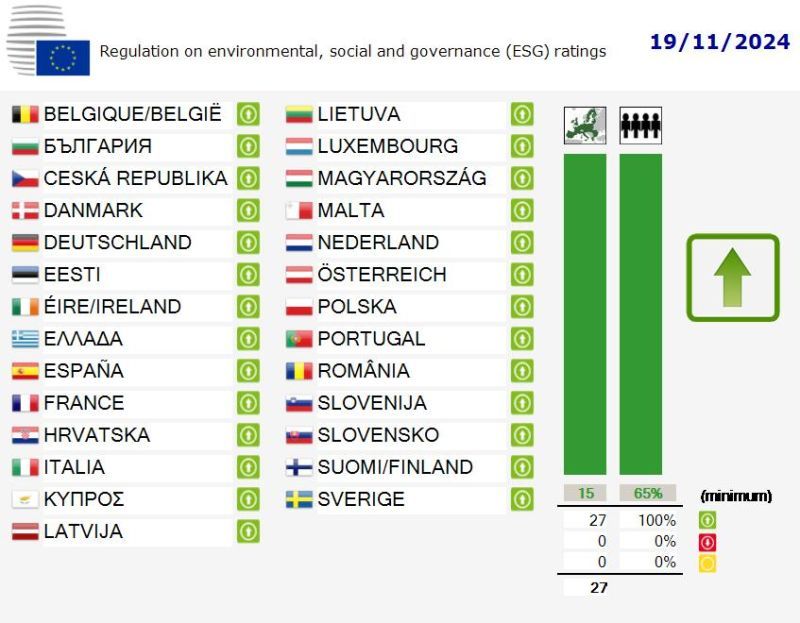

The European Council unanimously approved the new ESG ratings regulation. This was the final legal step. The regulation will now be published and then apply 18 months after publication (so in 2026).
1️⃣ ESG rating providers will be authorised and supervised by the European Securities and Markets Authority (ESMA) and must comply with transparency requirements, as a minimum disclosing "the methodology, models, and key rating assumptions."
2️⃣ Rating providers' different business activities need to be separated, but regulators leave a backdoor open: no separate legal entities need to be created if raters can show that activities are separated and no conflicts of interest exist.
3️⃣ Separate E, S, and G ratings should be provided. If a single ESG rating is provided, rating providers need to disclose the rate and weight attributed to each dimension.
4️⃣ If ESMA finds that a rater has intentionally or negligently infringed the Regulation, it should adopt a fine (max 10% of total annual net turnover).
At the same time, the UK regulator has also released and updated draft legislation to regulate ESG ratings. Good to see that the market, which some described as the "Wild West", is getting some more transparency requirements...
===
EU Regulation (final text): https://www.consilium.europa.eu/en/documents-publications/public-register/public-register-search/?WordsInSubject=&WordsInText=&DocumentNumber=43%2F24&InterinstitutionalFiles=&DocumentTypes=&DateFrom=&DateTo=&MeetingDateFrom=&MeetingDateTo=&DocumentLanguage=EN&OrderBy=DOCUMENT_DATE+DESC
UK Regulation (draft text): https://www.gov.uk/government/consultations/future-regulatory-regime-for-environmental-social-and-governance-esg-ratings-providers
#sustainability, #esg, #sustainablefinance
NOV 2024

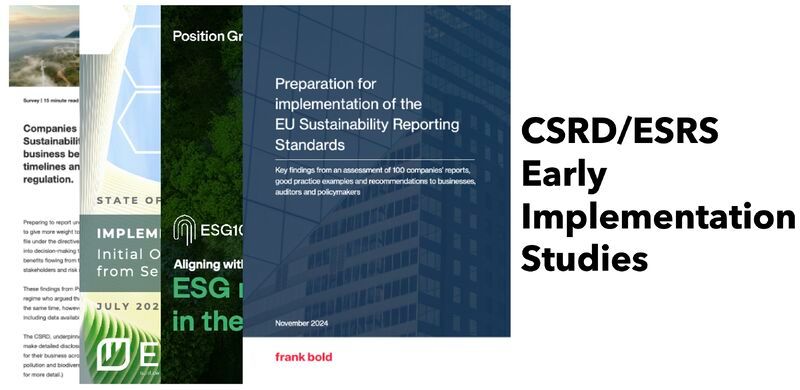

Studies on early #CSRD / #ESRS implementation point towards many challenges. Here comes an overview of key insights from four studies conducted in 2024. Studies include: EFRAG (n=28 firms), Frank Bold (n=100 firms), Position Green (n=400 firms), and PwC (n=547 managers). These studies differ in terms of aims and methods, so results cannot be compared directly. But the findings show some common challenges:
1️⃣ DOUBLE MATERIALITY: The EFRAG data shows that firms adopt a thorough and analytical DMA approach, but it is also this very approach that brings challenges, for instance the lack of specific data. Frank Bold's results point in a similar direction showing that many firms do not specify what types of impacts they have within their material topics.
2️⃣ REPORTING GAPS: Disclosures for "new" topic areas is a challenge (i.e. areas not yet part of existing reporting). The studies by Position Green and Frank Bold reveal significant gaps in terms of biodiversity reporting. Likewise, PwC's findings show that biodiversity was the topic for which managers expressed the lowest level of confidence for meeting reporting requirements.
3️⃣ ORGANISATIONAL CHALLENGES: The results by PwC show that CSRD implementation is approached as a cross-functional effort that reaches beyond the sustainability unit. But, this brings new organizational challenges, which the EFRAG study summarised as being about the need for "clear governance" and "upskilling".
These early results give good insights into those areas where implementation challenges likely exist. Many more details in the four studies...
===
Note: Due to the CSRD's scope, the four studies focus mostly on larger companies, as these are the ones that need to file reports in 2025.
Frank Bold: https://lnkd.in/d-tQkBTv
PwC: https://lnkd.in/dqfNjFW7
Position Green: https://lnkd.in/d3Jy8bf5
EFRAG: https://lnkd.in/dpsM_UX6
#sustainability, #esg
NOV 2024

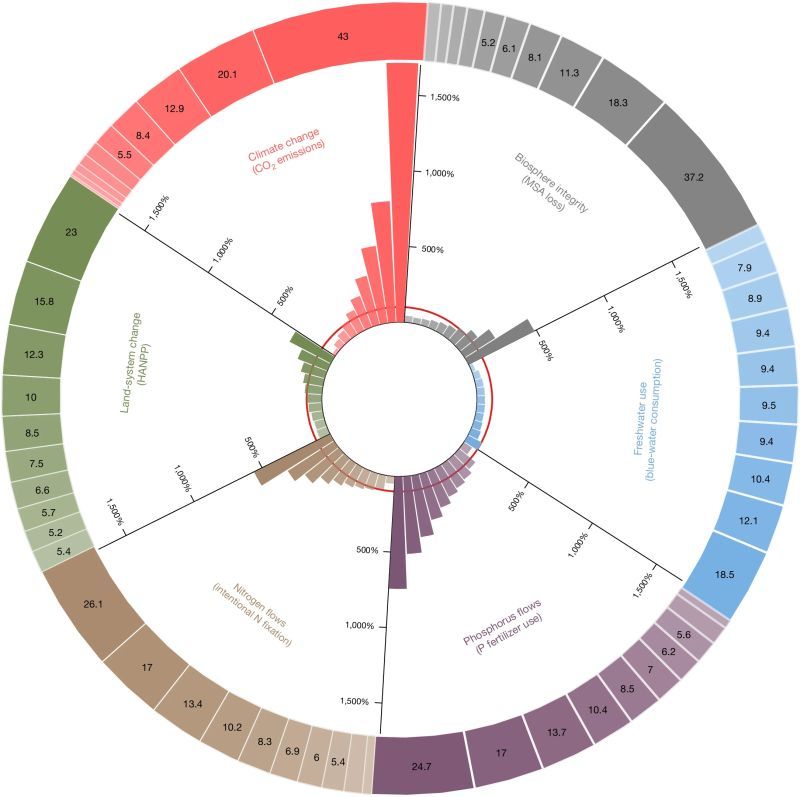

Overconsumption drives the transgression of several planetary boundaries, according to a new study in 'Nature'. Significant parts of the planetary boundary breaching responsibility can be attributed to the global top 10% and top 20% of consumers. The data is based on a global expenditure database that includes up to 201 consumption groups across 168 countries.
"The world’s top 10% of consumers were responsible for 51%, 48%, 38%, 31% and 67% of the PB transgressions in terms of climate change, land-system
change, N flows, P flows and biosphere integrity, respectively."
If the global top 20% of consumers would adopt effective mitigation measures, they could yield a reduction of 25%-53% in environmental pressure. In such a scenario, just focusing on the food and services sectors would be sufficient to push land systems change and biosphere integrity back within their boundaries.
===
Full study (open access): https://www.nature.com/articles/s41586-024-08154-w
#sustainability, #planetaryboundaries
NOV 2024

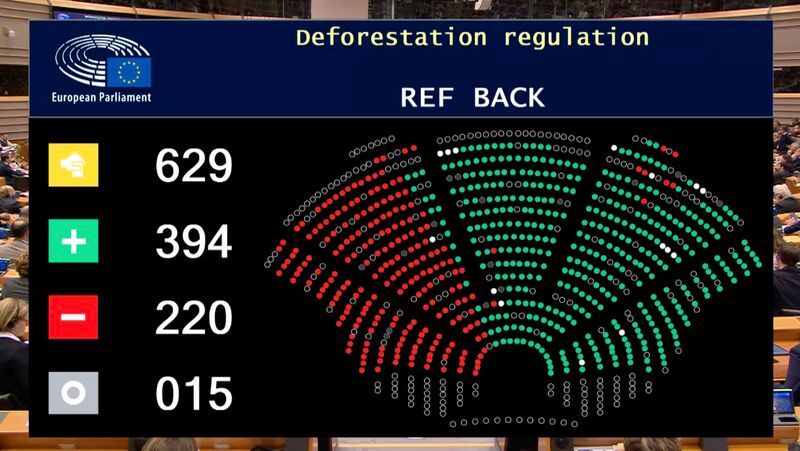

Update on EU Deforestation Regulation: EPP backtracked on the two-year extension. But today's vote still approved the creation of "no risk" categories (by a narrow margin). Belgian, Irish and part of the Dutch EPP had expressed their opposition to some of the centre-right group's proposed changes.
EUDR now goes back into trilogue on the "no risk" category. It will be interesting to see whether agreement can be reached by January 2025.
Voting was pure chaos as some of the voting machines did not work. One MEP argued that this calls into question the entire vote. #EUDR, #greendeal
Story on EPP backtracking before vote: https://www.euractiv.com/section/agriculture-food/news/epp-backtracks-on-two-year-delay-for-eudr-trader-exemption-ahead-of-vote/
NOV 2024

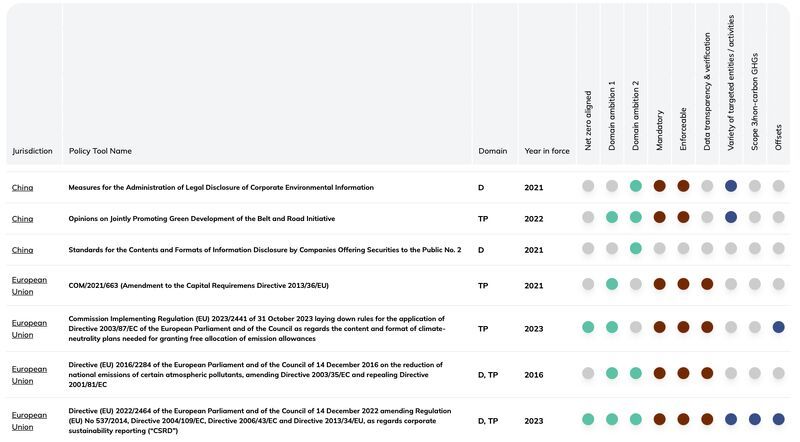

The University of Oxford has launched a great new tool: the "Climate Policy Monitor" which assesses how ambitious, stringent, and comprehensive the net-zero regulations of 30 countries are. The 2024 Monitor, which assessed 265 regulations in these countries, uncovers significant gaps:
1️⃣ DISCLOSURE: Only 17 jurisdictions mandate firms to disclose emissions across their entire value chains (Scope 3' emissions).
2️⃣ TRANSITION PLANS: Although many countries demand companies to lay out transition planning (describing how they actually meet climate pledges), only 20% of the assessed regulations require actual implementation of the plans.
3️⃣ PUBLIC PROCUREMENT: While many countries have created rules to align government procurement spending with climate goals, there is a lack of clear standards on how to operationalise these requirements.
The good news: climate-related regulations and policies are growing. The bad news: way too many gaps remain in terms of enforcement and clarity.
Considering that the assessed countries reflect most of the main emitters (US, China, EU, India, UK) the results expose those areas where pressure on regulators needs to increase. Because the mere existence of many regulations does not fix it...
===
Access the Monitor: https://climatepolicymonitor.ox.ac.uk/
#climatechange, #sustainability, #netzero
NOV 2024

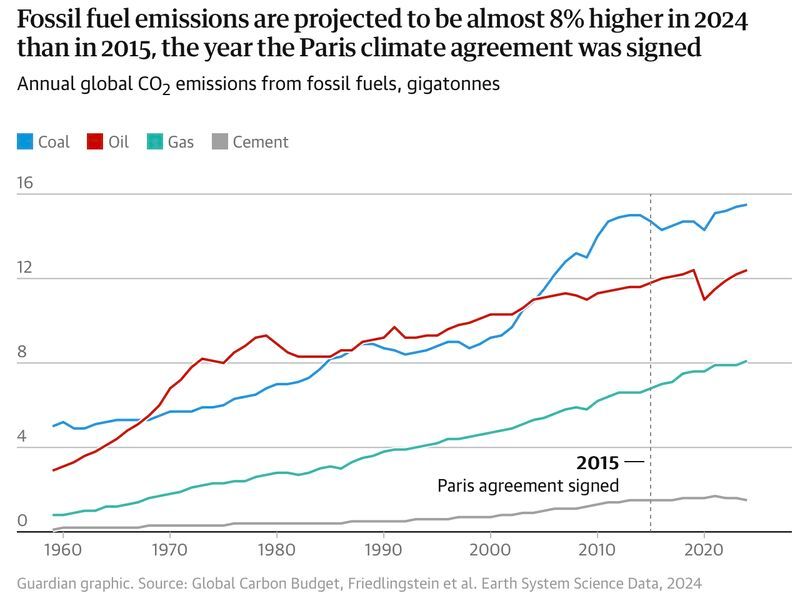

CO2 emissions from fossil fuels have increased by 0.8% in 2024, according to new data released at #COP29 earlier today. For 1.5°C, which is only a theoretical goal at this stage, emissions would need to fall by 43% by 2030. No sign of "transitioning away..."
The "Global Carbon Budget 2024" calculations show that 37bn tonnes are expected to be emitted in 2024 (4 million tonnes a minute). Despite progress in clean energy, growth in natural gas and oil use pushes global fossil emissions up. Coal emissions are also projected to increase (0.2%).
Although there is a slowdown in the increase in global fossil CO2 emissions, there is no indication yet that the burning of fossil fuels has peaked...
===
Full Paper: https://essd.copernicus.org/preprints/essd-2024-519/
The Guardian: https://www.theguardian.com/environment/2024/nov/13/no-sign-of-promised-fossil-fuel-transition-as-emissions-hit-new-high
#sustainability, #climatechange
NOV 2024

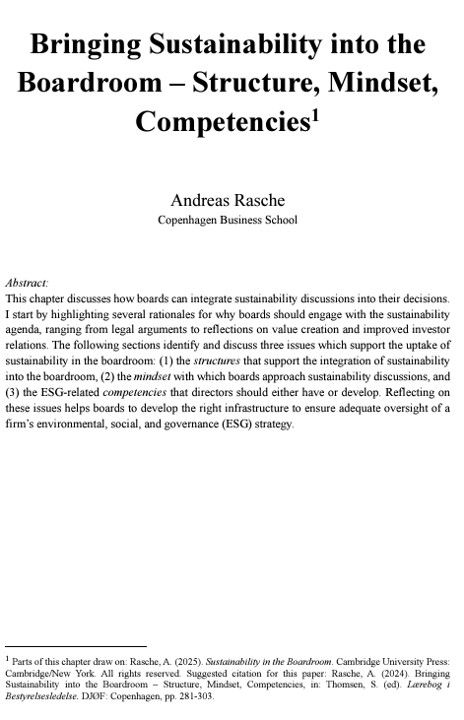

How can boards integrate sustainability into their oversight tasks? I have collected some important lessons on how to build a "board sustainability infrastructure" and put them into a new paper. The focus is on (1) the structure boards choose to discuss sustainability, (2) directors' collective mindset vis-a-vis sustainability, and (3) the development of relevant competencies.
1️⃣ STRUCTURE: Should boards form a sustainability committee, or should the entire board integrate sustainability discussions? There is no one-best-way, but there are situations and contextual conditions that impact whether a structural model fits better or not.
2️⃣ MINDSET: Maybe more important than structure is how boards approach sustainability discussions. Which beliefs and assumptions shape the debate around ESG topics? Too often, a compliance mindset dominates (e.g. because the link between new regulations and strategic thinking is not yet obvious).
3️⃣ COMPETENCIES: Research shows that boards are still lacking sustainability credentials and relevant expertise. While directors do not need expert sustainability knowledge, they need to build up knowledge in various interrelated areas to fulfil their tasks.
Much more can be said, but these three areas are a good way to start the discussion...
#sustainability, #esg
CO2 emissions from fossil fuels have increased by 0.8% in 2024, according to new data released at #COP29 earlier today. For 1.5°C, which is only a theoretical goal at this stage, emissions would need to fall by 43% by 2030. No sign of "transitioning away..."
The "Global Carbon Budget 2024" calculations show that 37bn tonnes are expected to be emitted in 2024 (4 million tonnes a minute). Despite progress in clean energy, growth in natural gas and oil use pushes global fossil emissions up. Coal emissions are also projected to increase (0.2%).
Although there is a slowdown in the increase in global fossil CO2 emissions, there is no indication yet that the burning of fossil fuels has peaked...
===
Full Paper: https://essd.copernicus.org/preprints/essd-2024-519/
The Guardian: https://www.theguardian.com/environment/2024/nov/13/no-sign-of-promised-fossil-fuel-transition-as-emissions-hit-new-high
#sustainability, #climatechange
The University of Oxford has launched a great new tool: the "Climate Policy Monitor" which assesses how ambitious, stringent, and comprehensive the net-zero regulations of 30 countries are. The 2024 Monitor, which assessed 265 regulations in these countries, uncovers significant gaps:
1️⃣ DISCLOSURE: Only 17 jurisdictions mandate firms to disclose emissions across their entire value chains (Scope 3' emissions).
2️⃣ TRANSITION PLANS: Although many countries demand companies to lay out transition planning (describing how they actually meet climate pledges), only 20% of the assessed regulations require actual implementation of the plans.
3️⃣ PUBLIC PROCUREMENT: While many countries have created rules to align government procurement spending with climate goals, there is a lack of clear standards on how to operationalise these requirements.
The good news: climate-related regulations and policies are growing. The bad news: way too many gaps remain in terms of enforcement and clarity.
Considering that the assessed countries reflect most of the main emitters (US, China, EU, India, UK) the results expose those areas where pressure on regulators needs to increase. Because the mere existence of many regulations does not fix it...
===
Access the Monitor: https://climatepolicymonitor.ox.ac.uk/
#climatechange, #sustainability, #netzero
Update on EU Deforestation Regulation: EPP backtracked on the two-year extension. But today's vote still approved the creation of "no risk" categories (by a narrow margin). Belgian, Irish and part of the Dutch EPP had expressed their opposition to some of the centre-right group's proposed changes.
EUDR now goes back into trilogue on the "no risk" category. It will be interesting to see whether agreement can be reached by January 2025.
Voting was pure chaos as some of the voting machines did not work. One MEP argued that this calls into question the entire vote. #EUDR, #greendeal
Story on EPP backtracking before vote: https://www.euractiv.com/section/agriculture-food/news/epp-backtracks-on-two-year-delay-for-eudr-trader-exemption-ahead-of-vote/
Overconsumption drives the transgression of several planetary boundaries, according to a new study in 'Nature'. Significant parts of the planetary boundary breaching responsibility can be attributed to the global top 10% and top 20% of consumers. The data is based on a global expenditure database that includes up to 201 consumption groups across 168 countries.
"The world’s top 10% of consumers were responsible for 51%, 48%, 38%, 31% and 67% of the PB transgressions in terms of climate change, land-system
change, N flows, P flows and biosphere integrity, respectively."
If the global top 20% of consumers would adopt effective mitigation measures, they could yield a reduction of 25%-53% in environmental pressure. In such a scenario, just focusing on the food and services sectors would be sufficient to push land systems change and biosphere integrity back within their boundaries.
===
Full study (open access): https://www.nature.com/articles/s41586-024-08154-w
#sustainability, #planetaryboundaries
Studies on early #CSRD / #ESRS implementation point towards many challenges. Here comes an overview of key insights from four studies conducted in 2024. Studies include: EFRAG (n=28 firms), Frank Bold (n=100 firms), Position Green (n=400 firms), and PwC (n=547 managers). These studies differ in terms of aims and methods, so results cannot be compared directly. But the findings show some common challenges:
1️⃣ DOUBLE MATERIALITY: The EFRAG data shows that firms adopt a thorough and analytical DMA approach, but it is also this very approach that brings challenges, for instance the lack of specific data. Frank Bold's results point in a similar direction showing that many firms do not specify what types of impacts they have within their material topics.
2️⃣ REPORTING GAPS: Disclosures for "new" topic areas is a challenge (i.e. areas not yet part of existing reporting). The studies by Position Green and Frank Bold reveal significant gaps in terms of biodiversity reporting. Likewise, PwC's findings show that biodiversity was the topic for which managers expressed the lowest level of confidence for meeting reporting requirements.
3️⃣ ORGANISATIONAL CHALLENGES: The results by PwC show that CSRD implementation is approached as a cross-functional effort that reaches beyond the sustainability unit. But, this brings new organizational challenges, which the EFRAG study summarised as being about the need for "clear governance" and "upskilling".
These early results give good insights into those areas where implementation challenges likely exist. Many more details in the four studies...
===
Note: Due to the CSRD's scope, the four studies focus mostly on larger companies, as these are the ones that need to file reports in 2025.
Frank Bold: https://lnkd.in/d-tQkBTv
PwC: https://lnkd.in/dqfNjFW7
Position Green: https://lnkd.in/d3Jy8bf5
EFRAG: https://lnkd.in/dpsM_UX6
#sustainability, #esg
The European Council unanimously approved the new ESG ratings regulation. This was the final legal step. The regulation will now be published and then apply 18 months after publication (so in 2026).
1️⃣ ESG rating providers will be authorised and supervised by the European Securities and Markets Authority (ESMA) and must comply with transparency requirements, as a minimum disclosing "the methodology, models, and key rating assumptions."
2️⃣ Rating providers' different business activities need to be separated, but regulators leave a backdoor open: no separate legal entities need to be created if raters can show that activities are separated and no conflicts of interest exist.
3️⃣ Separate E, S, and G ratings should be provided. If a single ESG rating is provided, rating providers need to disclose the rate and weight attributed to each dimension.
4️⃣ If ESMA finds that a rater has intentionally or negligently infringed the Regulation, it should adopt a fine (max 10% of total annual net turnover).
At the same time, the UK regulator has also released and updated draft legislation to regulate ESG ratings. Good to see that the market, which some described as the "Wild West", is getting some more transparency requirements...
===
EU Regulation (final text): https://www.consilium.europa.eu/en/documents-publications/public-register/public-register-search/?WordsInSubject=&WordsInText=&DocumentNumber=43%2F24&InterinstitutionalFiles=&DocumentTypes=&DateFrom=&DateTo=&MeetingDateFrom=&MeetingDateTo=&DocumentLanguage=EN&OrderBy=DOCUMENT_DATE+DESC
UK Regulation (draft text): https://www.gov.uk/government/consultations/future-regulatory-regime-for-environmental-social-and-governance-esg-ratings-providers
#sustainability, #esg, #sustainablefinance
Commission President von der Leyen commented on plans to streamline and consolidate #CSRD, #CSDDD, and the #EUTaxonomy by potentially introducing an "omnibus regulation". This is deeply concerning as it may weaken these Green Deal regulations.
At a recent press conference, von der Leyen discussed plans to reduce bureaucracy. “We will look, for example, at the triangle [of the] Taxonomy, CSRD, CS3D.” But she also stressed that the content of the regulations is "good". “We want to maintain it, and we will maintain it. But the way we get there, the questions we are asking, the data points we are collecting – thousands of them – is too much. Often redundant, often overlapping.” ( https://real-economy-progress.com/eu-to-re-open-and-merge-csrd-cs3d-and-taxonomy/ )
Such an omnibus regulation would enact the Budapest Declaration ( https://www.consilium.europa.eu/en/press/press-releases/2024/11/08/the-budapest-declaration/ ) in which the Council asked the Commission to make proposals to reduce reporting obligations by at least 25% in the first half of 2025. An omnibus regulation consolidates or amends multiple other regulations into one document. So, omnibus in the sense of: "covering multiple areas".
Such a move would create legal uncertainty into an area where companies are just starting to build up capacity (and hence it would reward laggards). Further, the legal effects on the three regulations are uncertain. If the omnibus regulation follows the traditional legal path, the Council and Parliament can amend a Commission proposal. Especially the new Parliament may use a "consolidation" as a pretext to weaken the regulations in substantive ways.
So far, the Commission has not officially communicated any position. So, at this stage these are media reports based on a press conference. But, politics moves fast and it can be a dirty game...
===
Links to some press articles:
https://real-economy-progress.com/eu-to-re-open-and-merge-csrd-cs3d-and-taxonomy/
https://www.lexology.com/library/detail.aspx?g=b061ce07-0a2c-41c4-bc57-0bf7a323167f
https://www.lw.com/en/insights/eu-commission-suggests-potential-consolidation-of-esg-reporting-frameworks-in-2025
#sustainability, #esg
ISO launched a new standard focused on ESG implementation principles (ISO IWA 48:2024). Considering that, globally speaking, ESG practices are still fragmented, a standard that provides structure and outlines key processes makes sense. It reads a bit like an "ESG 101" - an introduction to the field.
Although I doubt that such a document in itself can standardise language and processes (without further enforcement by policy makers), it is a welcome reference point, for instance: (1) for those in organizations who increasingly get in touch with ESG debates and need an introduction, (2) for smaller firms that seek initial guidance on how to set up structures and processes, and (3) for non-business entities that come into touch with ESG debates. ISO points out that the standard is explicitly designed for and applicable to different types of organizations, not just large corporations.
While ISO IWA 48 rightly claims that ESG is not just about reporting and that the focus is on embedding relevant practices into an organisation's culture, there is relatively little in the standard on how to shape such a culture. Of course, cultural transformations cannot (and should not) be standardised, but still more specific things could have been said on this topic...
===
Access ISO IWA 48: https://www.iso.org/obp/ui/en/#iso:std:iso:iwa:48:ed-1:v1:en
#sustainability, #esg
Less than 16% of issued carbon credits reflect real emission reductions, according to a large-scale systematic assessment of carbon crediting projects that was just published in 'Nature Communications'. The study looked at 2,346 mitigation projects which together account for nearly 1 billion tons of CO₂ (19% of all issued credits).
But the "offset achievement ratio" (OAR) differs significantly across project categories: Wind power projects in China and improved forest management in the US showed no statistically significant emission reductions, while avoided deforestation achieved a ratio of 25% and SF6 destruction 16%. Even the best performing project category (HFC-23 abatement) only achieved a 68% OAR.
"Our assessment highlights that many project developers pick favourable data or make unrealistic assumptions. Some methodologies make use of outdated data or inappropriate methodological approaches, which can lead to adverse selection or perverse incentives." These problems lead to many non-additional projects being registered.
A stark reminder that carbon crediting systems need much better mechanisms to cope with adverse selection problems...
===
Full study (open access): https://www.nature.com/articles/s41467-024-53645-z
#climatechange, #sustainability, #carboncredits
New research shows that parts of Europe have become a regional heatwave hotspot where the hottest days of the year are warming twice as fast as mean summer days. This shows: working against climate change is, above all, in Europe's very own interest (and not a benevolent favour we do to the rest of the world).
The research also shows: "Extreme heat in several regions globally is increasing significantly and faster in magnitude than what state-of-the-art climate models have predicted under present warming."
===
Full study (open access): https://www.pnas.org/doi/epub/10.1073/pnas.2411258121
#climatechange, #sustainability
11-11-2024

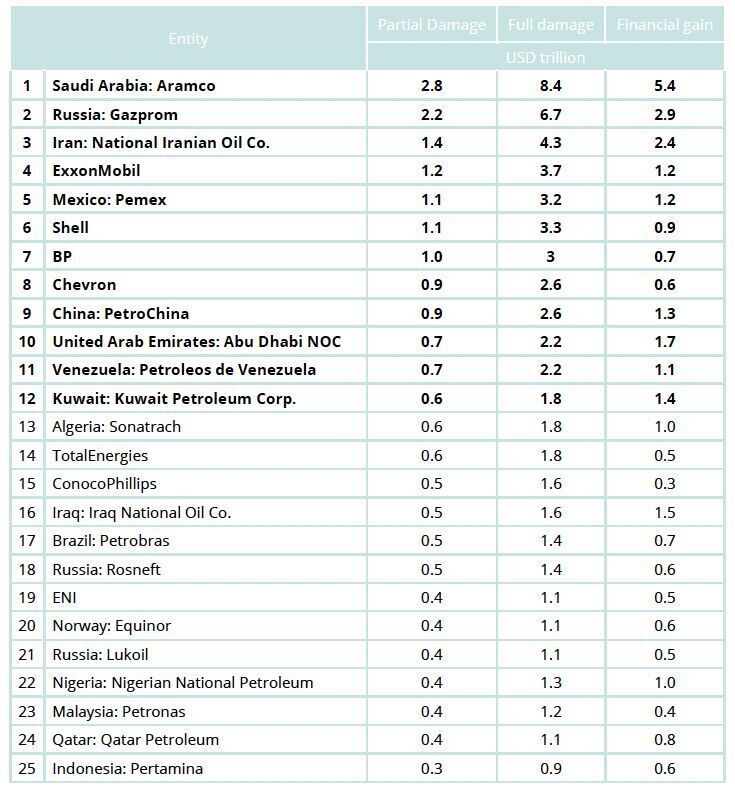

The estimated damages of the combined CO2 emissions from the 25 biggest emitting oil and gas companies are around $20 trillion for the 1985-2018 time period (financial gains were around 50% higher during the same period).
#COP29 is supposed to further operationalize the "Loss and Damage Fund", which has $702 million in it right now. Some have suggested that this fund needs $100 billion per year at the very least. This is not about charity - it most of all about responsibility and accountability.
Loss and damage funding cannot just focus on pledges by national governments, the private sector also needs to contribute its fair share. António Guterres said last year "Polluters must pay" when suggesting to tax windfall profits of fossil fuel companies.
The study uses an established method - the social cost of carbon - to calculate the damages. It assumes partial damage allocation: an equal split of responsibility between producers, policymakers, and end users. Access it here: https://climateanalytics.org/publications/carbon-majors-trillion-dollar-damages
09-11-2024

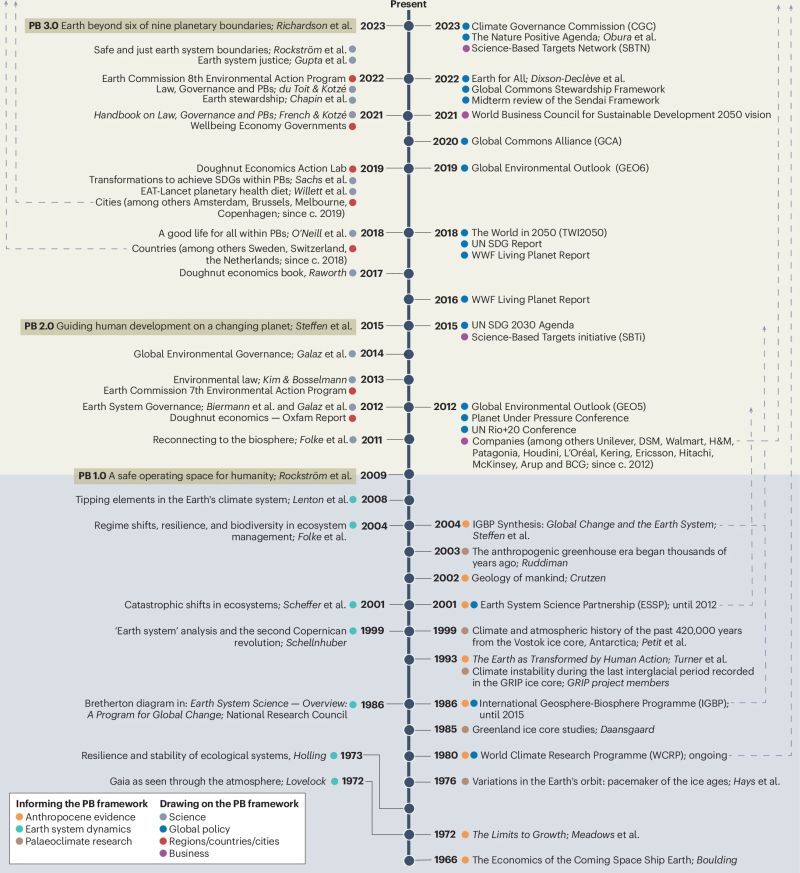

New summary showing the evolution of "Planetary Boundaries" (PB) over time. The overview shows (1) the multidisciplinary roots of PBs and (2) how the PB framework itself informed global policy and business. This is based on a new review by Rockström et al. that discusses the past, present and future of PBs.
The PB framework sharpens our understanding for the fact that the environmental crisis is not just based on a single dimension (e.g, climate), but that it is the interaction of multiple dimensions that matters. It is a "systemic planetary perspective" and hence a systemic planetary crisis.
PBs are purely set on biophysical grounds without incorporating specific considerations around feasibility or human demands. The Earth system does not negotiate...
===
Full Review Article in 'Nature Reviews' (open access): https://www.nature.com/articles/s43017-024-00597-z
#sustainability, #planetaryboundaries
31-10-2024

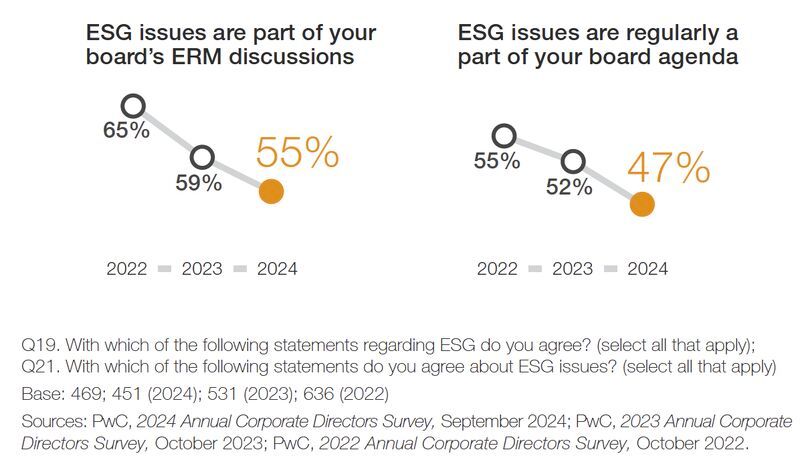

US boards deprioritize ESG discussions with less than half of boards regularly discussing it. Lack of consistency is one driver: 58% of directors believe that ESG is not consistently understood within the boardroom.
This lack of consistency is likely to be driven by a lack of credentials and ESG-related expertise (https://lnkd.in/dR6mW48w). 43% of directors either did not know how their company's climate commitments impact capital allocation or only had a weak understand of it. Another driver is, of course, the strongly politicized and polarized nature of ESG in the U.S, and a Trump presidency is likely to further deepen this divide.
Still a long way to go to integrate ESG discussions into boardrooms...
===
Full Report: https://www.pwc.com/us/en/services/governance-insights-center/library/annual-corporate-directors-survey.html
#esg,#sustainability, #climatechange
07-11-2024

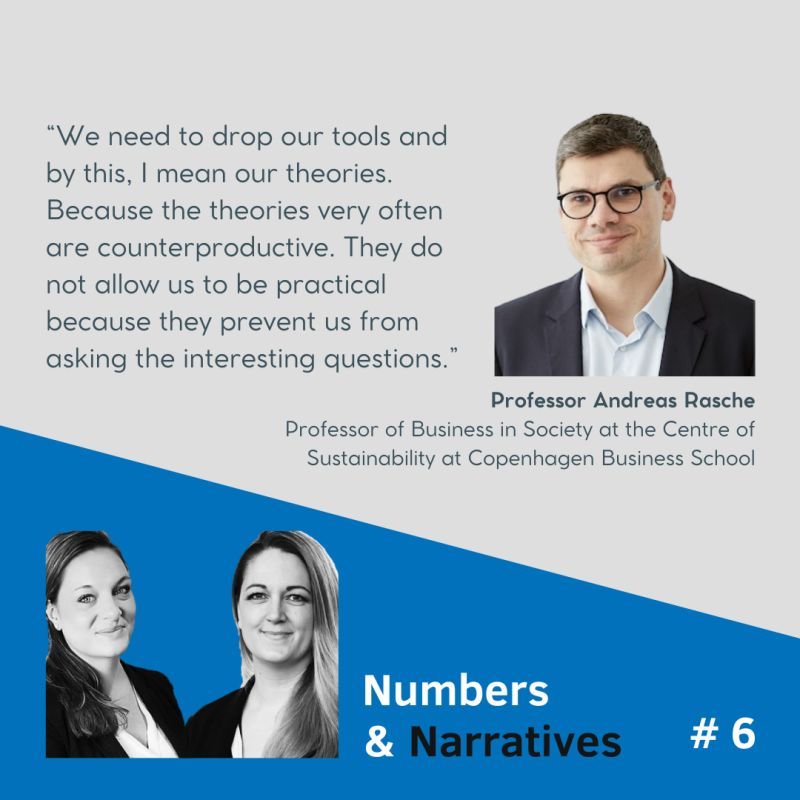

🎙️ Finally, a new episode of our Podcast #Numbers & #Narratives, where we try to unpack the meaning #impact and #materiality with the great Andreas Rasche, authority in sustainable business and Associate Dean of the Full-Time MBA Program at Copenhagen Business School. 🌍
Together with my co-host Laura Marie Edinger-Schons we talk to Andreas about several open questions surrounding sustainable business, such as:
🎱 The complex role of #quantification in sustainability, exploring how metrics can sometimes crowd out moral considerations while also building essential bridges.
🍀 #DoubleMateriality and its significance in pushing companies to account for their broader impact on society and the environment—not just financial returns.
🔮 The evolving landscape of corporate sustainability #strategy and how managers can go beyond numbers to create genuine narratives for change.
Andreas' impressive background, including collaborations with the United Nations, over 60 publications, and leadership roles in business ethics, brings depth and perspective to this conversation. He emphasizes the balance between #measurement and #meaningful #impact — a core challenge for many in times of #CSRD and increased #regulation.
🔗 Tune in to this episode and join the conversation about how we can make sustainability metrics a tool for true transformation here: https://open.spotify.com/episode/014yCoyMhRLAxMUN6utvCa
University of St.Gallen
HSG Institute for Economy and the Environment
Institute of Accounting, Control and Auditing
University of Hamburg
07-11-2024

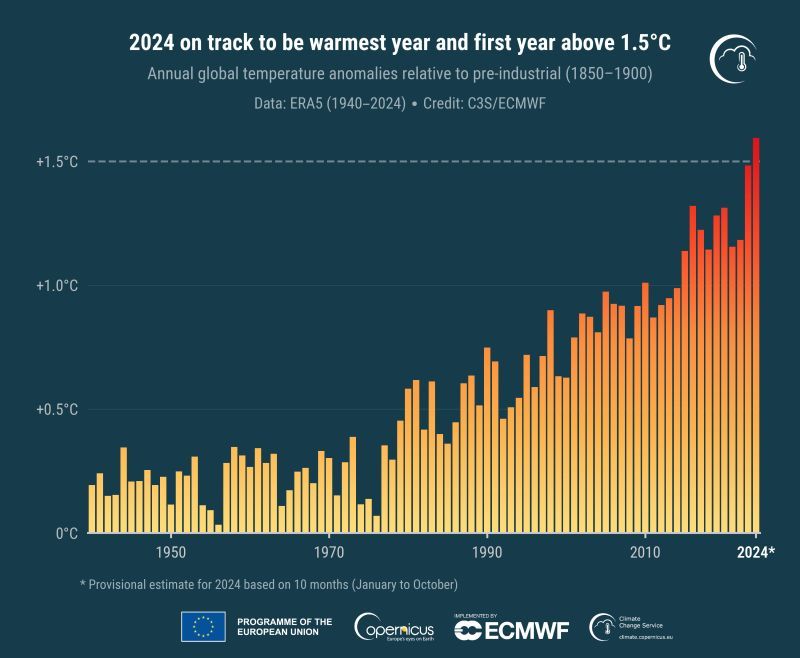

2024 is "virtually certain" to be the first year to breach 1.5°C (2023 was 1.48°C), according to new data by the EU's Copernicus C3S. With Trump in the White House, this will enormously intensify pressure. What now?
"If you can’t fly, run; if you can’t run, walk; if you can’t walk, crawl; but by all means keep moving.” - Martin Luther King, Jr (as cited by Al Gore last night)
Press Release: https://climate.copernicus.eu/copernicus-2024-virtually-certain-be-warmest-year-and-first-year-above-15degc
#climatechange, #sustainability
05-11-2024

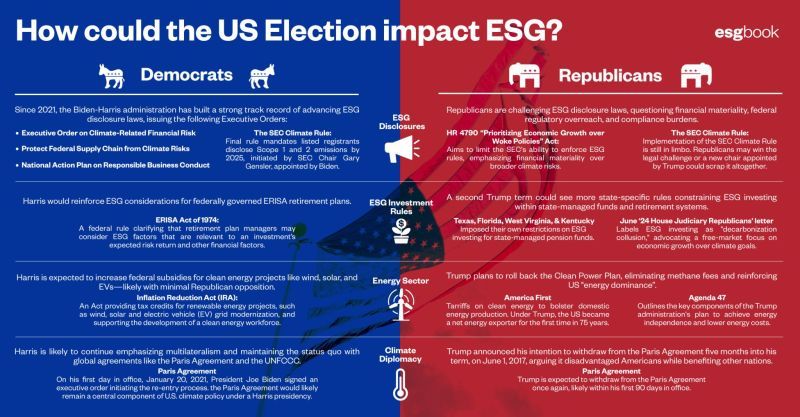

Today's US election will shape the future path of ESG and sustainability, not just in the US. A Trump victory will impact ESG disclosure rules (e.g., the SEC's ability to enforce rules) as well clean energy policies, and it would be a serious blow to global climate action. Great overview by ESG Book...
While it is unlikely that Trump will completely repeal the Inflation Reduction Act (IRA) - due to its economic benefits to key conservative states - it is clear that the clean energy sector will take a hit ( https://www.ft.com/content/2a5580d6-3a83-467e-a4b0-efc1b1c52759?desktop=true&segmentId=7c8f09b9-9b61-4fbb-9430-9208a9e233c8#myft:notification:daily-email:content). Trump has also promised to roll back the Clean Power Plan, which would lead to an elimination of methane fees.
A Trump victory would significantly affect global climate diplomacy. He is expected to withdraw (again) from the Paris Agreement within 90 days, leading to what António Guterres described as a "crippled" version of the Agreement. Latest reports even say that a Trump administration could exit the entire UN climate negotiating framework (UNFCCC).
The choice is clear...
Source: https://www.esgbook.com/the-political-climate/
#sustainability, #esg, #uselection2024
04-11-2024

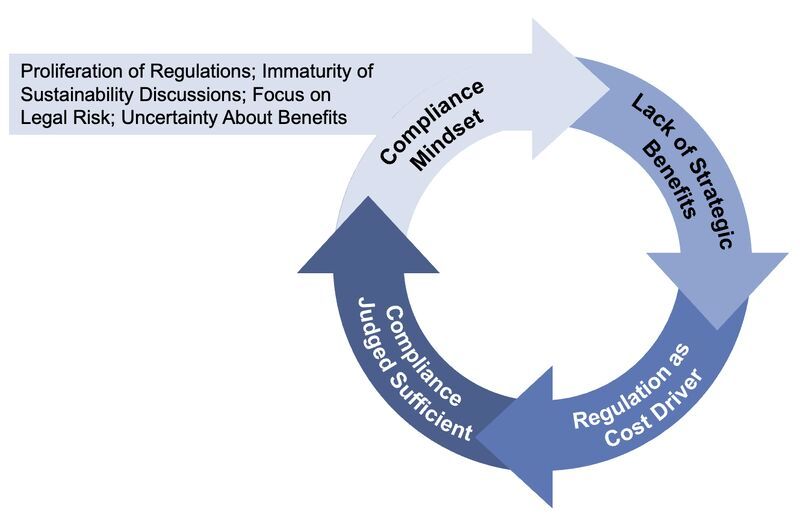

Approaching sustainability regulations like #CSRD through a compliance-only mindset can likely create a vicious circle - compliance is judged sufficient because of a lack of strategic benefits. Such benefits, however, could not emerge due to the original focus on compliance. A closer look:
1️⃣ A compliance mindset towards sustainability regulations is fuelled by the swift emergence of regulations in this area. Often, such a mindset is dominant because the benefits of regulatory implementation are judged to be uncertain.
2️⃣ Due to the focus on compliance, firms do not experience many strategic benefits - e.g., it becomes reporting for the sake of reporting. In other contexts, regulations are so new that benefits could not even emerge.
3️⃣ The lack of perceived benefits supports arguments around sustainability regulations being a cost driver without tangible value.
4️⃣ This framing of "regulation-as-cost" justifies the dominant compliance mindset ("Let's meet the minimum standards if we do not get anything out of it.").
In my own research, I have come across this pattern. The challenge is to find ways to break up this cycle. In the end, it is much about better linking the outcomes of regulatory implementation (e.g., ESG data) and strategic decision-making. #sustainability, #esg, #eugreendeal
04-11-2024

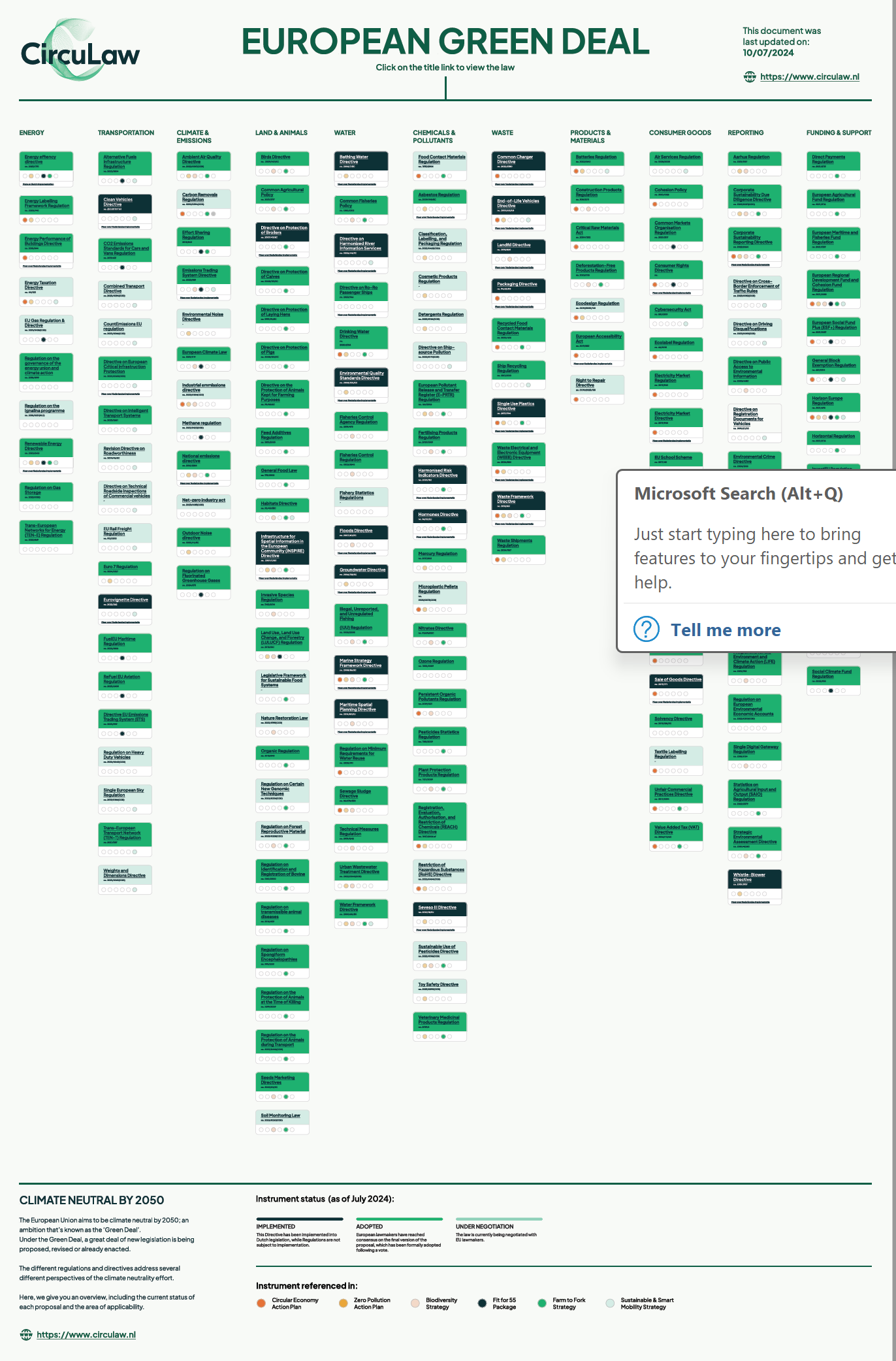

The EU Green Deal consists of over 150 directives and regulations stretching across 11 areas (image below with links to all policies). For all those who now shout "this is overregulation", consider this:
1️⃣ LEVELLING PLAYING FIELD: We need a level playing field when it comes to (corporate) sustainability. The years where voluntary standards dominated the field were great for learning (and these standards are still needed), but they do not reach far enough in terms of scale.
2️⃣ INVESTMENT: Many Green Deal regulations aim at more transparency and comparability, so that investors can, ideally, reallocate capital into cleaner companies and sectors. The green transition requires enormous investments and governments alone will not be able to allocate sufficient capital.
3️⃣ BEYOND EUROPE: Some of these regulations also have effects beyond Europe and hence cover non-EU competitors (actually #CSDDD and #CSRD are good examples). Also, we have seen a proliferation of sustainability regulations (e.g., taxonomies) in other parts of the world - Europe is not alone...
The next step must be to better link the Green Deal with competitiveness concerns (the Draghi report outlined possibilities). The Mission Letters for the EU Commissioners-designate show that the Green Deal is pushed into this direction.
Source: https://www.circulaw.nl/European_green_deal.pdf
Link: https://www.linkedin.com/posts/circulaw_european-green-deal-circulaw-activity-7218874812008411137-TiNw?utm_source=share&utm_medium=member_desktop
===
Image credit CircuLaw, #eugreendeal, #sustainability, #esg
31-10-2024

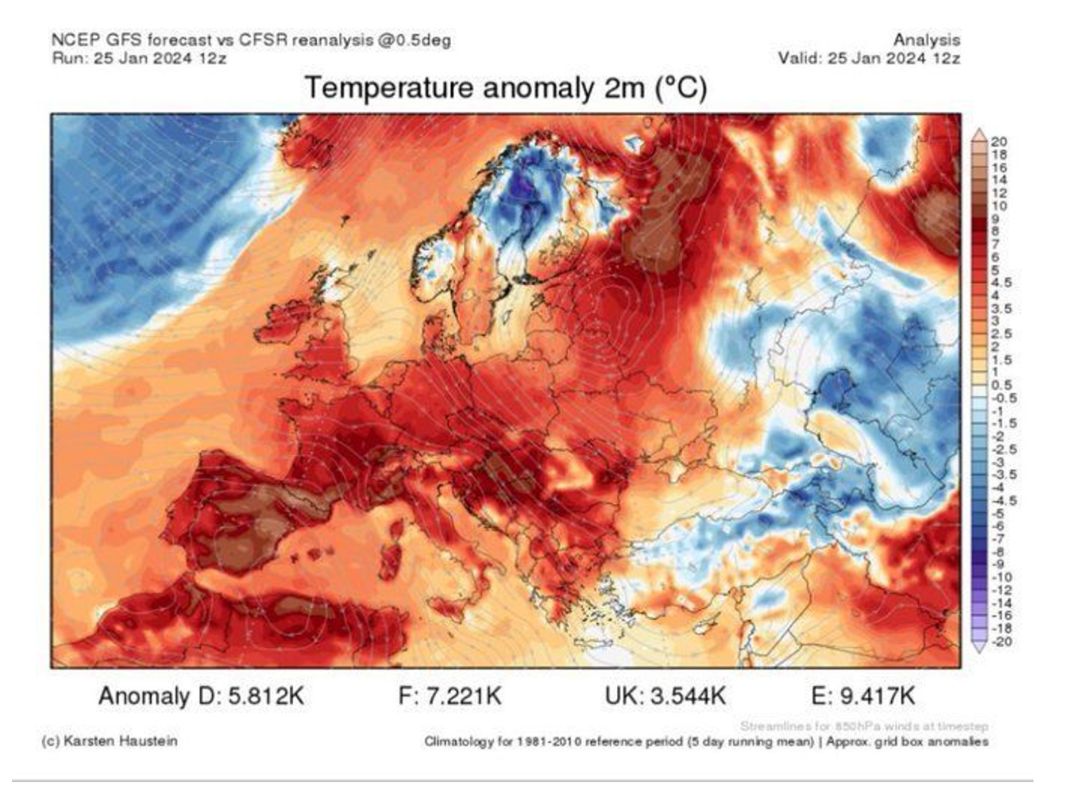

The Valencia region, which was hit by severe flash flooding yesterday, was also the region with the highest January temperature ever recorded in Europe: 30.7°C (87.3°F) on 25 January 2024. A stark reminder of how much climate change is pushing us towards extremes...
Rainfall and heat extremes have continued (and will continue) to increase worldwide due to anthropogenic global warming ( https://www.nature.com/articles/s41612-021-00202-w ).
===
AVAMET: https://www.nature.com/articles/s41612-021-00202-w
31-10-2024

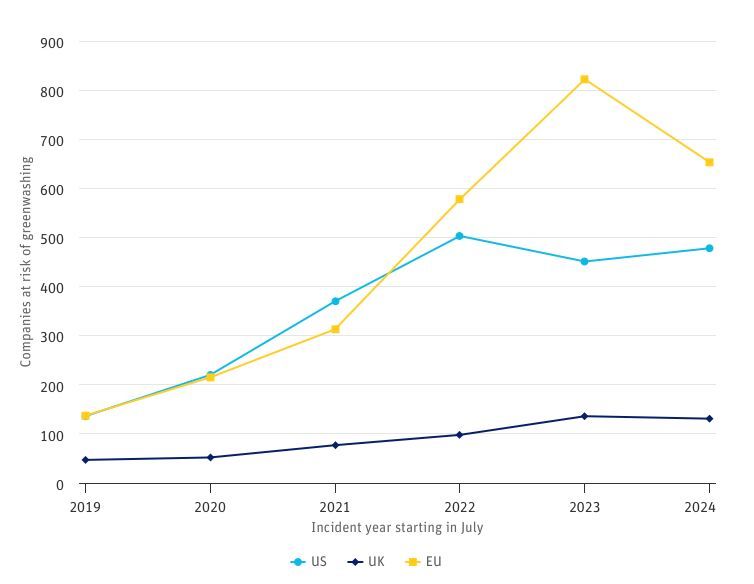

EU companies greenwash less (-20%) compared to firms in the US and UK. Increased transparency through regulations like #CSRD, #SFDR, and the #EUTaxonomy is likely to be one driver behind this trend. The Green Deal’s commitment to tackle false environmental claims at EU level starts to pay off.
European firms may also factor in the new EU anti-greenwashing rules related to the "Empowering Consumer for the Green Transition Directive" (applicable from 2026) and the "Green Claims Directive"(under negotiation). These regulatory changes push many firms into seeing greenwashing as a risk to be managed.
The drop in cases is not uniform across the EU: largest reduction in the Netherlands (-48%) and Italy (-39%), while Germany just saw cases dropping by 15% and in France there even was an increase by 11%.
===
Full Report by RepRisk: https://www.reprisk.com/research-insights/reports/a-turning-tide-in-greenwashing-exploring-the-first-decline-in-six-years
#sustainability, #greenwashing, #esg
31-10-2024

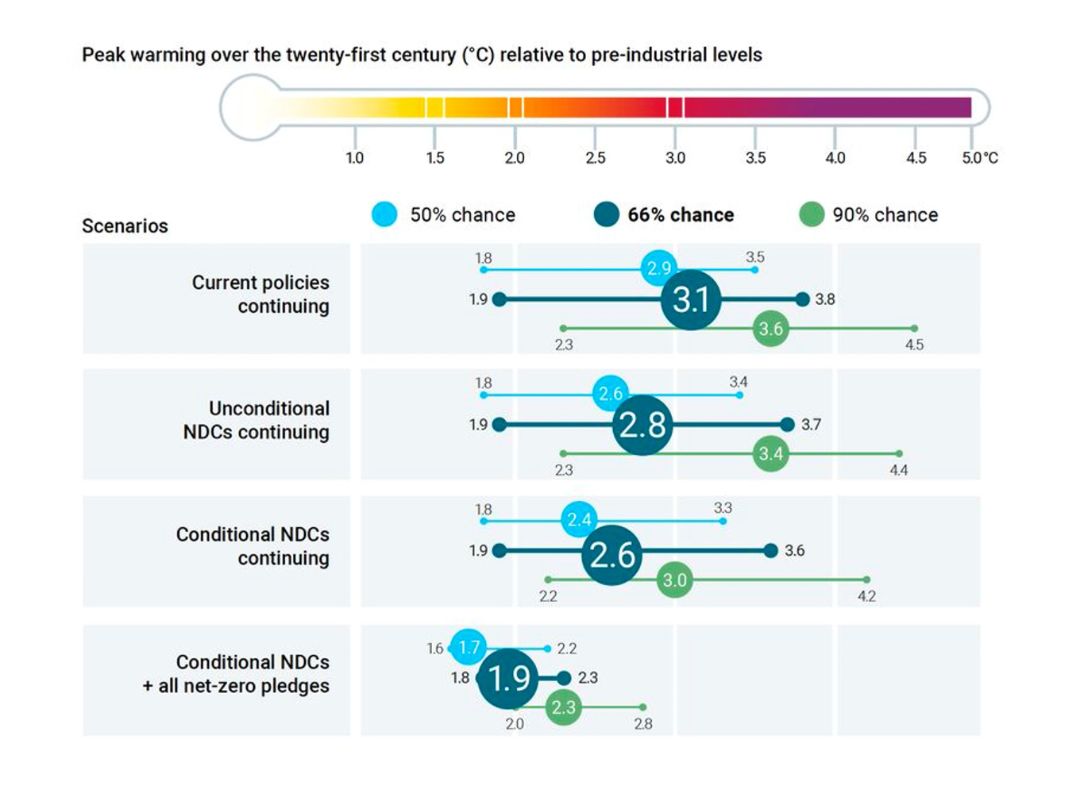

Continuing with current climate mitigation policies gives us a 66% chance that warming is kept below 3.1°C, according to the brand new UNEP 'Climate Gap Report'. Even with all national climate pledges achieved, we arrive at 2.6°C (see image below).
In the most optimistic case where all national climate pledges and all long-term net-zero targets are achieved, there is a 66% chance of limiting warming to 1.9°C. While it is "still technically possible to get on a 1.5°C pathway", this only remains a theoretical possibility (as it would require huge, coordinated and rapid efforts).
GHG emissions rose to a record 57.1bn tonnes of CO2 equivalent in 2023, despite global pledges to cut emissions. Another year, another report, another record, and every year we need sharper cuts...
===
Full UNEP Report: https://lnkd.in/dspeWhX8
29-10-2024
29-10-2024

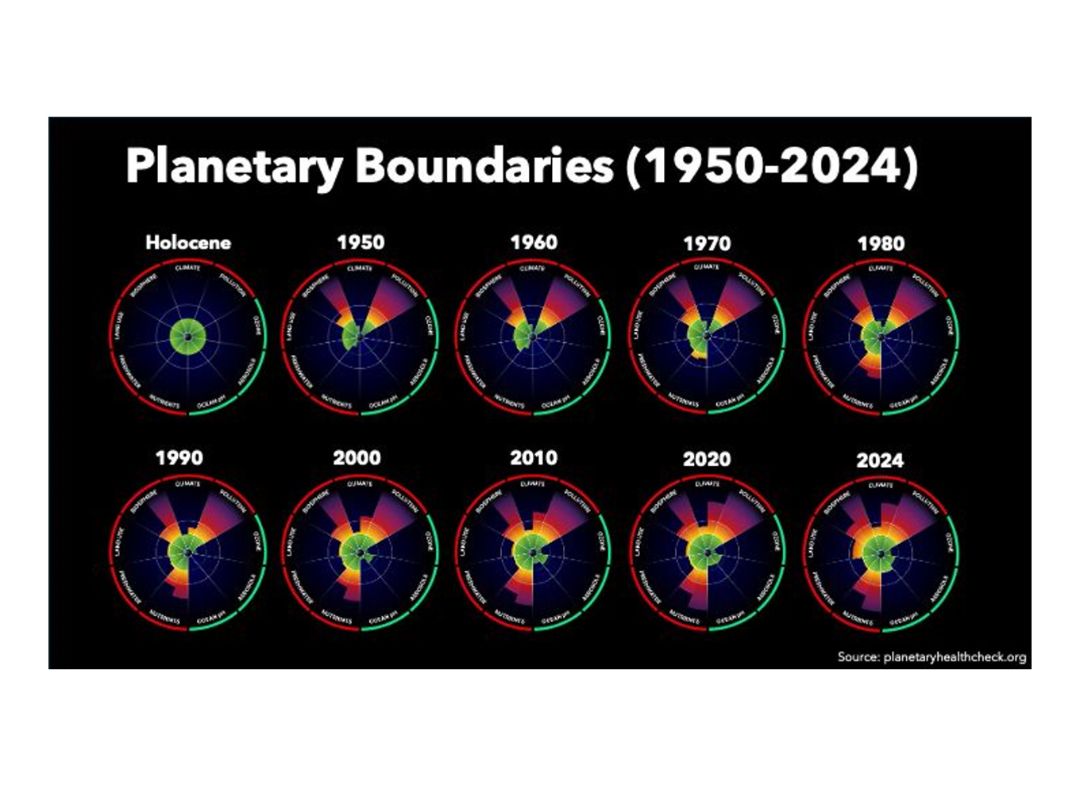

Earth is sending us vital signals... The long-term evolution of planetary boundaries over almost 75 years shows how significantly Earth processes have been deteriorating since the 1950s.
Two boundaries were already crossed in the 1950s, while we have crossed six boundaries overall in 2024. The transgression of a seventh boundary (ocean pH) is unavoidable due to the CO2 already emitted and the time it takes for the ocean system to respond ( https://phys.org/news/2024-09-world-oceans-critical-acidification.html ). Four boundaries operate in high-risk zones.
The boundaries interact in various ways and so do the human activities that cause their transgression. That is why we cannot 'pick and choose' which boundary to address. We need to respect all nine boundaries equally... and this requires integrated thinking across systems and E, S, and G silos.
===
Data comes from the '2024 Planetary Health Check'. Check out their website to learn more about planetary boundaries science: https://www.planetaryhealthcheck.org/planetary-science
25-10-2024

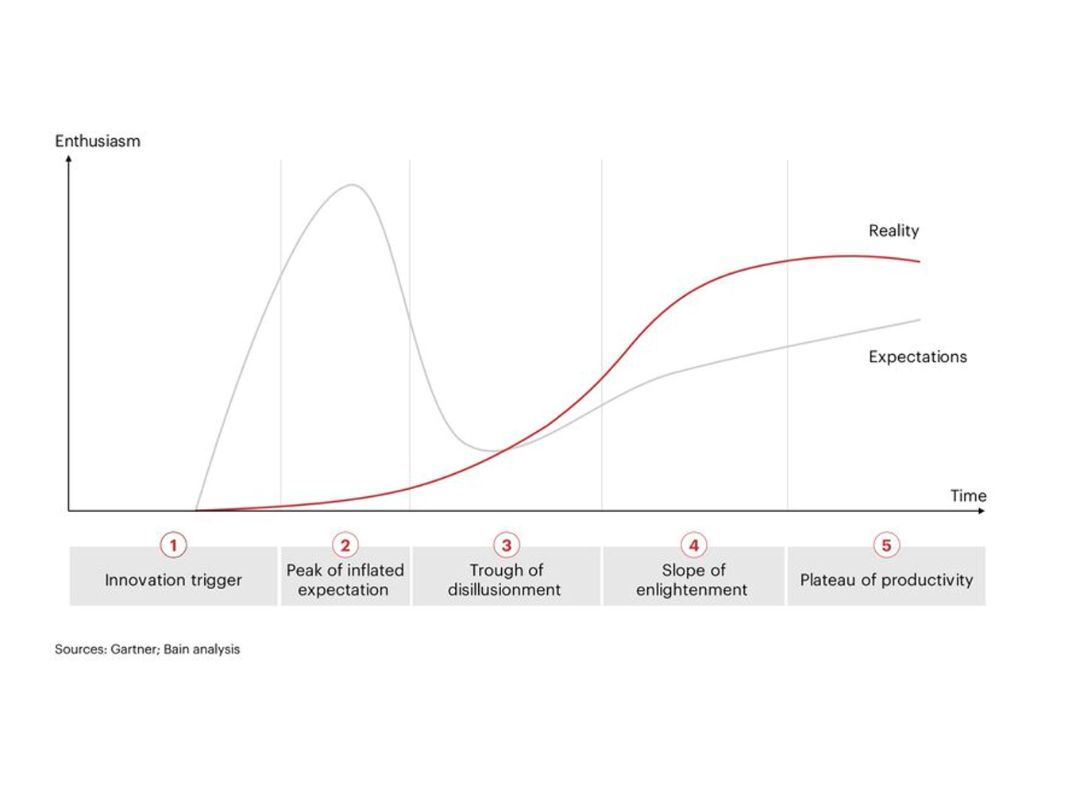

Sustainability may follow the so-called 'hype cycle' that is often associated with transformations (see image). In this cycle, sustainability has likely hit the trough of disillusionment, and this may even be good thing...
The peak of inflated expectations was, among other things, driven by the ESG hype on financial markets (especially in 2020/21) and the enthusiasm around new legal regulations (especially the #CSRD and #EUtaxonomy). Now, that ESG markets have cooled and regulations need to be implemented with a lot of attention to detail, some of the enthusiasm has faded (also because sustainability is overshadowed by other debates such as geopolitics and AI).
Being in the trough of disillusionment can help to spur learning if companies are open to it. The low-hanging fruits are picked and the attention shifts to the more difficult discussions such as: (1) organisational integration of regulations, (2) increased collaboration along the value chain , (3) the availability of technological solutions at scale, and (4) sufficient investments to back up targets (instead of cutting back budgets).
===
Note: The 'hype cycle' is based on a framework by Gartner and it is used to discuss technological hypes (and, of course, only few technologies actually follow exactly this pattern). It can be used to assess sustainability-related technologies ( https://trellis.net/article/gartners-hype-cycle-applied-to-the-business-of-sustainability-in-2024/ ), but it can also be used as an illustrative(!) framework to discuss where sustainability as a practice stands and where it may go. #sustainability, #esg
The image below is from Bain & Co. - applying the illustrative idea of this cycle to the current state of sustainability. Read their analysis here: https://www.bain.com/insights/topics/ceo-sustainability-guide/
22-10-2024

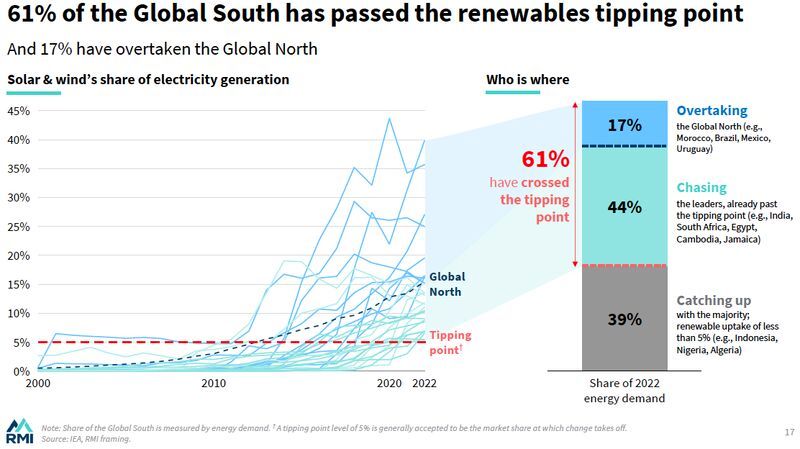

61% of countries in the Global South have already passed the renewables tipping point; some of these countries even push renewable electricity generation faster than the Global North, according to a new report by RMI. Some ground for optimism:
➡️ The Global South controls 70% of global solar and wind resources and 50% of critical minerals. This makes their renewable potential nearly 400 times larger than their current fossil fuel production (Global North has 50x potential).
➡️ 87% of capital expenditures on electricity generation goes into clean energy. Solar and wind generation in the Global South has grown on average at 23% annually throughout the last five years.
➡️ Electric vehicle sales are taking off in some countries - e.g., in Thailand from 5% in 2022 to nearly 18% in 2023 and Vietnam from around 2% in 2022 to nearly 12% in 2023.
Ground for optimism, yes, but still more finance is needed to reach the goal to triple renewable energy by 2030 ( https://www.iea.org/commentaries/tripling-renewable-power-capacity-by-2030-is-vital-to-keep-the-150c-goal-within-reach ). As #COP29 approaches, countries need to scale up financing...
===
Full Report: https://rmi.org/wp-content/uploads/dlm_uploads/2024/10/Powering_up_the_global_south.pdf
#climatechange, #sustainability,
22-10-2024

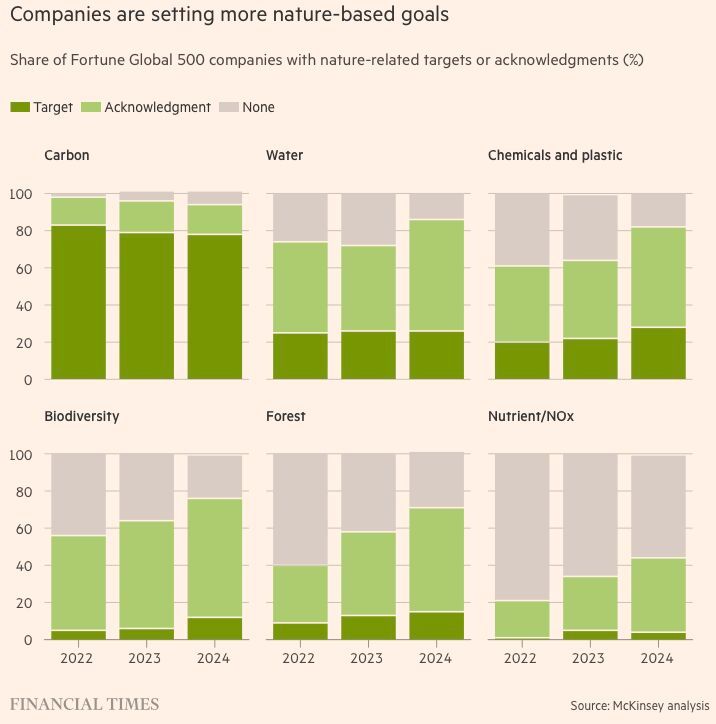

Many companies are jumping on the "nature positive" bandwagon these days. The share of corporates with nature-based goals is increasing. In principle this is good, but there is a real risk that firms might uncover that delivering on these goals is harder than they thought.
Great discussion in today's FT ahead of #COP16. One key message: "Scientists and environmental groups worry that companies and governments are starting to brandish the term as a buzzword, before the definitions and metrics needed to ensure accountability have been put in place and without having grasped the scale of the work required."
As firms enter this space, there is need for additional safeguards and accountability, especially because problems like biodiversity are more local and measurement is less standardised (e.g., compared to carbon). Nature-based targets alone won't do the trick. Businesses must back their targets with credible plans and sufficient investments. Most of all, the targets need to be set in a way that they "match the scale of the problem."
===
Full discussion by FT: https://www.ft.com/content/4d12f8d1-c0df-4ab6-b374-741e9517448b?desktop=true&segmentId=7c8f09b9-9b61-4fbb-9430-9208a9e233c8#myft:notification:daily-email:content
#biodiversity, #sustainability, #climatechange
22-10-2024

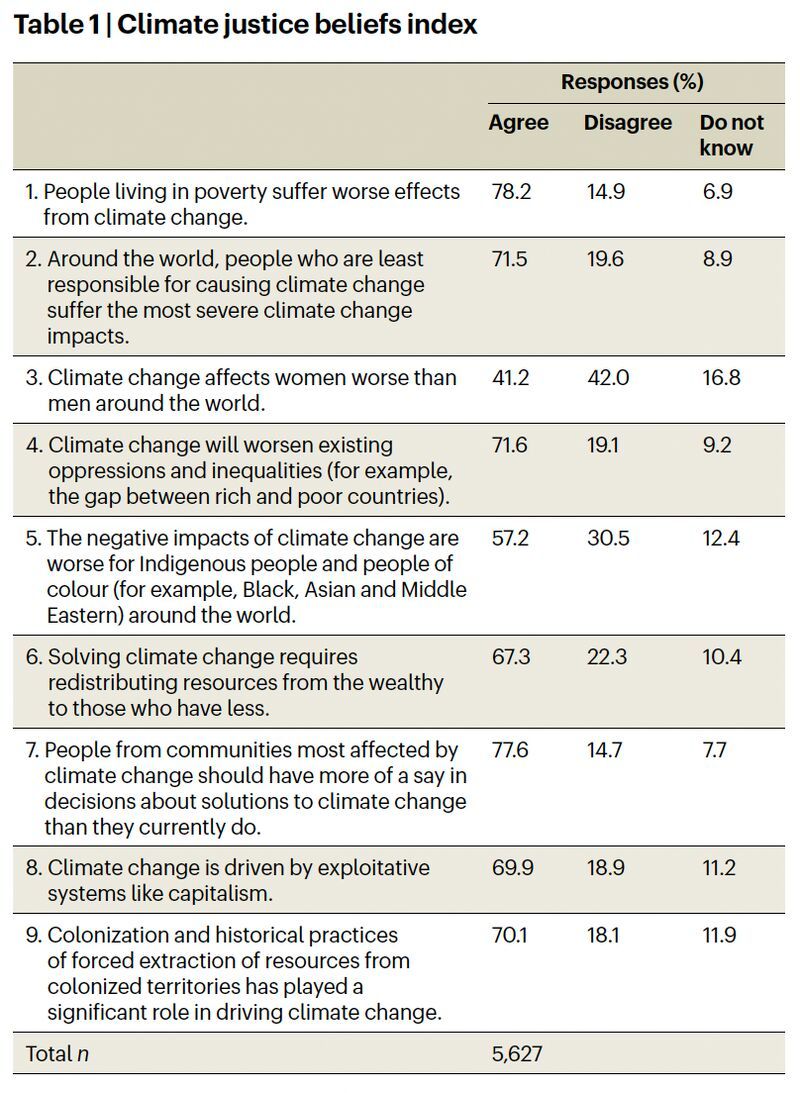

66% of people have never heard of 'climate justice', but a majority of these people still recognises social, historical and economic injustices related to climate change. This is the key finding of a new global study covering 11 countries published in 'Nature Climate Change' .
In other words, there is a mismatch between climate justice "awareness" and climate justice "beliefs". Many of us are somehow aware of the various injustices related to climate change, but we do not consciously relate such beliefs to climate justice.
Two climate justice beliefs stand out (see image below): 78% believe that people living in poverty suffer worse effects from climate change. And another 78% believe that communities most affected by climate change should have more of a say in decisions about solutions.
Bottom line: public awareness of climate justice as a concept is still too limited around the world pointing towards the need for more systematic education.
===
Full Article (open access): https://www.nature.com/articles/s41558-024-02168-y
#climatechange, #sustainability, #climatejustice
22-10-2024

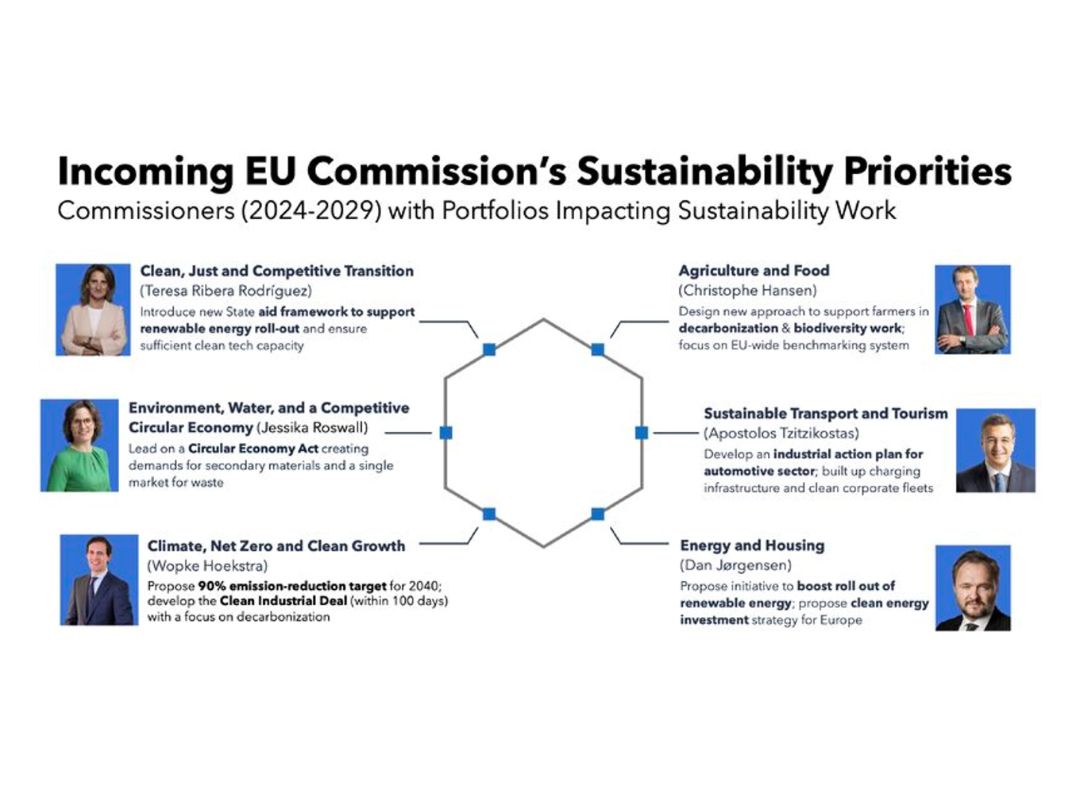

The EU Green Deal is alive. Below is an overview of incoming Commissioners who have a strong sustainability mandate in their portfolios. They all received "Mission Letters" (outlining expectations). The key priority topics mentioned in these Letters show that the EU plans to deliver on the Green Deal.
The list of priorities also shows that the Draghi Report already leaves its marks pushing for competitiveness through sustainability. Some proposals of the Draghi Report are directly implemented, e.g., the industrial action plan for the automotive sector. A key priority will also be the development of a Clean Industrial Deal that operationalizes several elements of the Draghi Report.
Great to see Teresa Ribera Rodríguez being in charge of the "Clean, Just and Competitive Transition." She has been a vehement advocate of emissions reductions for many years. It shows that there is appetite for the Green Deal in Brussels. This is also reflected in her Mission Letter where Ursula von der Leyen writes: "I would like you to guide the work to ensure that we stay the course on our goals set out in the European Green Deal."
===
Note: All listed individuals are Commissioners-designate - they need to undergo parliamentary hearings (in November). Final appointments are made by the European Council.
Access the Mission Letters: https://commission.europa.eu/about-european-commission/towards-new-commission-2024-2029/commissioners-designate-2024-2029_en
18-10-2024

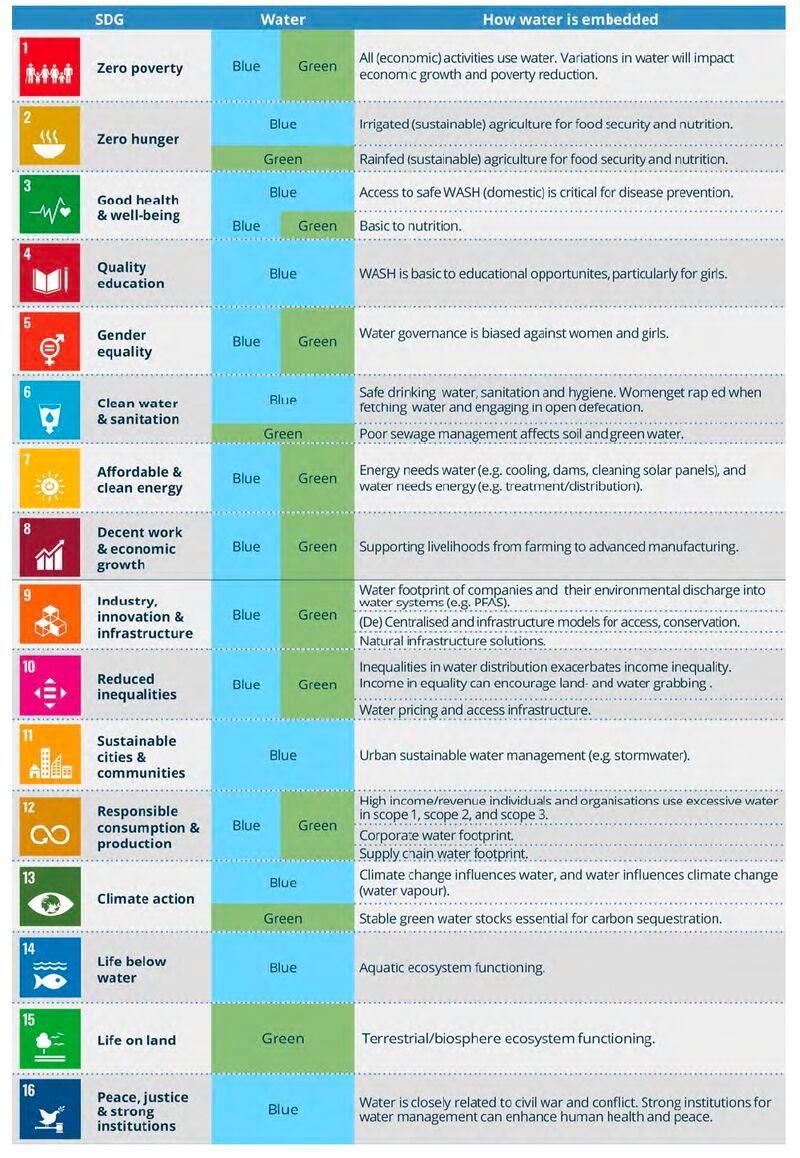

A new report shows the full scale of the global water crisis and how it impacts virtually all of the #SDGs. Water stress is estimated to put half the world's food production at risk within the next 25 years, according to the study by the Global Commission on the Economics of Water (so far the biggest global study of all aspects related to the water crisis).
The water crisis has been a 'silent crisis' so far - it is not much in the public eye, poorly governed, and yet heavily impacting people and planet because of the interconnected nature of ecosystems. The availability of "green water" (e.g., soil moisture needed for food production) and "blue water" (e.g., from rivers and lakes) impact whether and how the #SDGs are achieved. But water stress is increasing: demand for fresh water will outstrip supply by 40% by the end of the decade.
❗ This shows again: sustainability needs to be tackled through systems thinking and yet we still treat problems in rather isolated ways. Feedback loops and cascading effects matter (e.g., climate change impacting soil moisture) and ESG and corporate sustainability frameworks must reflect this much better!
===
Full Report: https://economicsofwater.watercommission.org/ (Co-chairs of the Commission: J. Rockström, N. Okonjo-Iweala, T. Shanmugaratnam, M. Mazzucato, H. Ovink).
#climatechange, #planetaryboundaries, #esg
18-10-2024

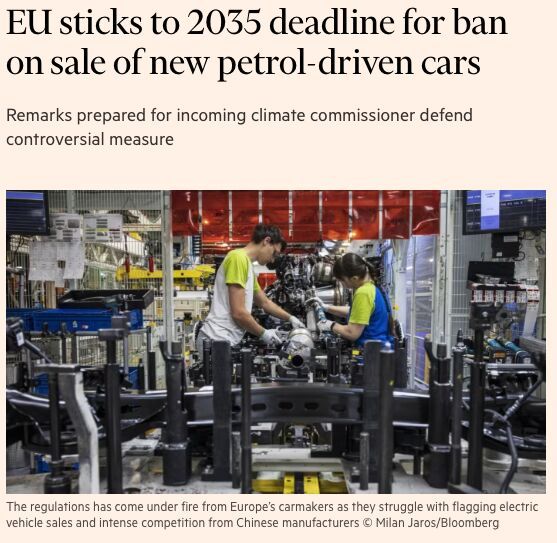

Despite heavy lobbying, the EU plans to stick to the 2035 deadline to outlaw the sale of new cars powered by fossil fuels. This is reassuring, not just for the EU Green Deal, but also for investors and car manufacturers themselves as they need predictability.
The law has come under pressure because EU car manufacturers struggle on world markets, e.g. due to intense competition from Chinese EVs. Many expected that the law could be on the list of items that would be "renegotiated and revised" after the new Commission comes in. However, Wopke Hoekstra (the EU's climate chief) made clear that the EU “cannot and should not roll back” this law.
Good to see that the EU Green Deal is alive, despite recent disappointments related to the delay of the EU deforestation law.
===
Full FT story: https://www.ft.com/content/9b8e685c-622c-467c-ace6-b9dfc203f819#myft:my-news:page
#eugreendeal, #climatechange
18-10-2024

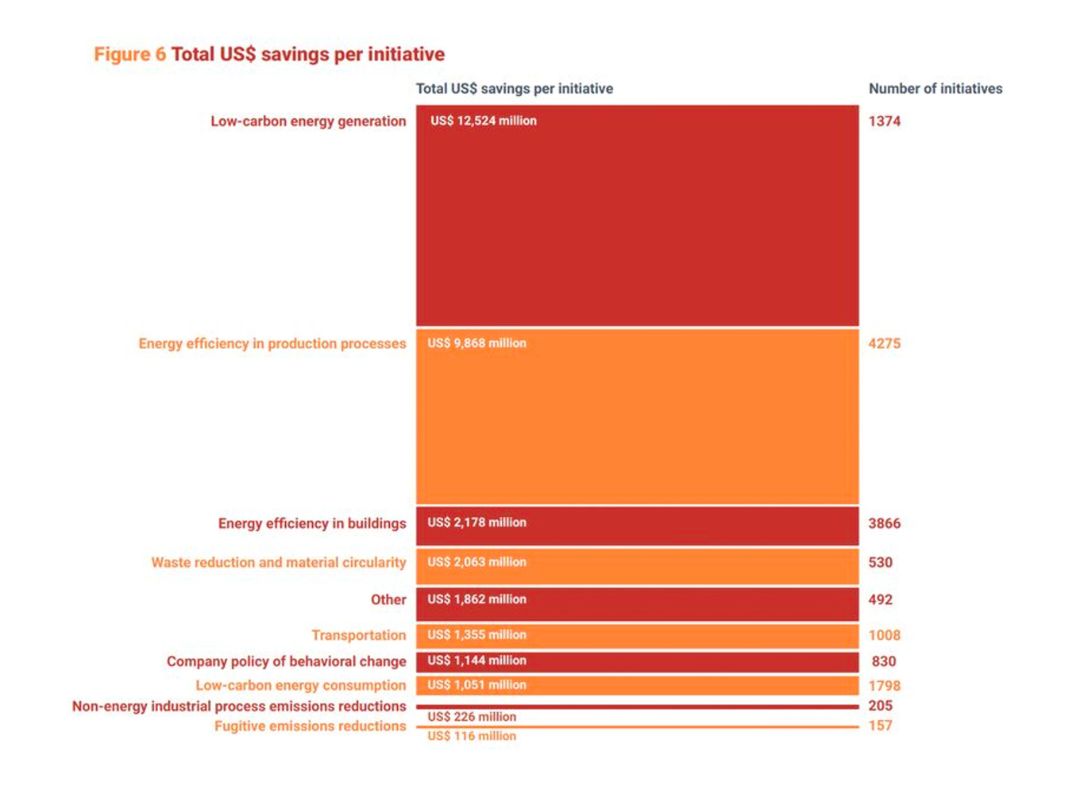

New CDP data shows that initiatives aimed at reducing scope 3 emissions resulted in $13.6bn financial savings. Despite this potential, only 15% of companies explicitly target their value chain with emission reduction initiatives.
One impediment is lack of governance: only 7% of companies disclosing through CDP oversee value chain engagement within their board-level governance. If the 'board is not on board' it is more difficult to push initiatives into the value chain.
What drives supplier actions? Capacity building, education and financial incentives matter. 1️⃣ Supplier were 52% more likely to reduce annual emissions when buyers offered financial incentives. 2️⃣ Suppliers who received support from buyers on setting science-based targets (SBTs) were 2.6 times more likely to set an SBT.
==
Full report: https://cdn.cdp.net/cdp-production/cms/reports/documents/000/007/890/original/CDP_HSBC_Report_2024.pdf?1727343420
16-10-2024

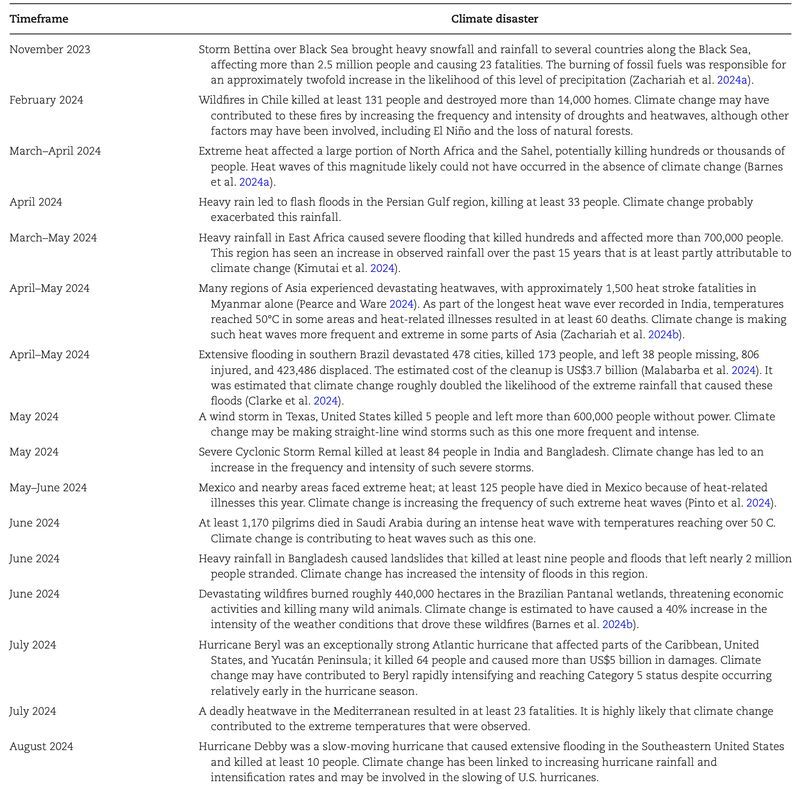

The overview below shows climate-related natural disasters between Nov 2023 and Aug 2024, with a brief explanation of links to climate change. New data shows that the average annual expected loss from such natural catastrophes has reached a new high of $151 billion - and these are just economic costs that do not even account for the human suffering involved.
A good reminder that the fact that such disasters are increasing in frequency and intensity is not just a theoretical claim - it is the new reality and it is costing us dearly (in all sort of ways).
==
Table from '2024 State of the Climate Report': https://academic.oup.com/bioscience/advance-article/doi/10.1093/biosci/biae087/7808595
Annual loss data by Verisk: https://www.verisk.com/company/newsroom/new-report-average-annual-natural-catastrophe-losses-for-the-insurance-industry-reaches-new-high-of-$151-billion/
#climatechange, #sustainability, #esg
16-10-2024

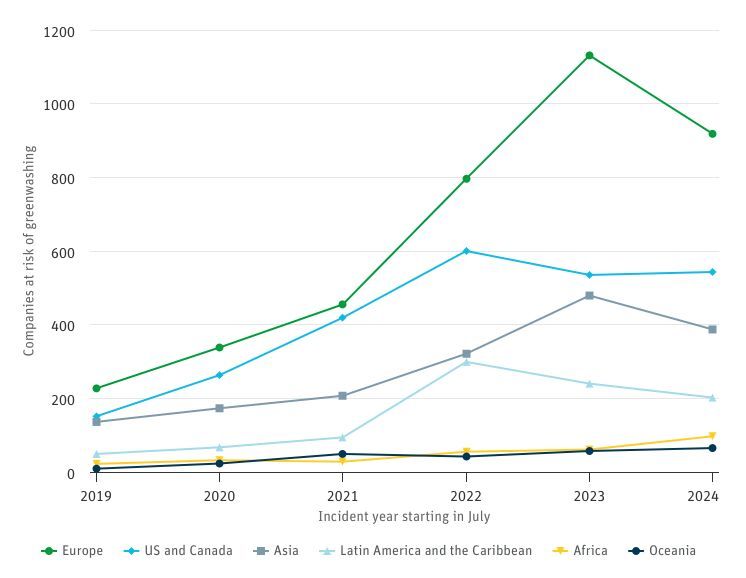

New data shows a 12% decrease in #greenwashing cases across regions for the first time, according to RepRisk's annual greenwashing report. Europe saw the strongest decrease, likely due to increased regulatory scrutiny: more transparency through e.g. #CSRD, #EUTaxonomy and firms factoring in future anti-greenwashing legislation ('Green Claims' and 'Empowering Consumers' directives). Some key facts:
1️⃣ SEVERITY: The severity of greenwashing cases surged by 30% - the severity is measured based on (a) consequences of the incident, (b) extent of impact, and (c) causes of incident (e.g., negligence or intent). In other words, we see overall fewer greenwashing cases, but more severe ones.
2️⃣ LACK OF LEARNING: Some companies seem stubborn and unwilling to learn - 30% are repeated offenders (i.e. they had cases in 2023 and then again in 2024). This could also point to a lack of risk management and understanding of what drives greenwashing.
3️⃣ INDUSTRY TRENDS: The Oil and Gas sector accounted for the largest share of cases, followed by Food and Beverage and Banking & Financial Services. But, when comparing year-on-year, Banking and Financial Services saw the biggest decline (27%) - likely due to changing dynamics around ESG and increased regulatory scrutiny (e.g., #SFDR).
==
Full report and analysis: https://www.reprisk.com/research-insights/reports/a-turning-tide-in-greenwashing-exploring-the-first-decline-in-six-years#footnote5
#sustainability, #esg
16-10-2024

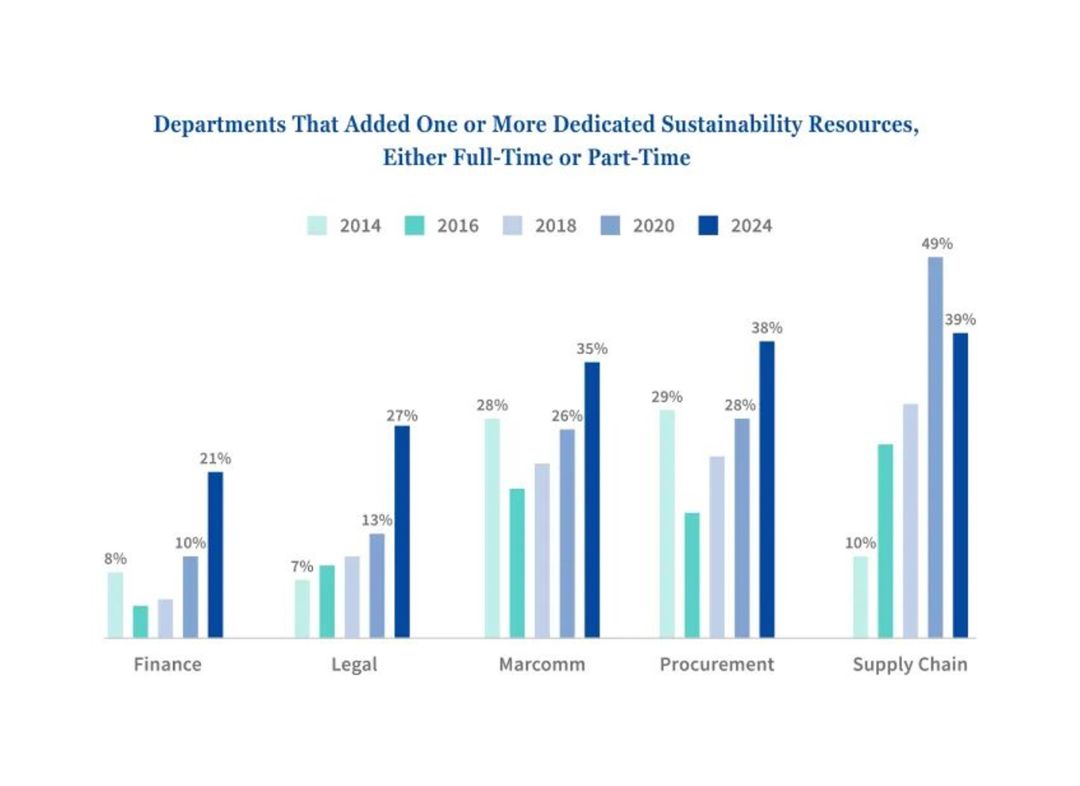

CFOs and General Counsels are becoming more involved in sustainability (due to regulations) and headcount continues to increase in sustainability teams, according to the new 'State of the Sustainability Profession 2024' report. Two further important findings:
1️⃣ Sustainability becomes better structurally anchored within and throughout organizations. Non-sustainability departments are increasingly adding sustainability staff (see image below). Highest increase is in finance and legal - it shows the effects of swiftly emerging regulation and the corresponding need to integrate financial and ESG data. Such integration is welcome - but: mindsets also need to integrate and this is the bigger leadership challenge...
2️⃣ Sustainability executives are rising in seniority within their companies. This is promising as it shows that CSOs are increasingly at the table when strategic decisions are being made (and they are more likely to influence these decisions). This can support integration of sustainability terminology and frameworks into senior management discussions and thus improve 'sustainability literacy'.
==
More here: https://trellis.net/report/the-state-of-the-sustainability-profession-2024/?trk=feed_main-feed-card_feed-article-content and thanks to Mikkel Larsen for sharing. I also commented on some related aspects in yesterday's Børsen (in Danish): https://borsen.dk/sponsoreret/cbs-professor-saadan-skal-danske-virksomheder-forvandle-de-gronne-krav-til-sorte-tal-paa-bundlinjen
01-10-2024

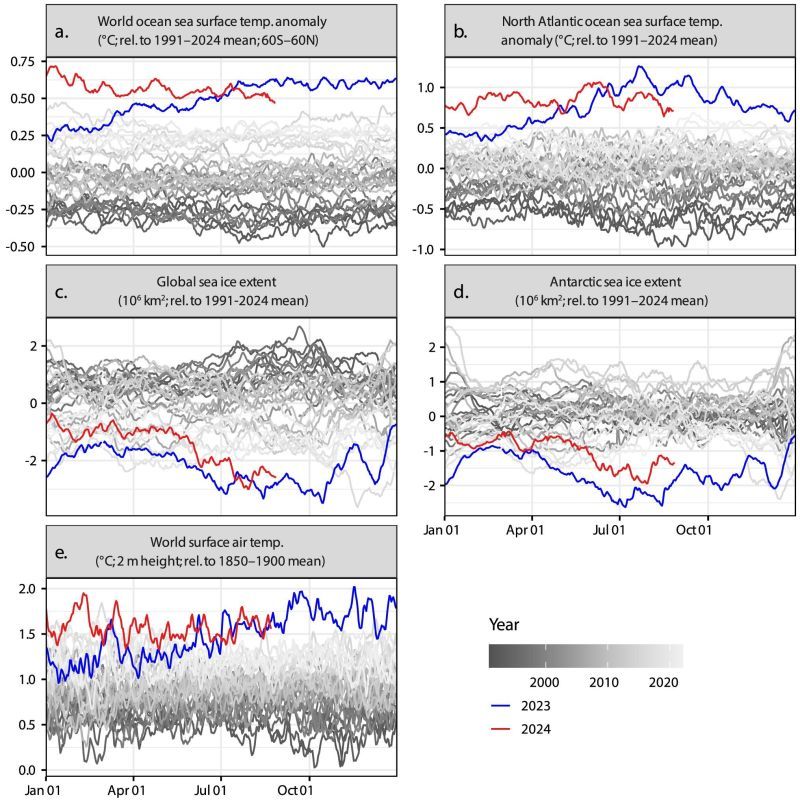

The '2024 State of the Climate' Report is out - not a pretty picture, but a really good discussion of recent key findings. The authors make clear: "In a world with finite resources, unlimited growth is a perilous illusion." Authors include W. Ripple, J. Rockström, S. Rahmstorf, M. Mann and many others.
The report tracks 35 vital planetary signals annually - of these 25 are at record levels. The report puts climate change in a larger scientific context, e.g. also tracking population effects (e.g., per capita meat production) and various feedback loops (physical and biological) that impact global warming.
Main conclusion: "Despite six IPCC reports, 28 COP meetings, hundreds of other reports, and tens of thousands of scientific papers, the world has made only very minor headway on climate change, in part because of stiff resistance from those benefiting financially from the current fossil-fuel based system."
===
Access the report: https://academic.oup.com/bioscience/advance-article/doi/10.1093/biosci/biae087/7808595?login=false
Summary in 'The Conversation': https://theconversation.com/unprecedented-peril-disaster-lies-ahead-as-we-track-towards-2-7-c-of-warming-this-century-240549
#climatechange, #sustainability, #globalwarming, #climatecrisis
01-10-2024

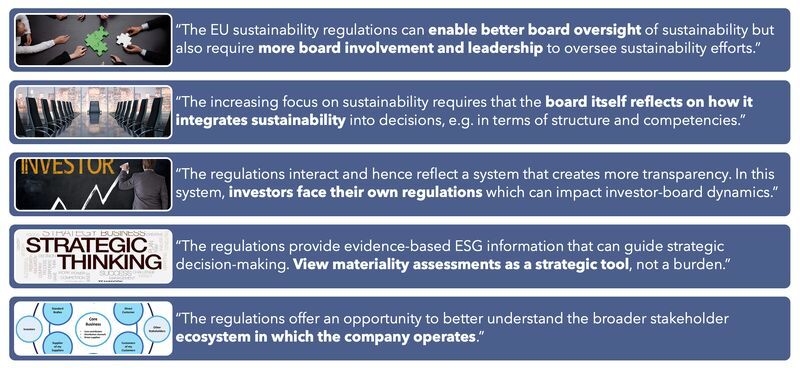

What to tell your board about the new sustainability regulations like #CSRD or #CSDDD? Most of all, boards need to understand that these regulations offer an opportunity for them to better govern the company. But it all depends on how the board itself frames this discussion.
Through my own talks with board members, executives and sustainability professionals, I have collected five insights that can help to make directors understand why these regulations matter for their work and support it. These five insights can (and need to) be extended and they do not reflect an exhaustive list. But, in my experience, they are a good conversation starter.
In the end, we do not just want more information about how boards provide oversight for sustainability (mandatory disclosures under ESRS 2, GOV 1-5). What matters is that boards actually integrate sustainability impacts, risks and opportunities into their decision-making...
01-10-2024

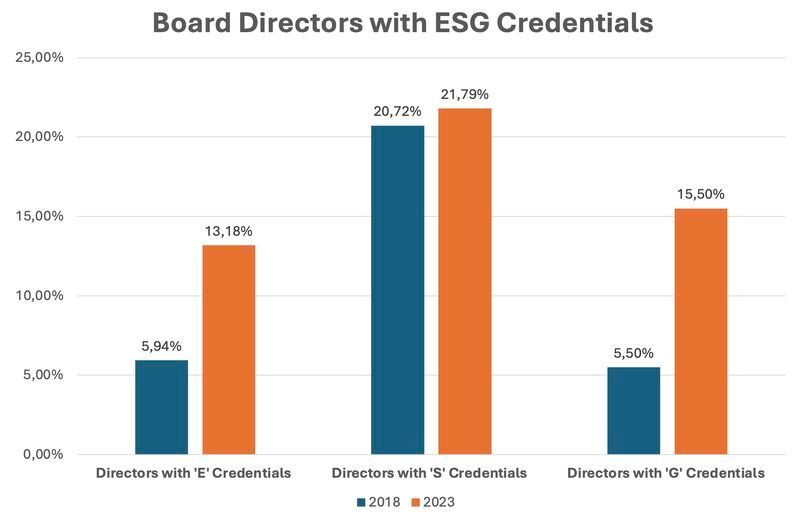

Board members still lack ESG credentials, although more directors have credentials in the 'E' and 'G' areas (compared to 2018). Most surprising, not even 2% of directors have specific climate-related credentials. These results come out of a review of directors' ESG credentials by NYU Stern.
1️⃣ The good news: more directors have ESG-related credentials compared to 2018. Overall, 43% of directors had one or more credential in the E, S or G categories (up from 29% in 2018).
2️⃣ While directors' credentials have grown in the 'E' and 'G' areas, the overall level of credentials suggests that boards are still not well prepared for ESG-related discussions.
3️⃣ There has also been a significant increase in the number of sustainability committees at board-level. In other words: boards form structures to discuss sustainability, but credentials lag behind...
==
The survey looked at directors serving on Fortune 100 boards (n=1161), so the data is U.S.-centric. Access the report here: https://www.stern.nyu.edu/experience-stern/about/departments-centers-initiatives/centers-of-research/center-sustainable-business/research/research-initiatives/fortune-100-board-members-lacking-esg-credentials
#esg, #sustainability, #climatechange
01-10-2024

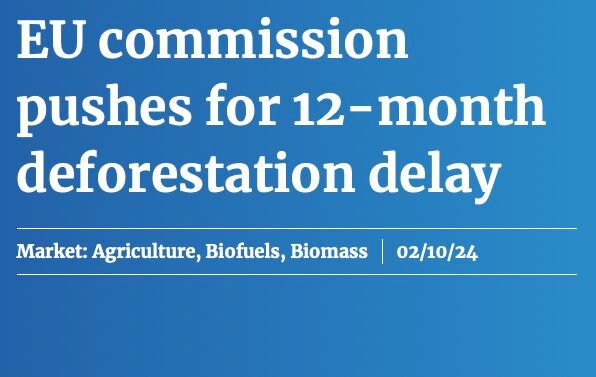

The EU Commission has proposed an additional 12-months "phasing-in" time for the EU Deforestation Regulation (EUDR). At the same time, the Commission also published new guidance documents to clarify key questions around definitions and processes (available here: https://green-business.ec.europa.eu/document/download/162138c8-7c22-4bb5-98ce-fd31c81d6936_en?filename=C_2024_7027_1_EN_Guidance%20on%20EU%20Deforestation%20Regulation%20.pdf ).
"The Commission said that three months ahead of the intended implementation at the end of this year, 'several global partners' have repeatedly expressed concerns about preparedness and that European stakeholder preparation is 'also uneven'. It added that the delay in 'no way puts into question the objectives or the substance of the law'." ( https://www.argusmedia.com/en/news-and-insights/latest-market-news/2614178-eu-commission-pushes-for-12-month-deforestation-delay )
The proposed change still requires approval from EU member states and the European Parliament to make the EUDR applicable from 30 December 2025 for large companies (and 30 June 2026 for small companies).
===
Official Press Release: https://ec.europa.eu/commission/presscorner/api/files/document/print/en/IP_24_5009/IP_24_5009_EN.pdf
#eugreendeal, #eudr
01-10-2024

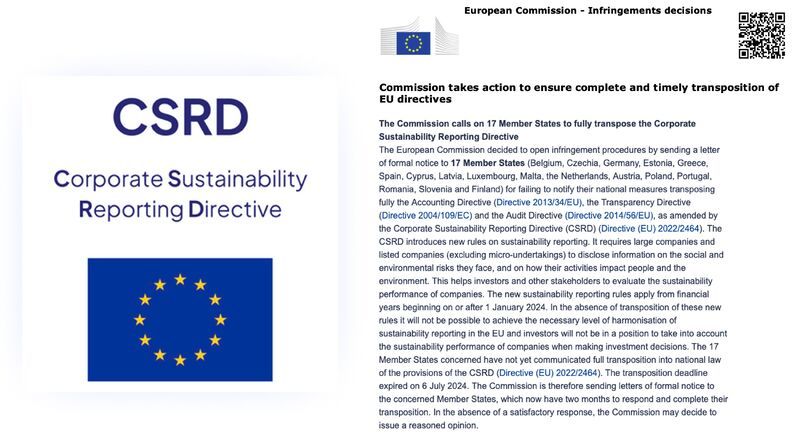

The EU Commission has opened infringement procedures aimed at 17 EU member states for having not (yet) fully transposed the #CSRD into national law. The deadline was 6 July 2024 and the 17 member states were targeted because they failed "to notify their national measures transposing fully" those Directives that were amended by the CSRD.
The Commission commented: “In the absence of transposition of these new rules it will not be possible to achieve the necessary level of harmonisation of sustainability reporting in the EU and investors will not be in a position to take into account the sustainability performance of companies when making investment decisions.” (see link to press release below)
The formal letters sent to the 17 member states reflect the first step of the infringement procedure. Member states have two months to reply, after this the Commission can send a formal request to comply. In a last step, the European Court of Justice can be involved to impose penalties. ( https://commission.europa.eu/law/application-eu-law/implementing-eu-law/infringement-procedure_en )
Letters were sent to: Belgium, Czechia, Germany, Estonia, Greece, Spain, Cyprus, Latvia, Luxembourg, Malta, the Netherlands, Austria, Poland, Portugal, Romania, Slovenia and Finland.
==
Full press release by the EU Commission: https://ec.europa.eu/commission/presscorner/api/files/document/print/en/inf_24_4661/INF_24_4661_EN.pdf
01-10-2024

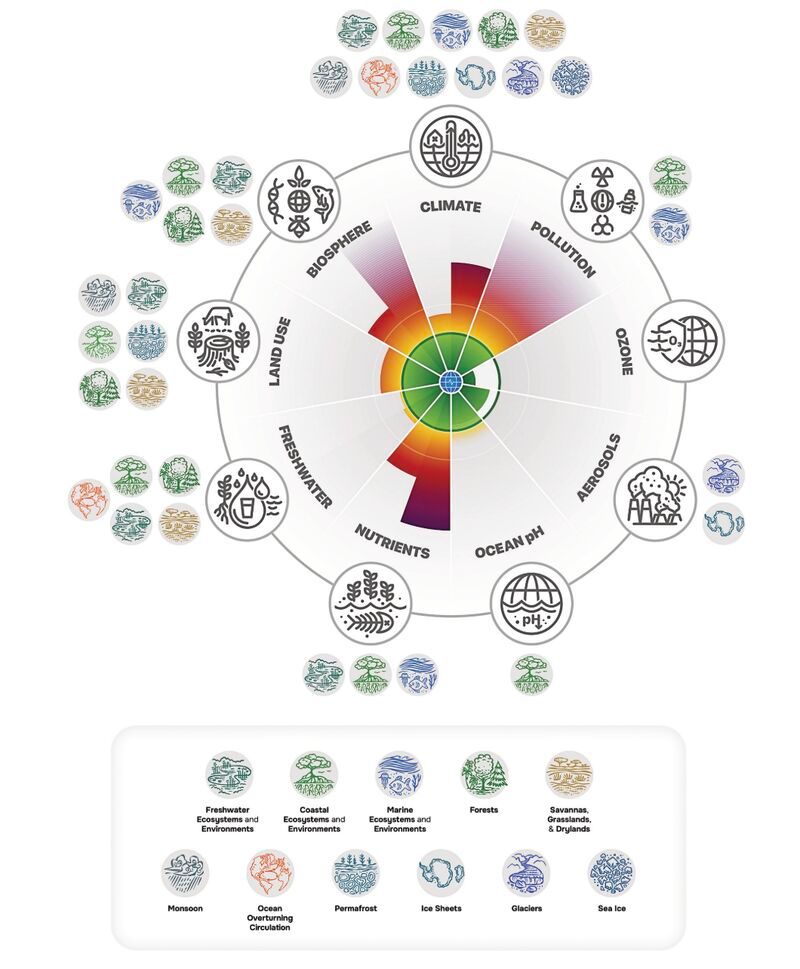

The figure below reflects the first effort to link planetary boundary processes with tipping points. The tipping points categories were taken from the first 'Global Tipping Points Report'. A connection was made if a planetary boundary's control variables (or drivers) were connected to the drivers of a tipping system.
The results are clear: climate, biosphere integrity, land systems change, and freshwater have a significant impact on fragile regional systems that create global consequences (i.e. 'tipping points').
The analysis shows what planetary boundary science has been trying to tell us for years: it is the interconnections (a) among boundaries and (b) of boundaries with tipping points that matter. We need to analyse systems and not just 'E', S' and 'G' categories...
==
Full analysis in the 'Planetary Health Check 2024': https://www.planetaryhealthcheck.org/
#climatechange, #planetaryboundaries, #esg, #sustainability
01-10-2024



The IAASB approved 'ISSA 5000', the new International Standard on Sustainability Assurance. Really good news as this standard is designed to be an internationally applicable reference point that should guide future assurance practices related to sustainability information.
Designed as a principle-based standard, ISSA 5000 can be used independently of the reporting framework used. Right now, it is assumed that the standard will be adopted by the EU as a reference point for #CSRD assurance by means of a delegated act. The CSRD requires that a standard for limited assurance is adopted by 1 October 2026 at the latest.
Until full legal adoption of ISSA 5000, another reference point are the non-binding guidelines for limited assurance developed by the Committee of European Auditing Oversight Bodies (CEAOB). The proposal was published in June 2024: https://www.drsc.de/app/uploads/2024/07/CEAOB_Draft_Guidelines_on_Limited_Assurance_June_2024.pdf
The final text of ISSA 5000 still needs to be certified by the Public Interest Oversight Board and will then be published by the end of the year. You can access the approved text here: https://www.iaasb.org/meetings/iaasb-quarterly-board-meeting-september-16-20-2024
01-10-2024

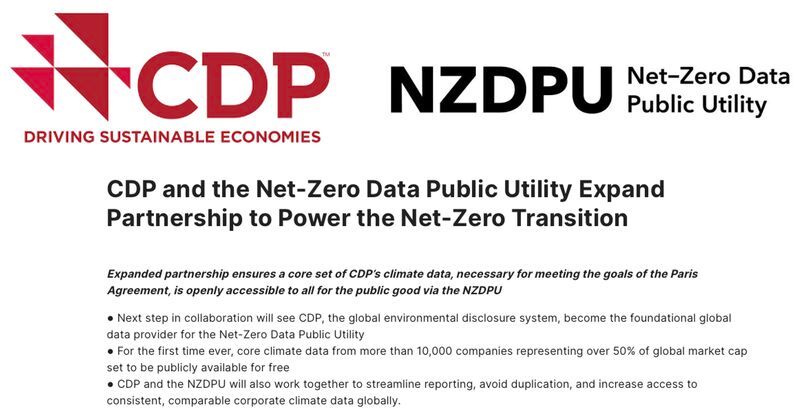

Great move - CDP and the Net-Zero Data Public Utility (NZDPU) just announced to expand their partnership, so that for the first time core climate data on more than 10,000 companies will be freely available to all. The covered companies reflect over 50% of global market cap.
"The data provided by CDP will incorporate core climate transition-related data, such as GHG emissions and emissions reduction targets, including detailed sector-specific data [...]." Such partnerships also help businesses as it becomes easier for corporate actors to assess progress on climate goals of those they (want to) do business with.
The hurdles to access quality corporate climate data often remain too high, excluding key stakeholders from gaining more insights on where we stand on the net-zero transition. In 2023, over 23,000 companies disclosed through CDP, so making parts of this data open access is a significant step to closing data gaps.
==
Press Release: https://nzdpu.com/news-and-publications/2b666309-34df-4df0-ba0f-bf957664ce1d
#climatechange, #climatedata, #netzero
01-10-2024

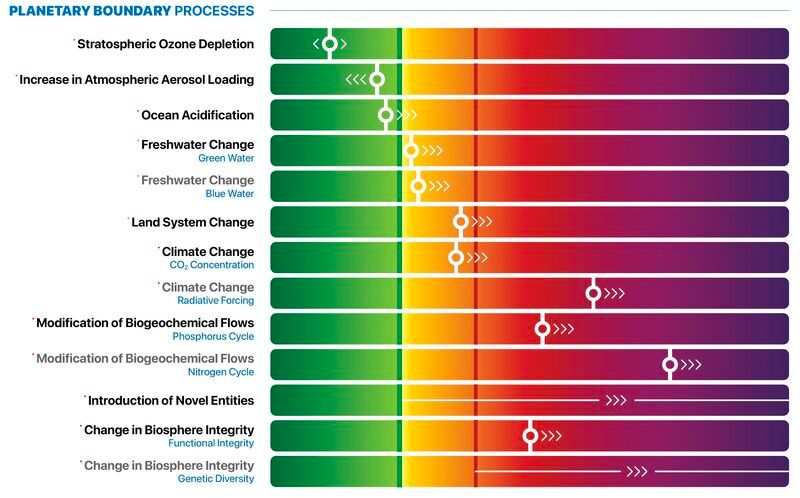

Six planetary boundaries are already crossed - soon it will be seven (out of nine), according to the first 'Planetary Health Check' report by the Potsdam Institute for Climate Impact Research (PIK) that was just published. The seventh boundary that is about to be crossed is ocean acidification.
"As CO2 emissions increase, more of it dissolves in sea water [...] making the oceans more acidic. [...] Even with rapid emission cuts, some level of continued acidification may be unavoidable due to the CO2 already emitted and the time it takes for the ocean system to respond. Therefore, breaching the ocean acidification boundary appears inevitable within the coming years." (https://lnkd.in/dXmUEeZD).
❗ The report makes clear that we cannot address the nine boundaries in isolation - they are deeply interconnected. Ocean acidification, for instance, impacts and is impacted by climate change and has significant consequences for biosphere integrity (as it leads to breakdowns of food webs).
Only upside: addressing one planetary boundary can have benefits for other boundaries. Nature works in systems - corporate responses should better acknowledge this...
==
Access 'Planetary Health Check' Report: https://d1gwxouzo4hr10.cloudfront.net/planetaryhealthcheck2024_report.pdf
09-2024

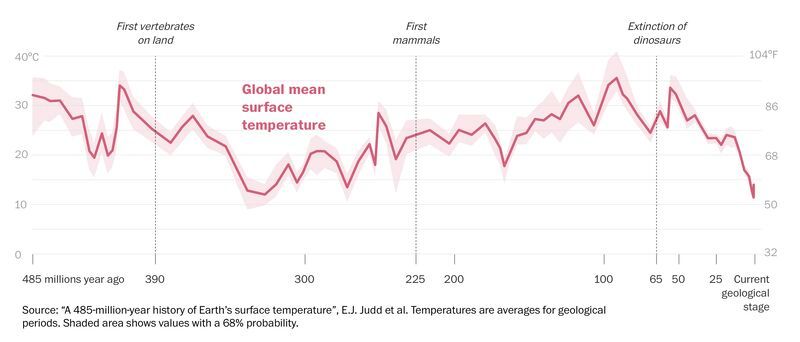

Currently, climate skeptics share the results of a recent study in 'Science' that reconstructed the Earth's climate throughout the last 485 million years (see image). BUT: they attach misleading conclusions to it and hence try to fool people.
The study neither shows nor claims that "everything is OK" because the climate has always been changing throughout Earth's history.
A discussion of this study by The Washington Post makes clear: "At no point in the nearly half-billion years that Judd and her colleagues analyzed did the Earth change as fast as it is changing now." and “In the same way as a massive asteroid hitting the Earth, what we’re doing now is unprecedented.”
It is all about the rapid rate of temperature increase and our inability to cope with the resulting conditions. "Life on Earth has endured climates far hotter than the one people are now creating through planet-warming emissions. But humans evolved during the coldest epoch... "
==
Article in Washington Post: https://www.washingtonpost.com/climate-environment/2024/09/19/earth-temperature-global-warming-planet/
Article in Science (open access): https://www.science.org/doi/10.1126/science.adk3705
#climatechange
09-2024

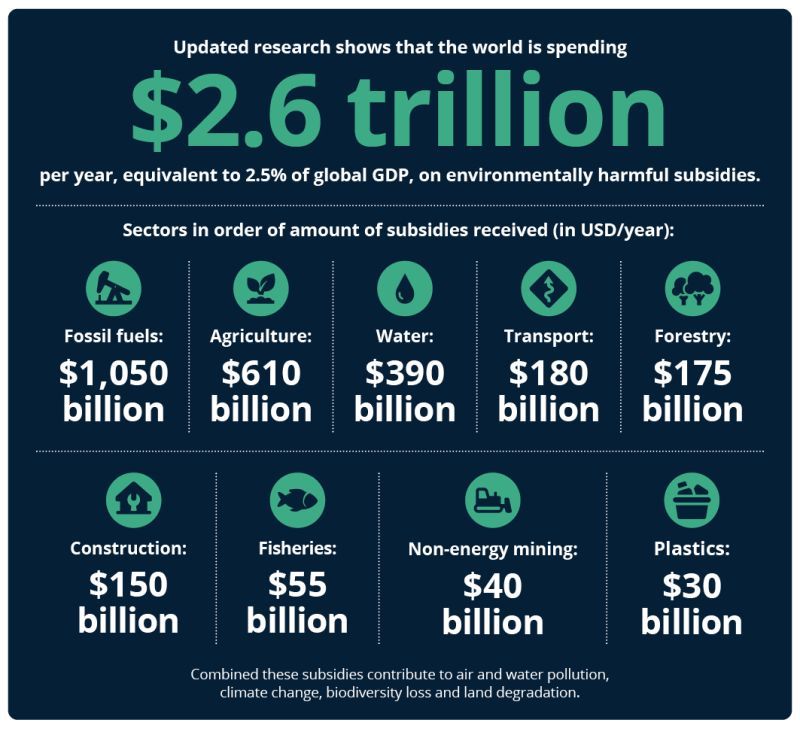

Globally, governments are spending $2.6 trillion per year on environmentally harmful subsidies ($800 billion more than in 2022), according to a new report. Such subsidies relate to government programs that enable unsustainable production and consumption and thereby contribute to biodiversity loss and climate change (among other things).
Environmentally harmful subsidies (EHS) are in need of urgent reform and governments are in the driver's seat. Compared to other possible actions, reforming some aspects of EHS reflect 'low-hanging fruits'. Some investor coalitions have also realised this and pushed for reforming such subsidies (e.g., here: https://lnkd.in/dkjkwzND).
EHS exist in various forms, ranging from direct cash payments to government provision of credit, special tax breaks and regulatory exemptions. Overall, we spend 2.5% of global GDP each year to exhaust natural resources, degrade ecosystems and damage planetary boundaries. Rethinking is long overdue...
==
Full report: https://www.businessfornature.org/reformingehs
#climatechange, #biodiversity, #fossilfuels
09-2024

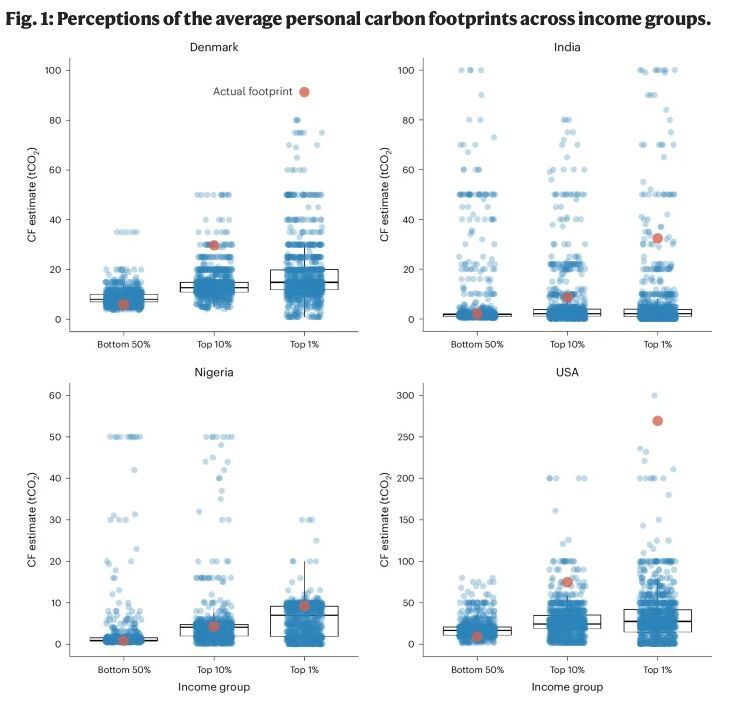

People consistently underestimate the carbon footprint of the wealthiest 1% and overestimate emissions of lower income earners, according to a new study in 'Nature Climate Change'. Here are some key take-aways:
1️⃣ We know that there is a big difference between the carbon footprints of the rich and the poor - this study shows that we are not sufficiently aware of this inequality.
2️⃣ The underestimation is particularly strong in the U.S. and Denmark (see image below). The study surveyed 4,000 people in the US, Denmark, Nigeria and India (countries chosen due to differences in per capita emissions and levels of economic inequality).
3️⃣ People from the top 10% income segment perceived the actual carbon footprint inequality to be significantly fairer than people from the general population. This is concerning, as wealthier people often have disproportionate influence on policy-making ( ➡ If you do not see problem, you do not promote policy change).
==
Full study (open access): https://www.nature.com/articles/s41558-024-02130-y
Big congrats to my colleagues at the CBS Sustainability Centre, Kristian Steensen Nielsen and Jan M. Bauer, who were part of this international research team. #climatechange, #sustainability, #carbonfootprint
09-2024

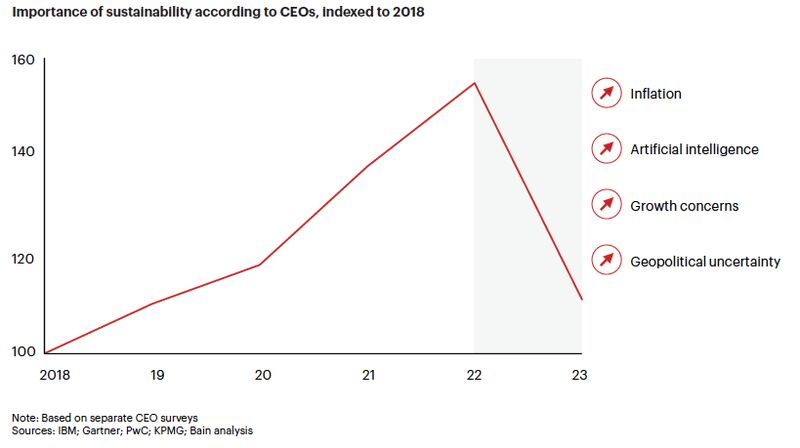

CEOs' prioritisation of sustainability is in sharp decline, according to an aggregated analysis of multiple CEO surveys by Bain & Co. The relative perceived importance of sustainability is overshadowed by growth concerns, AI, geopolitical issues, and inflation. But, this needs to be viewed in context...
▶ After years of (often) inflated sustainability expectations, CEOs recognise that it is difficult to go from ambitions to practical delivery. Hence, some companies have 'adjusted' their expectations and targets (we have seen a lot of this recently).
▶ Increased regulation has pushed the perception(!) that sustainability is about compliance and not strategising. This is, of course, a misperception as most of the regulations (such as #CSRD, #CSDDD) were designed precisely to move sustainability concerns closer to strategic decision-making.
▶ CEOs may overreact to short-term trends. The Bain & Co. discussion shows that sustainability is likely to go through a "normal" transformation cycle where reality and expectations are matched over time. This matching process is impacted by the interplay of technological developments (impacting efficiency and lowering costs), consumer behaviour (responding to lower prices) and governmental policy support (pushing technologies towards critical thresholds).
These dynamic adjustments take time. Hence: CEOs should take a long-term view. (How often have we said this?)
===
Full Analysis by Bain & Co: https://www.bain.com/insights/topics/ceo-sustainability-guide/
#sustainability, #esg
09-2024

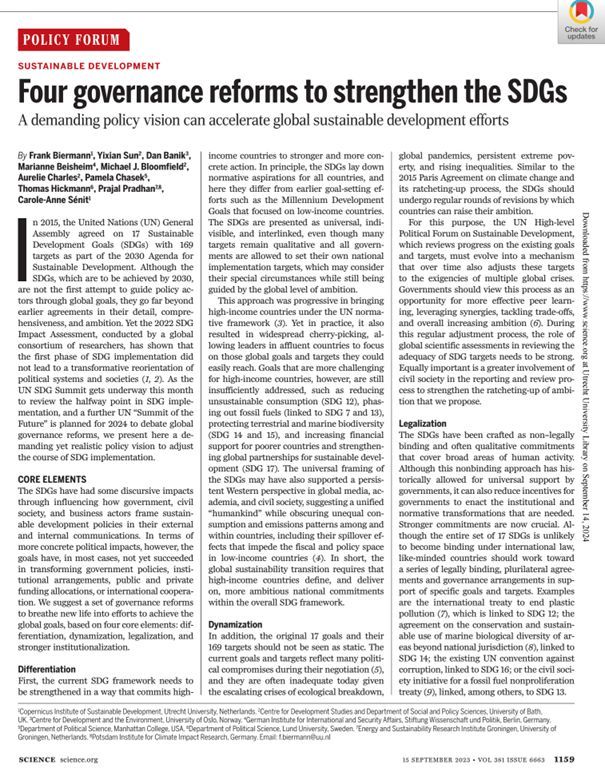

Reforming and strengthening the #SDGs - some important reflections in "Science" right ahead of the UN Summit of the Future (22-23 Sept). From a governance angle, SDG reform should include four main pillars:
1️⃣ Differentiation: High-income countries need to commit to stronger goals. While the universal character of the SDGs is appealing, implementation targets are still set nationally. Hence: high-income countries often insufficiently address those Goals that are challenging to them (e.g., responsible consumption, SDG 12).
2️⃣ Dynamization: The SDGs need to become more dynamic. Some of the current Goals rest on past political compromises that do not sufficiently account for the escalating nature of the underlying problems.
3️⃣ Legalisation: Although it is unlikely that all SDGs become binding, "like-minded countries should work toward a series of legally binding, plurilateral agreements and governance arrangements in support of specific goals and targets." Form coalitions of the willing supporting certain Goals and expand over these time.
4️⃣ Institutionalization: While some SDGs can draw on a well-developed institutional infrastructure, other SDGs lack institutional support at global and local levels. It would make sense to strengthen such an infrastructure for some of the Goals (e.g., SDGs 12 and 16).
At the very least, these reforms should feed into the process of thinking about sustainable development post-2030. The SDGs run until 2030 - we do not need new Goals or a new framework but better implementation and governance of what is already there...
===
Full Access: https://pure.rug.nl/ws/portalfiles/portal/781740647/science.adj5434.pdf
09-2024

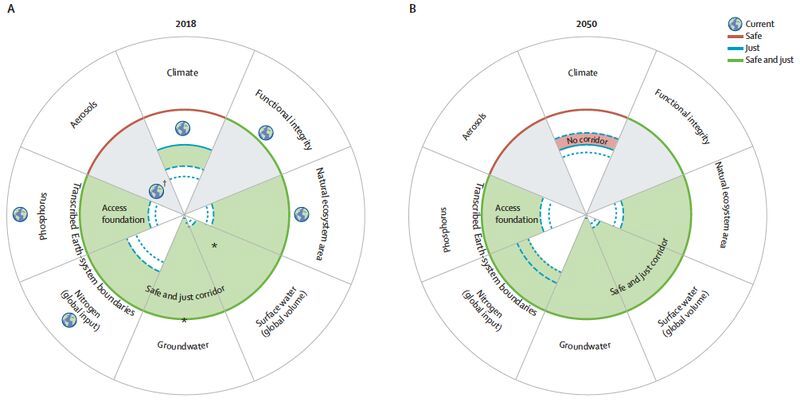

Planetary boundaries and social justice thinking combined. Under current conditions of inequality and fossil fuel-intensive lifestyles it is impossible for all humans to live healthy lives within a "safe and just corridor" - this is the key finding of the Earth Commission report published in The Lancet Group yesterday.
The Commission defined a "justice floor" (defined by basic living standards) and then calculated how much space there was between this and a "safety ceiling" (defined by planetary boundaries). "The safe and just corridor is a conceptual space in which everyone can have their essential needs met without compromising the stability of Earth’s essential systems."
Right now, we are outside of the safe and just corridor in various areas (e.g., climate, natural ecosystems; scenario A in image). Without changes, there is no safe and just space left in the climate area by 2050 (scenario B). In other words: even if everyone had access to basic resources in 2050, we would still be outside of the climate boundary.
Full Report: https://www.thelancet.com/action/showPdf?pii=S2542-5196%2824%2900042-1
#planetaryboundaries, #climatechange
Preamble
In a world where complexity reigns, where capitalism's grip on society threatens democracy, and where suffering pervades our organizations, we find ourselves at a crossroads. In order to reshape the future of work, HR must heed the call of transformation, daring to challenge the status quo and driving change for good.
For far too long, HR has grappled with an existential crisis, losing sight of its purpose and its potential to be a force for positive change. We've professionalized, we've gathered brilliant minds, but the truth is, people are no longer truly at the heart of what we do. We've wandered in the wilderness of indifference, too often lost in a labyrinth of bureaucracy and technology.
The path to real change is not lined with quick fixes or superficial solutions. It's a winding road that demands introspection, courage, and radical honesty. HR must confront its own role in creating the suffering it purports to alleviate. We must stop to purchase indulgences in the form of DEI programs, or distract ourselves with the latest technological marvels to atone for our shortcomings.
If we fail to transform, the #futureofwork will be the exact mirroring of our troubled present. HR must take the reins of leadership and commit to subordinate effectiveness to #ethics, #humanism and #sustainability. This calls not only for new ways to imagine our organisations, but for a profound, inward journey. HR must shed the chains of dependency on those in power. It must once again nurture a dual loyalty, towards both the business and the ideals of its profession. It must unify practitioners across organizations in a shared quest for what is right and good.
It takes bravery to confront our deepest fears, and stand up for what is just. The bedrock of any good organization is good people, and HR must be willing to lead the way, so that others might follow. Leadership itself has grown morally mute, and herein might lie an opportunity for HR to show its metal and step into the void. A new HR has the potential to be the vanguard of a coalition of the willing, fostering systemic change within an unjust economic system.
The clock is ticking and it's time to decide which road you are willing to travel. Will you perpetuate the unhappiness of the past, with more of the same but new fancy clothes? Or will you take the courageous leap toward a better world, one where work exudes dignity, the economy serves humanity, and our organizations shine as beacons of a good life for all?
Peter Senge once spoke of leadership as a community's ability to shape its future. Within the HR community, let the spark of unwavering determination to craft a better world of work grow! Let our actions be the testament to our commitment to brighter, more humane organisations. That famous future, the future of work, is already upon us. Friends, let us not squander it!
Popular articles in the KnowledgeHub

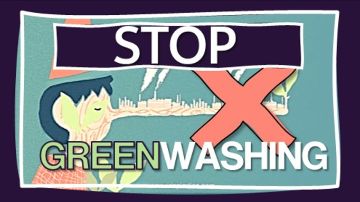



 .
.